#Teamwork
Use the Phases of Team Development (Based on Bruce W. Tuckman's Model of Forming, Storming, Norming, Performing, and Adjourning) to Help Teams Grow and Advance: 2023 Update
09 January 2023
BY SCOTT M. GRAFFIUS | ScottGraffius.com
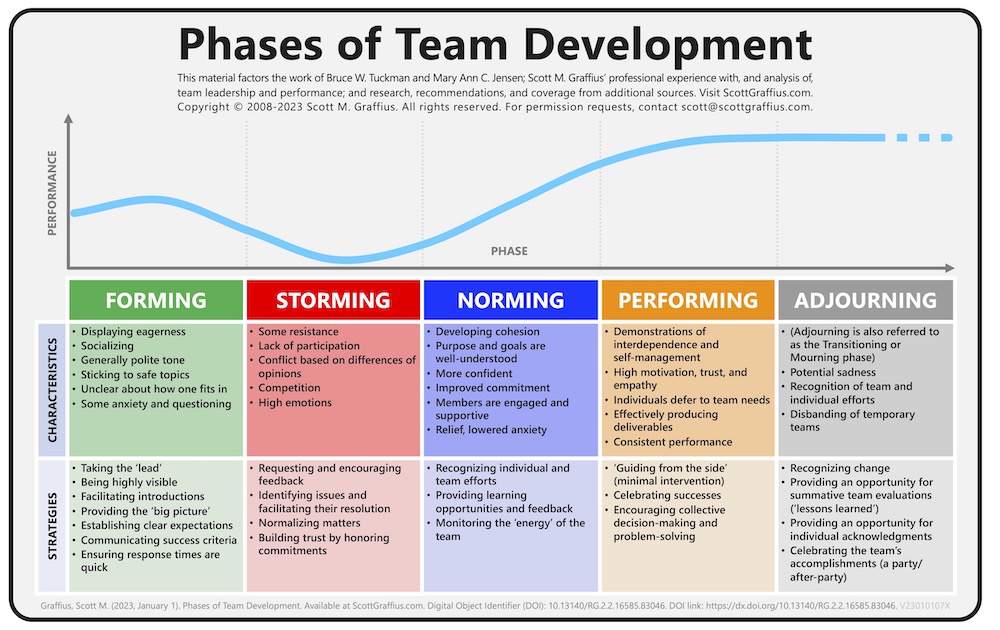
Click here to download this article as a PDF.
For permission requests and high resolution versions of the Phases of Team Development image, see below.
2023 Update
In 2008, Scott M. Graffius started developing material on advancing teams’ happiness, productivity, and success. His respective Phases of Team Development content factors the work of Dr. Bruce W. Tuckman and Mary Ann C. Jensen; Graffius's experience, observation, and analysis; and research, recommendations, and coverage from additional sources (examples are listed below).
The Phases of Team Development highlights the performance level, characteristics, and proven strategies for each of the five phases: Forming, Storming, Norming, Performing, and Adjourning. Project Managers, Scrum Masters, Agile Coaches, DevOps Leads, and other leaders can apply the information to help handle challenges or issues experienced by teams. By doing so, they’ll advance the teams' (and their own) happiness, productivity, and success.
This article and the accompanying visual provides the updated 2023 version of the Phases of Team Development.

Five Phases of Team Development
1. Forming
Characteristics of Forming include displaying eagerness, socializing, generally polite tone, sticking to safe topics, unclear about how one fits in, and some anxiety and questioning.
Strategies for this phase include taking the ‘lead,’ being highly visible, facilitating introductions, providing the ‘big picture,’ establishing clear expectations, communicating success criteria, and ensuring response times are quick.
2. Storming
Traits of Storming include some resistance, lack of participation, conflict based on differences of opinions, competition, and high emotions.
Strategies for this phase include requesting and encouraging feedback, identifying issues and facilitating their resolution, normalizing matters, and building trust by honoring commitments.
3. Norming
Features of Norming include purpose and goals are well-understood, more confident, improved commitment, members are engaged and supportive, relief (lowered anxiety), and developing cohesion.
Strategies for this phase include recognizing individual and team efforts, providing learning opportunities and feedback, and monitoring the ‘energy’ of the team.
4. Performing
Characteristics of Performing include high motivation, trust, and empathy; individuals defer to team needs; effectively producing deliverables; consistent performance; and demonstrations of interdependence and self-management.
Strategies for this phase include ‘guiding from the side’ (minimal intervention), celebrating successes, and encouraging collective decision-making and problem-solving.
5. Adjourning
Typical traits of Adjourning (also referred to as Transitioning or Mourning) include potential sadness, recognition of team and individual efforts, and disbanding.
Strategies for this phase include recognizing change, providing an opportunity for summative team evaluations ('lessons learned'), providing an opportunity for individual acknowledgments, and celebrating the team’s accomplishments — which may involve a party and possibly an after-party.


References / Sources
The Phases of Team Development by Scott M. Graffius factors the work of Dr. Bruce W. Tuckman and Mary Ann C. Jensen; Graffius's experience, observation, and analysis; and research, recommendations, and coverage from additional sources such as Google, Harvard Business Review, IEEE, MIT, Fast Company, NASA, Microsoft, TNW, Project Management Institute, Scrum Alliance, Scrum.org, Gartner, CIO, RAND Corporation, Software Engineering Institute, University of Edinburgh, Cisco, KPMG, Warsaw University of Technology, Software Engineering Institute, DevOps Institute, American Express, SANS Institute, Zurich University, SAP, ViacomCBS, Oxford University, American Management Association, AT&T, University of Southern California, IBM, and many others.
Select (partial) bibliography:


How to Cite This Article
Graffius, Scott M. (2023, January 9). Use the Phases of Team Development (Based on Bruce W. Tuckman's Model of Forming, Storming, Norming, Performing, and Adjourning) to Help Teams Grow and Advance: 2023 Update. Available at: https://scottgraffius.com. Digital Object Identifier (DOI): 10.13140/RG.2.2.10720.35846. DOI link: https://dx.doi.org/10.13140/RG.2.2.10720.35846.


Request Permission
This material is © copyright 2023 Scott M. Graffius. All rights reserved. It may not be published, broadcast, rewritten or redistributed without the express written permission of Scott M. Graffius.
To request permission to use the Phases of Team Development content, contact Scott M. Graffius.
If a request is approved, terms and conditions will be provided along with—if applicable—downloadable high resolution versions of the Phases of Team Development image in JPG and PNG formats.




About Scott M. Graffius

Scott M. Graffius, PMP, CSP-SM, CSP-PO, CSM, CSPO, SFE, ITIL, LSSGB is an agile project management practitioner, consultant, multi award-winning author, and highly sought-after international keynote speaker. He has generated over $1.75 billion of business value in aggregate for the organizations he has served. Graffius is the CEO and Principal Consultant at Exceptional PPM and PMO Solutions™ and subsidiary Exceptional Agility™. Content from his books, talks, workshops, and more have been featured and used by businesses, professional associations, governments, and universities. Select examples include Microsoft, Oracle, Broadcom, Cisco, Gartner, Project Management Institute, IEEE, U.S. Soccer Federation, Qantas, National Academy of Sciences, U.S. Department of Energy, U.S. National Park Service, New Zealand Ministry of Education, Yale University, Warsaw University of Technology, and others. Graffius has delighted audiences with dynamic and engaging talks and workshops on agile, project management, and technology leadership at 82 conferences and other events across 24 countries.
His full bio is available here.
Connect with Scott on:
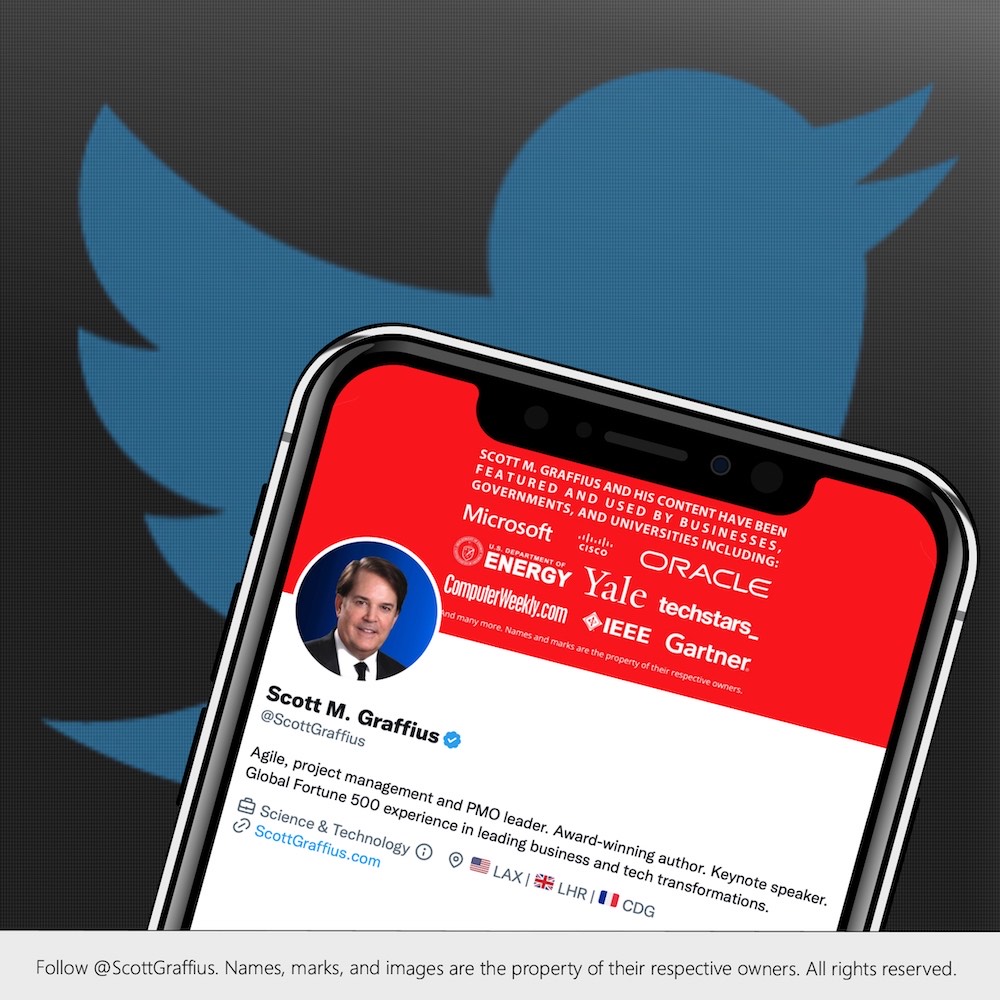

About Agile Scrum: Your Quick Start Guide with Step-by-Step Instructions
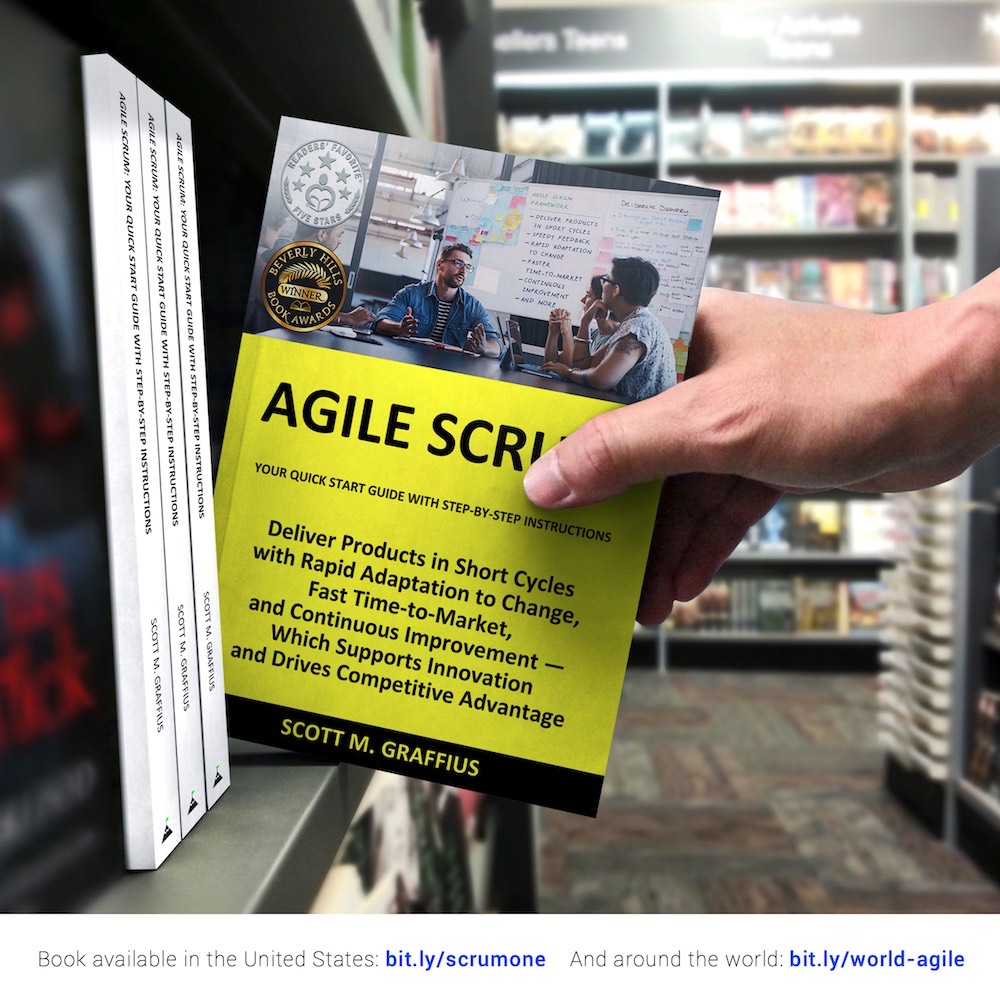
Shifting customer needs are common in today's marketplace. Businesses must be adaptive and responsive to change while delivering an exceptional customer experience to be competitive.
There are a variety of frameworks supporting the development of products and services, and most approaches fall into one of two broad categories: traditional or agile. Traditional practices such as waterfall engage sequential development, while agile involves iterative and incremental deliverables. Organizations are increasingly embracing agile to manage projects, and best meet their business needs of rapid response to change, fast delivery speed, and more.
With clear and easy to follow step-by-step instructions, Scott M. Graffius's award-winning Agile Scrum: Your Quick Start Guide with Step-by-Step Instructions helps the reader:
Hailed by Literary Titan as “the book highlights the versatility of Scrum beautifully.”
Winner of 17 first place awards.
Agile Scrum: Your Quick Start Guide with Step-by-Step Instructions is available in paperback and ebook/Kindle in the United States and around the world. Some links by country follow.

About Agile Transformation: A Brief Story of How an Entertainment Company Developed New Capabilities and Unlocked Business Agility to Thrive in an Era of Rapid Change
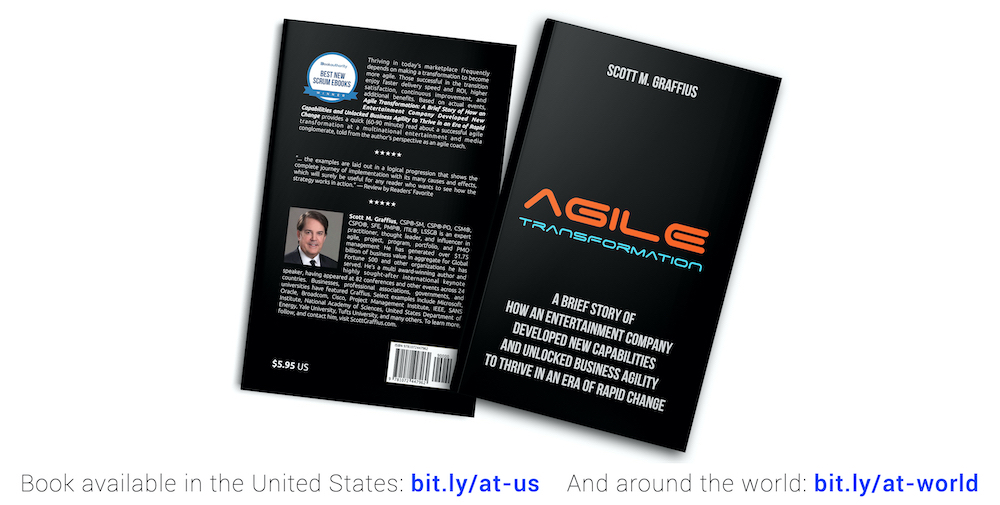
Thriving in today's marketplace frequently depends on making a transformation to become more agile. Those successful in the transition enjoy faster delivery speed and ROI, higher satisfaction, continuous improvement, and additional benefits.
Based on actual events, Agile Transformation: A Brief Story of How an Entertainment Company Developed New Capabilities and Unlocked Business Agility to Thrive in an Era of Rapid Change provides a quick (60-90 minute) read about a successful agile transformation at a multinational entertainment and media company, told from the author's perspective as an agile coach.
The award-winning book by Scott M. Graffius is available in paperback and ebook/Kindle in the United States and around the world. Some links by country follow.

The short URL for this article is: https://bit.ly/teams-2023
© Copyright 2023 Scott M. Graffius. All rights reserved. This material may not be published, broadcast, rewritten or redistributed without the express written permission of Scott M. Graffius.


Click here to download this article as a PDF.
For permission requests and high resolution versions of the Phases of Team Development image, see below.
2023 Update
In 2008, Scott M. Graffius started developing material on advancing teams’ happiness, productivity, and success. His respective Phases of Team Development content factors the work of Dr. Bruce W. Tuckman and Mary Ann C. Jensen; Graffius's experience, observation, and analysis; and research, recommendations, and coverage from additional sources (examples are listed below).
The Phases of Team Development highlights the performance level, characteristics, and proven strategies for each of the five phases: Forming, Storming, Norming, Performing, and Adjourning. Project Managers, Scrum Masters, Agile Coaches, DevOps Leads, and other leaders can apply the information to help handle challenges or issues experienced by teams. By doing so, they’ll advance the teams' (and their own) happiness, productivity, and success.
This article and the accompanying visual provides the updated 2023 version of the Phases of Team Development.

Five Phases of Team Development
1. Forming
Characteristics of Forming include displaying eagerness, socializing, generally polite tone, sticking to safe topics, unclear about how one fits in, and some anxiety and questioning.
Strategies for this phase include taking the ‘lead,’ being highly visible, facilitating introductions, providing the ‘big picture,’ establishing clear expectations, communicating success criteria, and ensuring response times are quick.
2. Storming
Traits of Storming include some resistance, lack of participation, conflict based on differences of opinions, competition, and high emotions.
Strategies for this phase include requesting and encouraging feedback, identifying issues and facilitating their resolution, normalizing matters, and building trust by honoring commitments.
3. Norming
Features of Norming include purpose and goals are well-understood, more confident, improved commitment, members are engaged and supportive, relief (lowered anxiety), and developing cohesion.
Strategies for this phase include recognizing individual and team efforts, providing learning opportunities and feedback, and monitoring the ‘energy’ of the team.
4. Performing
Characteristics of Performing include high motivation, trust, and empathy; individuals defer to team needs; effectively producing deliverables; consistent performance; and demonstrations of interdependence and self-management.
Strategies for this phase include ‘guiding from the side’ (minimal intervention), celebrating successes, and encouraging collective decision-making and problem-solving.
5. Adjourning
Typical traits of Adjourning (also referred to as Transitioning or Mourning) include potential sadness, recognition of team and individual efforts, and disbanding.
Strategies for this phase include recognizing change, providing an opportunity for summative team evaluations ('lessons learned'), providing an opportunity for individual acknowledgments, and celebrating the team’s accomplishments — which may involve a party and possibly an after-party.


References / Sources
The Phases of Team Development by Scott M. Graffius factors the work of Dr. Bruce W. Tuckman and Mary Ann C. Jensen; Graffius's experience, observation, and analysis; and research, recommendations, and coverage from additional sources such as Google, Harvard Business Review, IEEE, MIT, Fast Company, NASA, Microsoft, TNW, Project Management Institute, Scrum Alliance, Scrum.org, Gartner, CIO, RAND Corporation, Software Engineering Institute, University of Edinburgh, Cisco, KPMG, Warsaw University of Technology, Software Engineering Institute, DevOps Institute, American Express, SANS Institute, Zurich University, SAP, ViacomCBS, Oxford University, American Management Association, AT&T, University of Southern California, IBM, and many others.
Select (partial) bibliography:
- Alford, J. (2019, April 11). Our Co-Production Journey: From Sandpits to Bird Boxes. London, United Kingdom: Imperial College London.
- Bennett, M., Gadlin, H., & Marchand, C. (2018). Collaboration Team Science: Field Guide. Rockville, MD: National Institutes of Health.
- Couture, N. (2016, October 27). A Note About Teams. CIO. Boston, MA: International Data Group (IDG).
- Daly, L. (2002). Identify Your Project Management Team’s Level of Development and Facilitate It to Success. Paper presented at Project Management Institute Annual Seminars and Symposium, San Antonio, TX. Newtown Square, PA: Project Management Institute.
- Deloitte (2017). Digital Era Technology Operating Models, Volume 2. New York, NY: Deloitte Touche Tohmatsu Limited.
- Finkelstein, S. (2017, October 29). Why Companies Should Hire Teams, Not Individuals. The Wall Street Journal. New York, NY: The Wall Street Journal.
- Forbes (2018, April 23). How to Fast-Track Any Team to Success. Forbes. New York, NY: Forbes.
- Forbes (2012, October 27). How the iPad Mini is Defining Tim Cook’s Apple. Forbes. New York, NY: Forbes.
- Glover, P. (2012, March 13). Team Conflict: Why It’s a Good Thing. Fast Company. New York, NY: Mansueto Ventures.
- Graffius, Scott M. (2021). Phases of Team Development. Los Angeles, CA: Scott M. Graffius. Digital Object Identifier (DOI): 10.13140/RG.2.2.22040.42246.
- Jovanovic, M., Mesquida, A., Radaković, N., & Mas, A. (2016). Agile Retrospective Games for Different Team Development Phases. Journal of Universal Computer Science, 22: 1489-1508.
- Kane, G. C. (2014, October 7). Why Your Company is Probably Measuring Social Media Wrong. MIT Sloan Management Review. Cambridge, MA: MIT Sloan Management Review.
- KPMG (2017). The Digital Fund, Season 2. Amstelveen, Netherlands: KPMG International.
- Madden, D. (2019, May 19). The Four Stages of Building a Great Team – and the One Where Things Usually Go Wrong. Inc. Magazine. New York, NY: Inc. Magazine.
- Makar, A. (2011, July 13). Lessons Learned in Norming and Performing Team Development Phases. Louisville, KY: TechRepublic.
- Martinuzzi, B. (2012, June 8). Six Tips Guaranteed to Reduce Workplace Frustrations. New York, NY: American Express Company.
- Microsoft (2019, June 15). Is the Latest Technology the Key to Your Team’s Success, or is There Something Else? Microsoft Developer Support. Accessed at: https://devblogs.microsoft.com/premier-developer/is-the-latest-technology-the-key-to-your-teams-success-or-is-there-something-else. Redmond, WA: Microsoft.
- Mocko, G., & Linnerud, B. (2016). Measuring the Effects of Goal Alignment on Innovative Engineering Design Projects. International Journal of Engineering Education, 32: 55-63.
- Romanelli, M. (2019, September 11). Teamwork Accelerated. PM Times. Newmarket, Ontario, Canada: Macgregor Communications.
- Riggs, A. (2020, October 15). Why I Start All My Video Meetings with Collaborative Games (Spoiler: It’s Not Boredom). Amsterdam, the Netherlands: The Next Web (TNW).
- Rowley, D., & Lange, M. (2007). Forming to Performing: The Evolution of an Agile Team. IEEE Computer Society Proceedings. Agile 2007, 1: 408-414.
- Scrum Alliance (2020). Learning Objectives Examples. Denver, CO: Scrum Alliance.
- Sakpal, M. (2020, March 3. Learn How to Debunk These Five Restructuring Myths. Stamford, CT: Gartner, Inc.
- Stern, S. (2018, September 26). Is Your Team Working the Rory Underwood Way? Financial Times. London, United Kingdom: The Financial Times, a Nikkei Company.
- Telford, R. (2013, June 4). This is Where It Gets Interesting. Armonk, NY: International Business Machines (IBM) Corporation.
- Tuckman, B. W. (1965). Developmental Sequence in Small Groups. Psychological Bulletin, 63: 384-399.
- Tuckman, B. W., & Jensen, M. A. C. (1977). Stages of Small-Group Development Revisited. Group and Organizational Studies, 2 (4): 419-427.
- United States Army (2015). Innovative Learning: A Key to National Security. Washington, DC: United States Army.


How to Cite This Article
Graffius, Scott M. (2023, January 9). Use the Phases of Team Development (Based on Bruce W. Tuckman's Model of Forming, Storming, Norming, Performing, and Adjourning) to Help Teams Grow and Advance: 2023 Update. Available at: https://scottgraffius.com. Digital Object Identifier (DOI): 10.13140/RG.2.2.10720.35846. DOI link: https://dx.doi.org/10.13140/RG.2.2.10720.35846.


Request Permission
This material is © copyright 2023 Scott M. Graffius. All rights reserved. It may not be published, broadcast, rewritten or redistributed without the express written permission of Scott M. Graffius.
To request permission to use the Phases of Team Development content, contact Scott M. Graffius.
If a request is approved, terms and conditions will be provided along with—if applicable—downloadable high resolution versions of the Phases of Team Development image in JPG and PNG formats.



About Scott M. Graffius

Scott M. Graffius, PMP, CSP-SM, CSP-PO, CSM, CSPO, SFE, ITIL, LSSGB is an agile project management practitioner, consultant, multi award-winning author, and highly sought-after international keynote speaker. He has generated over $1.75 billion of business value in aggregate for the organizations he has served. Graffius is the CEO and Principal Consultant at Exceptional PPM and PMO Solutions™ and subsidiary Exceptional Agility™. Content from his books, talks, workshops, and more have been featured and used by businesses, professional associations, governments, and universities. Select examples include Microsoft, Oracle, Broadcom, Cisco, Gartner, Project Management Institute, IEEE, U.S. Soccer Federation, Qantas, National Academy of Sciences, U.S. Department of Energy, U.S. National Park Service, New Zealand Ministry of Education, Yale University, Warsaw University of Technology, and others. Graffius has delighted audiences with dynamic and engaging talks and workshops on agile, project management, and technology leadership at 82 conferences and other events across 24 countries.
His full bio is available here.
Connect with Scott on:


About Agile Scrum: Your Quick Start Guide with Step-by-Step Instructions

Shifting customer needs are common in today's marketplace. Businesses must be adaptive and responsive to change while delivering an exceptional customer experience to be competitive.
There are a variety of frameworks supporting the development of products and services, and most approaches fall into one of two broad categories: traditional or agile. Traditional practices such as waterfall engage sequential development, while agile involves iterative and incremental deliverables. Organizations are increasingly embracing agile to manage projects, and best meet their business needs of rapid response to change, fast delivery speed, and more.
With clear and easy to follow step-by-step instructions, Scott M. Graffius's award-winning Agile Scrum: Your Quick Start Guide with Step-by-Step Instructions helps the reader:
- Implement and use the most popular agile framework―Scrum;
- Deliver products in short cycles with rapid adaptation to change, fast time-to-market, and continuous improvement; and
- Support innovation and drive competitive advantage.
Hailed by Literary Titan as “the book highlights the versatility of Scrum beautifully.”
Winner of 17 first place awards.
Agile Scrum: Your Quick Start Guide with Step-by-Step Instructions is available in paperback and ebook/Kindle in the United States and around the world. Some links by country follow.
- 🇧🇷 Brazil
- 🇨🇦 Canada
- 🇨🇿 Czech Republic
- 🇩🇰 Denmark
- 🇫🇮 Finland
- 🇫🇷 France
- 🇩🇪 Germany
- 🇬🇷 Greece
- 🇭🇺 Hungary
- 🇮🇳 India
- 🇮🇪 Ireland
- 🇮🇱 Israel
- 🇮🇹 Italy
- 🇯🇵 Japan
- 🇱🇺 Luxembourg
- 🇲🇽 Mexico
- 🇳🇱 Netherlands
- 🇳🇿 New Zealand
- 🇳🇴 Norway
- 🇪🇸 Spain
- 🇸🇪 Sweden
- 🇨🇭 Switzerland
- 🇦🇪 UAE
- 🇬🇧 United Kingdom
- 🇺🇸 United States

About Agile Transformation: A Brief Story of How an Entertainment Company Developed New Capabilities and Unlocked Business Agility to Thrive in an Era of Rapid Change

Thriving in today's marketplace frequently depends on making a transformation to become more agile. Those successful in the transition enjoy faster delivery speed and ROI, higher satisfaction, continuous improvement, and additional benefits.
Based on actual events, Agile Transformation: A Brief Story of How an Entertainment Company Developed New Capabilities and Unlocked Business Agility to Thrive in an Era of Rapid Change provides a quick (60-90 minute) read about a successful agile transformation at a multinational entertainment and media company, told from the author's perspective as an agile coach.
The award-winning book by Scott M. Graffius is available in paperback and ebook/Kindle in the United States and around the world. Some links by country follow.
- 🇦🇺 Australia
- 🇦🇹 Austria
- 🇧🇷 Brazil
- 🇨🇦 Canada
- 🇨🇿 Czech Republic
- 🇩🇰 Denmark
- 🇫🇮 Finland
- 🇫🇷 France
- 🇩🇪 Germany
- 🇬🇷 Greece
- 🇮🇳 India
- 🇮🇪 Ireland
- 🇯🇵 Japan
- 🇱🇺 Luxembourg
- 🇲🇽 Mexico
- 🇳🇱 Netherlands
- 🇳🇿 New Zealand
- 🇪🇸 Spain
- 🇸🇪 Sweden
- 🇨🇭 Switzerland
- 🇦🇪 United Arab Emirates
- 🇬🇧 United Kingdom
- 🇺🇸 United States

The short URL for this article is: https://bit.ly/teams-2023
© Copyright 2023 Scott M. Graffius. All rights reserved. This material may not be published, broadcast, rewritten or redistributed without the express written permission of Scott M. Graffius.

Zittau/Görlitz University of Applied Sciences Features Scott M. Graffius' Content
26 April 2023
BY SCOTT M. GRAFFIUS | ScottGraffius.com
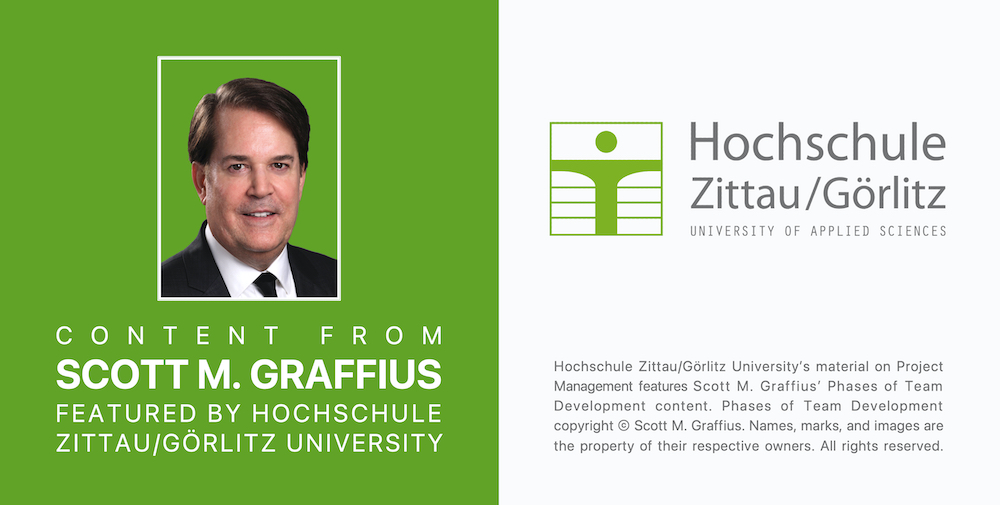
Select here to download this article as a PDF.
Businesses, professional associations, governments, and universities have used and featured Scott M. Graffius and content from his books, talks, workshops, and more. Examples of organizations include Microsoft, Oracle, Broadcom, Cisco, Gartner, Project Management Institute, IEEE, National Academy of Sciences, United States Department of Energy, New Zealand Ministry of Education, Yale University, Tufts University, and many others.
This month, Hochschule Zittau/Görlitz (Zittau/Görlitz University of Applied Sciences) was added to the list of organizations. Dr. Ingo Cassack, Professor at the university, incorporated Graffius' Phases of Team Development work into Dr. Cassack's material on project management. Two excerpts follow.
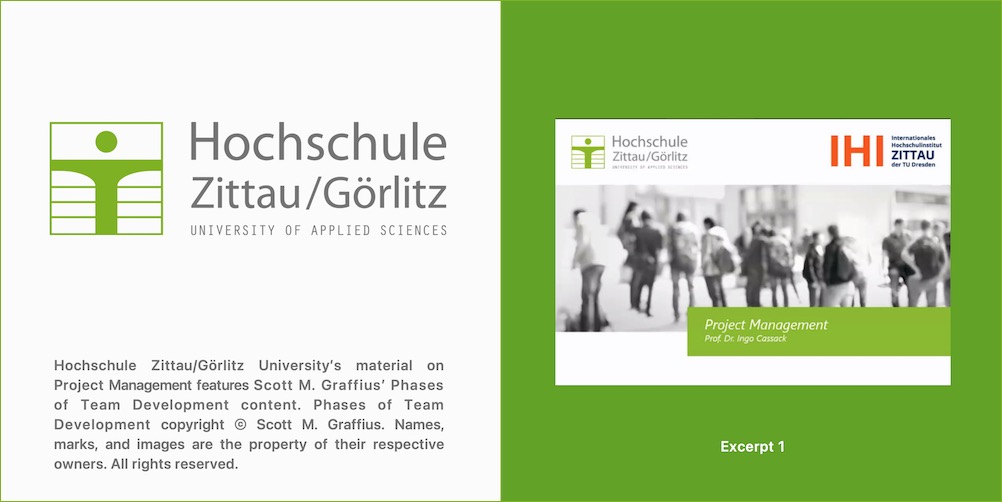
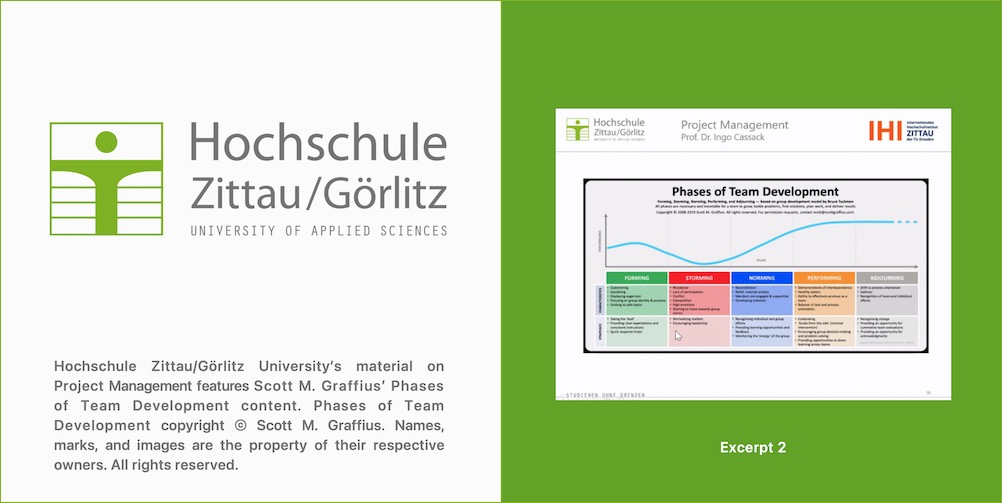
To learn more about Scott M. Graffius' Phases of Team Development, visit here.
Oksana Makovoz wrote about the presentation which included Graffius' work, among other details. She posted on:
About Hochschule Zittau/Görlitz
Hochschule Zittau/Görlitz (Zittau/Görlitz University of Applied Sciences) is a non-profit public higher-education institution located in Zittau — in the border triangle between Germany, the Czech Republic, and Poland . The institution also has a branch campus in Görlitz, Saxon, Germany. Officially recognized by the Sächsisches Staatsministerium für Wissenschaft und Kunst (Saxon State Ministry of Science and the Arts), Hochschule Zittau/Görlitz is a top tier coeducational German higher education institution with no tuition fees, state-of-the-art equipment, and intensive support. Visit https://www.hszg.de to learn more.




About Scott M. Graffius

Scott M. Graffius, PMP, SA, CSP-SM, CSP-PO, CSM, CSPO, SFE, ITIL, LSSGB is an agile project management practitioner, consultant, multi-award-winning author, and international keynote speaker. He is the Founder of Exceptional PPM and PMO Solutions™ and subsidiary Exceptional Agility™. He has generated over $1.9 billion of business value in aggregate for Global Fortune 500 businesses and other organizations he has served. Graffius and content from his books, talks, workshops, and more have been featured and used by businesses, professional associations, governments, and universities. Examples include Microsoft, Oracle, Broadcom, Cisco, Gartner, Project Management Institute, IEEE, Qantas, National Academy of Sciences, United States Department of Energy, New Zealand Ministry of Education, Yale University, Tufts University, and others. He has delighted audiences with dynamic and engaging talks and workshops on agile, project management, and technology leadership at 85 conferences and other events across 25 countries.
His full bio is available here.
Connect with Scott on:


About Agile Scrum: Your Quick Start Guide with Step-by-Step Instructions

Shifting customer needs are common in today's marketplace. Businesses must be adaptive and responsive to change while delivering an exceptional customer experience to be competitive.
There are a variety of frameworks supporting the development of products and services, and most approaches fall into one of two broad categories: traditional or agile. Traditional practices such as waterfall engage sequential development, while agile involves iterative and incremental deliverables. Organizations are increasingly embracing agile to manage projects, and best meet their business needs of rapid response to change, fast delivery speed, and more.
With clear and easy to follow instructions, the multi award-winning Agile Scrum: Your Quick Start Guide with Step-by-Step Instructions book by Scott M. Graffius (Chris Hare and Colin Giffen, Technical Editors) helps the reader:
Hailed by Literary Titan as “the book highlights the versatility of Scrum beautifully.”
Winner of 17 first place awards.
Agile Scrum: Your Quick Start Guide with Step-by-Step Instructions is available in paperback and ebook/Kindle in the United States and around the world. Some links by country follow.

About Agile Transformation: A Brief Story of How an Entertainment Company Developed New Capabilities and Unlocked Business Agility to Thrive in an Era of Rapid Change

Thriving in today's marketplace frequently depends on making a transformation to become more agile. Those successful in the transition enjoy faster delivery speed and ROI, higher satisfaction, continuous improvement, and additional benefits.
Based on actual events, Agile Transformation: A Brief Story of How an Entertainment Company Developed New Capabilities and Unlocked Business Agility to Thrive in an Era of Rapid Change provides a quick (60-90 minute) read about a successful agile transformation at a multinational entertainment and media company, told from the author's perspective as an agile coach.
The award-winning book by Scott M. Graffius is available in paperback and ebook/Kindle in the United States and around the world. Some links by country follow.

The short URL for this article is: https://bit.ly/hszg-2023
© Copyright 2023 Scott M. Graffius. All rights reserved. This material may not be published, broadcast, rewritten or redistributed without the express written permission of Scott M. Graffius.


Select here to download this article as a PDF.
Businesses, professional associations, governments, and universities have used and featured Scott M. Graffius and content from his books, talks, workshops, and more. Examples of organizations include Microsoft, Oracle, Broadcom, Cisco, Gartner, Project Management Institute, IEEE, National Academy of Sciences, United States Department of Energy, New Zealand Ministry of Education, Yale University, Tufts University, and many others.
This month, Hochschule Zittau/Görlitz (Zittau/Görlitz University of Applied Sciences) was added to the list of organizations. Dr. Ingo Cassack, Professor at the university, incorporated Graffius' Phases of Team Development work into Dr. Cassack's material on project management. Two excerpts follow.


To learn more about Scott M. Graffius' Phases of Team Development, visit here.
Oksana Makovoz wrote about the presentation which included Graffius' work, among other details. She posted on:
About Hochschule Zittau/Görlitz
Hochschule Zittau/Görlitz (Zittau/Görlitz University of Applied Sciences) is a non-profit public higher-education institution located in Zittau — in the border triangle between Germany, the Czech Republic, and Poland . The institution also has a branch campus in Görlitz, Saxon, Germany. Officially recognized by the Sächsisches Staatsministerium für Wissenschaft und Kunst (Saxon State Ministry of Science and the Arts), Hochschule Zittau/Görlitz is a top tier coeducational German higher education institution with no tuition fees, state-of-the-art equipment, and intensive support. Visit https://www.hszg.de to learn more.



About Scott M. Graffius

Scott M. Graffius, PMP, SA, CSP-SM, CSP-PO, CSM, CSPO, SFE, ITIL, LSSGB is an agile project management practitioner, consultant, multi-award-winning author, and international keynote speaker. He is the Founder of Exceptional PPM and PMO Solutions™ and subsidiary Exceptional Agility™. He has generated over $1.9 billion of business value in aggregate for Global Fortune 500 businesses and other organizations he has served. Graffius and content from his books, talks, workshops, and more have been featured and used by businesses, professional associations, governments, and universities. Examples include Microsoft, Oracle, Broadcom, Cisco, Gartner, Project Management Institute, IEEE, Qantas, National Academy of Sciences, United States Department of Energy, New Zealand Ministry of Education, Yale University, Tufts University, and others. He has delighted audiences with dynamic and engaging talks and workshops on agile, project management, and technology leadership at 85 conferences and other events across 25 countries.
His full bio is available here.
Connect with Scott on:


About Agile Scrum: Your Quick Start Guide with Step-by-Step Instructions

Shifting customer needs are common in today's marketplace. Businesses must be adaptive and responsive to change while delivering an exceptional customer experience to be competitive.
There are a variety of frameworks supporting the development of products and services, and most approaches fall into one of two broad categories: traditional or agile. Traditional practices such as waterfall engage sequential development, while agile involves iterative and incremental deliverables. Organizations are increasingly embracing agile to manage projects, and best meet their business needs of rapid response to change, fast delivery speed, and more.
With clear and easy to follow instructions, the multi award-winning Agile Scrum: Your Quick Start Guide with Step-by-Step Instructions book by Scott M. Graffius (Chris Hare and Colin Giffen, Technical Editors) helps the reader:
- Implement and use the most popular agile framework―Scrum;
- Deliver products in short cycles with rapid adaptation to change, fast time-to-market, and continuous improvement; and
- Support innovation and drive competitive advantage.
Hailed by Literary Titan as “the book highlights the versatility of Scrum beautifully.”
Winner of 17 first place awards.
Agile Scrum: Your Quick Start Guide with Step-by-Step Instructions is available in paperback and ebook/Kindle in the United States and around the world. Some links by country follow.
- 🇧🇷 Brazil
- 🇨🇦 Canada
- 🇨🇿 Czech Republic
- 🇩🇰 Denmark
- 🇫🇮 Finland
- 🇫🇷 France
- 🇩🇪 Germany
- 🇬🇷 Greece
- 🇭🇺 Hungary
- 🇮🇳 India
- 🇮🇪 Ireland
- 🇮🇱 Israel
- 🇮🇹 Italy
- 🇯🇵 Japan
- 🇱🇺 Luxembourg
- 🇲🇽 Mexico
- 🇳🇱 Netherlands
- 🇳🇿 New Zealand
- 🇳🇴 Norway
- 🇪🇸 Spain
- 🇸🇪 Sweden
- 🇨🇭 Switzerland
- 🇦🇪 UAE
- 🇬🇧 United Kingdom
- 🇺🇸 United States

About Agile Transformation: A Brief Story of How an Entertainment Company Developed New Capabilities and Unlocked Business Agility to Thrive in an Era of Rapid Change

Thriving in today's marketplace frequently depends on making a transformation to become more agile. Those successful in the transition enjoy faster delivery speed and ROI, higher satisfaction, continuous improvement, and additional benefits.
Based on actual events, Agile Transformation: A Brief Story of How an Entertainment Company Developed New Capabilities and Unlocked Business Agility to Thrive in an Era of Rapid Change provides a quick (60-90 minute) read about a successful agile transformation at a multinational entertainment and media company, told from the author's perspective as an agile coach.
The award-winning book by Scott M. Graffius is available in paperback and ebook/Kindle in the United States and around the world. Some links by country follow.
- 🇦🇺 Australia
- 🇦🇹 Austria
- 🇧🇷 Brazil
- 🇨🇦 Canada
- 🇨🇿 Czech Republic
- 🇩🇰 Denmark
- 🇫🇮 Finland
- 🇫🇷 France
- 🇩🇪 Germany
- 🇬🇷 Greece
- 🇮🇳 India
- 🇮🇪 Ireland
- 🇯🇵 Japan
- 🇱🇺 Luxembourg
- 🇲🇽 Mexico
- 🇳🇱 Netherlands
- 🇳🇿 New Zealand
- 🇪🇸 Spain
- 🇸🇪 Sweden
- 🇨🇭 Switzerland
- 🇦🇪 United Arab Emirates
- 🇬🇧 United Kingdom
- 🇺🇸 United States

The short URL for this article is: https://bit.ly/hszg-2023
© Copyright 2023 Scott M. Graffius. All rights reserved. This material may not be published, broadcast, rewritten or redistributed without the express written permission of Scott M. Graffius.

AI is a Team Sport: A Confluence of Diverse Technical and Soft Skills are Crucial for Success
01 May 2023
BY SCOTT M. GRAFFIUS | ScottGraffius.com

Select here to download this article as a PDF.
This article covers the significance of well-rounded AI teams, including how both soft and technical skills are critical and fuel success. It’s informed by Graffius' work on AI projects as well as research and coverage from DARPA, IBM, IEEE, MIT, Microsoft, Software Engineering Institute, Stanford University, United States Artificial Intelligence Institute, and others (all listed in the bibliography section of this article).

Introduction
Artificial Intelligence (AI) has emerged as a transformative force across a growing number of industries, revolutionizing how we live, work, and interact. From autonomous vehicles and virtual assistants to personalized recommendations and medical diagnoses, AI systems have become integral to our daily lives. Behind these cutting-edge, life-changing solutions are AI teams that possess a combination of soft skills—also known as core skills, interpersonal skills, people skills, power skills, transferable skills, or transversal skills—and technical expertise.
This article highlights the synergy between soft skills and technical skills in the world of AI. While technical skills provide the general foundation for AI development, it’s the soft skills that elevate AI projects to new heights. From effective communication and critical thinking to leadership and teamwork, soft skills play a pivotal role in translating technical knowledge and capabilities into real-world applications.
The thesis of this article is that the successful development and application of AI requires a combination of soft skills and technical expertise. Technical competencies alone are not enough. Rather, it’s the combination and integration of soft and technical skills that truly unlocks the power of AI.
Next, this article focuses on the importance of soft skills in the AI landscape, highlighting how they complement and enhance technical abilities. The collaboration between these skill sets drives AI innovation.

Understanding Soft Skills in AI Teams
In the realm of AI, technical expertise often takes center stage. However, soft skills advance the successful outcomes of AI projects, as they facilitate effective communication, foster collaboration, and promote critical thinking. Soft skills are powerful facilitators of success.
Soft skills encompass a range of interpersonal and cognitive abilities that enable teams to work harmoniously, adapt to evolving challenges, and solve complex problems. In the AI landscape, where multidisciplinary teams come together to create innovative solutions, these soft skills are essential.
Effective communication stands at the forefront of soft skills in AI. AI teams must articulate complex technical concepts in a manner that is understandable to diverse stakeholders, including non-technical staff and internal or external customers/users. Clear communication promotes collaboration and ensures alignment of purpose and objectives throughout the AI development lifecycle.
Soft skills such as problem-solving and critical thinking are vital as well. AI teams frequently encounter multifaceted challenges, and it is through these soft skills that teams can identify potential bottlenecks, navigate complexities, and devise innovative solutions. By leveraging critical thinking, AI team members can evaluate different approaches, consider ethical implications, and make informed decisions that shape the development and application of AI systems.
Leadership and teamwork skills are also paramount. AI projects involve team members from diverse backgrounds, including data scientists, engineers, domain experts, designers, and others. Effective leadership enables the coordination of efforts and guides the project towards success. Similarly, teamwork skills foster an environment of trust and respect, promoting synergy among team members and enhancing overall productivity.
Recognizing the importance of soft skills in AI is crucial for fostering a balanced and effective team dynamic. It ensures that AI teams possess the interpersonal and cognitive abilities necessary to bring AI projects to fruition. The integration of soft skills alongside technical expertise sets the stage for a cohesive team capable of tackling complex AI challenges with agility and innovation.
The role of technical skills—including how they intersect with soft skills to create a powerful combination that drives success—are covered next.
The Role of Technical Skills in AI Teams
Technical skills provide the tools and knowledge required to design, build, and implement AI systems. This section explores the role that technical skills play in AI and their specific applications in various stages of AI projects.
Technical skills are essential for AI projects. They enable team members to translate concepts, theories, and algorithms into practical applications. However, technical skills alone are not sufficient for success. The collaborative nature of AI development and the need for a well-rounded AI team—including the synergy between technical skills and soft skills—is covered next.
The Power of Synergy: Soft Skills and Technical Skills in AI Teams
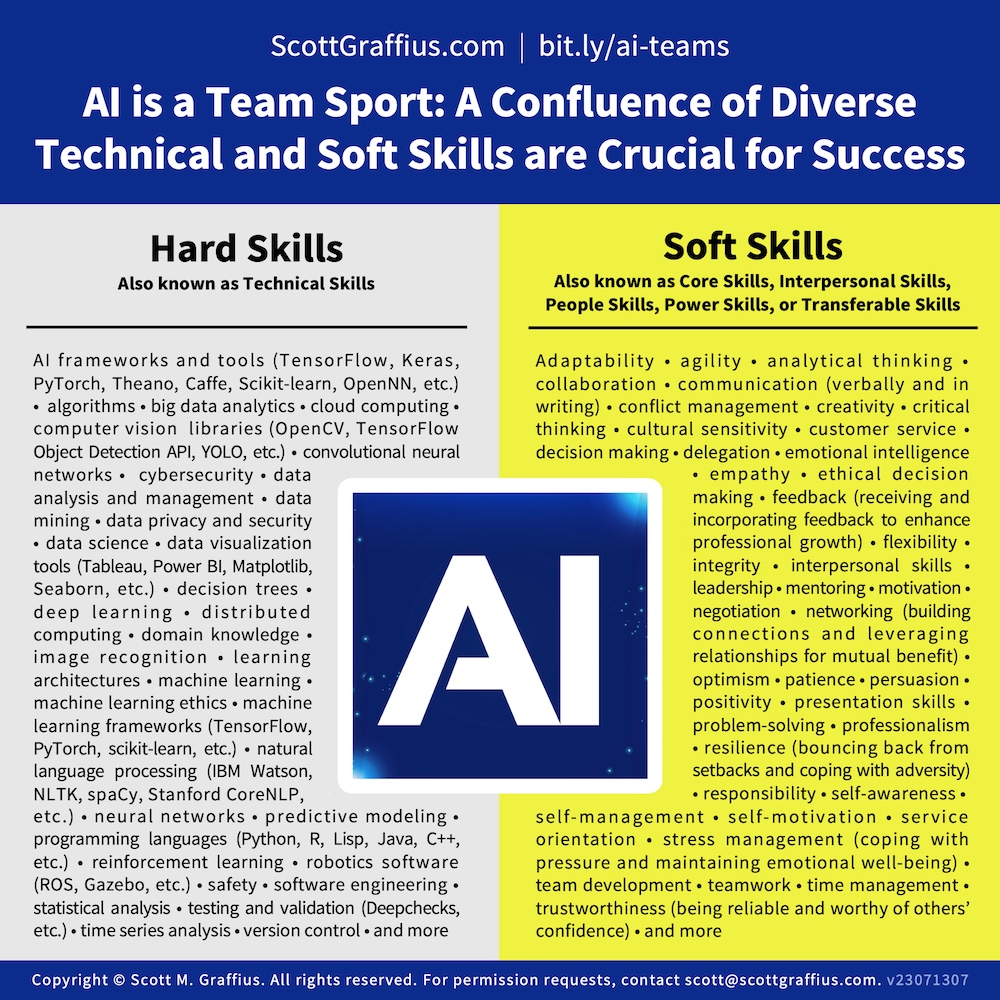
The convergence of soft skills and technical skills is where true innovation and breakthroughs occur. The successful development and application of AI systems rely not only on technical expertise but also on the harmonious integration of soft skills. Here’s some examples of the power of synergy between these skill sets, including how they work together to drive AI advancement:
The synergy between soft skills and technical skills is the catalyst that drives AI projects towards success. It enables AI teams to go beyond technical expertise and develop AI systems that address real-world problems effectively. By embracing a holistic approach that values both soft skills and technical skills, organizations can foster an environment where AI thrives, resulting in innovative solutions that have a positive impact on society.
Strategies for developing and nurturing soft skills are covered next.
Developing and Advancing Soft Skills in AI Teams
AI teams need soft skills to be successful. Organizations and teams should prioritize the development and advancement of these skills. Here are some strategies to enhance soft skills and foster a well-rounded AI workforce:
By implementing these strategies, organizations can cultivate a workforce that excels not only in technical skills but also in the essential soft skills required for AI success. Nurturing well-rounded AI professionals creates a collaborative and adaptive environment, where AI teams can effectively address complex challenges, drive innovation, and deliver impactful solutions.
The next section wraps up this exploration.
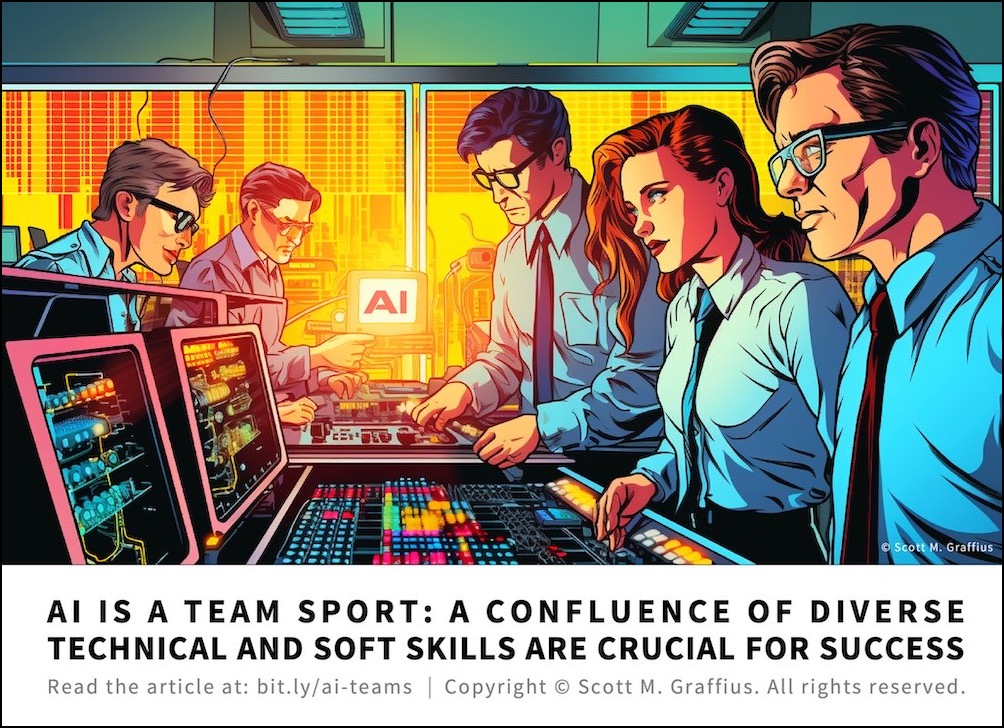

Conclusion
The successful development and application of AI systems rely on the synergy between soft skills and technical skills. While technical expertise forms the foundation, it's the integration of soft skills that elevates AI projects to new heights. Effective communication, collaboration, critical thinking, and leadership are among the key soft skills that enable AI teams to excel.
This article explored the significance of soft skills in AI, emphasizing their role in fostering effective teamwork, problem-solving, and innovation. It also acknowledged the indispensable role of technical skills in AI development, including programming languages, algorithms, data analysis, domain knowledge, and more.
Organizations can create well-rounded AI teams with a holistic set of abilities by embracing the power of synergy between soft skills and technical skills. AI team members with strong soft skills can effectively communicate their ideas, collaborate seamlessly, think critically, and provide leadership that empowers their teams.
To advance soft skills among AI professionals, organizations should invest in training programs, promote interdisciplinary collaboration, encourage continuous learning, and foster mentorship and coaching relationships. These efforts will help AI professionals develop the interpersonal and cognitive abilities necessary to thrive in the dynamic and collaborative AI landscape.
AI is a team sport that thrives on the confluence of soft skills and technical skills. By recognizing and embracing this synergy, organizations can unlock the full potential of AI, delivering innovative solutions that address real-world challenges and have a positive impact on the world.

References/Sources
All of the supplied links were functional when this article was published.

How to Cite This Article
Graffius, Scott M. (2023, May 1). AI is a Team Sport: A Confluence of Diverse Technical and Soft Skills are Crucial for Success. Available at: https://scottgraffius.com/blog/files/successful-ai-teams.html. DOI: 10.13140/RG.2.2.20321.79200.





About Scott M. Graffius
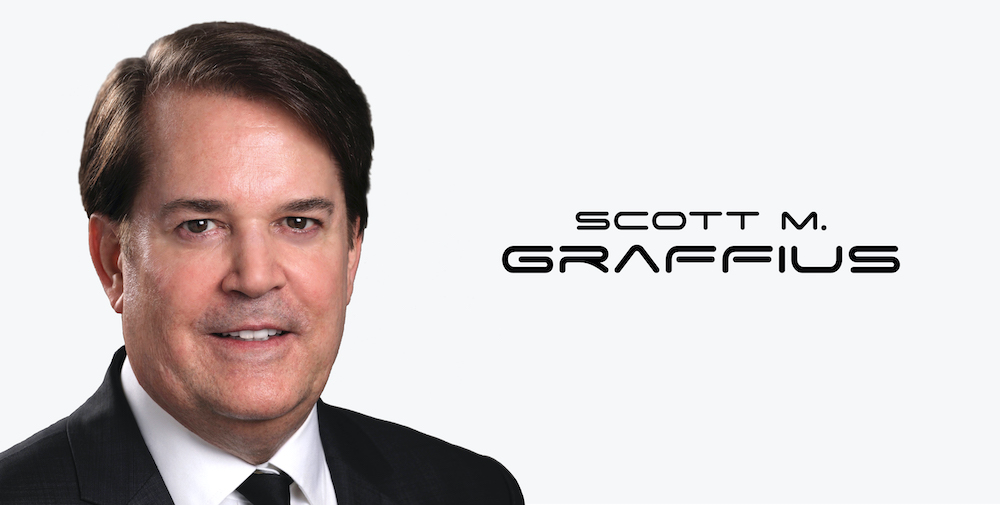
Scott M. Graffius, PMP, SA, CSP-SM, CSP-PO, CSM, CSPO, SFE, ITIL, LSSGB is an agile project management practitioner, consultant, multi-award-winning author, and international keynote speaker. He is the Founder of Exceptional PPM and PMO Solutions™ and subsidiary Exceptional Agility™. He has generated over $1.9 billion of business value in aggregate for Global Fortune 500 businesses and other organizations he has served. Graffius and content from his books, talks, workshops, and more have been featured and used by businesses, professional associations, governments, and universities. Examples include Microsoft, Oracle, Broadcom, Cisco, Gartner, Project Management Institute, IEEE, Qantas, National Academy of Sciences, United States Department of Energy, New Zealand Ministry of Education, Yale University, Tufts University, and others. He has delighted audiences with dynamic and engaging talks and workshops on agile, project management, and technology leadership at 85 conferences and other events across 25 countries.
His full bio is available here.
Connect with Scott on:


About Agile Scrum: Your Quick Start Guide with Step-by-Step Instructions

Shifting customer needs are common in today's marketplace. Businesses must be adaptive and responsive to change while delivering an exceptional customer experience to be competitive.
There are a variety of frameworks supporting the development of products and services, and most approaches fall into one of two broad categories: traditional or agile. Traditional practices such as waterfall engage sequential development, while agile involves iterative and incremental deliverables. Organizations are increasingly embracing agile to manage projects, and best meet their business needs of rapid response to change, fast delivery speed, and more.
With clear and easy to follow instructions, the multi award-winning Agile Scrum: Your Quick Start Guide with Step-by-Step Instructions book by Scott M. Graffius (Chris Hare and Colin Giffen, Technical Editors) helps the reader:
Hailed by Literary Titan as “the book highlights the versatility of Scrum beautifully.”
Winner of 17 first place awards.
Agile Scrum: Your Quick Start Guide with Step-by-Step Instructions is available in paperback and ebook/Kindle in the United States and around the world. Some links by country follow.

About Agile Transformation: A Brief Story of How an Entertainment Company Developed New Capabilities and Unlocked Business Agility to Thrive in an Era of Rapid Change

Thriving in today's marketplace frequently depends on making a transformation to become more agile. Those successful in the transition enjoy faster delivery speed and ROI, higher satisfaction, continuous improvement, and additional benefits.
Based on actual events, Agile Transformation: A Brief Story of How an Entertainment Company Developed New Capabilities and Unlocked Business Agility to Thrive in an Era of Rapid Change provides a quick (60-90 minute) read about a successful agile transformation at a multinational entertainment and media company, told from the author's perspective as an agile coach.
The award-winning book by Scott M. Graffius is available in paperback and ebook/Kindle in the United States and around the world. Some links by country follow.

The short URL for this article is: https://bit.ly/ai-teams
© Copyright 2023 Scott M. Graffius. All rights reserved. This material may not be published, broadcast, rewritten or redistributed without the express written permission of Scott M. Graffius.


Select here to download this article as a PDF.
This article covers the significance of well-rounded AI teams, including how both soft and technical skills are critical and fuel success. It’s informed by Graffius' work on AI projects as well as research and coverage from DARPA, IBM, IEEE, MIT, Microsoft, Software Engineering Institute, Stanford University, United States Artificial Intelligence Institute, and others (all listed in the bibliography section of this article).

Introduction
Artificial Intelligence (AI) has emerged as a transformative force across a growing number of industries, revolutionizing how we live, work, and interact. From autonomous vehicles and virtual assistants to personalized recommendations and medical diagnoses, AI systems have become integral to our daily lives. Behind these cutting-edge, life-changing solutions are AI teams that possess a combination of soft skills—also known as core skills, interpersonal skills, people skills, power skills, transferable skills, or transversal skills—and technical expertise.
This article highlights the synergy between soft skills and technical skills in the world of AI. While technical skills provide the general foundation for AI development, it’s the soft skills that elevate AI projects to new heights. From effective communication and critical thinking to leadership and teamwork, soft skills play a pivotal role in translating technical knowledge and capabilities into real-world applications.
The thesis of this article is that the successful development and application of AI requires a combination of soft skills and technical expertise. Technical competencies alone are not enough. Rather, it’s the combination and integration of soft and technical skills that truly unlocks the power of AI.
Next, this article focuses on the importance of soft skills in the AI landscape, highlighting how they complement and enhance technical abilities. The collaboration between these skill sets drives AI innovation.

Understanding Soft Skills in AI Teams
In the realm of AI, technical expertise often takes center stage. However, soft skills advance the successful outcomes of AI projects, as they facilitate effective communication, foster collaboration, and promote critical thinking. Soft skills are powerful facilitators of success.
Soft skills encompass a range of interpersonal and cognitive abilities that enable teams to work harmoniously, adapt to evolving challenges, and solve complex problems. In the AI landscape, where multidisciplinary teams come together to create innovative solutions, these soft skills are essential.
Effective communication stands at the forefront of soft skills in AI. AI teams must articulate complex technical concepts in a manner that is understandable to diverse stakeholders, including non-technical staff and internal or external customers/users. Clear communication promotes collaboration and ensures alignment of purpose and objectives throughout the AI development lifecycle.
Soft skills such as problem-solving and critical thinking are vital as well. AI teams frequently encounter multifaceted challenges, and it is through these soft skills that teams can identify potential bottlenecks, navigate complexities, and devise innovative solutions. By leveraging critical thinking, AI team members can evaluate different approaches, consider ethical implications, and make informed decisions that shape the development and application of AI systems.
Leadership and teamwork skills are also paramount. AI projects involve team members from diverse backgrounds, including data scientists, engineers, domain experts, designers, and others. Effective leadership enables the coordination of efforts and guides the project towards success. Similarly, teamwork skills foster an environment of trust and respect, promoting synergy among team members and enhancing overall productivity.
Recognizing the importance of soft skills in AI is crucial for fostering a balanced and effective team dynamic. It ensures that AI teams possess the interpersonal and cognitive abilities necessary to bring AI projects to fruition. The integration of soft skills alongside technical expertise sets the stage for a cohesive team capable of tackling complex AI challenges with agility and innovation.
The role of technical skills—including how they intersect with soft skills to create a powerful combination that drives success—are covered next.
The Role of Technical Skills in AI Teams
Technical skills provide the tools and knowledge required to design, build, and implement AI systems. This section explores the role that technical skills play in AI and their specific applications in various stages of AI projects.
- Programming Languages and Algorithms: Proficiency in programming languages such as Python, Java, or R is essential. These languages enable team members to write efficient code, manipulate and analyze data, and implement machine learning algorithms. Understanding algorithms, from classic ones like linear regression to cutting-edge deep learning models, empowers AI professionals to leverage mathematical principles and statistical techniques to train and optimize AI systems.
- Data Analysis and Management: AI relies on data, making data analysis and management skills crucial. AI team members need to be adept at collecting, cleaning, and preprocessing data, ensuring its quality and relevance. They must possess the knowledge of statistical methods, data visualization techniques, and data engineering practices to extract insights from complex datasets and prepare them for AI model training.
- Machine Learning and Neural Networks: Technical skills in machine learning are at the heart of AI systems. Understanding machine learning algorithms, such as decision trees, support vector machines, or convolutional neural networks, enables AI team members to create models that can learn from data and make intelligent predictions or decisions. Expertise in neural networks and deep learning architectures equips professionals with the ability to develop complex models capable of handling tasks like image recognition, natural language processing, and reinforcement learning.
- AI Frameworks and Tools: Proficiency in AI frameworks and tools (such as TensorFlow, Keras, PyTorch, Caffe, Scikit-learn, and others) are essential for building AI systems efficiently. These frameworks provide pre-built modules, libraries, and APIs that simplify the implementation of AI algorithms and models. Technical skills in utilizing these tools effectively enable AI team members to accelerate the development process, streamline model training, and optimize system performance.
- Domain Knowledge and Application-Specific Skills: Technical skills also encompass domain knowledge and application-specific expertise. Understanding the nuances of the industry or problem domain in which AI is being applied allows professionals to tailor AI solutions to meet specific requirements. For example, healthcare-focused AI projects may require knowledge of medical terminologies and regulatory considerations, while AI solutions for financial services may demand expertise in risk assessment and fraud detection.
Technical skills are essential for AI projects. They enable team members to translate concepts, theories, and algorithms into practical applications. However, technical skills alone are not sufficient for success. The collaborative nature of AI development and the need for a well-rounded AI team—including the synergy between technical skills and soft skills—is covered next.
The Power of Synergy: Soft Skills and Technical Skills in AI Teams

The convergence of soft skills and technical skills is where true innovation and breakthroughs occur. The successful development and application of AI systems rely not only on technical expertise but also on the harmonious integration of soft skills. Here’s some examples of the power of synergy between these skill sets, including how they work together to drive AI advancement:
- Effective Communication and Technical Expertise: Communication bridges the gap between AI professionals and others who may not possess technical backgrounds. AI experts with strong communication skills can articulate complex technical concepts in plain English, ensuring that everyone involved understands the goals, challenges, and progress of the project. By effectively conveying ideas, AI professionals foster collaboration, gather valuable insights, and create a shared vision for AI initiatives.
- Collaboration and Problem-Solving: Collaboration is at the core of AI development, and soft skills such as teamwork, empathy, and active listening facilitate effective collaboration among diverse team members. AI teams with strong collaboration skills can effectively pool their technical expertise, brainstorm ideas, and solve complex problems together. By leveraging their collective intelligence and diverse perspectives, AI teams can overcome challenges, refine AI models, and optimize the performance of AI solutions.
- Critical Thinking and Technical Innovation: Critical thinking, coupled with technical expertise, leads to innovative AI solutions. AI professionals with strong critical thinking skills can evaluate different approaches, challenge assumptions, and identify potential shortcomings or biases in AI models. They can think creatively to address issues such as data biases or fairness concerns, ensuring that AI systems are developed responsibly and ethically.
- Leadership and Team Empowerment: Effective leadership in AI projects involves establishing and maintaining a collaborative and inclusive environment, empowering team members, and harnessing their full potential. AI leaders with exceptional interpersonal abilities can inspire and motivate their team, foster a culture of continuous learning, and provide guidance in navigating complex technical challenges. They encourage interdisciplinary collaboration, respect diverse perspectives, and drive the team towards achieving AI objectives.
The synergy between soft skills and technical skills is the catalyst that drives AI projects towards success. It enables AI teams to go beyond technical expertise and develop AI systems that address real-world problems effectively. By embracing a holistic approach that values both soft skills and technical skills, organizations can foster an environment where AI thrives, resulting in innovative solutions that have a positive impact on society.
Strategies for developing and nurturing soft skills are covered next.
Developing and Advancing Soft Skills in AI Teams
AI teams need soft skills to be successful. Organizations and teams should prioritize the development and advancement of these skills. Here are some strategies to enhance soft skills and foster a well-rounded AI workforce:
- Training Programs and Workshops: Implement specialized training programs and workshops focused on enhancing soft skills. Offer courses in effective communication, leadership (including how to navigate the phases of team development), problem-solving, critical thinking, and collaboration. These programs can provide AI professionals with the necessary tools and techniques to effectively apply soft skills in their work.
- Interdisciplinary Collaboration and Knowledge Sharing: Encourage interdisciplinary collaboration by creating opportunities for AI team members to work alongside experts from diverse fields such as psychology, design, ethics, and business. This collaboration allows for cross-pollination of ideas, encourages different perspectives, and broadens the skill set of AI teams. Foster a culture of knowledge sharing, where professionals can learn from each other and leverage their collective experiences and expertise.
- Real-World Project Engagement: Provide AI team members with opportunities to work on (other) real-world projects, allowing them to apply their soft skills in practical scenarios. Engaging in projects that involve interaction with clients, end-users, and stakeholders helps AI team members develop effective communication, problem-solving, and teamwork skills.
- Continuous Learning and Professional Development: Encourage AI team members to engage in continuous learning and professional development activities. This can include attending conferences, participating in webinars, reading industry publications, and pursuing certifications in relevant areas. Promote a growth mindset among AI team members, emphasizing the importance of lifelong learning and staying current with the latest developments in both technical and soft skills domains.
- Mentorship and Coaching: Establish mentorship and coaching programs where experienced AI professionals guide and support individuals with less experience. Mentors can provide valuable insights, share their experiences, and offer guidance on developing skills. Regular feedback and coaching sessions help AI professionals identify areas for improvement and provide targeted development opportunities.
By implementing these strategies, organizations can cultivate a workforce that excels not only in technical skills but also in the essential soft skills required for AI success. Nurturing well-rounded AI professionals creates a collaborative and adaptive environment, where AI teams can effectively address complex challenges, drive innovation, and deliver impactful solutions.
The next section wraps up this exploration.


Conclusion
The successful development and application of AI systems rely on the synergy between soft skills and technical skills. While technical expertise forms the foundation, it's the integration of soft skills that elevates AI projects to new heights. Effective communication, collaboration, critical thinking, and leadership are among the key soft skills that enable AI teams to excel.
This article explored the significance of soft skills in AI, emphasizing their role in fostering effective teamwork, problem-solving, and innovation. It also acknowledged the indispensable role of technical skills in AI development, including programming languages, algorithms, data analysis, domain knowledge, and more.
Organizations can create well-rounded AI teams with a holistic set of abilities by embracing the power of synergy between soft skills and technical skills. AI team members with strong soft skills can effectively communicate their ideas, collaborate seamlessly, think critically, and provide leadership that empowers their teams.
To advance soft skills among AI professionals, organizations should invest in training programs, promote interdisciplinary collaboration, encourage continuous learning, and foster mentorship and coaching relationships. These efforts will help AI professionals develop the interpersonal and cognitive abilities necessary to thrive in the dynamic and collaborative AI landscape.
AI is a team sport that thrives on the confluence of soft skills and technical skills. By recognizing and embracing this synergy, organizations can unlock the full potential of AI, delivering innovative solutions that address real-world challenges and have a positive impact on the world.

References/Sources
All of the supplied links were functional when this article was published.
- Accenture (2023, March 30). Accenture Technology Vision 2023: Generative AI to Usher in a Bold New Future for Business, Merging Physical and Digital Worlds. Available at: https://newsroom.accenture.com/news/accenture-technology-vision-2023-generative-ai-to-usher-in-a-bold-new-future-for-business-merging-physical-and-digital-worlds.htm.
- Alsever, Jennifer (2020, January 20). Medicine by Machine: Is A.I. the Cure for the World’s Ailing Drug Industry? Fortune. Available at: https://fortune.com/longform/ai-artificial-intelligence-medicine-healthcare-pharmaceutical-industry.
- Berlin School of Business and Innovation (2022, September 22). How Do Technical Abilities Combined with Leadership Skills Fuel Career Growth? Available at: https://www.berlinsbi.com/blog/career-advice/how-do-technical-abilities-combined-with-leadership-skills-fuel-career-growth.
- Bhatti, Shawaiz, Demir, Mustafa, Cooke, Nancy J., & Johnson, Craig J. (2021). Assessing Communication and Trust in an AI Teammate in a Dynamic Task Environment. In: 2021 IEEE 2nd International Conference on Human-Machine Systems (ICHMS): 1–6. DOI: 10.1109/ICHMS53169.2021.9582626.
- Brooks, David (2023, February 2). In the Age of A.I., Major in Being Human. The New York Times. Available at: https://www.nytimes.com/2023/02/02/opinion/ai-human-education.html.
- Crampton, Natasha (2021, January 19). The Building Blocks of Microsoft’s Responsible AI Program. Microsoft. Available at: https://blogs.microsoft.com/on-the-issues/2021/01/19/microsoft-responsible-ai-program.
- Dolev, Niva, & Itzkovich, Yariv (2020). In the AI Era, Soft Skills are the New Hard Skills. In: Artificial Intelligence and Its Impact on Business, pp. 55-77. Charlotte, NC: Information Age Publishing.
- Dzombak, Rachel, & Palat, Jay (2021, August 30). 5 Ways to Start Growing an AI-Ready Workforce. Pittsburgh, PA: Software Engineering Institute, Carnegie Mellon University.
- Elliott, Joshua (n.d.). Artificial Social Intelligence for Successful Teams (ASIST). Arlington, VA: Defense Advanced Research Projects Agency (DARPA).
- Fountaine, Tim, McCarthy, Brian, & Saleh, Tamim (2019). Building the AI-Powered Organization. Harvard Business Review, 97 (4): 62–73.
- Gartner (2020, December 15). How to Staff Your AI Team. Available at: https://www.gartner.com/smarterwithgartner/how-to-staff-your-ai-team.
- Gorman, Austin (2023, April 27). How to Strengthen Your Soft Skills for AI and the Future of Work. Fast Company. Available at: https://www.fastcompany.com/90887540/how-to-strengthen-your-soft-skills-for-ai-and-the-future-of-work.
- GovExec Events (2020, July 1). Human Machine Team: The Intersection of Diverse Skill Sets [Video]. Defense One. Available at: https://www.youtube.com/watch?v=93wbNLKpbxg&t=1s.
- Graffius, Scott M. (2023, May 1). Fueling the Development of Innovative and Life-Changing AI Solutions [Presentation]. Talk delivered to an audience of Technology professionals (including Data Scientists, Machine Learning Engineers, Data Engineers, AI Researchers, Project Managers, Business Analysts, UX Designers, Software Developers, Cloud Architects, Data Privacy and Security Specialists, and others involved or interested in AI) at a private event in Mountain View, California, United States. Digital Object Identifier (DOI): 10.13140/RG.2.2.27956.73601. DOI link: https://dx.doi.org/10.13140/RG.2.2.27956.73601.
- Graffius, Scott M. (2023, April 26). The Science of High-Performance Teams [Presentation]. Talk delivered at the DevOps Institute’s SKILup Day 2023 Conference. Digital Object Identifier (DOI): 10.13140/RG.2.2.15888.28169. DOI link: https://dx.doi.org/10.13140/RG.2.2.15888.28169.
- Graffius, Scott M. (2023, January 9). Use the Phases of Team Development (Based on Bruce W. Tuckman's Model of Forming, Storming, Norming, Performing, and Adjourning) to Help Teams Grow and Advance: 2023 Update. Available at: https://scottgraffius.com. Digital Object Identifier (DOI): 10.13140/RG.2.2.10720.35846. DOI link: https://dx.doi.org/10.13140/RG.2.2.10720.35846.
- Graffius, Scott M. (2022, May 13). Want Happier and More Productive DevOps Teams? [Presentation]. Talk delivered at DevOpsDays Geneva, Switzerland 2022 Conference. Digital Object Identifier (DOI): 10.13140/RG.2.2.22252.85127. DOI link: https://dx.doi.org/10.13140/RG.2.2.22252.85127.
- Graffius, Scott M. (2021, October 5). Navigate the Phases of Team Development with Speed and Agility for Happier and More Productive Teams [Presentation]. Talk delivered at the Institute of Electrical and Electronics Engineers IEEE Day 2021 Conference. Digital Object Identifier (DOI): 10.13140/RG.2.2.20055.19365. DOI link: https://dx.doi.org/10.13140/RG.2.2.20055.19365.
- Graffius, Scott M. (2021, February 20). But First, the Team! [Presentation]. Talk delivered at the Brno, Czech Republic DevConf.CZ 2021 Conference. Digital Object Identifier (DOI): 10.13140/RG.2.2.29016.72964. DOI link: https://dx.doi.org/10.13140/RG.2.2.29016.72964.
- IBM (2019, September 26). Assemble the Team to Support a Data-Driven Project. Available at: https://www.ibm.com/garage/method/practices/culture/assemble-team-for-data-driven-project.
- IBM (2019). Everyday Ethics for Artificial Intelligence. Available at: https://www.ibm.com/watson/assets/duo/pdf/everydayethics.pdf.
- Institute of Electrical and Electronics Engineers (IEEE) (2021, November 8). The IEEE Global Initiative on Ethics of Autonomous and Intelligent Systems. Available at: https://standards.ieee.org/industry-connections/ec/autonomous-systems.html.
- Kenan Institute (2023, February 20). The Must-Have Skills in the Era of Artificial Intelligence: How AI’s Democratization Will Impact Workers. Available at: https://kenaninstitute.unc.edu/commentary/the-must-have-skills-in-the-era-of-artificial-intelligence-how-ais-democratization-will-impact-workers.
- Lindzon, Jared (2017, February 28). How AI is Changing the Way Companies are Organized. Fast Company. Available at: https://www.fastcompany.com/3068492/how-ai-is-changing-the-way-companies-are-organized.
- Marr, Bernard (2023, March 20). Beyond The Hype: What You Really Need to Know About AI In 2023. Forbes. Available at: https://www.forbes.com/sites/bernardmarr/2023/03/20/beyond-the-hype-what-you-really-need-to-know-about-ai-in-2023.
- Massachusetts Institute of Technology (MIT) Lincoln Laboratory (2023, January 17). Human-AI Performance Incubator. Available at: https://www.ll.mit.edu/r-d/projects/human-ai-performance-incubator.
- Massachusetts Institute of Technology (MIT) (2021, January). Cognitive Science as a New People Science for the Future of Work. Available at: https://workofthefuture.mit.edu/wp-content/uploads/2021/01/2021-Research-Brief-Polli-Kassir-Dolphin-Baker-Gabrieli.pdf.
- Massachusetts Institute of Technology (MIT) Sloan (2019, October 15). Winning With AI. MIT Sloan Management Review and Boston Consulting Group. Available at: https://sloanreview.mit.edu/projects/winning-with-ai.
- McNeese, Nathan J., Demir, Mustafa, Chiou, Erin K., & Cooke, Nancy J. (2021). Trust and Team Performance in Human–Autonomy Teaming. International Journal of Electronic Commerce, 25 (1): 51–72. DOI: 10.1080/10864415.2021.1846854.
- Mearian, Lucas (2023, February 24). Skills-Based Hiring Continues to Rise as Degree Requirements Fade. Computerworld. Available at: https://www.computerworld.com/article/3689170/skills-based-hiring-continues-to-rise-as-degree-requirements-fade.html.
- Microsoft (2019, June 15). Is the Latest Technology the Key to Your Team’s Success, or is There Something Else? Available at: https://devblogs.microsoft.com/premier-developer/is-the-latest-technology-the-key-to-your-teams-success-or-is-there-something-else.
- New South Wales Technical and Further Education Commission (TAFE NSW) (2019). Soft vs. Hard Skills: Why Successful Australian Businesses Need Both. Ultimo, New South Wales: TAFE NSW.
- O’Dea, Blathnaid (2023, February 17). These are the Top Skills AI and Analytics Professionals Need. Silicon Republic. Available at: https://www.siliconrepublic.com/advice/top-skills-ai-data-analytics-professionals-need.
- Organization for Economic Cooperation and Development (OECD) (n.d.). OECD Programme on AI in Work, Innovation, Productivity and Skills. Available at: https://oecd.ai/en/work-innovation-productivity-skills/key-themes/skills.
- Oswald, Andrew. J., Proto, Eugenio, & Sgroi, Daniel (2015). Happiness and Productivity. Journal of Labor Economics, 33 (4): 789-822.
- Project Management Institute (2020, March 10). Tomorrow's Teams Today: The Future of Teaming: Creative, Collaborative and Agile. Pulse of the Profession. Available at: https://www.pmi.org/learning/library/pulse-indepth-tomorrows-teams-today-11941.
- PwC (2017). Sizing the Prize: What’s the Real Value of AI for Your Business and How Can You Capitalise? PwC’s Global Artificial Intelligence Study: Exploiting the AI Revolution. Available at: https://www.pwc.com/gx/en/issues/data-and-analytics/publications/artificial-intelligence-study.html.
- Rayside, Derek (Ed.) (2023, March 29). Software Engineering Capstone Design Project Handbook (2023 Edition). Waterloo, Ontario, Canada: University of Waterloo.
- Romsey, Joseph (2020, November 30). 5 Tips to Help Workers Upskill and Adapt to Artificial Intelligence. Society for Human Resource Management (SHRM). Available at: https://www.shrm.org/resourcesandtools/hr-topics/technology/pages/how-hr-can-help-workers-upskill-and-adapt-to-artificial-intelligence-5-tips.aspx.
- Stanford University (2019, September). Gathering Strength, Gathering Storms. Stanford, CA: Stanford University.
- Tredinnick, Luke (2017). Artificial Intelligence and Professional Roles. Business Information Review, 34 (1): 37–41.
- Ungerleider, Neal (2023, January 1). AI and Jobs: The Human Angle. Available at: https://www.sap.com/denmark/insights/viewpoints/ai-jobs-human-angle.html.
- United Nations Educational, Scientific and Cultural Organization (UNESCO) (2021, July 2). AI Ethics: Another Step Closer to the Adoption of UNESCO’s Recommendation. Available at: https://en.unesco.org/news/ai-ethics-another-step-closer-adoption-unescos-recommendation-0.
- United States Artificial Intelligence Institute (USAII) (2022). Factsheet: Fast-Track Your Artificial Intelligence Career in 2023. Stamford, CT: USAII.
- United States Congress Committee on Science, Space, and Technology (2019, September 24). Artificial Intelligence and the Future of Work. Report for the One Hundred Sixteenth Congress. Available at: https://www.congress.gov/116/chrg/CHRG-116hhrg37740/CHRG-116hhrg37740.pdf.
- University of Leeds (2023, March 2). The Top 5 AI Skills You Need to Land a Job in Artificial Intelligence. Available at: https://pg-online.leeds.ac.uk/blogs/5-skills-needed-for-ai.
- World Manufacturing Foundation (2020). 2020 World Manufacturing Report: Manufacturing in the Age of Artificial Intelligence. Available at: https://worldmanufacturing.org/wp-content/uploads/WorldManufacturingForum2020_Report.pdf.

How to Cite This Article
Graffius, Scott M. (2023, May 1). AI is a Team Sport: A Confluence of Diverse Technical and Soft Skills are Crucial for Success. Available at: https://scottgraffius.com/blog/files/successful-ai-teams.html. DOI: 10.13140/RG.2.2.20321.79200.



About Scott M. Graffius

Scott M. Graffius, PMP, SA, CSP-SM, CSP-PO, CSM, CSPO, SFE, ITIL, LSSGB is an agile project management practitioner, consultant, multi-award-winning author, and international keynote speaker. He is the Founder of Exceptional PPM and PMO Solutions™ and subsidiary Exceptional Agility™. He has generated over $1.9 billion of business value in aggregate for Global Fortune 500 businesses and other organizations he has served. Graffius and content from his books, talks, workshops, and more have been featured and used by businesses, professional associations, governments, and universities. Examples include Microsoft, Oracle, Broadcom, Cisco, Gartner, Project Management Institute, IEEE, Qantas, National Academy of Sciences, United States Department of Energy, New Zealand Ministry of Education, Yale University, Tufts University, and others. He has delighted audiences with dynamic and engaging talks and workshops on agile, project management, and technology leadership at 85 conferences and other events across 25 countries.
His full bio is available here.
Connect with Scott on:


About Agile Scrum: Your Quick Start Guide with Step-by-Step Instructions

Shifting customer needs are common in today's marketplace. Businesses must be adaptive and responsive to change while delivering an exceptional customer experience to be competitive.
There are a variety of frameworks supporting the development of products and services, and most approaches fall into one of two broad categories: traditional or agile. Traditional practices such as waterfall engage sequential development, while agile involves iterative and incremental deliverables. Organizations are increasingly embracing agile to manage projects, and best meet their business needs of rapid response to change, fast delivery speed, and more.
With clear and easy to follow instructions, the multi award-winning Agile Scrum: Your Quick Start Guide with Step-by-Step Instructions book by Scott M. Graffius (Chris Hare and Colin Giffen, Technical Editors) helps the reader:
- Implement and use the most popular agile framework―Scrum;
- Deliver products in short cycles with rapid adaptation to change, fast time-to-market, and continuous improvement; and
- Support innovation and drive competitive advantage.
Hailed by Literary Titan as “the book highlights the versatility of Scrum beautifully.”
Winner of 17 first place awards.
Agile Scrum: Your Quick Start Guide with Step-by-Step Instructions is available in paperback and ebook/Kindle in the United States and around the world. Some links by country follow.
- 🇧🇷 Brazil
- 🇨🇦 Canada
- 🇨🇿 Czech Republic
- 🇩🇰 Denmark
- 🇫🇮 Finland
- 🇫🇷 France
- 🇩🇪 Germany
- 🇬🇷 Greece
- 🇭🇺 Hungary
- 🇮🇳 India
- 🇮🇪 Ireland
- 🇮🇱 Israel
- 🇮🇹 Italy
- 🇯🇵 Japan
- 🇱🇺 Luxembourg
- 🇲🇽 Mexico
- 🇳🇱 Netherlands
- 🇳🇿 New Zealand
- 🇳🇴 Norway
- 🇪🇸 Spain
- 🇸🇪 Sweden
- 🇨🇭 Switzerland
- 🇦🇪 UAE
- 🇬🇧 United Kingdom
- 🇺🇸 United States

About Agile Transformation: A Brief Story of How an Entertainment Company Developed New Capabilities and Unlocked Business Agility to Thrive in an Era of Rapid Change

Thriving in today's marketplace frequently depends on making a transformation to become more agile. Those successful in the transition enjoy faster delivery speed and ROI, higher satisfaction, continuous improvement, and additional benefits.
Based on actual events, Agile Transformation: A Brief Story of How an Entertainment Company Developed New Capabilities and Unlocked Business Agility to Thrive in an Era of Rapid Change provides a quick (60-90 minute) read about a successful agile transformation at a multinational entertainment and media company, told from the author's perspective as an agile coach.
The award-winning book by Scott M. Graffius is available in paperback and ebook/Kindle in the United States and around the world. Some links by country follow.
- 🇦🇺 Australia
- 🇦🇹 Austria
- 🇧🇷 Brazil
- 🇨🇦 Canada
- 🇨🇿 Czech Republic
- 🇩🇰 Denmark
- 🇫🇮 Finland
- 🇫🇷 France
- 🇩🇪 Germany
- 🇬🇷 Greece
- 🇮🇳 India
- 🇮🇪 Ireland
- 🇯🇵 Japan
- 🇱🇺 Luxembourg
- 🇲🇽 Mexico
- 🇳🇱 Netherlands
- 🇳🇿 New Zealand
- 🇪🇸 Spain
- 🇸🇪 Sweden
- 🇨🇭 Switzerland
- 🇦🇪 United Arab Emirates
- 🇬🇧 United Kingdom
- 🇺🇸 United States

The short URL for this article is: https://bit.ly/ai-teams
© Copyright 2023 Scott M. Graffius. All rights reserved. This material may not be published, broadcast, rewritten or redistributed without the express written permission of Scott M. Graffius.

Scott M. Graffius' Content Featured by Erste Bank
05 July 2023
BY SCOTT M. GRAFFIUS | ScottGraffius.com
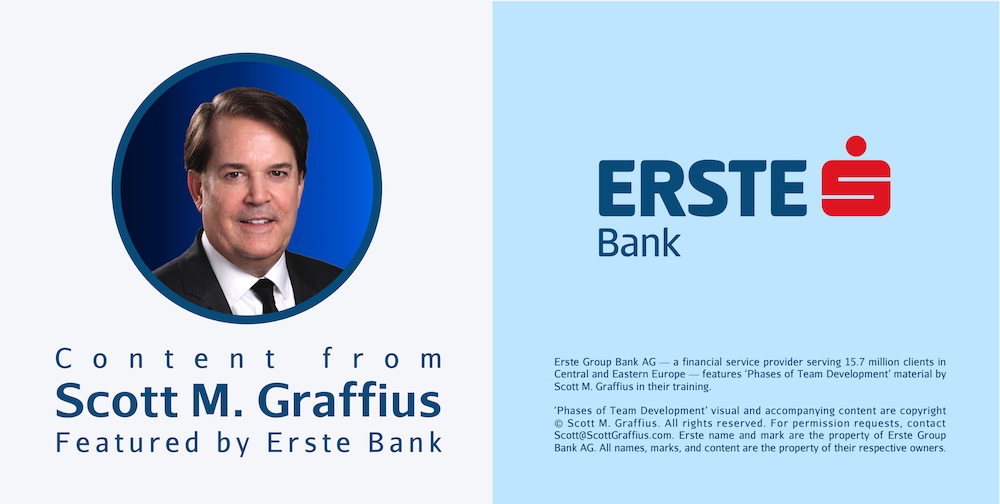
Select here to download a PDF of this article.
Erste Group Bank AG — a financial service provider serving 15.7 million clients in Central and Eastern Europe — featured Scott M. Graffius' Phases of Team Development material in their training.
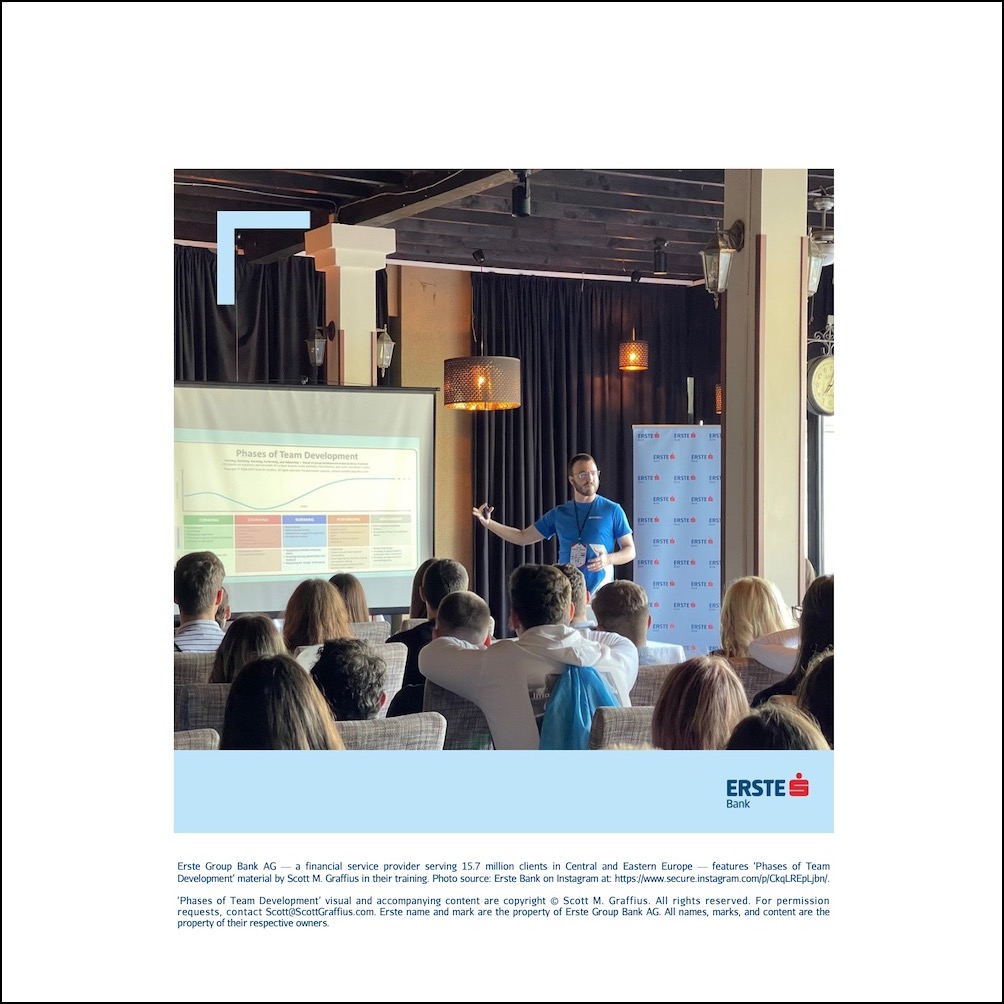
The picture above shows Erste Bank using Graffius' Phases of Team Development material at their training session.
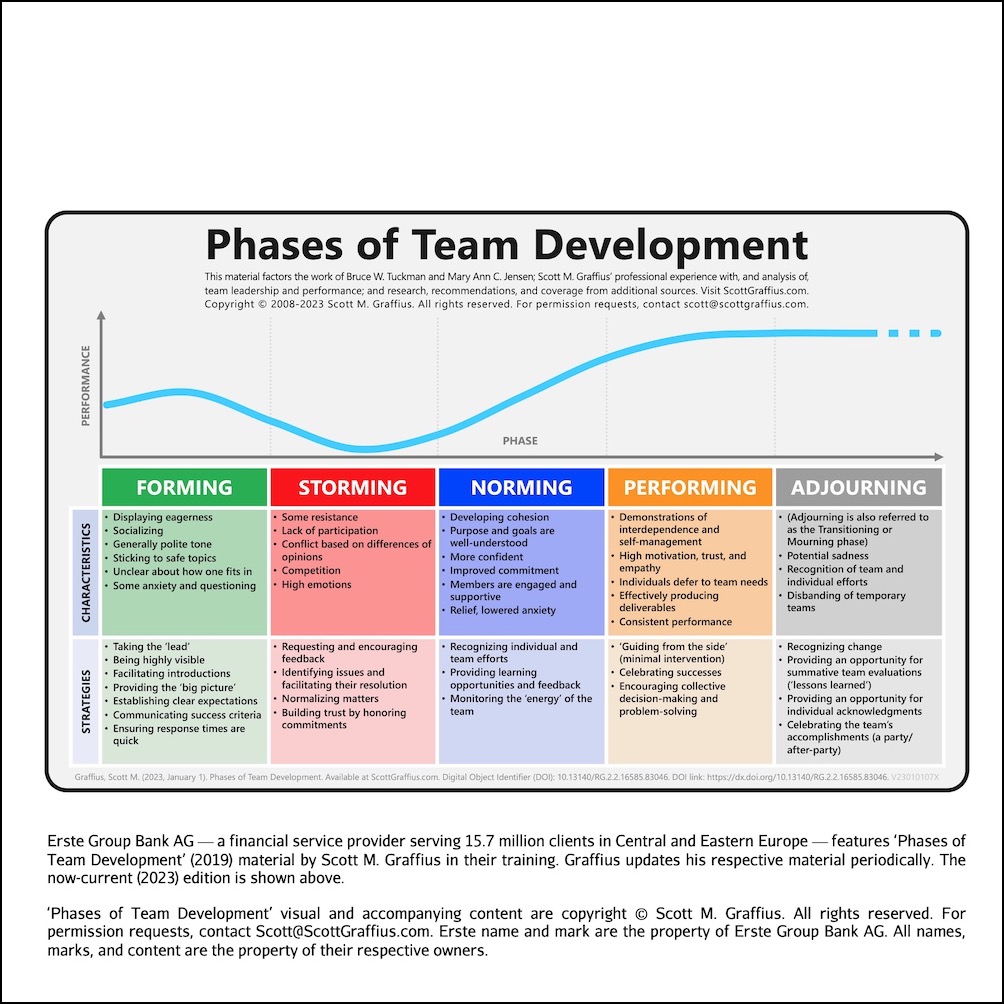
Erste Bank used the 2019 edition of the Phases of Team Development visual at their session. Graffius periodically updates this respective material. The image above shows the now-current (2023) edition of the Phases of Team Development visual.




About Scott M. Graffius

Scott M. Graffius, PMP, SA, CSP-SM, CSP-PO, CSM, CSPO, SFE, ITIL, LSSGB is an agile project management practitioner, consultant, multi-award-winning author, and international keynote speaker. He is the Founder of Exceptional PPM and PMO Solutions™ and subsidiary Exceptional Agility™. He has generated over $1.9 billion of business value in aggregate for Global Fortune 500 businesses and other organizations he has served. Graffius and content from his books, talks, workshops, and more have been featured and used by businesses, professional associations, governments, and universities. Examples include Microsoft, Oracle, Broadcom, Cisco, Gartner, Project Management Institute, IEEE, Qantas, National Academy of Sciences, United States Department of Energy, New Zealand Ministry of Education, Yale University, Tufts University, and others. He has delighted audiences with dynamic and engaging talks and workshops on agile, project management, and technology (including AI) leadership at 87 conferences and other events across 25 countries.
His full bio is available here.
Connect with Scott on:


About Agile Scrum: Your Quick Start Guide with Step-by-Step Instructions

Shifting customer needs are common in today's marketplace. Businesses must be adaptive and responsive to change while delivering an exceptional customer experience to be competitive.
There are a variety of frameworks supporting the development of products and services, and most approaches fall into one of two broad categories: traditional or agile. Traditional practices such as waterfall engage sequential development, while agile involves iterative and incremental deliverables. Organizations are increasingly embracing agile to manage projects, and best meet their business needs of rapid response to change, fast delivery speed, and more.
With clear and easy to follow instructions, the multi award-winning Agile Scrum: Your Quick Start Guide with Step-by-Step Instructions book by Scott M. Graffius (Chris Hare and Colin Giffen, Technical Editors) helps the reader:
Hailed by Literary Titan as “the book highlights the versatility of Scrum beautifully.”
Winner of 17 first place awards.
Agile Scrum: Your Quick Start Guide with Step-by-Step Instructions is available in paperback and ebook/Kindle in the United States and around the world. Some links by country follow.

About Agile Transformation: A Brief Story of How an Entertainment Company Developed New Capabilities and Unlocked Business Agility to Thrive in an Era of Rapid Change

Thriving in today's marketplace frequently depends on making a transformation to become more agile. Those successful in the transition enjoy faster delivery speed and ROI, higher satisfaction, continuous improvement, and additional benefits.
Based on actual events, Agile Transformation: A Brief Story of How an Entertainment Company Developed New Capabilities and Unlocked Business Agility to Thrive in an Era of Rapid Change provides a quick (60-90 minute) read about a successful agile transformation at a multinational entertainment and media company, told from the author's perspective as an agile coach.
The award-winning book by Scott M. Graffius is available in paperback and ebook/Kindle in the United States and around the world. Some links by country follow.

The short URL for this article is: https://bit.ly/erste-2023
© Copyright 2023 Scott M. Graffius. All rights reserved. This material may not be published, broadcast, rewritten or redistributed without the express written permission of Scott M. Graffius.


Select here to download a PDF of this article.
Erste Group Bank AG — a financial service provider serving 15.7 million clients in Central and Eastern Europe — featured Scott M. Graffius' Phases of Team Development material in their training.

The picture above shows Erste Bank using Graffius' Phases of Team Development material at their training session.

Erste Bank used the 2019 edition of the Phases of Team Development visual at their session. Graffius periodically updates this respective material. The image above shows the now-current (2023) edition of the Phases of Team Development visual.



About Scott M. Graffius

Scott M. Graffius, PMP, SA, CSP-SM, CSP-PO, CSM, CSPO, SFE, ITIL, LSSGB is an agile project management practitioner, consultant, multi-award-winning author, and international keynote speaker. He is the Founder of Exceptional PPM and PMO Solutions™ and subsidiary Exceptional Agility™. He has generated over $1.9 billion of business value in aggregate for Global Fortune 500 businesses and other organizations he has served. Graffius and content from his books, talks, workshops, and more have been featured and used by businesses, professional associations, governments, and universities. Examples include Microsoft, Oracle, Broadcom, Cisco, Gartner, Project Management Institute, IEEE, Qantas, National Academy of Sciences, United States Department of Energy, New Zealand Ministry of Education, Yale University, Tufts University, and others. He has delighted audiences with dynamic and engaging talks and workshops on agile, project management, and technology (including AI) leadership at 87 conferences and other events across 25 countries.
His full bio is available here.
Connect with Scott on:


About Agile Scrum: Your Quick Start Guide with Step-by-Step Instructions

Shifting customer needs are common in today's marketplace. Businesses must be adaptive and responsive to change while delivering an exceptional customer experience to be competitive.
There are a variety of frameworks supporting the development of products and services, and most approaches fall into one of two broad categories: traditional or agile. Traditional practices such as waterfall engage sequential development, while agile involves iterative and incremental deliverables. Organizations are increasingly embracing agile to manage projects, and best meet their business needs of rapid response to change, fast delivery speed, and more.
With clear and easy to follow instructions, the multi award-winning Agile Scrum: Your Quick Start Guide with Step-by-Step Instructions book by Scott M. Graffius (Chris Hare and Colin Giffen, Technical Editors) helps the reader:
- Implement and use the most popular agile framework―Scrum;
- Deliver products in short cycles with rapid adaptation to change, fast time-to-market, and continuous improvement; and
- Support innovation and drive competitive advantage.
Hailed by Literary Titan as “the book highlights the versatility of Scrum beautifully.”
Winner of 17 first place awards.
Agile Scrum: Your Quick Start Guide with Step-by-Step Instructions is available in paperback and ebook/Kindle in the United States and around the world. Some links by country follow.
- 🇧🇷 Brazil
- 🇨🇦 Canada
- 🇨🇿 Czech Republic
- 🇩🇰 Denmark
- 🇫🇮 Finland
- 🇫🇷 France
- 🇩🇪 Germany
- 🇬🇷 Greece
- 🇭🇺 Hungary
- 🇮🇳 India
- 🇮🇪 Ireland
- 🇮🇱 Israel
- 🇮🇹 Italy
- 🇯🇵 Japan
- 🇱🇺 Luxembourg
- 🇲🇽 Mexico
- 🇳🇱 Netherlands
- 🇳🇿 New Zealand
- 🇳🇴 Norway
- 🇪🇸 Spain
- 🇸🇪 Sweden
- 🇨🇭 Switzerland
- 🇦🇪 UAE
- 🇬🇧 United Kingdom
- 🇺🇸 United States

About Agile Transformation: A Brief Story of How an Entertainment Company Developed New Capabilities and Unlocked Business Agility to Thrive in an Era of Rapid Change

Thriving in today's marketplace frequently depends on making a transformation to become more agile. Those successful in the transition enjoy faster delivery speed and ROI, higher satisfaction, continuous improvement, and additional benefits.
Based on actual events, Agile Transformation: A Brief Story of How an Entertainment Company Developed New Capabilities and Unlocked Business Agility to Thrive in an Era of Rapid Change provides a quick (60-90 minute) read about a successful agile transformation at a multinational entertainment and media company, told from the author's perspective as an agile coach.
The award-winning book by Scott M. Graffius is available in paperback and ebook/Kindle in the United States and around the world. Some links by country follow.
- 🇦🇺 Australia
- 🇦🇹 Austria
- 🇧🇷 Brazil
- 🇨🇦 Canada
- 🇨🇿 Czech Republic
- 🇩🇰 Denmark
- 🇫🇮 Finland
- 🇫🇷 France
- 🇩🇪 Germany
- 🇬🇷 Greece
- 🇮🇳 India
- 🇮🇪 Ireland
- 🇯🇵 Japan
- 🇱🇺 Luxembourg
- 🇲🇽 Mexico
- 🇳🇱 Netherlands
- 🇳🇿 New Zealand
- 🇪🇸 Spain
- 🇸🇪 Sweden
- 🇨🇭 Switzerland
- 🇦🇪 United Arab Emirates
- 🇬🇧 United Kingdom
- 🇺🇸 United States

The short URL for this article is: https://bit.ly/erste-2023
© Copyright 2023 Scott M. Graffius. All rights reserved. This material may not be published, broadcast, rewritten or redistributed without the express written permission of Scott M. Graffius.

Successful Video Game Development Teams Leverage an Extensive Range of Hard Skills and Soft Skills
15 July 2023
BY SCOTT M. GRAFFIUS | ScottGraffius.com
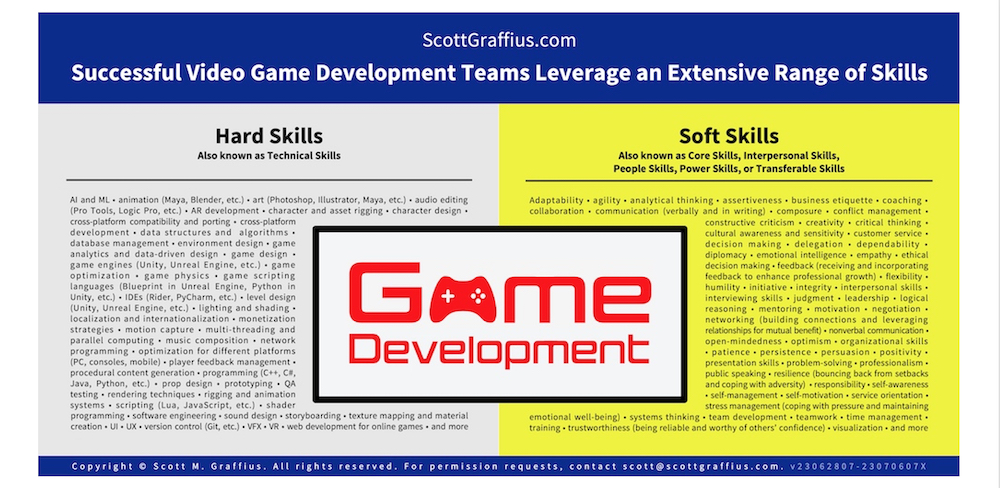
Select here to download a PDF of this article.
Behind every great video game is a team of creative and technical wizards. Creators, storytellers, designers, artists, developers, testers, and others collaborate and leverage a diverse range of hard skills (also known as technical skills) and soft skills (also known as interpersonal skills) to craft an exceptional end-product.
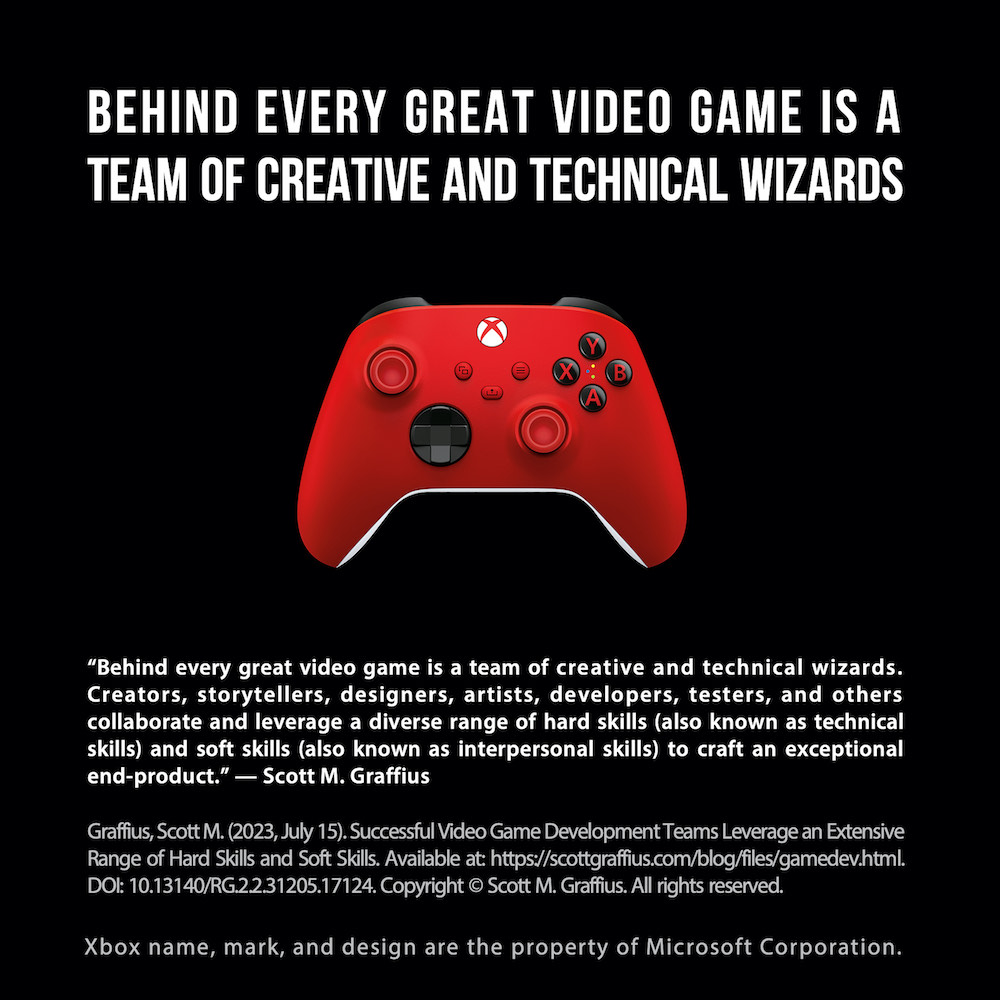
Here's a select listing of hard skills for video game development teams:
And here's a select listing of soft skills for video game development teams:
Of the many skills, one — a soft skill — is paramount. Activision Blizzard and other premiere developers and publishers of entertainment experiences identify teamwork as critical for the successful development of video games.
Informed by Scott M. Graffius’s first-hand work with game development teams as well as research and coverage from Activision Blizzard, Gameloft, International Game Developers Association, Microsoft, Rockstar Games, Sony Interactive Entertainment, and others, Graffius delivers a deep-dive on the essential teamwork skill based on the science of high-performing teams to audiences at game development conferences and other events. The information can provide attendees, their teams, and their organization with a competitive advantage!
Invited by conferences, businesses, professional organizations, governments, and universities, Graffius delivers talks and workshops on Agile, project management, and technology leadership — inclusive of AI, GameDev, TeamDev, and more. To date, he's delivered 87 sessions across 25 countries. Visit here for details on his upcoming and prior sessions.

How to Cite This Article
Graffius, Scott M. (2023, July 15). Successful Video Game Development Teams Leverage an Extensive Range of Hard Skills and Soft Skills. Available at: https://scottgraffius.com/blog/files/gamedev.html. DOI: 10.13140/RG.2.2.31205.17124.

Permission Request Information
To request permission to use material from this article, email Scott M. Graffius.




About Scott M. Graffius

Scott M. Graffius, PMP, SA, CSP-SM, CSP-PO, CSM, CSPO, SFE, ITIL, LSSGB is an agile project management practitioner, consultant, multi-award-winning author, and international keynote speaker. He is the Founder of Exceptional PPM and PMO Solutions™ and subsidiary Exceptional Agility™. He has generated over $1.9 billion of business value in aggregate for Global Fortune 500 businesses and other organizations he has served. Graffius and content from his books, talks, workshops, and more have been featured and used by businesses, professional associations, governments, and universities. Examples include Microsoft, Oracle, Broadcom, Cisco, Gartner, Project Management Institute, IEEE, Qantas, National Academy of Sciences, United States Department of Energy, New Zealand Ministry of Education, Yale University, Tufts University, and others. He has delighted audiences with dynamic and engaging talks and workshops on agile, project management, and technology (including AI, GameDev, and more) leadership at 87 conferences and other events across 25 countries.
His full bio is available here.
Connect with Scott on:


About Agile Scrum: Your Quick Start Guide with Step-by-Step Instructions

Shifting customer needs are common in today's marketplace. Businesses must be adaptive and responsive to change while delivering an exceptional customer experience to be competitive.
There are a variety of frameworks supporting the development of products and services, and most approaches fall into one of two broad categories: traditional or agile. Traditional practices such as waterfall engage sequential development, while agile involves iterative and incremental deliverables. Organizations are increasingly embracing agile to manage projects, and best meet their business needs of rapid response to change, fast delivery speed, and more.
With clear and easy to follow instructions, the multi award-winning Agile Scrum: Your Quick Start Guide with Step-by-Step Instructions book by Scott M. Graffius (Chris Hare and Colin Giffen, Technical Editors) helps the reader:
Hailed by Literary Titan as “the book highlights the versatility of Scrum beautifully.”
Winner of 17 first place awards.
Agile Scrum: Your Quick Start Guide with Step-by-Step Instructions is available in paperback and ebook/Kindle in the United States and around the world. Some links by country follow.

About Agile Transformation: A Brief Story of How an Entertainment Company Developed New Capabilities and Unlocked Business Agility to Thrive in an Era of Rapid Change

Thriving in today's marketplace frequently depends on making a transformation to become more agile. Those successful in the transition enjoy faster delivery speed and ROI, higher satisfaction, continuous improvement, and additional benefits.
Based on actual events, Agile Transformation: A Brief Story of How an Entertainment Company Developed New Capabilities and Unlocked Business Agility to Thrive in an Era of Rapid Change provides a quick (60-90 minute) read about a successful agile transformation at a multinational entertainment and media company, told from the author's perspective as an agile coach.
The award-winning book by Scott M. Graffius is available in paperback and ebook/Kindle in the United States and around the world. Some links by country follow.

The short link for this article is: https://bit.ly/gamedev7
© Copyright 2023 Scott M. Graffius. All rights reserved. This material may not be published, broadcast, rewritten or redistributed without the express written permission of Scott M. Graffius.


Select here to download a PDF of this article.
Behind every great video game is a team of creative and technical wizards. Creators, storytellers, designers, artists, developers, testers, and others collaborate and leverage a diverse range of hard skills (also known as technical skills) and soft skills (also known as interpersonal skills) to craft an exceptional end-product.

Here's a select listing of hard skills for video game development teams:
- Artificial intelligence (AI) and machine learning (ML)
- Animation (Maya, Blender, etc.)
- Art (Photoshop, Illustrator, Maya, etc.)
- Audio editing (Pro Tools, Logic Pro, etc.)
- Augmented Reality (AR) development
- Character and asset rigging
- Character design
- Cross-platform compatibility and porting
- Cross-platform development
- Data structures and algorithms
- Database management
- Environment design
- Game analytics and data-driven design
- Game design
- Game engines (Unity, Unreal Engine, etc.)
- Game optimization
- Game physics
- Game scripting languages (Blueprint in Unreal Engine, Python in Unity, etc.)
- Integrated development environment (IDE) (Rider, PyCharm, etc.)
- Level design (Unity, Unreal Engine, etc.)
- Lighting and shading
- Localization and internationalization
- Monetization strategies
- Motion capture
- Multi-threading and parallel computing
- Music composition
- Network programming
- Optimization for different platforms (consoles, PCs, mobile, AR, VR, smart TVs, streaming devices)
- Player feedback management
- Procedural content generation
- Programming (C++, C#, Java, Python, etc.)
- Prop design
- Prototyping
- Quality assurance (QA) testing
- Rendering techniques
- Rigging and animation systems
- Scripting (Lua, JavaScript, etc.)
- Shader programming
- Software engineering
- Sound design
- Storyboarding
- Texture mapping and material creation
- User interface (UI)
- User experience (UX)
- Version control (Git, etc.)
- Visual effects (VFX)
- Virtual reality (VR)
- Web development for online games
- and more
And here's a select listing of soft skills for video game development teams:
- Adaptability
- Agility
- Analytical thinking
- Assertiveness
- Business etiquette
- Coaching
- Collaboration
- Communication (verbally and in writing)
- Composure
- Conflict management
- Constructive criticism
- Creativity
- Critical thinking
- Cultural awareness and sensitivity
- Customer service
- Decision making
- Delegation
- Dependability
- Diplomacy
- Emotional intelligence
- Empathy
- Ethical decision making
- Feedback (receiving and incorporating feedback to enhance professional growth)
- Flexibility
- Humility
- Initiative
- Integrity
- Interpersonal skills
- Interviewing skills
- Judgment
- Leadership
- Logical reasoning
- Mentoring
- Motivation
- Negotiation
- Networking (building connections and leveraging relationships for mutual benefit)
- Nonverbal communication
- Open-mindedness
- Optimism
- Organizational skills
- Patience
- Persistence
- Persuasion
- Positivity
- Presentation skills
- Problem-solving
- Professionalism
- Public speaking
- Resilience (bouncing back from setbacks and coping with adversity)
- Responsibility
- Self-awareness
- Self-management
- Self-motivation
- Service orientation
- Stress management (coping with pressure and maintaining emotional well-being)
- Systems thinking
- Team development
- Teamwork
- Time management
- Training
- Trustworthiness (being reliable and worthy of others’ confidence)
- Visualization
- and more
Of the many skills, one — a soft skill — is paramount. Activision Blizzard and other premiere developers and publishers of entertainment experiences identify teamwork as critical for the successful development of video games.
Informed by Scott M. Graffius’s first-hand work with game development teams as well as research and coverage from Activision Blizzard, Gameloft, International Game Developers Association, Microsoft, Rockstar Games, Sony Interactive Entertainment, and others, Graffius delivers a deep-dive on the essential teamwork skill based on the science of high-performing teams to audiences at game development conferences and other events. The information can provide attendees, their teams, and their organization with a competitive advantage!
Invited by conferences, businesses, professional organizations, governments, and universities, Graffius delivers talks and workshops on Agile, project management, and technology leadership — inclusive of AI, GameDev, TeamDev, and more. To date, he's delivered 87 sessions across 25 countries. Visit here for details on his upcoming and prior sessions.

How to Cite This Article
Graffius, Scott M. (2023, July 15). Successful Video Game Development Teams Leverage an Extensive Range of Hard Skills and Soft Skills. Available at: https://scottgraffius.com/blog/files/gamedev.html. DOI: 10.13140/RG.2.2.31205.17124.

Permission Request Information
To request permission to use material from this article, email Scott M. Graffius.



About Scott M. Graffius

Scott M. Graffius, PMP, SA, CSP-SM, CSP-PO, CSM, CSPO, SFE, ITIL, LSSGB is an agile project management practitioner, consultant, multi-award-winning author, and international keynote speaker. He is the Founder of Exceptional PPM and PMO Solutions™ and subsidiary Exceptional Agility™. He has generated over $1.9 billion of business value in aggregate for Global Fortune 500 businesses and other organizations he has served. Graffius and content from his books, talks, workshops, and more have been featured and used by businesses, professional associations, governments, and universities. Examples include Microsoft, Oracle, Broadcom, Cisco, Gartner, Project Management Institute, IEEE, Qantas, National Academy of Sciences, United States Department of Energy, New Zealand Ministry of Education, Yale University, Tufts University, and others. He has delighted audiences with dynamic and engaging talks and workshops on agile, project management, and technology (including AI, GameDev, and more) leadership at 87 conferences and other events across 25 countries.
His full bio is available here.
Connect with Scott on:


About Agile Scrum: Your Quick Start Guide with Step-by-Step Instructions

Shifting customer needs are common in today's marketplace. Businesses must be adaptive and responsive to change while delivering an exceptional customer experience to be competitive.
There are a variety of frameworks supporting the development of products and services, and most approaches fall into one of two broad categories: traditional or agile. Traditional practices such as waterfall engage sequential development, while agile involves iterative and incremental deliverables. Organizations are increasingly embracing agile to manage projects, and best meet their business needs of rapid response to change, fast delivery speed, and more.
With clear and easy to follow instructions, the multi award-winning Agile Scrum: Your Quick Start Guide with Step-by-Step Instructions book by Scott M. Graffius (Chris Hare and Colin Giffen, Technical Editors) helps the reader:
- Implement and use the most popular agile framework―Scrum;
- Deliver products in short cycles with rapid adaptation to change, fast time-to-market, and continuous improvement; and
- Support innovation and drive competitive advantage.
Hailed by Literary Titan as “the book highlights the versatility of Scrum beautifully.”
Winner of 17 first place awards.
Agile Scrum: Your Quick Start Guide with Step-by-Step Instructions is available in paperback and ebook/Kindle in the United States and around the world. Some links by country follow.
- 🇧🇷 Brazil
- 🇨🇦 Canada
- 🇨🇿 Czech Republic
- 🇩🇰 Denmark
- 🇫🇮 Finland
- 🇫🇷 France
- 🇩🇪 Germany
- 🇬🇷 Greece
- 🇭🇺 Hungary
- 🇮🇳 India
- 🇮🇪 Ireland
- 🇮🇱 Israel
- 🇮🇹 Italy
- 🇯🇵 Japan
- 🇱🇺 Luxembourg
- 🇲🇽 Mexico
- 🇳🇱 Netherlands
- 🇳🇿 New Zealand
- 🇳🇴 Norway
- 🇪🇸 Spain
- 🇸🇪 Sweden
- 🇨🇭 Switzerland
- 🇦🇪 UAE
- 🇬🇧 United Kingdom
- 🇺🇸 United States

About Agile Transformation: A Brief Story of How an Entertainment Company Developed New Capabilities and Unlocked Business Agility to Thrive in an Era of Rapid Change

Thriving in today's marketplace frequently depends on making a transformation to become more agile. Those successful in the transition enjoy faster delivery speed and ROI, higher satisfaction, continuous improvement, and additional benefits.
Based on actual events, Agile Transformation: A Brief Story of How an Entertainment Company Developed New Capabilities and Unlocked Business Agility to Thrive in an Era of Rapid Change provides a quick (60-90 minute) read about a successful agile transformation at a multinational entertainment and media company, told from the author's perspective as an agile coach.
The award-winning book by Scott M. Graffius is available in paperback and ebook/Kindle in the United States and around the world. Some links by country follow.
- 🇦🇺 Australia
- 🇦🇹 Austria
- 🇧🇷 Brazil
- 🇨🇦 Canada
- 🇨🇿 Czech Republic
- 🇩🇰 Denmark
- 🇫🇮 Finland
- 🇫🇷 France
- 🇩🇪 Germany
- 🇬🇷 Greece
- 🇮🇳 India
- 🇮🇪 Ireland
- 🇯🇵 Japan
- 🇱🇺 Luxembourg
- 🇲🇽 Mexico
- 🇳🇱 Netherlands
- 🇳🇿 New Zealand
- 🇪🇸 Spain
- 🇸🇪 Sweden
- 🇨🇭 Switzerland
- 🇦🇪 United Arab Emirates
- 🇬🇧 United Kingdom
- 🇺🇸 United States

The short link for this article is: https://bit.ly/gamedev7
© Copyright 2023 Scott M. Graffius. All rights reserved. This material may not be published, broadcast, rewritten or redistributed without the express written permission of Scott M. Graffius.

Scott M. Graffius Speaking at Helsinki, Finland W Love Games 2023 Video Game Development Conference
30 September 2023
BY SCOTT M. GRAFFIUS | ScottGraffius.com

Agile project management practitioner, consultant, multi-award-winning author, and international speaker Scott M. Graffius has delivered 87 talks and workshops at conferences and other events across 25 countries. His newest engagement will be at the W Love Games 2023 Conference in Helsinki, where he'll present “The Science of High-Performance Game Development Teams.”
Graffius’ talk is informed by his first-hand work with video game development teams as well as research and coverage from Activision Blizzard, Gameloft, International Game Developers Association, Microsoft, Rockstar Games, Sony Interactive Entertainment, and others. The information can provide attendees, their teams, and their organizations with a competitive advantage!
About the W Love Games 2023 International Game Development Conference
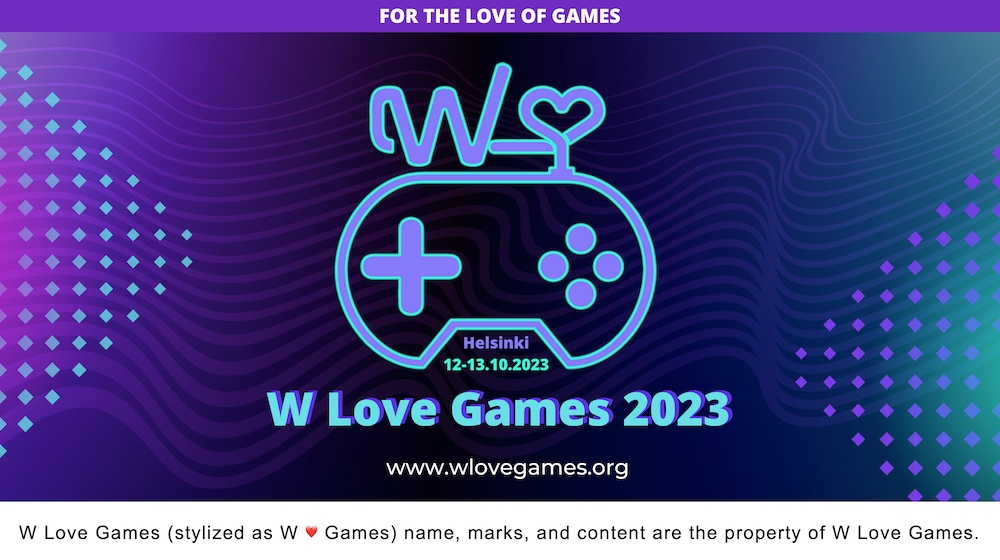
W Love Games 2023 includes:
💜 30+ speakers
🧡 6 workshops
💛 Showroom
💚 IGDA Finland Mentor Cafe
💙 Networking for all
The conference will run from October 12-13, 2023 at the Helsinki Public Library Oodi (in Finnish: Helsingin Keskustakirjasto Oodi) at Töölönlahdenkatu 4, 00100 Helsinki, Finland.
Secure your tickets for the conference at: https://www.wlovegames.org.




About Scott M. Graffius

Scott M. Graffius, PMP, SA, CSP-SM, CSP-PO, CSM, CSPO, SFE, ITIL, LSSGB is an agile project management practitioner, consultant, multi-award-winning author, and international keynote speaker. He is the Founder of Exceptional PPM and PMO Solutions™ and subsidiary Exceptional Agility™. He has generated over $1.9 billion of business value in aggregate for Global Fortune 500 businesses and other organizations he has served. Graffius and content from his books, talks, workshops, and more have been featured and used by businesses, professional associations, governments, and universities. Examples include Microsoft, Oracle, Broadcom, Cisco, Gartner, Project Management Institute, IEEE, Qantas, National Academy of Sciences, United States Department of Energy, New Zealand Ministry of Education, Yale University, Tufts University, and others. He has delighted audiences with dynamic and engaging talks and workshops on agile, project management, and technology (including AI, GameDev, and more) leadership at 87 conferences and other events across 25 countries.
His full bio is available here.
Connect with Scott on:


About Agile Scrum: Your Quick Start Guide with Step-by-Step Instructions

Shifting customer needs are common in today's marketplace. Businesses must be adaptive and responsive to change while delivering an exceptional customer experience to be competitive.
There are a variety of frameworks supporting the development of products and services, and most approaches fall into one of two broad categories: traditional or agile. Traditional practices such as waterfall engage sequential development, while agile involves iterative and incremental deliverables. Organizations are increasingly embracing agile to manage projects, and best meet their business needs of rapid response to change, fast delivery speed, and more.
With clear and easy to follow instructions, the multi award-winning Agile Scrum: Your Quick Start Guide with Step-by-Step Instructions book by Scott M. Graffius (Chris Hare and Colin Giffen, Technical Editors) helps the reader:
Hailed by Literary Titan as “the book highlights the versatility of Scrum beautifully.”
Winner of 17 first place awards.
Agile Scrum: Your Quick Start Guide with Step-by-Step Instructions is available in paperback and ebook/Kindle in the United States and around the world. Some links by country follow.

About Agile Transformation: A Brief Story of How an Entertainment Company Developed New Capabilities and Unlocked Business Agility to Thrive in an Era of Rapid Change

Thriving in today's marketplace frequently depends on making a transformation to become more agile. Those successful in the transition enjoy faster delivery speed and ROI, higher satisfaction, continuous improvement, and additional benefits.
Based on actual events, Agile Transformation: A Brief Story of How an Entertainment Company Developed New Capabilities and Unlocked Business Agility to Thrive in an Era of Rapid Change provides a quick (60-90 minute) read about a successful agile transformation at a multinational entertainment and media company, told from the author's perspective as an agile coach.
The award-winning book by Scott M. Graffius is available in paperback and ebook/Kindle in the United States and around the world. Some links by country follow.

The short link for this article is: https://bit.ly/wlg-23
© Copyright 2023 Scott M. Graffius. All rights reserved. This material may not be published, broadcast, rewritten or redistributed without the express written permission of Scott M. Graffius.


Agile project management practitioner, consultant, multi-award-winning author, and international speaker Scott M. Graffius has delivered 87 talks and workshops at conferences and other events across 25 countries. His newest engagement will be at the W Love Games 2023 Conference in Helsinki, where he'll present “The Science of High-Performance Game Development Teams.”
Graffius’ talk is informed by his first-hand work with video game development teams as well as research and coverage from Activision Blizzard, Gameloft, International Game Developers Association, Microsoft, Rockstar Games, Sony Interactive Entertainment, and others. The information can provide attendees, their teams, and their organizations with a competitive advantage!
About the W Love Games 2023 International Game Development Conference

W Love Games 2023 includes:
💜 30+ speakers
🧡 6 workshops
💛 Showroom
💚 IGDA Finland Mentor Cafe
💙 Networking for all
The conference will run from October 12-13, 2023 at the Helsinki Public Library Oodi (in Finnish: Helsingin Keskustakirjasto Oodi) at Töölönlahdenkatu 4, 00100 Helsinki, Finland.
Secure your tickets for the conference at: https://www.wlovegames.org.



About Scott M. Graffius

Scott M. Graffius, PMP, SA, CSP-SM, CSP-PO, CSM, CSPO, SFE, ITIL, LSSGB is an agile project management practitioner, consultant, multi-award-winning author, and international keynote speaker. He is the Founder of Exceptional PPM and PMO Solutions™ and subsidiary Exceptional Agility™. He has generated over $1.9 billion of business value in aggregate for Global Fortune 500 businesses and other organizations he has served. Graffius and content from his books, talks, workshops, and more have been featured and used by businesses, professional associations, governments, and universities. Examples include Microsoft, Oracle, Broadcom, Cisco, Gartner, Project Management Institute, IEEE, Qantas, National Academy of Sciences, United States Department of Energy, New Zealand Ministry of Education, Yale University, Tufts University, and others. He has delighted audiences with dynamic and engaging talks and workshops on agile, project management, and technology (including AI, GameDev, and more) leadership at 87 conferences and other events across 25 countries.
His full bio is available here.
Connect with Scott on:


About Agile Scrum: Your Quick Start Guide with Step-by-Step Instructions

Shifting customer needs are common in today's marketplace. Businesses must be adaptive and responsive to change while delivering an exceptional customer experience to be competitive.
There are a variety of frameworks supporting the development of products and services, and most approaches fall into one of two broad categories: traditional or agile. Traditional practices such as waterfall engage sequential development, while agile involves iterative and incremental deliverables. Organizations are increasingly embracing agile to manage projects, and best meet their business needs of rapid response to change, fast delivery speed, and more.
With clear and easy to follow instructions, the multi award-winning Agile Scrum: Your Quick Start Guide with Step-by-Step Instructions book by Scott M. Graffius (Chris Hare and Colin Giffen, Technical Editors) helps the reader:
- Implement and use the most popular agile framework―Scrum;
- Deliver products in short cycles with rapid adaptation to change, fast time-to-market, and continuous improvement; and
- Support innovation and drive competitive advantage.
Hailed by Literary Titan as “the book highlights the versatility of Scrum beautifully.”
Winner of 17 first place awards.
Agile Scrum: Your Quick Start Guide with Step-by-Step Instructions is available in paperback and ebook/Kindle in the United States and around the world. Some links by country follow.
- 🇧🇷 Brazil
- 🇨🇦 Canada
- 🇨🇿 Czech Republic
- 🇩🇰 Denmark
- 🇫🇮 Finland
- 🇫🇷 France
- 🇩🇪 Germany
- 🇬🇷 Greece
- 🇭🇺 Hungary
- 🇮🇳 India
- 🇮🇪 Ireland
- 🇮🇱 Israel
- 🇮🇹 Italy
- 🇯🇵 Japan
- 🇱🇺 Luxembourg
- 🇲🇽 Mexico
- 🇳🇱 Netherlands
- 🇳🇿 New Zealand
- 🇳🇴 Norway
- 🇪🇸 Spain
- 🇸🇪 Sweden
- 🇨🇭 Switzerland
- 🇦🇪 UAE
- 🇬🇧 United Kingdom
- 🇺🇸 United States

About Agile Transformation: A Brief Story of How an Entertainment Company Developed New Capabilities and Unlocked Business Agility to Thrive in an Era of Rapid Change

Thriving in today's marketplace frequently depends on making a transformation to become more agile. Those successful in the transition enjoy faster delivery speed and ROI, higher satisfaction, continuous improvement, and additional benefits.
Based on actual events, Agile Transformation: A Brief Story of How an Entertainment Company Developed New Capabilities and Unlocked Business Agility to Thrive in an Era of Rapid Change provides a quick (60-90 minute) read about a successful agile transformation at a multinational entertainment and media company, told from the author's perspective as an agile coach.
The award-winning book by Scott M. Graffius is available in paperback and ebook/Kindle in the United States and around the world. Some links by country follow.
- 🇦🇺 Australia
- 🇦🇹 Austria
- 🇧🇷 Brazil
- 🇨🇦 Canada
- 🇨🇿 Czech Republic
- 🇩🇰 Denmark
- 🇫🇮 Finland
- 🇫🇷 France
- 🇩🇪 Germany
- 🇬🇷 Greece
- 🇮🇳 India
- 🇮🇪 Ireland
- 🇯🇵 Japan
- 🇱🇺 Luxembourg
- 🇲🇽 Mexico
- 🇳🇱 Netherlands
- 🇳🇿 New Zealand
- 🇪🇸 Spain
- 🇸🇪 Sweden
- 🇨🇭 Switzerland
- 🇦🇪 United Arab Emirates
- 🇬🇧 United Kingdom
- 🇺🇸 United States

The short link for this article is: https://bit.ly/wlg-23
© Copyright 2023 Scott M. Graffius. All rights reserved. This material may not be published, broadcast, rewritten or redistributed without the express written permission of Scott M. Graffius.

National Park Service Features Scott M. Graffius' 'Phases of Team Development'
11 September 2023
BY SCOTT M. GRAFFIUS | ScottGraffius.com
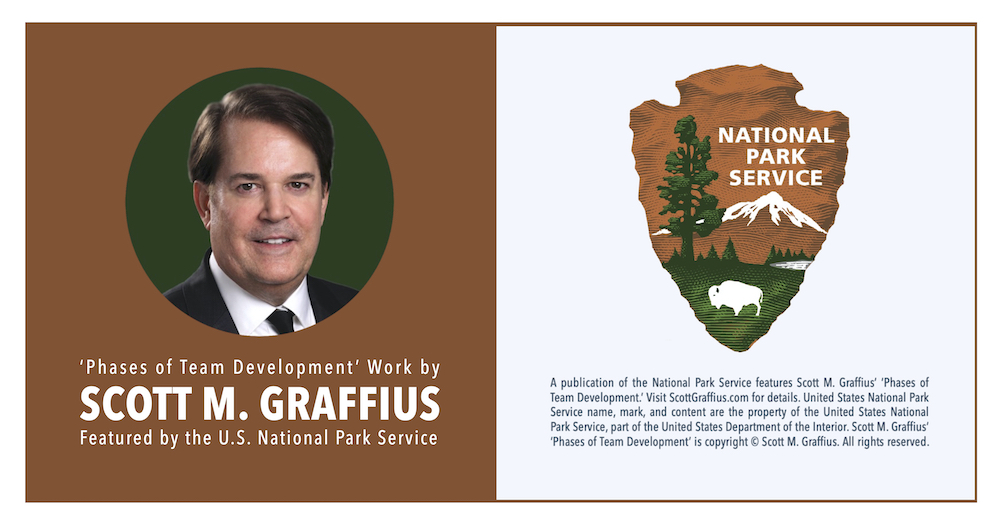
Select here to download a PDF of this article.
The National Park Service (NPS), part of the United States Department of the Interior, included Scott M. Graffius' ‘Phases of Team Development’ work in their newsletter. Highlights follow.
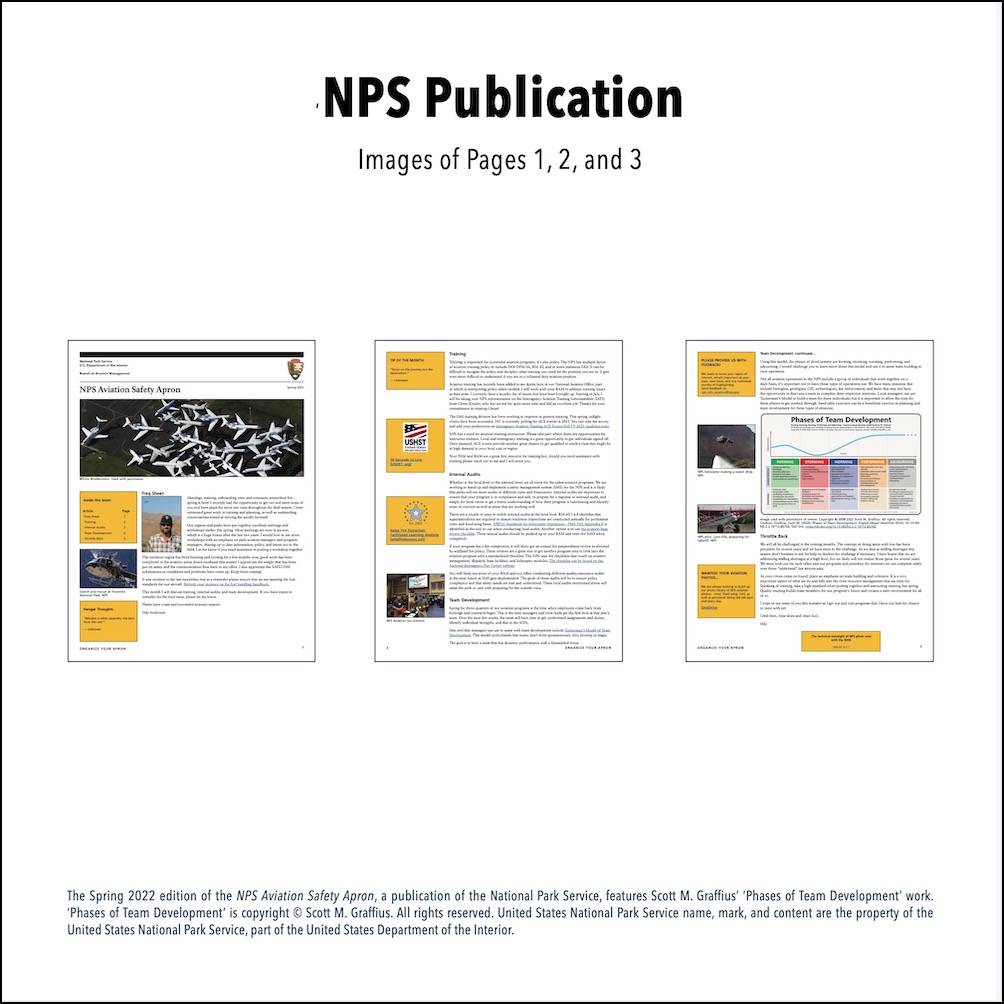
The above visual provides an overview of pages 1, 2, and 3 of the NPS publication.
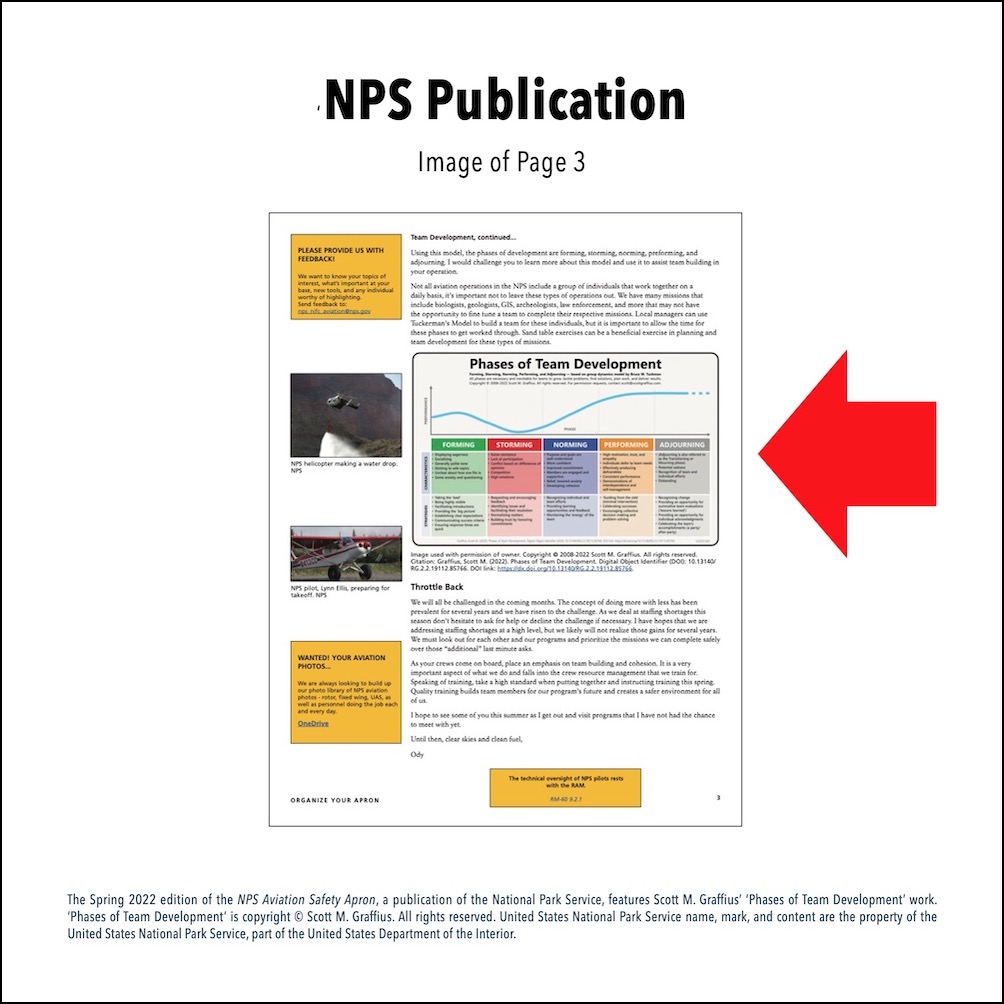
The above visual provides a singular view of page 3 of the NPS publication. The red arrow points to Graffius' 'Phases of Team Development.'
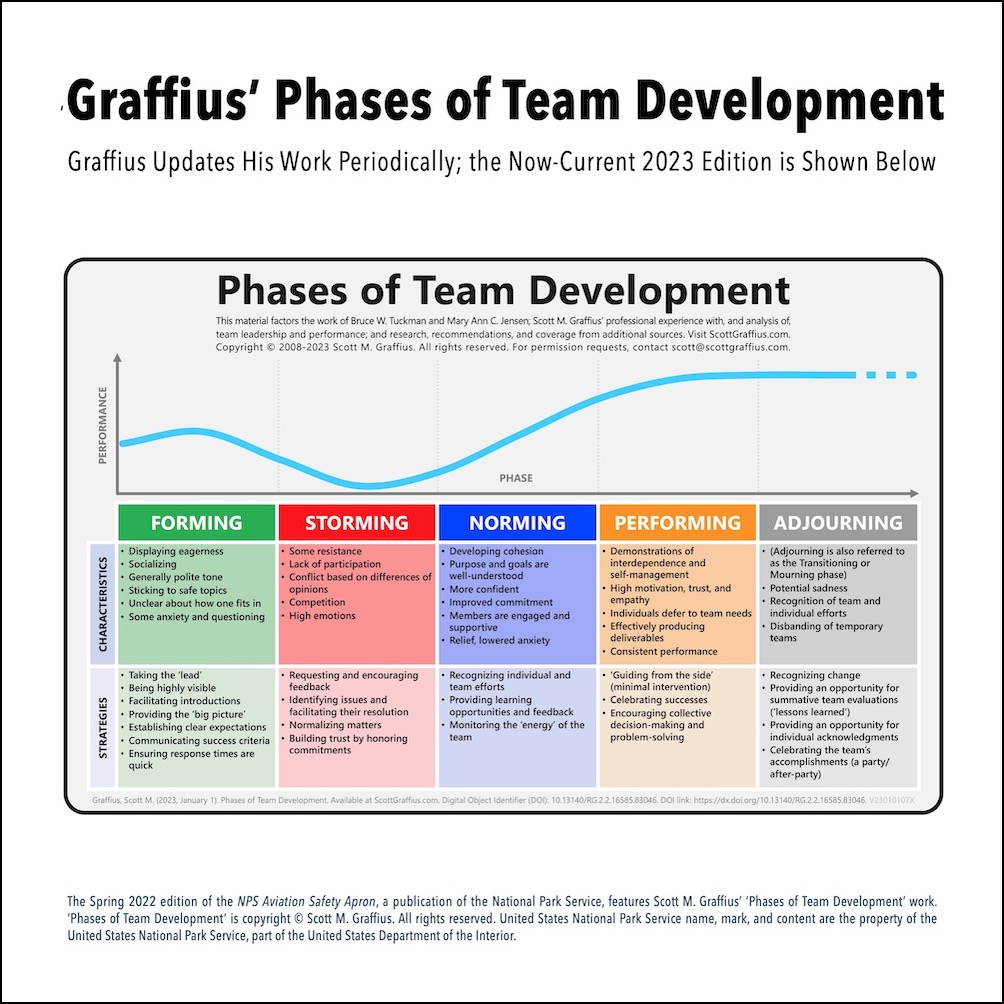
Graffius periodically updates his 'Phases of Team Development' work. The visual above shows the now-current (2023) edition of his work.
About Scott M. Graffius' 'Phases of Team Development'
Informed by the research of Bruce W. Tuckman and Mary Ann C. Jensen, over 100 subsequent studies, and Scott M. Graffius' first-hand professional experience with, and analysis of, team leadership and performance, Graffius created his ‘Phases of Team Development’ as a unique perspective and visual conveying the five phases of team development — Forming, Storming, Norming, Performing, and Adjourning — inclusive of a graph showing how performance varies by phase, as well as the characteristics and strategies for each phase.
With permission/a license from Graffius, his 'Phases of Team Development' work is used by businesses, professional associations, governments, and universities around the world. For more on my ‘Phases of Team Development,’ visit https://bit.ly/teams-2023.
About the National Park Service
The National Park Service (NPS) is an agency of the United States federal government within the U.S. Department of the Interior that manages all national parks, most national monuments, and other natural, historical, and recreational properties with various title designations. The U.S. Congress created the agency on August 25, 1916, through the National Park Service Organic Act. The NPS is headquartered in Washington, D.C., within the main headquarters of the Department of the Interior.
The NPS employs approximately 20,000 people in 425 individual units covering over 85 million acres in all 50 states, the District of Columbia, and U.S. territories. As of 2019, they had more than 279,000 volunteers. The agency is charged with a dual role of preserving the ecological and historical integrity of the places entrusted to its management while also making them available and accessible for public use and enjoyment.
Its mission statement is: “The National Park Service preserves unimpaired the natural and cultural resources and values of the National Park System for the enjoyment, education, and inspiration of this and future generations. The National Park Service cooperates with partners to extend the benefits of natural and cultural resource conservation and outdoor recreation throughout this country and the world.” Source: https://www.nps.gov/aboutus/index.htm.




About Scott M. Graffius

Scott M. Graffius, PMP, SA, CSP-SM, CSP-PO, CSM, CSPO, SFE, ITIL, LSSGB is an agile project management practitioner, consultant, multi-award-winning author, and international keynote speaker. He is the Founder of Exceptional PPM and PMO Solutions™ and subsidiary Exceptional Agility™. He has generated over $1.9 billion of business value in aggregate for Global Fortune 500 businesses and other organizations he has served. Graffius and content from his books, talks, workshops, and more have been featured and used by businesses, professional associations, governments, and universities. Examples include Microsoft, Oracle, Broadcom, Cisco, Gartner, Project Management Institute, IEEE, Qantas, National Academy of Sciences, United States Department of Energy, New Zealand Ministry of Education, Yale University, Tufts University, and others. He has delighted audiences with dynamic and engaging talks and workshops on agile, project management, and technology (including AI) leadership at 87 conferences and other events across 25 countries.
His full bio is available here.
Connect with Scott on:


About Agile Scrum: Your Quick Start Guide with Step-by-Step Instructions

Shifting customer needs are common in today's marketplace. Businesses must be adaptive and responsive to change while delivering an exceptional customer experience to be competitive.
There are a variety of frameworks supporting the development of products and services, and most approaches fall into one of two broad categories: traditional or agile. Traditional practices such as waterfall engage sequential development, while agile involves iterative and incremental deliverables. Organizations are increasingly embracing agile to manage projects, and best meet their business needs of rapid response to change, fast delivery speed, and more.
With clear and easy to follow instructions, the multi award-winning Agile Scrum: Your Quick Start Guide with Step-by-Step Instructions book by Scott M. Graffius (Chris Hare and Colin Giffen, Technical Editors) helps the reader:
Hailed by Literary Titan as “the book highlights the versatility of Scrum beautifully.”
Winner of 17 first place awards.
Agile Scrum: Your Quick Start Guide with Step-by-Step Instructions is available in paperback and ebook/Kindle in the United States and around the world. Some links by country follow.

About Agile Transformation: A Brief Story of How an Entertainment Company Developed New Capabilities and Unlocked Business Agility to Thrive in an Era of Rapid Change

Thriving in today's marketplace frequently depends on making a transformation to become more agile. Those successful in the transition enjoy faster delivery speed and ROI, higher satisfaction, continuous improvement, and additional benefits.
Based on actual events, Agile Transformation: A Brief Story of How an Entertainment Company Developed New Capabilities and Unlocked Business Agility to Thrive in an Era of Rapid Change provides a quick (60-90 minute) read about a successful agile transformation at a multinational entertainment and media company, told from the author's perspective as an agile coach.
The award-winning book by Scott M. Graffius is available in paperback and ebook/Kindle in the United States and around the world. Some links by country follow.

The short URL for this article is: https://bit.ly/nps-23.
© Copyright 2023 Scott M. Graffius. All rights reserved. This material may not be published, broadcast, rewritten or redistributed without the express written permission of Scott M. Graffius.


Select here to download a PDF of this article.
The National Park Service (NPS), part of the United States Department of the Interior, included Scott M. Graffius' ‘Phases of Team Development’ work in their newsletter. Highlights follow.

The above visual provides an overview of pages 1, 2, and 3 of the NPS publication.

The above visual provides a singular view of page 3 of the NPS publication. The red arrow points to Graffius' 'Phases of Team Development.'

Graffius periodically updates his 'Phases of Team Development' work. The visual above shows the now-current (2023) edition of his work.
About Scott M. Graffius' 'Phases of Team Development'
Informed by the research of Bruce W. Tuckman and Mary Ann C. Jensen, over 100 subsequent studies, and Scott M. Graffius' first-hand professional experience with, and analysis of, team leadership and performance, Graffius created his ‘Phases of Team Development’ as a unique perspective and visual conveying the five phases of team development — Forming, Storming, Norming, Performing, and Adjourning — inclusive of a graph showing how performance varies by phase, as well as the characteristics and strategies for each phase.
With permission/a license from Graffius, his 'Phases of Team Development' work is used by businesses, professional associations, governments, and universities around the world. For more on my ‘Phases of Team Development,’ visit https://bit.ly/teams-2023.
About the National Park Service
The National Park Service (NPS) is an agency of the United States federal government within the U.S. Department of the Interior that manages all national parks, most national monuments, and other natural, historical, and recreational properties with various title designations. The U.S. Congress created the agency on August 25, 1916, through the National Park Service Organic Act. The NPS is headquartered in Washington, D.C., within the main headquarters of the Department of the Interior.
The NPS employs approximately 20,000 people in 425 individual units covering over 85 million acres in all 50 states, the District of Columbia, and U.S. territories. As of 2019, they had more than 279,000 volunteers. The agency is charged with a dual role of preserving the ecological and historical integrity of the places entrusted to its management while also making them available and accessible for public use and enjoyment.
Its mission statement is: “The National Park Service preserves unimpaired the natural and cultural resources and values of the National Park System for the enjoyment, education, and inspiration of this and future generations. The National Park Service cooperates with partners to extend the benefits of natural and cultural resource conservation and outdoor recreation throughout this country and the world.” Source: https://www.nps.gov/aboutus/index.htm.



About Scott M. Graffius

Scott M. Graffius, PMP, SA, CSP-SM, CSP-PO, CSM, CSPO, SFE, ITIL, LSSGB is an agile project management practitioner, consultant, multi-award-winning author, and international keynote speaker. He is the Founder of Exceptional PPM and PMO Solutions™ and subsidiary Exceptional Agility™. He has generated over $1.9 billion of business value in aggregate for Global Fortune 500 businesses and other organizations he has served. Graffius and content from his books, talks, workshops, and more have been featured and used by businesses, professional associations, governments, and universities. Examples include Microsoft, Oracle, Broadcom, Cisco, Gartner, Project Management Institute, IEEE, Qantas, National Academy of Sciences, United States Department of Energy, New Zealand Ministry of Education, Yale University, Tufts University, and others. He has delighted audiences with dynamic and engaging talks and workshops on agile, project management, and technology (including AI) leadership at 87 conferences and other events across 25 countries.
His full bio is available here.
Connect with Scott on:


About Agile Scrum: Your Quick Start Guide with Step-by-Step Instructions

Shifting customer needs are common in today's marketplace. Businesses must be adaptive and responsive to change while delivering an exceptional customer experience to be competitive.
There are a variety of frameworks supporting the development of products and services, and most approaches fall into one of two broad categories: traditional or agile. Traditional practices such as waterfall engage sequential development, while agile involves iterative and incremental deliverables. Organizations are increasingly embracing agile to manage projects, and best meet their business needs of rapid response to change, fast delivery speed, and more.
With clear and easy to follow instructions, the multi award-winning Agile Scrum: Your Quick Start Guide with Step-by-Step Instructions book by Scott M. Graffius (Chris Hare and Colin Giffen, Technical Editors) helps the reader:
- Implement and use the most popular agile framework―Scrum;
- Deliver products in short cycles with rapid adaptation to change, fast time-to-market, and continuous improvement; and
- Support innovation and drive competitive advantage.
Hailed by Literary Titan as “the book highlights the versatility of Scrum beautifully.”
Winner of 17 first place awards.
Agile Scrum: Your Quick Start Guide with Step-by-Step Instructions is available in paperback and ebook/Kindle in the United States and around the world. Some links by country follow.
- 🇧🇷 Brazil
- 🇨🇦 Canada
- 🇨🇿 Czech Republic
- 🇩🇰 Denmark
- 🇫🇮 Finland
- 🇫🇷 France
- 🇩🇪 Germany
- 🇬🇷 Greece
- 🇭🇺 Hungary
- 🇮🇳 India
- 🇮🇪 Ireland
- 🇮🇱 Israel
- 🇮🇹 Italy
- 🇯🇵 Japan
- 🇱🇺 Luxembourg
- 🇲🇽 Mexico
- 🇳🇱 Netherlands
- 🇳🇿 New Zealand
- 🇳🇴 Norway
- 🇪🇸 Spain
- 🇸🇪 Sweden
- 🇨🇭 Switzerland
- 🇦🇪 UAE
- 🇬🇧 United Kingdom
- 🇺🇸 United States

About Agile Transformation: A Brief Story of How an Entertainment Company Developed New Capabilities and Unlocked Business Agility to Thrive in an Era of Rapid Change

Thriving in today's marketplace frequently depends on making a transformation to become more agile. Those successful in the transition enjoy faster delivery speed and ROI, higher satisfaction, continuous improvement, and additional benefits.
Based on actual events, Agile Transformation: A Brief Story of How an Entertainment Company Developed New Capabilities and Unlocked Business Agility to Thrive in an Era of Rapid Change provides a quick (60-90 minute) read about a successful agile transformation at a multinational entertainment and media company, told from the author's perspective as an agile coach.
The award-winning book by Scott M. Graffius is available in paperback and ebook/Kindle in the United States and around the world. Some links by country follow.
- 🇦🇺 Australia
- 🇦🇹 Austria
- 🇧🇷 Brazil
- 🇨🇦 Canada
- 🇨🇿 Czech Republic
- 🇩🇰 Denmark
- 🇫🇮 Finland
- 🇫🇷 France
- 🇩🇪 Germany
- 🇬🇷 Greece
- 🇮🇳 India
- 🇮🇪 Ireland
- 🇯🇵 Japan
- 🇱🇺 Luxembourg
- 🇲🇽 Mexico
- 🇳🇱 Netherlands
- 🇳🇿 New Zealand
- 🇪🇸 Spain
- 🇸🇪 Sweden
- 🇨🇭 Switzerland
- 🇦🇪 United Arab Emirates
- 🇬🇧 United Kingdom
- 🇺🇸 United States

The short URL for this article is: https://bit.ly/nps-23.
© Copyright 2023 Scott M. Graffius. All rights reserved. This material may not be published, broadcast, rewritten or redistributed without the express written permission of Scott M. Graffius.

Aerospace Company Deimos Space Featured Scott M. Graffius' 'Phases of Team Development' Work
06 October 2023
BY SCOTT M. GRAFFIUS | ScottGraffius.com
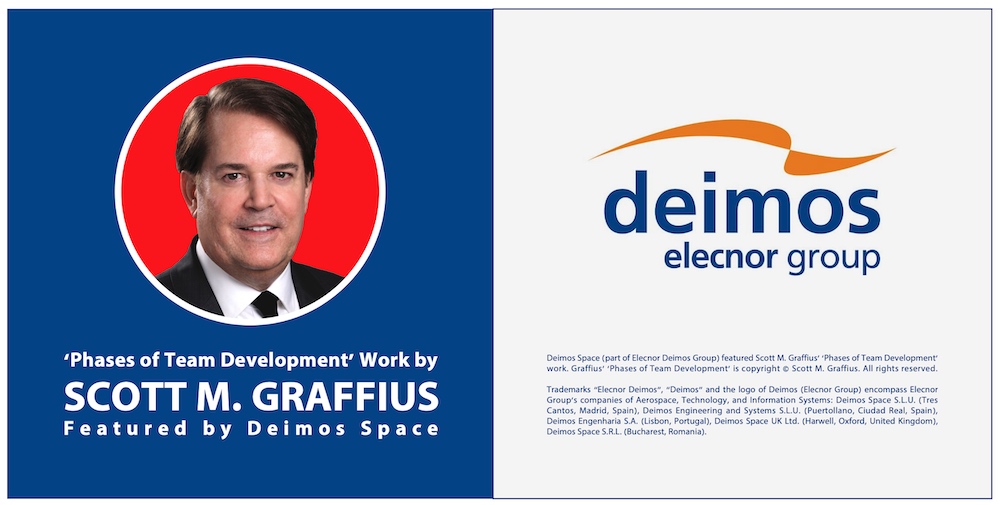
Informed by the research of Bruce W. Tuckman and Mary Ann C. Jensen, over 100 subsequent studies, and Scott M. Graffius' first-hand professional experience with, and analysis of, team leadership and performance, Graffius created his ‘Phases of Team Development’ as a unique perspective and visual conveying the five phases of team development — Forming, Storming, Norming, Performing, and Adjourning — inclusive of a graph showing how performance varies by phase, as well as the characteristics and strategies for each phase.
With permission/a license from Graffius, his ‘Phases of Team Development’ work is used by businesses, professional associations, governments, and universities around the world. Examples include Yale University, IEEE, Torrens University Australia, UK Sports Institute, Adobe, Amsterdam Public Health Research Institute, Academic Cooperation Association, Boston University, U.S. National Park Service, Bayer, Hasso Plattner Institute (Hasso-Plattner-Institut für Digital Engineering GmbH), Singapore University of Social Sciences, New Zealand Government, University of Galway Ireland, and many more.
Deimos Space, a leading Aerospace company, was added to the list.
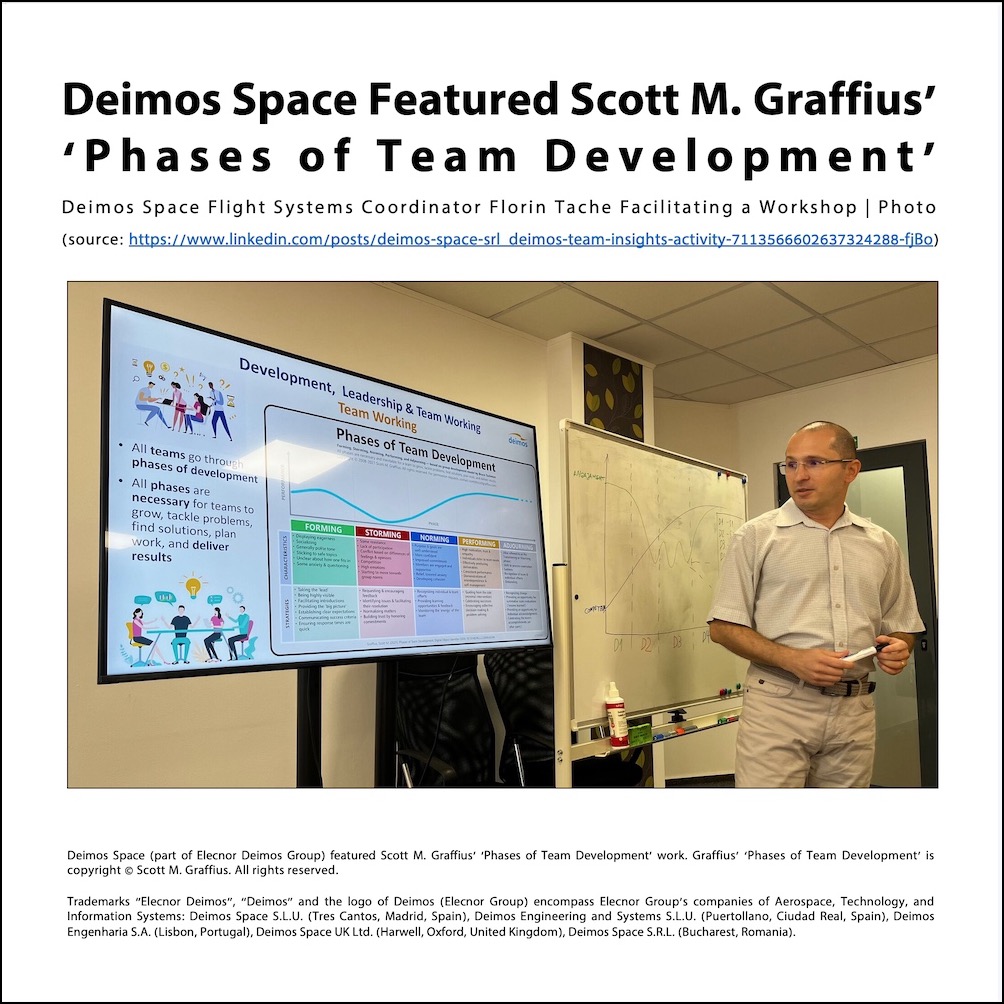
As shown above, Deimos Space featured Scott M. Graffius' 'Phases of Team Development' work during a training.
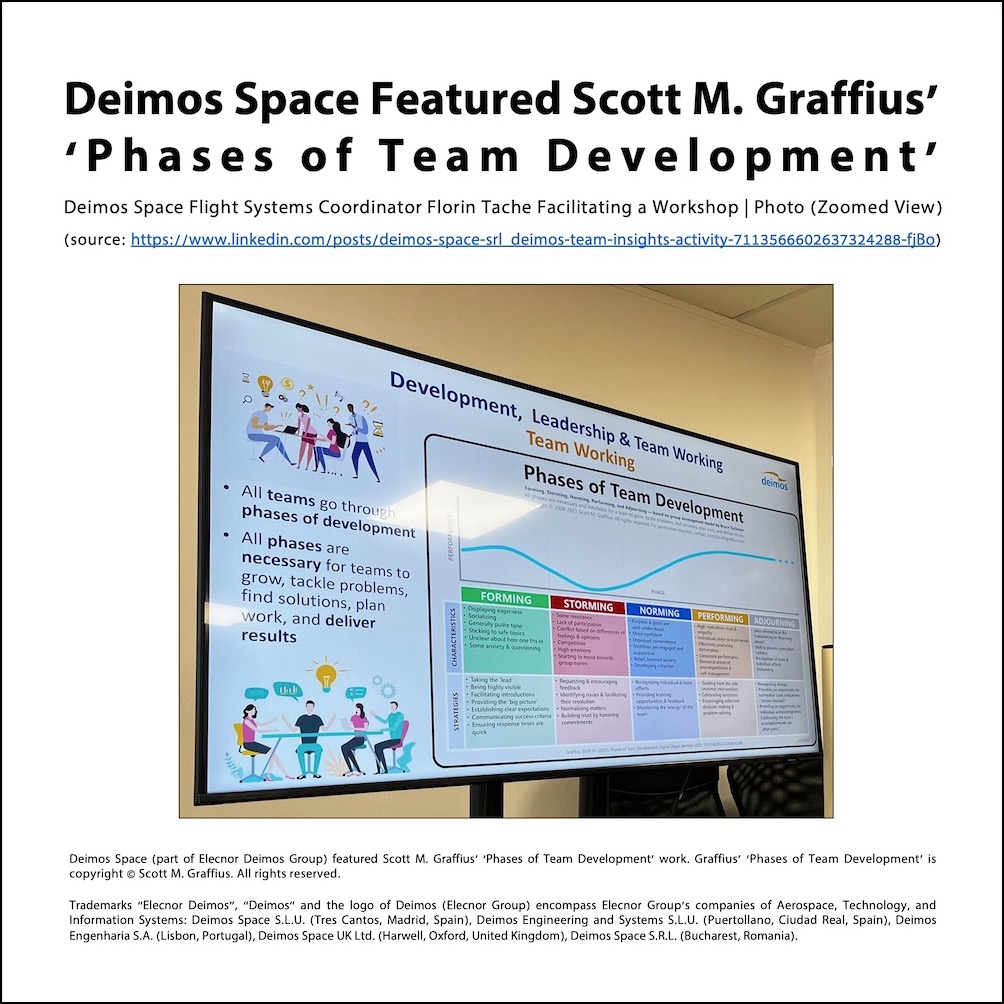
A zoomed-in version of the photo is shown above.
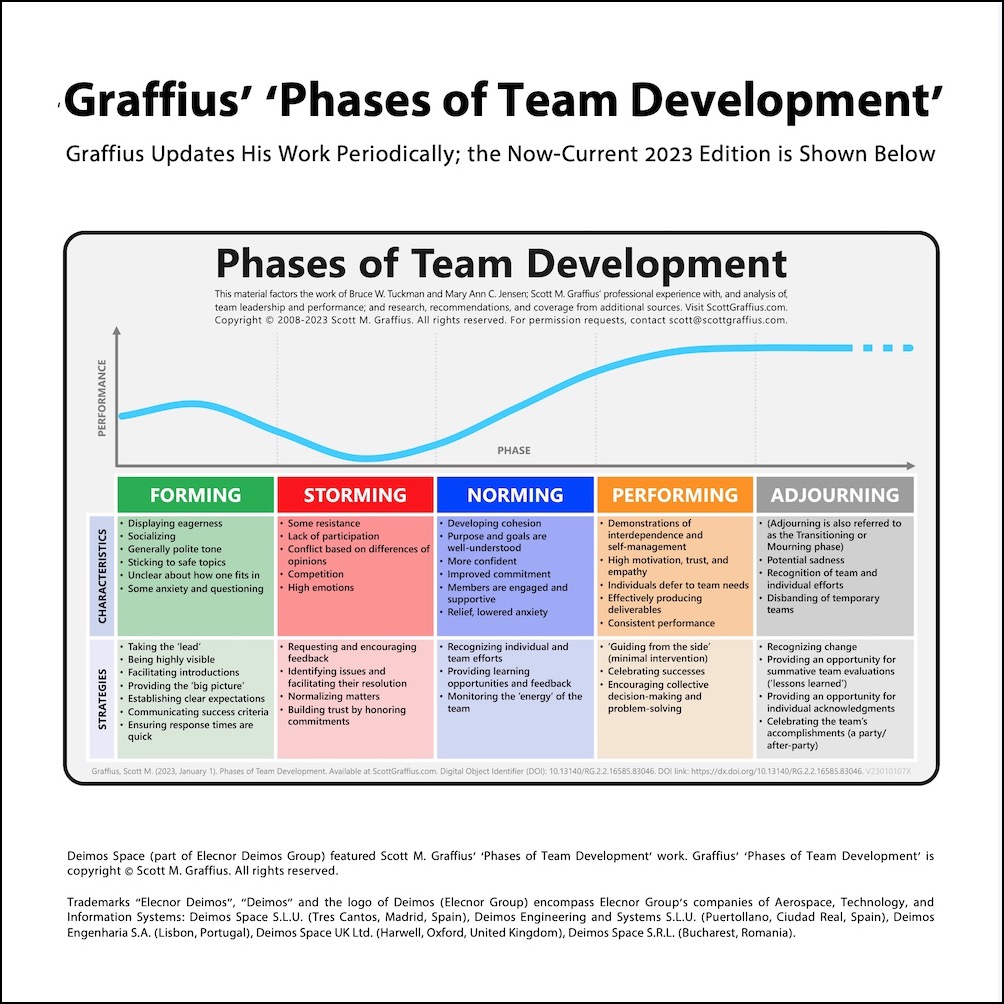
Graffius periodically updates his work. The most current (2023) edition of his 'Phases of Team Development' visual is shown above. Select here for details.
About Deimos Space
Deimos Space (part of Elecnor Deimos Group) is a leading company in the European Aerospace sector with an extensive portfolio of projects and solutions employed at the European Space Agency (ESA) and other organizations. Its expertise includes Satellite Navigation Systems, Space Situational Awareness, Mission Analysis and Design, Guidance Navigation and Control, Ground Segment Systems, and more. Visit their website — here — to learn more.
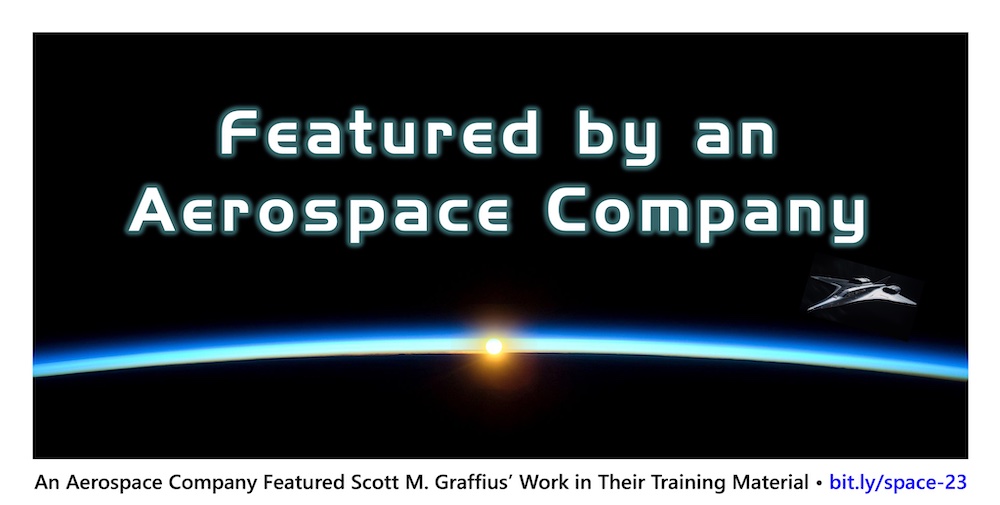




About Scott M. Graffius
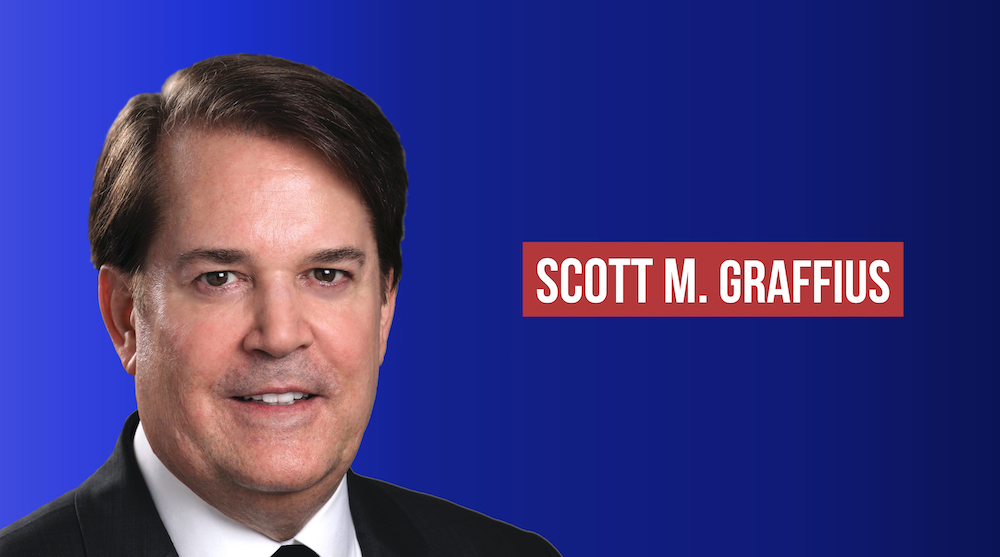
Scott M. Graffius, PMP, SA, CSP-SM, CSP-PO, CSM, CSPO, SFE, ITIL, LSSGB is an agile project management practitioner, consultant, multi-award-winning author, and international keynote speaker. He is the Founder of Exceptional PPM and PMO Solutions™ and subsidiary Exceptional Agility™. He has generated over $1.9 billion of business value in aggregate for Global Fortune 500 businesses and other organizations he has served. Graffius and content from his books, talks, workshops, and more have been featured and used by businesses, professional associations, governments, and universities. Examples include Microsoft, Oracle, Broadcom, Cisco, Gartner, Project Management Institute, IEEE, Qantas, National Academy of Sciences, United States Department of Energy, New Zealand Ministry of Education, Yale University, Tufts University, and others. He has delighted audiences with dynamic and engaging talks and workshops on agile, project management, and technology (including AI) leadership at 87 conferences and other events across 25 countries.
His full bio is available here.
Connect with Scott on:


About Agile Scrum: Your Quick Start Guide with Step-by-Step Instructions

Shifting customer needs are common in today's marketplace. Businesses must be adaptive and responsive to change while delivering an exceptional customer experience to be competitive.
There are a variety of frameworks supporting the development of products and services, and most approaches fall into one of two broad categories: traditional or agile. Traditional practices such as waterfall engage sequential development, while agile involves iterative and incremental deliverables. Organizations are increasingly embracing agile to manage projects, and best meet their business needs of rapid response to change, fast delivery speed, and more.
With clear and easy to follow instructions, the multi award-winning Agile Scrum: Your Quick Start Guide with Step-by-Step Instructions book by Scott M. Graffius (Chris Hare and Colin Giffen, Technical Editors) helps the reader:
Hailed by Literary Titan as “the book highlights the versatility of Scrum beautifully.”
Winner of 17 first place awards.
Agile Scrum: Your Quick Start Guide with Step-by-Step Instructions is available in paperback and ebook/Kindle in the United States and around the world. Some links by country follow.

About Agile Transformation: A Brief Story of How an Entertainment Company Developed New Capabilities and Unlocked Business Agility to Thrive in an Era of Rapid Change

Thriving in today's marketplace frequently depends on making a transformation to become more agile. Those successful in the transition enjoy faster delivery speed and ROI, higher satisfaction, continuous improvement, and additional benefits.
Based on actual events, Agile Transformation: A Brief Story of How an Entertainment Company Developed New Capabilities and Unlocked Business Agility to Thrive in an Era of Rapid Change provides a quick (60-90 minute) read about a successful agile transformation at a multinational entertainment and media company, told from the author's perspective as an agile coach.
The award-winning book by Scott M. Graffius is available in paperback and ebook/Kindle in the United States and around the world. Some links by country follow.

The short URL for this article is: https://bit.ly/space-23.
© Copyright 2023 Scott M. Graffius. All rights reserved. This material may not be published, broadcast, rewritten or redistributed without the express written permission of Scott M. Graffius.


Informed by the research of Bruce W. Tuckman and Mary Ann C. Jensen, over 100 subsequent studies, and Scott M. Graffius' first-hand professional experience with, and analysis of, team leadership and performance, Graffius created his ‘Phases of Team Development’ as a unique perspective and visual conveying the five phases of team development — Forming, Storming, Norming, Performing, and Adjourning — inclusive of a graph showing how performance varies by phase, as well as the characteristics and strategies for each phase.
With permission/a license from Graffius, his ‘Phases of Team Development’ work is used by businesses, professional associations, governments, and universities around the world. Examples include Yale University, IEEE, Torrens University Australia, UK Sports Institute, Adobe, Amsterdam Public Health Research Institute, Academic Cooperation Association, Boston University, U.S. National Park Service, Bayer, Hasso Plattner Institute (Hasso-Plattner-Institut für Digital Engineering GmbH), Singapore University of Social Sciences, New Zealand Government, University of Galway Ireland, and many more.
Deimos Space, a leading Aerospace company, was added to the list.

As shown above, Deimos Space featured Scott M. Graffius' 'Phases of Team Development' work during a training.

A zoomed-in version of the photo is shown above.

Graffius periodically updates his work. The most current (2023) edition of his 'Phases of Team Development' visual is shown above. Select here for details.
About Deimos Space
Deimos Space (part of Elecnor Deimos Group) is a leading company in the European Aerospace sector with an extensive portfolio of projects and solutions employed at the European Space Agency (ESA) and other organizations. Its expertise includes Satellite Navigation Systems, Space Situational Awareness, Mission Analysis and Design, Guidance Navigation and Control, Ground Segment Systems, and more. Visit their website — here — to learn more.




About Scott M. Graffius

Scott M. Graffius, PMP, SA, CSP-SM, CSP-PO, CSM, CSPO, SFE, ITIL, LSSGB is an agile project management practitioner, consultant, multi-award-winning author, and international keynote speaker. He is the Founder of Exceptional PPM and PMO Solutions™ and subsidiary Exceptional Agility™. He has generated over $1.9 billion of business value in aggregate for Global Fortune 500 businesses and other organizations he has served. Graffius and content from his books, talks, workshops, and more have been featured and used by businesses, professional associations, governments, and universities. Examples include Microsoft, Oracle, Broadcom, Cisco, Gartner, Project Management Institute, IEEE, Qantas, National Academy of Sciences, United States Department of Energy, New Zealand Ministry of Education, Yale University, Tufts University, and others. He has delighted audiences with dynamic and engaging talks and workshops on agile, project management, and technology (including AI) leadership at 87 conferences and other events across 25 countries.
His full bio is available here.
Connect with Scott on:


About Agile Scrum: Your Quick Start Guide with Step-by-Step Instructions

Shifting customer needs are common in today's marketplace. Businesses must be adaptive and responsive to change while delivering an exceptional customer experience to be competitive.
There are a variety of frameworks supporting the development of products and services, and most approaches fall into one of two broad categories: traditional or agile. Traditional practices such as waterfall engage sequential development, while agile involves iterative and incremental deliverables. Organizations are increasingly embracing agile to manage projects, and best meet their business needs of rapid response to change, fast delivery speed, and more.
With clear and easy to follow instructions, the multi award-winning Agile Scrum: Your Quick Start Guide with Step-by-Step Instructions book by Scott M. Graffius (Chris Hare and Colin Giffen, Technical Editors) helps the reader:
- Implement and use the most popular agile framework―Scrum;
- Deliver products in short cycles with rapid adaptation to change, fast time-to-market, and continuous improvement; and
- Support innovation and drive competitive advantage.
Hailed by Literary Titan as “the book highlights the versatility of Scrum beautifully.”
Winner of 17 first place awards.
Agile Scrum: Your Quick Start Guide with Step-by-Step Instructions is available in paperback and ebook/Kindle in the United States and around the world. Some links by country follow.
- 🇧🇷 Brazil
- 🇨🇦 Canada
- 🇨🇿 Czech Republic
- 🇩🇰 Denmark
- 🇫🇮 Finland
- 🇫🇷 France
- 🇩🇪 Germany
- 🇬🇷 Greece
- 🇭🇺 Hungary
- 🇮🇳 India
- 🇮🇪 Ireland
- 🇮🇱 Israel
- 🇮🇹 Italy
- 🇯🇵 Japan
- 🇱🇺 Luxembourg
- 🇲🇽 Mexico
- 🇳🇱 Netherlands
- 🇳🇿 New Zealand
- 🇳🇴 Norway
- 🇪🇸 Spain
- 🇸🇪 Sweden
- 🇨🇭 Switzerland
- 🇦🇪 UAE
- 🇬🇧 United Kingdom
- 🇺🇸 United States

About Agile Transformation: A Brief Story of How an Entertainment Company Developed New Capabilities and Unlocked Business Agility to Thrive in an Era of Rapid Change

Thriving in today's marketplace frequently depends on making a transformation to become more agile. Those successful in the transition enjoy faster delivery speed and ROI, higher satisfaction, continuous improvement, and additional benefits.
Based on actual events, Agile Transformation: A Brief Story of How an Entertainment Company Developed New Capabilities and Unlocked Business Agility to Thrive in an Era of Rapid Change provides a quick (60-90 minute) read about a successful agile transformation at a multinational entertainment and media company, told from the author's perspective as an agile coach.
The award-winning book by Scott M. Graffius is available in paperback and ebook/Kindle in the United States and around the world. Some links by country follow.
- 🇦🇺 Australia
- 🇦🇹 Austria
- 🇧🇷 Brazil
- 🇨🇦 Canada
- 🇨🇿 Czech Republic
- 🇩🇰 Denmark
- 🇫🇮 Finland
- 🇫🇷 France
- 🇩🇪 Germany
- 🇬🇷 Greece
- 🇮🇳 India
- 🇮🇪 Ireland
- 🇯🇵 Japan
- 🇱🇺 Luxembourg
- 🇲🇽 Mexico
- 🇳🇱 Netherlands
- 🇳🇿 New Zealand
- 🇪🇸 Spain
- 🇸🇪 Sweden
- 🇨🇭 Switzerland
- 🇦🇪 United Arab Emirates
- 🇬🇧 United Kingdom
- 🇺🇸 United States

The short URL for this article is: https://bit.ly/space-23.
© Copyright 2023 Scott M. Graffius. All rights reserved. This material may not be published, broadcast, rewritten or redistributed without the express written permission of Scott M. Graffius.

Top 5 Roles on AI Teams
09 October 2023
BY SCOTT M. GRAFFIUS | ScottGraffius.com
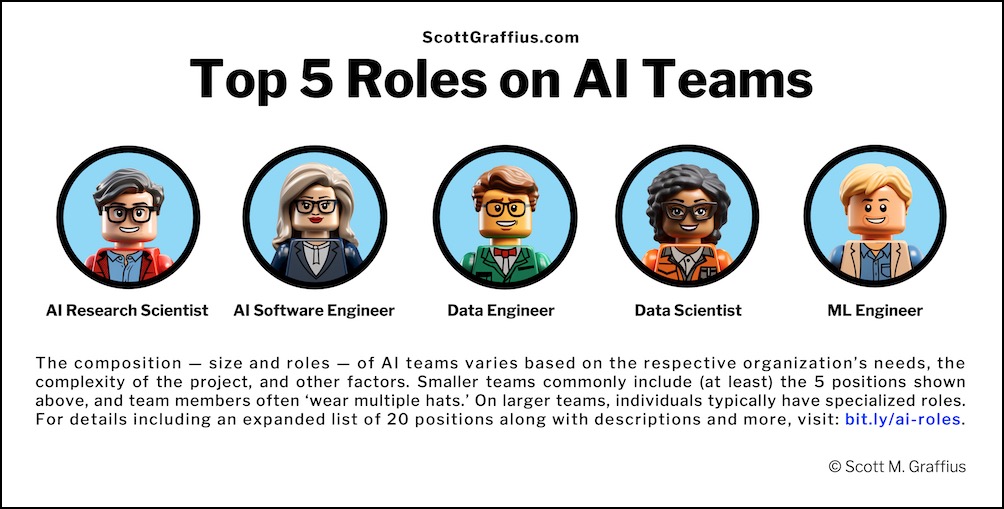
Select here to download a PDF of this article.

Effective Artificial Intelligence (AI) teams leverage critical hard skills and soft skills to develop and deliver successful AI products, including innovative solutions that address real-world challenges and have a positive impact on the world. (If you’d like to learn about the critical skills leveraged by effective AI teams, select here for our popular article on the topic.) This article focuses on the roles on AI teams.

The composition (size and roles) of AI teams varies by organization based on the respective company’s needs, the nature of the AI endeavor including complexity, and other factors. However, AI teams commonly include (at least these) five positions. Here are the five along with brief descriptions, listed in alphabetical order:
The above five roles collectively cover key aspects of AI development — from research and model creation to data management and software integration. Depending on requirements and characteristics (such as degree of complexity), additional positions may be needed.
An expanded list of 20 roles common to AI teams follow. Here are the aforementioned 5 and 15 additional positions, listed in alphabetical order:
The composition (size and roles) of AI teams varies, based on the complexity of the AI project and other factors. On smaller teams, individuals often ‘wear multiple hats.’ On larger teams, individuals typically have more specialized roles.

This article covered the roles common to AI teams. Listings are not exhaustive of all potential positions. Additionally, as the field of AI continues to evolve and advance, new roles may materialize to address emerging challenges and opportunities.
(If you’d like to learn about the critical skills leveraged by successful AI teams, select here for our popular article on the topic.)

References/Sources
All of the supplied links were functional when this article was published.

How to Cite This Article
Graffius, Scott M. (2023, October 9). Top 5 Roles on AI Teams. Available at: https://scottgraffius.com/blog/files/ai-team-roles.html. DOI: 10.13140/RG.2.2.34857.57449.





About Scott M. Graffius

Scott M. Graffius, PMP, SA, CSP-SM, CSP-PO, CSM, CSPO, SFE, ITIL, LSSGB is an agile project management practitioner, consultant, multi-award-winning author, and international keynote speaker. He is the Founder of Exceptional PPM and PMO Solutions™ and subsidiary Exceptional Agility™. He has generated over $1.9 billion of business value in aggregate for Global Fortune 500 businesses and other organizations he has served. Graffius and content from his books, talks, workshops, and more have been featured and used by businesses, professional associations, governments, and universities. Examples include Microsoft, Oracle, Broadcom, Cisco, Gartner, Project Management Institute, IEEE, Qantas, National Academy of Sciences, United States Department of Energy, New Zealand Ministry of Education, Yale University, Tufts University, and others. He has delighted audiences with dynamic and engaging talks and workshops on agile, project management, and technology (including AI, GameDev, and more) leadership at 87 conferences and other events across 25 countries.
His full bio is available here.
Connect with Scott on:


About Agile Scrum: Your Quick Start Guide with Step-by-Step Instructions

Shifting customer needs are common in today's marketplace. Businesses must be adaptive and responsive to change while delivering an exceptional customer experience to be competitive.
There are a variety of frameworks supporting the development of products and services, and most approaches fall into one of two broad categories: traditional or agile. Traditional practices such as waterfall engage sequential development, while agile involves iterative and incremental deliverables. Organizations are increasingly embracing agile to manage projects, and best meet their business needs of rapid response to change, fast delivery speed, and more.
With clear and easy to follow instructions, the multi award-winning Agile Scrum: Your Quick Start Guide with Step-by-Step Instructions book by Scott M. Graffius (Chris Hare and Colin Giffen, Technical Editors) helps the reader:
Hailed by Literary Titan as “the book highlights the versatility of Scrum beautifully.”
Winner of 17 first place awards.
Agile Scrum: Your Quick Start Guide with Step-by-Step Instructions is available in paperback and ebook/Kindle in the United States and around the world. Some links by country follow.

About Agile Transformation: A Brief Story of How an Entertainment Company Developed New Capabilities and Unlocked Business Agility to Thrive in an Era of Rapid Change

Thriving in today's marketplace frequently depends on making a transformation to become more agile. Those successful in the transition enjoy faster delivery speed and ROI, higher satisfaction, continuous improvement, and additional benefits.
Based on actual events, Agile Transformation: A Brief Story of How an Entertainment Company Developed New Capabilities and Unlocked Business Agility to Thrive in an Era of Rapid Change provides a quick (60-90 minute) read about a successful agile transformation at a multinational entertainment and media company, told from the author's perspective as an agile coach.
The award-winning book by Scott M. Graffius is available in paperback and ebook/Kindle in the United States and around the world. Some links by country follow.

The short link for this article is: https://bit.ly/ai-roles.
© Copyright 2023 Scott M. Graffius. All rights reserved. This material may not be published, broadcast, rewritten or redistributed without the express written permission of Scott M. Graffius.


Select here to download a PDF of this article.

Effective Artificial Intelligence (AI) teams leverage critical hard skills and soft skills to develop and deliver successful AI products, including innovative solutions that address real-world challenges and have a positive impact on the world. (If you’d like to learn about the critical skills leveraged by effective AI teams, select here for our popular article on the topic.) This article focuses on the roles on AI teams.

The composition (size and roles) of AI teams varies by organization based on the respective company’s needs, the nature of the AI endeavor including complexity, and other factors. However, AI teams commonly include (at least these) five positions. Here are the five along with brief descriptions, listed in alphabetical order:
- AI Research Scientist: AI research scientists are responsible for conducting research and developing cutting-edge AI algorithms and models.
- AI Software Engineer: AI software engineers are responsible for integrating AI components into software applications. They bridge the gap between AI research and practical implementation, making AI systems usable by end-users.
- Data Engineer: Data engineers are responsible for building and managing the data pipelines that feed AI models. They ensure that data is collected, cleaned, and prepared in a format suitable for analysis and model training.
- Data Scientist: Data scientists are experts in data analysis and interpretation. They preprocess, analyze, and extract valuable insights from data, which is vital for training and improving AI models.
- Machine Learning Engineer: Machine learning engineers focus on implementing and deploying machine learning models into practical applications. They work to ensure that AI models are integrated into software systems effectively.
The above five roles collectively cover key aspects of AI development — from research and model creation to data management and software integration. Depending on requirements and characteristics (such as degree of complexity), additional positions may be needed.
An expanded list of 20 roles common to AI teams follow. Here are the aforementioned 5 and 15 additional positions, listed in alphabetical order:
- AI DevOps Engineer: Combines development and operations skills to streamline AI model deployment. They automate tasks.
- AI Ethicist: Ensures that AI systems are developed and used responsibly and ethically.
- AI Infrastructure Engineer: Builds and maintains the infrastructure required for AI model deployment and scalability.
- AI Legal and Compliance Specialist: Ensures AI projects comply with legal and regulatory requirements.
- AI Marketing Specialist: Promotes and markets AI products and solutions to customers and stakeholders.
- AI Operations (AIOps) Specialist: Focuses on the operational aspects of AI, including monitoring, maintenance, and troubleshooting.
- AI Product Manager: Oversees the development and deployment of AI products.
- AI Project Manager: Leverages general and specialized hard skills and soft skills, and applies their understanding of many aspects of artificial intelligence (such as machine learning, deep learning, automation, robotics, and natural language processing) to manage the planning, execution, and delivery of AI projects. Note: Titles vary by organization; the position may be called an AI Project Manager, AI Program Manager, Agile Project Manager, Technical Project Manager, Scrum Master, or another related designation.
- AI QA Engineer: Ensures the quality and reliability of AI models through testing and validation.
- AI Research Scientist: Conducts research to develop new AI algorithms and models.
- AI Software Engineer: Builds and maintains software systems that incorporate AI components.
- AI Trainer/Annotator: Prepares and labels data for training AI models, especially for supervised learning.
- AI UX/UI Designer: Designs user interfaces and experiences for AI-powered applications.
- Computer Vision Engineer: Specializes in developing AI models for image and video analysis.
- Data Analyst: Examines data to uncover trends and insights that can guide AI projects.
- Data Engineer: Manages data pipelines and prepares data for analysis and model training.
- Data Scientist: Analyzes and interprets data to extract insights and inform AI models.
- Deep Learning Engineer: Focuses on deep neural networks and architectures.
- Machine Learning Engineer: Focuses on implementing and deploying machine learning models.
- Natural Language Processing (NLP) Engineer: Specializes in working with text and language-related AI tasks.
The composition (size and roles) of AI teams varies, based on the complexity of the AI project and other factors. On smaller teams, individuals often ‘wear multiple hats.’ On larger teams, individuals typically have more specialized roles.

This article covered the roles common to AI teams. Listings are not exhaustive of all potential positions. Additionally, as the field of AI continues to evolve and advance, new roles may materialize to address emerging challenges and opportunities.
(If you’d like to learn about the critical skills leveraged by successful AI teams, select here for our popular article on the topic.)

References/Sources
All of the supplied links were functional when this article was published.
- Apple (n.d.). Careers at Apple: Machine Learning and AI. Available at: https://www.apple.com/careers/us/machine-learning-and-ai.html.
- Deloitte AI Institute (2021). Building Successful AI Teams. Available at: https://www2.deloitte.com/content/dam/Deloitte/us/Documents/deloitte-analytics/us-ai-institute-building-successful-AI-teams.pdf.
- Gartner (2020, December 15). Staff AI Teams with Various Roles and Skills for Success. Available at: https://www.gartner.com/smarterwithgartner/how-to-staff-your-ai-team.
- General Services Administration (GSA) Centers of Excellence (CoE) (n.d.). AI Guide for Government. Available at: https://coe.gsa.gov/coe/ai-guide-for-government/understanding-ai-job-roles-career-path/.
- Google Quantum AI (n.d.). Careers. Available at: https://quantumai.google/team/careers.
- Graffius, Scott M. (2023, May 1). AI is a Team Sport: A Confluence of Diverse Technical and Soft Skills are Crucial for Success. Available at: https://www.scottgraffius.com/blog/files/successful-ai-teams.html.
- Graffius, Scott M. (2023). What Successful AI Teams Have in Common [Video]. Graffius’ talk at the 2023 Conf42 Quantum Computer Conference. Available at: https://www.youtube.com/watch?v=u2qRKFbSKYE.
- IBM (n.d.). Assemble the Team to Support a Data-Driven Project. Available at: https://www.ibm.com/garage/method/practices/culture/assemble-team-for-data-driven-project/.
- Intel (n.d.). Artificial Intelligence Teams: Careers. Available at: https://jobs.intel.com/en/search-jobs/artificial+intelligence/599/1.
- Intuit (2020, December 8). How to avoid conflicts and delays in the AI development process (Part I). Available at: https://blogs.intuit.com/2020/12/08/how-to-avoid-conflicts-and-delays-in-the-ai-development-process-part-i/.

How to Cite This Article
Graffius, Scott M. (2023, October 9). Top 5 Roles on AI Teams. Available at: https://scottgraffius.com/blog/files/ai-team-roles.html. DOI: 10.13140/RG.2.2.34857.57449.



About Scott M. Graffius

Scott M. Graffius, PMP, SA, CSP-SM, CSP-PO, CSM, CSPO, SFE, ITIL, LSSGB is an agile project management practitioner, consultant, multi-award-winning author, and international keynote speaker. He is the Founder of Exceptional PPM and PMO Solutions™ and subsidiary Exceptional Agility™. He has generated over $1.9 billion of business value in aggregate for Global Fortune 500 businesses and other organizations he has served. Graffius and content from his books, talks, workshops, and more have been featured and used by businesses, professional associations, governments, and universities. Examples include Microsoft, Oracle, Broadcom, Cisco, Gartner, Project Management Institute, IEEE, Qantas, National Academy of Sciences, United States Department of Energy, New Zealand Ministry of Education, Yale University, Tufts University, and others. He has delighted audiences with dynamic and engaging talks and workshops on agile, project management, and technology (including AI, GameDev, and more) leadership at 87 conferences and other events across 25 countries.
His full bio is available here.
Connect with Scott on:


About Agile Scrum: Your Quick Start Guide with Step-by-Step Instructions

Shifting customer needs are common in today's marketplace. Businesses must be adaptive and responsive to change while delivering an exceptional customer experience to be competitive.
There are a variety of frameworks supporting the development of products and services, and most approaches fall into one of two broad categories: traditional or agile. Traditional practices such as waterfall engage sequential development, while agile involves iterative and incremental deliverables. Organizations are increasingly embracing agile to manage projects, and best meet their business needs of rapid response to change, fast delivery speed, and more.
With clear and easy to follow instructions, the multi award-winning Agile Scrum: Your Quick Start Guide with Step-by-Step Instructions book by Scott M. Graffius (Chris Hare and Colin Giffen, Technical Editors) helps the reader:
- Implement and use the most popular agile framework―Scrum;
- Deliver products in short cycles with rapid adaptation to change, fast time-to-market, and continuous improvement; and
- Support innovation and drive competitive advantage.
Hailed by Literary Titan as “the book highlights the versatility of Scrum beautifully.”
Winner of 17 first place awards.
Agile Scrum: Your Quick Start Guide with Step-by-Step Instructions is available in paperback and ebook/Kindle in the United States and around the world. Some links by country follow.
- 🇧🇷 Brazil
- 🇨🇦 Canada
- 🇨🇿 Czech Republic
- 🇩🇰 Denmark
- 🇫🇮 Finland
- 🇫🇷 France
- 🇩🇪 Germany
- 🇬🇷 Greece
- 🇭🇺 Hungary
- 🇮🇳 India
- 🇮🇪 Ireland
- 🇮🇱 Israel
- 🇮🇹 Italy
- 🇯🇵 Japan
- 🇱🇺 Luxembourg
- 🇲🇽 Mexico
- 🇳🇱 Netherlands
- 🇳🇿 New Zealand
- 🇳🇴 Norway
- 🇪🇸 Spain
- 🇸🇪 Sweden
- 🇨🇭 Switzerland
- 🇦🇪 UAE
- 🇬🇧 United Kingdom
- 🇺🇸 United States

About Agile Transformation: A Brief Story of How an Entertainment Company Developed New Capabilities and Unlocked Business Agility to Thrive in an Era of Rapid Change

Thriving in today's marketplace frequently depends on making a transformation to become more agile. Those successful in the transition enjoy faster delivery speed and ROI, higher satisfaction, continuous improvement, and additional benefits.
Based on actual events, Agile Transformation: A Brief Story of How an Entertainment Company Developed New Capabilities and Unlocked Business Agility to Thrive in an Era of Rapid Change provides a quick (60-90 minute) read about a successful agile transformation at a multinational entertainment and media company, told from the author's perspective as an agile coach.
The award-winning book by Scott M. Graffius is available in paperback and ebook/Kindle in the United States and around the world. Some links by country follow.
- 🇦🇺 Australia
- 🇦🇹 Austria
- 🇧🇷 Brazil
- 🇨🇦 Canada
- 🇨🇿 Czech Republic
- 🇩🇰 Denmark
- 🇫🇮 Finland
- 🇫🇷 France
- 🇩🇪 Germany
- 🇬🇷 Greece
- 🇮🇳 India
- 🇮🇪 Ireland
- 🇯🇵 Japan
- 🇱🇺 Luxembourg
- 🇲🇽 Mexico
- 🇳🇱 Netherlands
- 🇳🇿 New Zealand
- 🇪🇸 Spain
- 🇸🇪 Sweden
- 🇨🇭 Switzerland
- 🇦🇪 United Arab Emirates
- 🇬🇧 United Kingdom
- 🇺🇸 United States

The short link for this article is: https://bit.ly/ai-roles.
© Copyright 2023 Scott M. Graffius. All rights reserved. This material may not be published, broadcast, rewritten or redistributed without the express written permission of Scott M. Graffius.

LTEN Featured Scott M. Graffius' 'Phases of Team Development'
16 October 2023
BY SCOTT M. GRAFFIUS | ScottGraffius.com
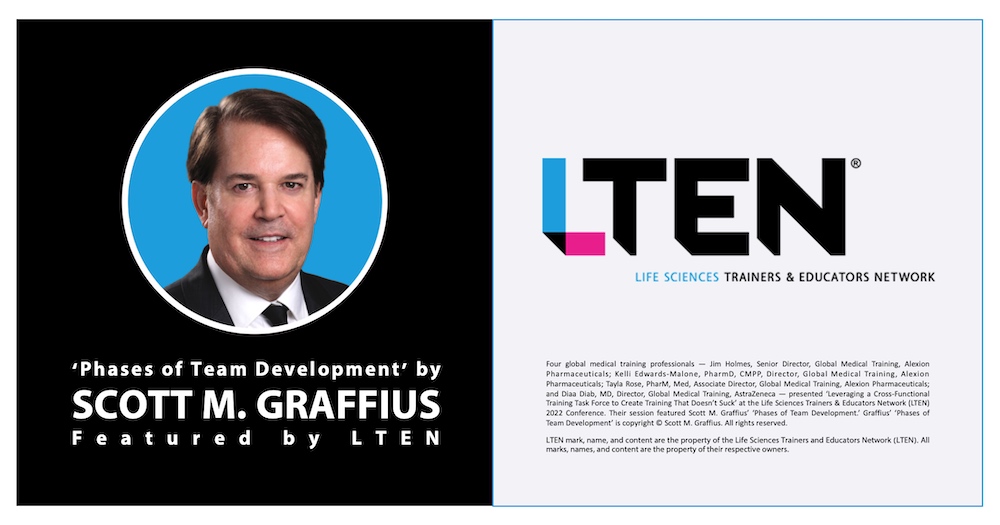
Informed by the research of Bruce W. Tuckman and Mary Ann C. Jensen, over 100 subsequent studies, and Scott M. Graffius' first-hand professional experience with, and analysis of, team leadership and performance, Graffius created his ‘Phases of Team Development’ as a unique perspective and visual conveying the five phases of team development — Forming, Storming, Norming, Performing, and Adjourning — inclusive of a graph showing how performance varies by phase, as well as the characteristics and strategies for each phase.
With permission/a license from Graffius, his ‘Phases of Team Development’ work is used by businesses, professional associations, governments, and universities around the world. Examples include Yale University, IEEE, Torrens University Australia, UK Sports Institute, Adobe, Amsterdam Public Health Research Institute, Academic Cooperation Association, Boston University, U.S. National Park Service, Bayer, Hasso Plattner Institute (Hasso-Plattner-Institut für Digital Engineering GmbH), Singapore University of Social Sciences, New Zealand Government, University of Galway Ireland, and many more.
Life Sciences Trainers & Educators Network (LTEN) used Graffius' 'Phases of Team Development' copyrighted property.
Four global medical training professionals — Jim Holmes, Senior Director, Global Medical Training, Alexion Pharmaceuticals; Kelli Edwards-Malone, PharmD, CMPP, Director, Global Medical Training, Alexion Pharmaceuticals; Tayla Rose, PharM, Med, Associate Director, Global Medical Training, Alexion Pharmaceuticals; and Diaa Diab, MD, Director, Global Medical Training, AstraZeneca — presented ‘Leveraging a Cross-Functional Training Task Force to Create Training That Doesn’t Suck’ at the Life Sciences Trainers & Educators Network (LTEN) 2022 Conference. Their session featured Graffius' ‘Phases of Team Development’ copyrighted property.
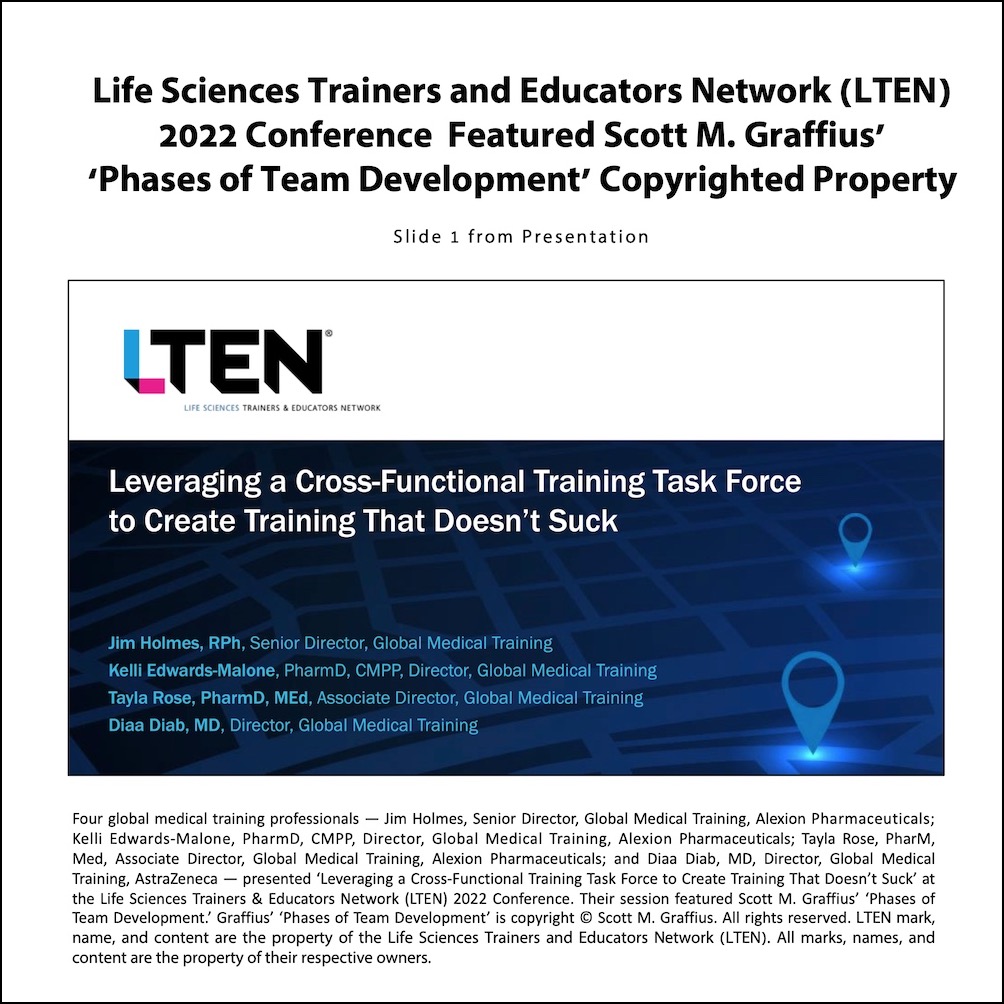
Slide 1 from the session is above.
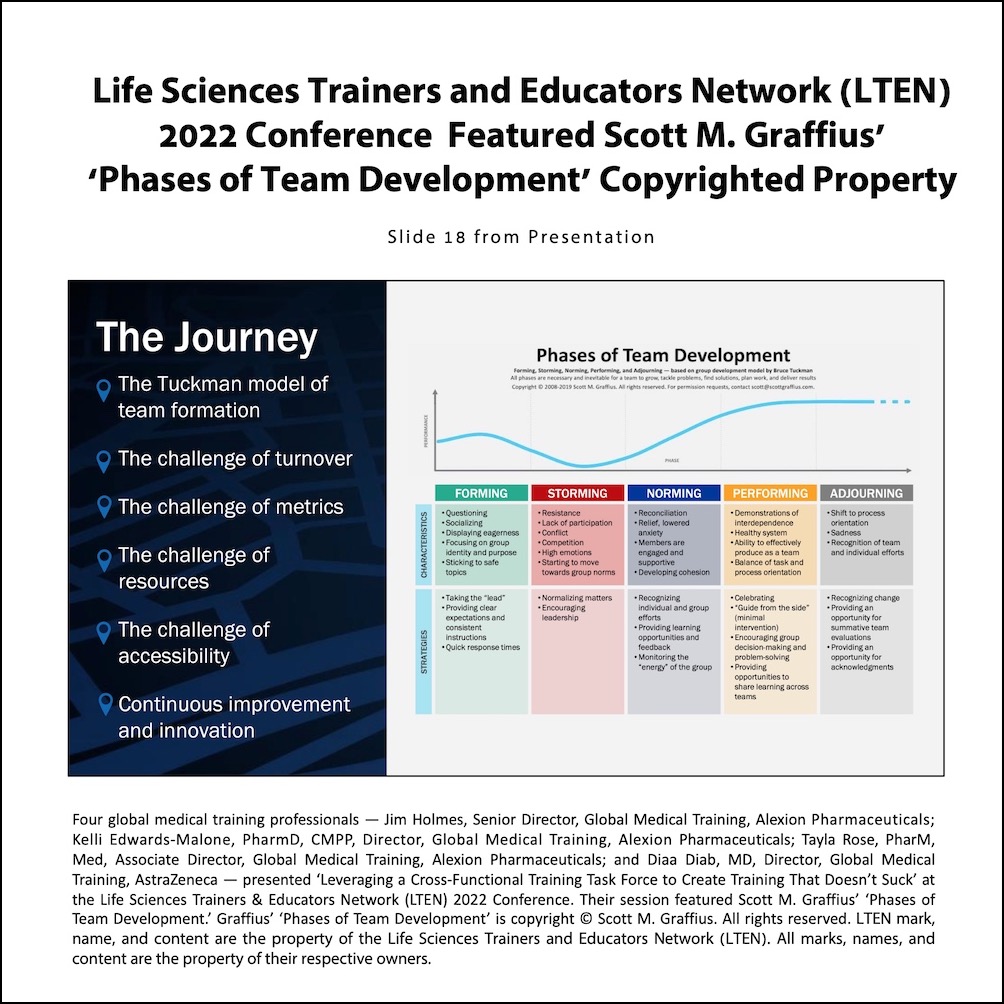
Slide 18 from the session is above.
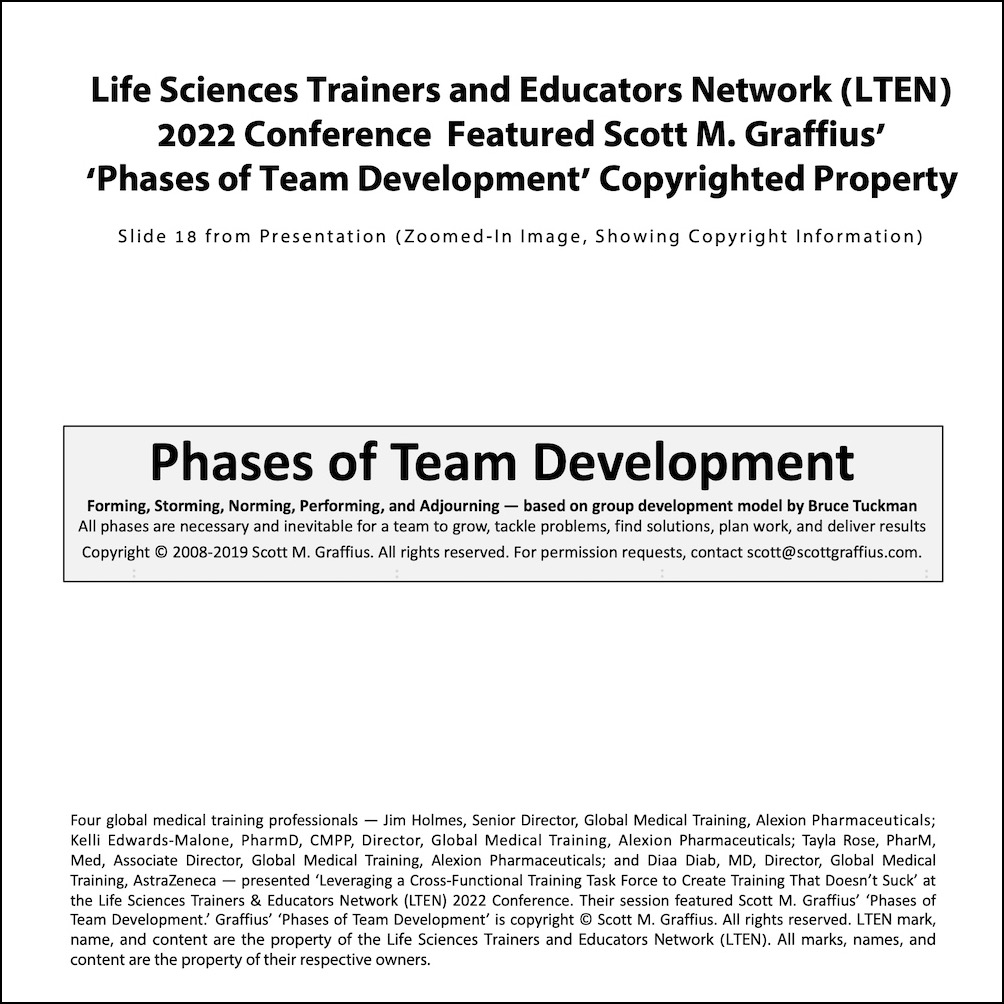
Slide 18 — zoomed-in, to best show the copyright information — is above.
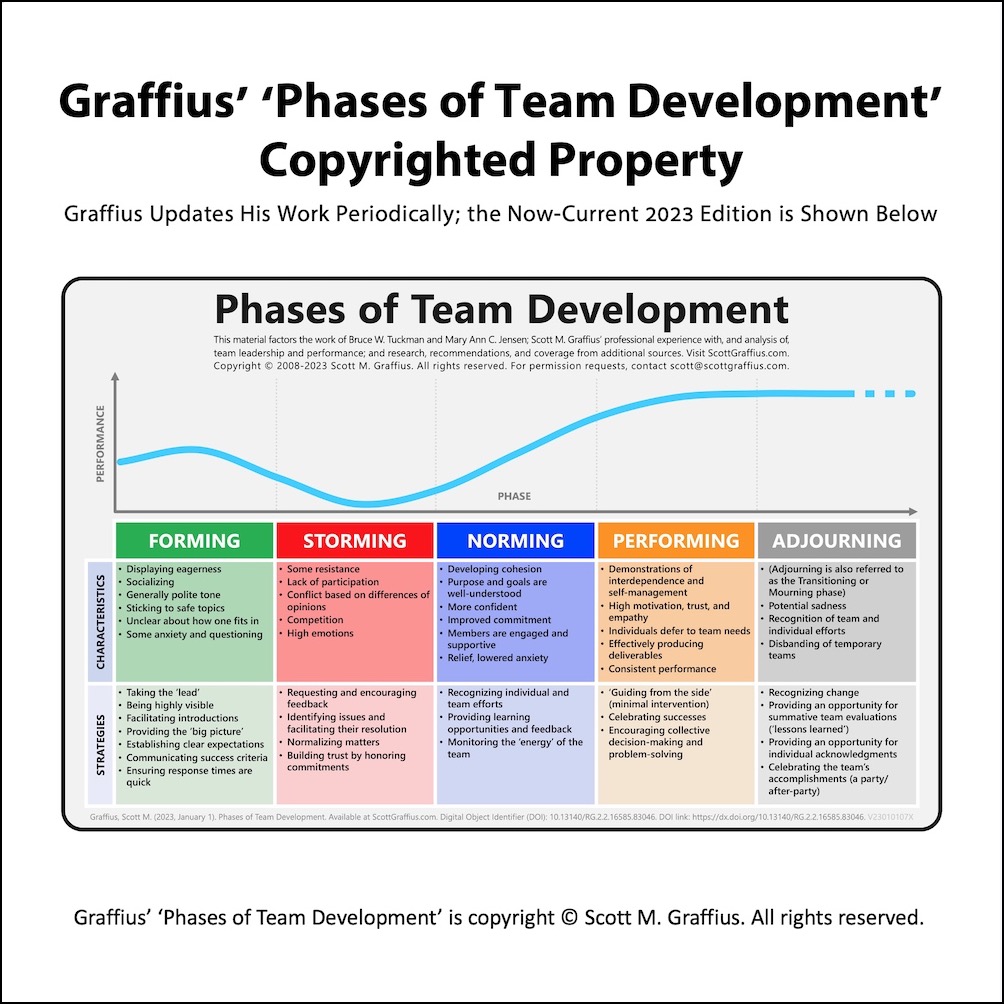
Graffius periodically updates his work. The most current (2023) edition of his 'Phases of Team Development' visual is shown above. Select here for details.
About the Life Sciences Trainers & Educators Network (LTEN)
LTEN's mission statement: "LTEN is the essential resource for life sciences trainer education and networking; enabling members to harness their collective knowledge, apply leading-edge technology, and deliver world-class learning."
Visit their website — here — to learn more.




About Scott M. Graffius

Scott M. Graffius, PMP, SA, CSP-SM, CSP-PO, CSM, CSPO, SFE, ITIL, LSSGB is an agile project management practitioner, consultant, multi-award-winning author, and international keynote speaker. He is the Founder of Exceptional PPM and PMO Solutions™ and subsidiary Exceptional Agility™. He has generated over $1.9 billion of business value in aggregate for Global Fortune 500 businesses and other organizations he has served. Graffius and content from his books, talks, workshops, and more have been featured and used by businesses, professional associations, governments, and universities. Examples include Microsoft, Oracle, Broadcom, Cisco, Gartner, Project Management Institute, IEEE, Qantas, National Academy of Sciences, United States Department of Energy, New Zealand Ministry of Education, Yale University, Tufts University, and others. He has delighted audiences with dynamic and engaging talks and workshops at 88 conferences and other events across 25 countries.
His full bio is available here.
Connect with Scott on:


About Agile Scrum: Your Quick Start Guide with Step-by-Step Instructions

Shifting customer needs are common in today's marketplace. Businesses must be adaptive and responsive to change while delivering an exceptional customer experience to be competitive.
There are a variety of frameworks supporting the development of products and services, and most approaches fall into one of two broad categories: traditional or agile. Traditional practices such as waterfall engage sequential development, while agile involves iterative and incremental deliverables. Organizations are increasingly embracing agile to manage projects, and best meet their business needs of rapid response to change, fast delivery speed, and more.
With clear and easy to follow instructions, the multi award-winning Agile Scrum: Your Quick Start Guide with Step-by-Step Instructions book by Scott M. Graffius (Chris Hare and Colin Giffen, Technical Editors) helps the reader:
Hailed by Literary Titan as “the book highlights the versatility of Scrum beautifully.”
Winner of 17 first place awards.
Agile Scrum: Your Quick Start Guide with Step-by-Step Instructions is available in paperback and ebook/Kindle in the United States and around the world. Some links by country follow.

About Agile Transformation: A Brief Story of How an Entertainment Company Developed New Capabilities and Unlocked Business Agility to Thrive in an Era of Rapid Change

Thriving in today's marketplace frequently depends on making a transformation to become more agile. Those successful in the transition enjoy faster delivery speed and ROI, higher satisfaction, continuous improvement, and additional benefits.
Based on actual events, Agile Transformation: A Brief Story of How an Entertainment Company Developed New Capabilities and Unlocked Business Agility to Thrive in an Era of Rapid Change provides a quick (60-90 minute) read about a successful agile transformation at a multinational entertainment and media company, told from the author's perspective as an agile coach.
The award-winning book by Scott M. Graffius is available in paperback and ebook/Kindle in the United States and around the world. Some links by country follow.

© Copyright 2023 Scott M. Graffius. All rights reserved. This material may not be published, broadcast, rewritten or redistributed without the express written permission of Scott M. Graffius.


Informed by the research of Bruce W. Tuckman and Mary Ann C. Jensen, over 100 subsequent studies, and Scott M. Graffius' first-hand professional experience with, and analysis of, team leadership and performance, Graffius created his ‘Phases of Team Development’ as a unique perspective and visual conveying the five phases of team development — Forming, Storming, Norming, Performing, and Adjourning — inclusive of a graph showing how performance varies by phase, as well as the characteristics and strategies for each phase.
With permission/a license from Graffius, his ‘Phases of Team Development’ work is used by businesses, professional associations, governments, and universities around the world. Examples include Yale University, IEEE, Torrens University Australia, UK Sports Institute, Adobe, Amsterdam Public Health Research Institute, Academic Cooperation Association, Boston University, U.S. National Park Service, Bayer, Hasso Plattner Institute (Hasso-Plattner-Institut für Digital Engineering GmbH), Singapore University of Social Sciences, New Zealand Government, University of Galway Ireland, and many more.
Life Sciences Trainers & Educators Network (LTEN) used Graffius' 'Phases of Team Development' copyrighted property.
Four global medical training professionals — Jim Holmes, Senior Director, Global Medical Training, Alexion Pharmaceuticals; Kelli Edwards-Malone, PharmD, CMPP, Director, Global Medical Training, Alexion Pharmaceuticals; Tayla Rose, PharM, Med, Associate Director, Global Medical Training, Alexion Pharmaceuticals; and Diaa Diab, MD, Director, Global Medical Training, AstraZeneca — presented ‘Leveraging a Cross-Functional Training Task Force to Create Training That Doesn’t Suck’ at the Life Sciences Trainers & Educators Network (LTEN) 2022 Conference. Their session featured Graffius' ‘Phases of Team Development’ copyrighted property.

Slide 1 from the session is above.

Slide 18 from the session is above.

Slide 18 — zoomed-in, to best show the copyright information — is above.

Graffius periodically updates his work. The most current (2023) edition of his 'Phases of Team Development' visual is shown above. Select here for details.
About the Life Sciences Trainers & Educators Network (LTEN)
LTEN's mission statement: "LTEN is the essential resource for life sciences trainer education and networking; enabling members to harness their collective knowledge, apply leading-edge technology, and deliver world-class learning."
Visit their website — here — to learn more.



About Scott M. Graffius

Scott M. Graffius, PMP, SA, CSP-SM, CSP-PO, CSM, CSPO, SFE, ITIL, LSSGB is an agile project management practitioner, consultant, multi-award-winning author, and international keynote speaker. He is the Founder of Exceptional PPM and PMO Solutions™ and subsidiary Exceptional Agility™. He has generated over $1.9 billion of business value in aggregate for Global Fortune 500 businesses and other organizations he has served. Graffius and content from his books, talks, workshops, and more have been featured and used by businesses, professional associations, governments, and universities. Examples include Microsoft, Oracle, Broadcom, Cisco, Gartner, Project Management Institute, IEEE, Qantas, National Academy of Sciences, United States Department of Energy, New Zealand Ministry of Education, Yale University, Tufts University, and others. He has delighted audiences with dynamic and engaging talks and workshops at 88 conferences and other events across 25 countries.
His full bio is available here.
Connect with Scott on:


About Agile Scrum: Your Quick Start Guide with Step-by-Step Instructions

Shifting customer needs are common in today's marketplace. Businesses must be adaptive and responsive to change while delivering an exceptional customer experience to be competitive.
There are a variety of frameworks supporting the development of products and services, and most approaches fall into one of two broad categories: traditional or agile. Traditional practices such as waterfall engage sequential development, while agile involves iterative and incremental deliverables. Organizations are increasingly embracing agile to manage projects, and best meet their business needs of rapid response to change, fast delivery speed, and more.
With clear and easy to follow instructions, the multi award-winning Agile Scrum: Your Quick Start Guide with Step-by-Step Instructions book by Scott M. Graffius (Chris Hare and Colin Giffen, Technical Editors) helps the reader:
- Implement and use the most popular agile framework―Scrum;
- Deliver products in short cycles with rapid adaptation to change, fast time-to-market, and continuous improvement; and
- Support innovation and drive competitive advantage.
Hailed by Literary Titan as “the book highlights the versatility of Scrum beautifully.”
Winner of 17 first place awards.
Agile Scrum: Your Quick Start Guide with Step-by-Step Instructions is available in paperback and ebook/Kindle in the United States and around the world. Some links by country follow.
- 🇧🇷 Brazil
- 🇨🇦 Canada
- 🇨🇿 Czech Republic
- 🇩🇰 Denmark
- 🇫🇮 Finland
- 🇫🇷 France
- 🇩🇪 Germany
- 🇬🇷 Greece
- 🇭🇺 Hungary
- 🇮🇳 India
- 🇮🇪 Ireland
- 🇮🇱 Israel
- 🇮🇹 Italy
- 🇯🇵 Japan
- 🇱🇺 Luxembourg
- 🇲🇽 Mexico
- 🇳🇱 Netherlands
- 🇳🇿 New Zealand
- 🇳🇴 Norway
- 🇪🇸 Spain
- 🇸🇪 Sweden
- 🇨🇭 Switzerland
- 🇦🇪 UAE
- 🇬🇧 United Kingdom
- 🇺🇸 United States

About Agile Transformation: A Brief Story of How an Entertainment Company Developed New Capabilities and Unlocked Business Agility to Thrive in an Era of Rapid Change

Thriving in today's marketplace frequently depends on making a transformation to become more agile. Those successful in the transition enjoy faster delivery speed and ROI, higher satisfaction, continuous improvement, and additional benefits.
Based on actual events, Agile Transformation: A Brief Story of How an Entertainment Company Developed New Capabilities and Unlocked Business Agility to Thrive in an Era of Rapid Change provides a quick (60-90 minute) read about a successful agile transformation at a multinational entertainment and media company, told from the author's perspective as an agile coach.
The award-winning book by Scott M. Graffius is available in paperback and ebook/Kindle in the United States and around the world. Some links by country follow.
- 🇦🇺 Australia
- 🇦🇹 Austria
- 🇧🇷 Brazil
- 🇨🇦 Canada
- 🇨🇿 Czech Republic
- 🇩🇰 Denmark
- 🇫🇮 Finland
- 🇫🇷 France
- 🇩🇪 Germany
- 🇬🇷 Greece
- 🇮🇳 India
- 🇮🇪 Ireland
- 🇯🇵 Japan
- 🇱🇺 Luxembourg
- 🇲🇽 Mexico
- 🇳🇱 Netherlands
- 🇳🇿 New Zealand
- 🇪🇸 Spain
- 🇸🇪 Sweden
- 🇨🇭 Switzerland
- 🇦🇪 United Arab Emirates
- 🇬🇧 United Kingdom
- 🇺🇸 United States

© Copyright 2023 Scott M. Graffius. All rights reserved. This material may not be published, broadcast, rewritten or redistributed without the express written permission of Scott M. Graffius.

IEEE Xplore Publication Featured Scott M. Graffius' 'Phases of Team Development' Work
27 October 2023
BY SCOTT M. GRAFFIUS | ScottGraffius.com
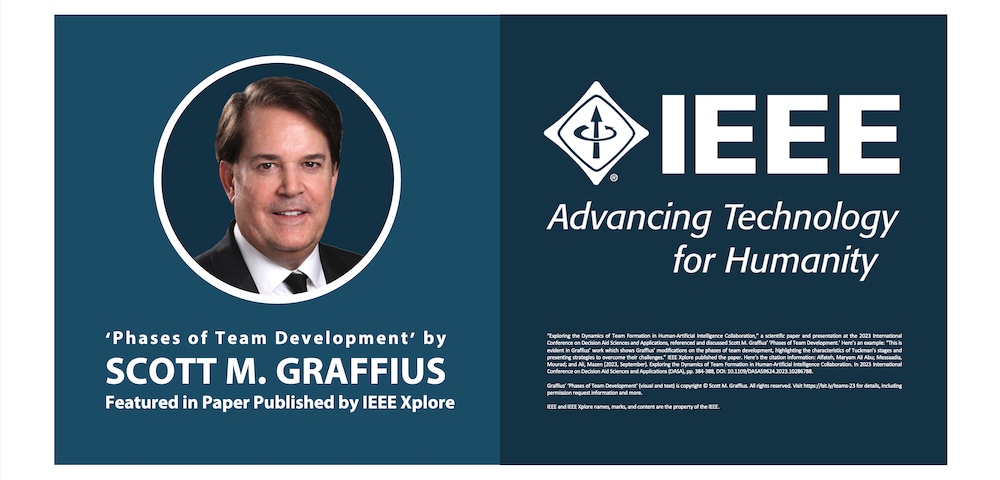
The scientific paper, “Exploring the Dynamics of Team Formation in Human-Artificial Intelligence Collaboration,” referenced and discussed Scott M. Graffius’ ‘Phases of Team Development’ work.
“Exploring the Dynamics of Team Formation in Human-Artificial Intelligence Collaboration” — a scientific paper and presentation at the 2023 International Conference on Decision Aid Sciences and Applications — referenced and discussed Graffius’ ‘Phases of Team Development.’ Here’s an excerpt: “This is evident in Graffius’ work which shows Graffius’ modifications on the phases of team development, highlighting the characteristics of Tuckman’s stages and presenting strategies to overcome their challenges.”
IEEE Xplore published the paper (here). Here’s the citation information:
Alfateh, Maryam Ali Abu; Messaadia, Mourad; and Ali, Mazen (2023, September). Exploring the Dynamics of Team Formation in Human-Artificial Intelligence Collaboration. In 2023 International Conference on Decision Aid Sciences and Applications (DASA), pp. 384-388. DOI: 10.1109/DASA59624.2023.10286788.
About Scott M. Graffius’ ‘Phases of Team Development’

Informed by the research of Bruce W. Tuckman and Mary Ann C. Jensen, over 100 subsequent studies, and Graffius’ first-hand professional experience with, and analysis of, team leadership and performance, Graffius created his ‘Phases of Team Development’ as a unique perspective and visual conveying the five phases of team development — Forming, Storming, Norming, Performing, and Adjourning — inclusive of a graph showing how performance varies by phase, as well as the characteristics and strategies for each phase.
With permission/a license from Graffius, his ‘Phases of Team Development’ work is used by businesses, professional associations, governments, and universities around the world. Examples include Yale University, IEEE, Torrens University Australia, UK Sports Institute, Adobe, Amsterdam Public Health Research Institute, Academic Cooperation Association, Boston University, U.S. National Park Service, Bayer, Hasso Plattner Institute (Hasso-Plattner-Institut für Digital Engineering GmbH), Singapore University of Social Sciences, New Zealand Government, University of Galway Ireland, and many more.
Visit https://bit.ly/teams-23 for details, including permission request information and more.
Graffius’ ‘Phases of Team Development’ (visual and text) is copyright © Scott M. Graffius. All rights reserved.
About the IEEE
The Institute of Electrical and Electronics Engineers (IEEE) is the world’s largest professional organization advancing innovation and technological excellence for the benefit of humanity. IEEE and its members (which includes Graffius) inspire a global community to innovate for a better tomorrow through its highly cited publications, conferences, technology standards, and professional and educational activities. IEEE is the trusted “voice” for engineering, computing, and technology information around the globe. Visit https://ieee.org to learn more.
IEEE name, mark, and content are the property of the IEEE.
About IEEE Xplore
IEEE Xplore is the flagship digital platform for discovery and access to scientific and technical content published by the IEEE and its publishing partners. Visit https://innovate.ieee.org to learn more.
IEEE Xplore name, mark, and content are the property of the IEEE.





About Scott M. Graffius

Scott M. Graffius, PMP, SA, CSP-SM, CSP-PO, CSM, CSPO, SFE, ITIL, LSSGB is an agile project management practitioner, consultant, multi-award-winning author, and international keynote speaker. He is the Founder of Exceptional PPM and PMO Solutions™ and subsidiary Exceptional Agility™. He has generated over $1.9 billion of business value in aggregate for Global Fortune 500 businesses and other organizations he has served. Graffius and content from his books, talks, workshops, and more have been featured and used by businesses, professional associations, governments, and universities. Examples include Microsoft, Oracle, Broadcom, Cisco, Gartner, Project Management Institute, IEEE, Qantas, National Academy of Sciences, United States Department of Energy, New Zealand Ministry of Education, Yale University, Tufts University, and others. He has delighted audiences with dynamic and engaging talks and workshops at 88 conferences and other events across 25 countries.
His full bio is available here.
Connect with Scott on:


About Agile Scrum: Your Quick Start Guide with Step-by-Step Instructions

Shifting customer needs are common in today's marketplace. Businesses must be adaptive and responsive to change while delivering an exceptional customer experience to be competitive.
There are a variety of frameworks supporting the development of products and services, and most approaches fall into one of two broad categories: traditional or agile. Traditional practices such as waterfall engage sequential development, while agile involves iterative and incremental deliverables. Organizations are increasingly embracing agile to manage projects, and best meet their business needs of rapid response to change, fast delivery speed, and more.
With clear and easy to follow instructions, the multi award-winning Agile Scrum: Your Quick Start Guide with Step-by-Step Instructions book by Scott M. Graffius (Chris Hare and Colin Giffen, Technical Editors) helps the reader:
Hailed by Literary Titan as “the book highlights the versatility of Scrum beautifully.”
Winner of 17 first place awards.
Agile Scrum: Your Quick Start Guide with Step-by-Step Instructions is available in paperback and ebook/Kindle in the United States and around the world. Some links by country follow.

About Agile Transformation: A Brief Story of How an Entertainment Company Developed New Capabilities and Unlocked Business Agility to Thrive in an Era of Rapid Change

Thriving in today's marketplace frequently depends on making a transformation to become more agile. Those successful in the transition enjoy faster delivery speed and ROI, higher satisfaction, continuous improvement, and additional benefits.
Based on actual events, Agile Transformation: A Brief Story of How an Entertainment Company Developed New Capabilities and Unlocked Business Agility to Thrive in an Era of Rapid Change provides a quick (60-90 minute) read about a successful agile transformation at a multinational entertainment and media company, told from the author's perspective as an agile coach.
The award-winning book by Scott M. Graffius is available in paperback and ebook/Kindle in the United States and around the world. Some links by country follow.

© Copyright 2023 Scott M. Graffius. All rights reserved. This material may not be published, broadcast, rewritten or redistributed without the express written permission of Scott M. Graffius.


The scientific paper, “Exploring the Dynamics of Team Formation in Human-Artificial Intelligence Collaboration,” referenced and discussed Scott M. Graffius’ ‘Phases of Team Development’ work.
“Exploring the Dynamics of Team Formation in Human-Artificial Intelligence Collaboration” — a scientific paper and presentation at the 2023 International Conference on Decision Aid Sciences and Applications — referenced and discussed Graffius’ ‘Phases of Team Development.’ Here’s an excerpt: “This is evident in Graffius’ work which shows Graffius’ modifications on the phases of team development, highlighting the characteristics of Tuckman’s stages and presenting strategies to overcome their challenges.”
IEEE Xplore published the paper (here). Here’s the citation information:
Alfateh, Maryam Ali Abu; Messaadia, Mourad; and Ali, Mazen (2023, September). Exploring the Dynamics of Team Formation in Human-Artificial Intelligence Collaboration. In 2023 International Conference on Decision Aid Sciences and Applications (DASA), pp. 384-388. DOI: 10.1109/DASA59624.2023.10286788.
About Scott M. Graffius’ ‘Phases of Team Development’

Informed by the research of Bruce W. Tuckman and Mary Ann C. Jensen, over 100 subsequent studies, and Graffius’ first-hand professional experience with, and analysis of, team leadership and performance, Graffius created his ‘Phases of Team Development’ as a unique perspective and visual conveying the five phases of team development — Forming, Storming, Norming, Performing, and Adjourning — inclusive of a graph showing how performance varies by phase, as well as the characteristics and strategies for each phase.
With permission/a license from Graffius, his ‘Phases of Team Development’ work is used by businesses, professional associations, governments, and universities around the world. Examples include Yale University, IEEE, Torrens University Australia, UK Sports Institute, Adobe, Amsterdam Public Health Research Institute, Academic Cooperation Association, Boston University, U.S. National Park Service, Bayer, Hasso Plattner Institute (Hasso-Plattner-Institut für Digital Engineering GmbH), Singapore University of Social Sciences, New Zealand Government, University of Galway Ireland, and many more.
Visit https://bit.ly/teams-23 for details, including permission request information and more.
Graffius’ ‘Phases of Team Development’ (visual and text) is copyright © Scott M. Graffius. All rights reserved.
About the IEEE
The Institute of Electrical and Electronics Engineers (IEEE) is the world’s largest professional organization advancing innovation and technological excellence for the benefit of humanity. IEEE and its members (which includes Graffius) inspire a global community to innovate for a better tomorrow through its highly cited publications, conferences, technology standards, and professional and educational activities. IEEE is the trusted “voice” for engineering, computing, and technology information around the globe. Visit https://ieee.org to learn more.
IEEE name, mark, and content are the property of the IEEE.
About IEEE Xplore
IEEE Xplore is the flagship digital platform for discovery and access to scientific and technical content published by the IEEE and its publishing partners. Visit https://innovate.ieee.org to learn more.
IEEE Xplore name, mark, and content are the property of the IEEE.



About Scott M. Graffius

Scott M. Graffius, PMP, SA, CSP-SM, CSP-PO, CSM, CSPO, SFE, ITIL, LSSGB is an agile project management practitioner, consultant, multi-award-winning author, and international keynote speaker. He is the Founder of Exceptional PPM and PMO Solutions™ and subsidiary Exceptional Agility™. He has generated over $1.9 billion of business value in aggregate for Global Fortune 500 businesses and other organizations he has served. Graffius and content from his books, talks, workshops, and more have been featured and used by businesses, professional associations, governments, and universities. Examples include Microsoft, Oracle, Broadcom, Cisco, Gartner, Project Management Institute, IEEE, Qantas, National Academy of Sciences, United States Department of Energy, New Zealand Ministry of Education, Yale University, Tufts University, and others. He has delighted audiences with dynamic and engaging talks and workshops at 88 conferences and other events across 25 countries.
His full bio is available here.
Connect with Scott on:


About Agile Scrum: Your Quick Start Guide with Step-by-Step Instructions

Shifting customer needs are common in today's marketplace. Businesses must be adaptive and responsive to change while delivering an exceptional customer experience to be competitive.
There are a variety of frameworks supporting the development of products and services, and most approaches fall into one of two broad categories: traditional or agile. Traditional practices such as waterfall engage sequential development, while agile involves iterative and incremental deliverables. Organizations are increasingly embracing agile to manage projects, and best meet their business needs of rapid response to change, fast delivery speed, and more.
With clear and easy to follow instructions, the multi award-winning Agile Scrum: Your Quick Start Guide with Step-by-Step Instructions book by Scott M. Graffius (Chris Hare and Colin Giffen, Technical Editors) helps the reader:
- Implement and use the most popular agile framework―Scrum;
- Deliver products in short cycles with rapid adaptation to change, fast time-to-market, and continuous improvement; and
- Support innovation and drive competitive advantage.
Hailed by Literary Titan as “the book highlights the versatility of Scrum beautifully.”
Winner of 17 first place awards.
Agile Scrum: Your Quick Start Guide with Step-by-Step Instructions is available in paperback and ebook/Kindle in the United States and around the world. Some links by country follow.
- 🇧🇷 Brazil
- 🇨🇦 Canada
- 🇨🇿 Czech Republic
- 🇩🇰 Denmark
- 🇫🇮 Finland
- 🇫🇷 France
- 🇩🇪 Germany
- 🇬🇷 Greece
- 🇭🇺 Hungary
- 🇮🇳 India
- 🇮🇪 Ireland
- 🇮🇱 Israel
- 🇮🇹 Italy
- 🇯🇵 Japan
- 🇱🇺 Luxembourg
- 🇲🇽 Mexico
- 🇳🇱 Netherlands
- 🇳🇿 New Zealand
- 🇳🇴 Norway
- 🇪🇸 Spain
- 🇸🇪 Sweden
- 🇨🇭 Switzerland
- 🇦🇪 UAE
- 🇬🇧 United Kingdom
- 🇺🇸 United States

About Agile Transformation: A Brief Story of How an Entertainment Company Developed New Capabilities and Unlocked Business Agility to Thrive in an Era of Rapid Change

Thriving in today's marketplace frequently depends on making a transformation to become more agile. Those successful in the transition enjoy faster delivery speed and ROI, higher satisfaction, continuous improvement, and additional benefits.
Based on actual events, Agile Transformation: A Brief Story of How an Entertainment Company Developed New Capabilities and Unlocked Business Agility to Thrive in an Era of Rapid Change provides a quick (60-90 minute) read about a successful agile transformation at a multinational entertainment and media company, told from the author's perspective as an agile coach.
The award-winning book by Scott M. Graffius is available in paperback and ebook/Kindle in the United States and around the world. Some links by country follow.
- 🇦🇺 Australia
- 🇦🇹 Austria
- 🇧🇷 Brazil
- 🇨🇦 Canada
- 🇨🇿 Czech Republic
- 🇩🇰 Denmark
- 🇫🇮 Finland
- 🇫🇷 France
- 🇩🇪 Germany
- 🇬🇷 Greece
- 🇮🇳 India
- 🇮🇪 Ireland
- 🇯🇵 Japan
- 🇱🇺 Luxembourg
- 🇲🇽 Mexico
- 🇳🇱 Netherlands
- 🇳🇿 New Zealand
- 🇪🇸 Spain
- 🇸🇪 Sweden
- 🇨🇭 Switzerland
- 🇦🇪 United Arab Emirates
- 🇬🇧 United Kingdom
- 🇺🇸 United States

© Copyright 2023 Scott M. Graffius. All rights reserved. This material may not be published, broadcast, rewritten or redistributed without the express written permission of Scott M. Graffius.

Scott M. Graffius’ Phases of Team Development: 2024 Update
05 January 2024
BY SCOTT M. GRAFFIUS | ScottGraffius.com
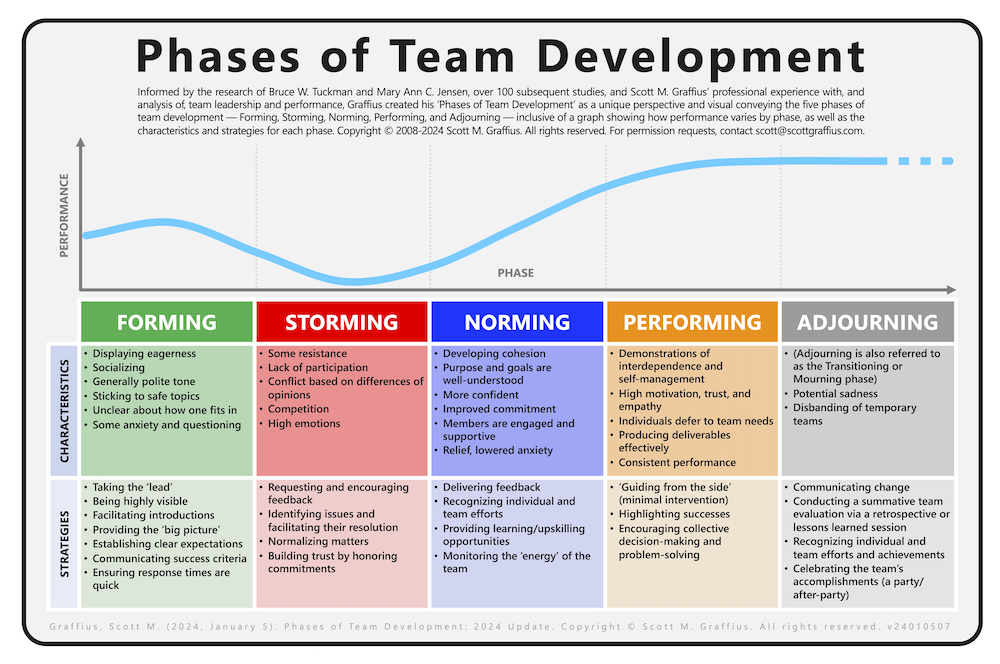
A PDF of this article is here.

Introduction
Informed by the research of Bruce W. Tuckman and Mary Ann C. Jensen, over 100 subsequent studies, and Scott M. Graffius’ first-hand professional experience with, and analysis of, team leadership and performance, Graffius created his ‘Phases of Team Development’ as a unique perspective and visual conveying the five phases of team development — Forming, Storming, Norming, Performing, and Adjourning — inclusive of a graph showing how performance varies by phase, as well as the characteristics and strategies for each phase.
Project Managers, Scrum Masters, Agile Coaches, DevOps Leads, and other leaders can apply the information to help handle challenges or issues experienced by teams. By doing so, they’ll advance the teams’ (and their own) happiness, productivity, and success.
Graffius initially developed his unique material in 2008, and he periodically refreshes it. This article (including the accompanying visual) provides the 2024 update to his ‘Phases of Team Development’ work.
Graffius’ work has “team development” in the title. Alternative terms — which may be interchangeable in the context of this article — include group development, group dynamics, team agility, team building, team coaching, team collaboration, teamcraft, team dynamics, team leadership, team optimization, team performance, team tradecraft, and teamwork.

Five Phases of Team Development
1. Forming
Characteristics of the Forming phase include displaying eagerness, socializing, generally polite tone, sticking to safe topics, unclear about how one fits in, and some anxiety and questioning.
Strategies for Forming include taking the ‘lead,’ being highly visible, facilitating introductions, providing the ‘big picture,’ establishing clear expectations, communicating success criteria, and ensuring response times are quick.
2. Storming
Traits of the Storming phase include some resistance, lack of participation, conflict based on differences of opinions, competition, and high emotions.
Strategies for Storming include requesting and encouraging feedback, identifying issues and facilitating their resolution, normalizing matters, and building trust by honoring commitments.
3. Norming
Features of the Norming phase include developing cohesion; purpose and goals are well-understood; more confident; improved commitment; members are engaged and supportive; and relief, lowered anxiety.
Strategies for Norming include delivering feedback, recognizing individual and team efforts, providing learning/upskilling opportunities, and monitoring the ‘energy’ of the team.
4. Performing
Characteristics of the Performing phase include demonstrations of interdependence and self-management; high motivation, trust, and empathy; individuals defer to team needs; producing deliverables effectively; and consistent performance.
Strategies for Performing include ‘guiding from the side’ (minimal intervention), highlighting successes, and encouraging collective decision-making and problem-solving.
5. Adjourning
Typical traits of the Adjourning phase (also referred to as the Transitioning or Mourning phase) include potential sadness, and disbanding of temporary teams.
Strategies for Adjourning include communicating change, conducting a summative team evaluation via a retrospective or lessons learned session, recognizing individual and team efforts and achievements, and celebrating the team's accomplishments (a party/after-party).

Conclusion
Project Managers, Scrum Masters, Agile Coaches, DevOps Leads, and other leaders can apply the information in this article and the accompanying visual to help handle challenges or issues experienced by teams. By doing so, they’ll advance the teams’ (and their own) happiness, productivity, and success.
This article provided a brief overview of the five phases of team development. Scott M. Graffius presents dynamic and engaging talks and workshops on this topic and more at conferences and other events (public and private/corporate) around the world. To learn more, visit here. For booking information, please complete a speaker engagement request form or email Scott M. Graffius.
If you're looking for additional information on this article (such as references/sources, citation details, or permission request information), read on.

Graffius’ Research is Widely Cited, Featured, and Used
Businesses, scientists, journalists, professional associations, government agencies, universities, and others around the world have featured and used prior — 2023 and earlier — editions of Scott M. Graffius’ ‘Phases of Team Development’ material. Here are a few examples:

References/Sources
Select (partial) bibliography:

How to Cite This Article
Graffius, Scott M. (2024, January 8). Scott M. Graffius’ Phases of Team Development: 2024 Update. Available at: https://scottgraffius.com/blog/files/teams-2024.html. DOI: 10.13140/RG.2.2.28629.40168.

Permission Request Information
To request permission to use the ‘Phases of Team Development’ visual shown at the top of this article or any other material from this publication, email Scott M. Graffius. If your request is approved, Graffius will give you an authorization/license and, if applicable, high-resolution files of the visual.




About Scott M. Graffius

Scott M. Graffius, PMP, SA, CSP-SM, CSP-PO, CSM, CSPO, SFE, ITIL, LSSGB is an agile project management practitioner, consultant, thinker, creator, multi-award-winning author, and international public speaker. Founder and CEO of Exceptional PPM and PMO Solutions™ and subsidiary Exceptional Agility™, he has generated over $1.9 billion for Global Fortune 500 businesses and other organizations he has served. Graffius and content from his books, talks, workshops, and more have been featured and used by Microsoft, Oracle, Broadcom, Cisco, Gartner, Project Management Institute, IEEE, National Academy of Sciences, United States Department of Energy, Yale University, Tufts University, and others. He delights audiences with dynamic and engaging talks and workshops on agile project management, AI, Tech leadership, video game development, strategic alignment, the science of high performance teams, and more. To date, he's presented sessions at 89 conferences and other events across 25 countries.
His full bio is available here.
Connect with Scott on:

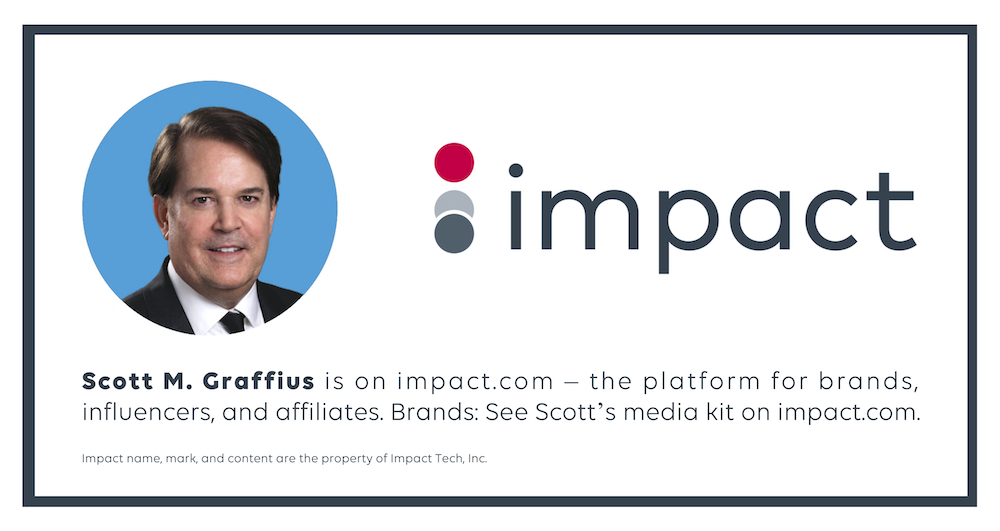

About Agile Scrum: Your Quick Start Guide with Step-by-Step Instructions

Shifting customer needs are common in today's marketplace. Businesses must be adaptive and responsive to change while delivering an exceptional customer experience to be competitive.
There are a variety of frameworks supporting the development of products and services, and most approaches fall into one of two broad categories: traditional or agile. Traditional practices such as waterfall engage sequential development, while agile involves iterative and incremental deliverables. Organizations are increasingly embracing agile to manage projects, and best meet their business needs of rapid response to change, fast delivery speed, and more.
With clear and easy to follow step-by-step instructions, Scott M. Graffius's award-winning Agile Scrum: Your Quick Start Guide with Step-by-Step Instructions helps the reader:
Hailed by Literary Titan as “the book highlights the versatility of Scrum beautifully.”
Winner of 17 first place awards.
Agile Scrum: Your Quick Start Guide with Step-by-Step Instructions is available in paperback and ebook/Kindle in the United States and around the world. Some links by country follow.

About Agile Transformation: A Brief Story of How an Entertainment Company Developed New Capabilities and Unlocked Business Agility to Thrive in an Era of Rapid Change

Thriving in today's marketplace frequently depends on making a transformation to become more agile. Those successful in the transition enjoy faster delivery speed and ROI, higher satisfaction, continuous improvement, and additional benefits.
Based on actual events, Agile Transformation: A Brief Story of How an Entertainment Company Developed New Capabilities and Unlocked Business Agility to Thrive in an Era of Rapid Change provides a quick (60-90 minute) read about a successful agile transformation at a multinational entertainment and media company, told from the author's perspective as an agile coach.
The award-winning book by Scott M. Graffius is available in paperback and ebook/Kindle in the United States and around the world. Some links by country follow.

The short link for this article is: https://bit.ly/teams-2024
ResearchGate
JPG | PNG
© Copyright 2024 Scott M. Graffius. All rights reserved. This material may not be published, broadcast, rewritten or redistributed without the express written permission of Scott M. Graffius.


A PDF of this article is here.

Introduction
Informed by the research of Bruce W. Tuckman and Mary Ann C. Jensen, over 100 subsequent studies, and Scott M. Graffius’ first-hand professional experience with, and analysis of, team leadership and performance, Graffius created his ‘Phases of Team Development’ as a unique perspective and visual conveying the five phases of team development — Forming, Storming, Norming, Performing, and Adjourning — inclusive of a graph showing how performance varies by phase, as well as the characteristics and strategies for each phase.
Project Managers, Scrum Masters, Agile Coaches, DevOps Leads, and other leaders can apply the information to help handle challenges or issues experienced by teams. By doing so, they’ll advance the teams’ (and their own) happiness, productivity, and success.
Graffius initially developed his unique material in 2008, and he periodically refreshes it. This article (including the accompanying visual) provides the 2024 update to his ‘Phases of Team Development’ work.
Graffius’ work has “team development” in the title. Alternative terms — which may be interchangeable in the context of this article — include group development, group dynamics, team agility, team building, team coaching, team collaboration, teamcraft, team dynamics, team leadership, team optimization, team performance, team tradecraft, and teamwork.

Five Phases of Team Development
1. Forming
Characteristics of the Forming phase include displaying eagerness, socializing, generally polite tone, sticking to safe topics, unclear about how one fits in, and some anxiety and questioning.
Strategies for Forming include taking the ‘lead,’ being highly visible, facilitating introductions, providing the ‘big picture,’ establishing clear expectations, communicating success criteria, and ensuring response times are quick.
2. Storming
Traits of the Storming phase include some resistance, lack of participation, conflict based on differences of opinions, competition, and high emotions.
Strategies for Storming include requesting and encouraging feedback, identifying issues and facilitating their resolution, normalizing matters, and building trust by honoring commitments.
3. Norming
Features of the Norming phase include developing cohesion; purpose and goals are well-understood; more confident; improved commitment; members are engaged and supportive; and relief, lowered anxiety.
Strategies for Norming include delivering feedback, recognizing individual and team efforts, providing learning/upskilling opportunities, and monitoring the ‘energy’ of the team.
4. Performing
Characteristics of the Performing phase include demonstrations of interdependence and self-management; high motivation, trust, and empathy; individuals defer to team needs; producing deliverables effectively; and consistent performance.
Strategies for Performing include ‘guiding from the side’ (minimal intervention), highlighting successes, and encouraging collective decision-making and problem-solving.
5. Adjourning
Typical traits of the Adjourning phase (also referred to as the Transitioning or Mourning phase) include potential sadness, and disbanding of temporary teams.
Strategies for Adjourning include communicating change, conducting a summative team evaluation via a retrospective or lessons learned session, recognizing individual and team efforts and achievements, and celebrating the team's accomplishments (a party/after-party).

Conclusion
Project Managers, Scrum Masters, Agile Coaches, DevOps Leads, and other leaders can apply the information in this article and the accompanying visual to help handle challenges or issues experienced by teams. By doing so, they’ll advance the teams’ (and their own) happiness, productivity, and success.
This article provided a brief overview of the five phases of team development. Scott M. Graffius presents dynamic and engaging talks and workshops on this topic and more at conferences and other events (public and private/corporate) around the world. To learn more, visit here. For booking information, please complete a speaker engagement request form or email Scott M. Graffius.
If you're looking for additional information on this article (such as references/sources, citation details, or permission request information), read on.

Graffius’ Research is Widely Cited, Featured, and Used
Businesses, scientists, journalists, professional associations, government agencies, universities, and others around the world have featured and used prior — 2023 and earlier — editions of Scott M. Graffius’ ‘Phases of Team Development’ material. Here are a few examples:
- Academic Cooperation Association
- Adobe
- American Management Association
- Amsterdam Public Health Research Institute
- Bayer
- Boston University
- CodeMonk
- Dagen
- Deimos Aerospace
- Erste Bank
- FSU College of Medicine
- Hasso Plattner Institute (Hasso-Plattner-Institut für Digital Engineering GmbH)
- IEEE
- Innovify
- Life Sciences Trainers & Educators Network (LTEN)
- London South Bank University
- New Zealand Government
- Prima Resource
- Singapore University of Social Sciences
- Technical University of Munich
- Torrens University Australia
- UK Sports Institute
- University of Galway Ireland
- University of Graz Austria
- University of Waterloo
- US National Park Service
- Virginia Tech
- Warsaw University of Technology
- Yale University
- Zittau/Gorlitz University of Applied Sciences
- And many more

References/Sources
Select (partial) bibliography:
- Activision Blizzard (2022, September 9). Tackling the Talent Shortage: Identifying the Skills Critical for Game Development. Available at: https://www.activisionblizzard.com/content/atvi/activisionblizzard/ab-touchui/ab/web/en/newsroom/2022/09/tackling-the-talent-shortage.html.
- Alfateh, Maryam Ali Abu; Messaadia, Mourad; and Ali, Mazen (2023, September). Exploring the Dynamics of Team Formation in Human-Artificial Intelligence Collaboration. In 2023 International Conference on Decision Aid Sciences and Applications (DASA), pp. 384-388, DOI: 10.1109/DASA59624.2023.10286788.
- Alford, J. (2019, April 11). Our Co-Production Journey: From Sandpits to Bird Boxes. London, United Kingdom: Imperial College London.
- Ali, A. J., Fuenzalida, J., Gómez, M., & Williams, M. J. (2021, June). Four Lenses on People Management in the Public Sector: An Evidence Review and Synthesis. Oxford Review of Economic Policy, 37 (2): 335-366.
- Amsterdam Public Health Research Institute (2021). APH Quality Handbook. Amsterdam: Amsterdam Public Health Research Institute.
- Bandai Namco (n.d.). Teamwork Makes the Dream Work. Available at: https://bandainamcomobile.com/news/power-up-your-teamwork-how-bandai-namco-mobile-builds-stronger-teams.
- Bellet, C., De Neve, J., & Ward, G. (2019 October 14). Does Employee Happiness Have an Impact on Productivity? Saïd Business School WP 2019-13. Oxford, UK: Oxford University.
- Bennett, M., Gadlin, H., & Marchand, C. (2018). Collaboration Team Science: Field Guide. Rockville, MD: National Institutes of Health.
- Berlin School of Business and Innovation (2022, September 22). How Do Technical Abilities Combined with Leadership Skills Fuel Career Growth? Available at: https://www.berlinsbi.com/blog/career-advice/how-do-technical-abilities-combined-with-leadership-skills-fuel-career-growth.
- Brief, A. P. & Weiss, H. M. (2022, February). Organizational Behavior: Affect in the Workplace. Annual Review of Psychology, 53 (1): 279-307.
- Cisco (2019). Next-Generation IT Talent Strategies: How CIOs Can Close the Skills Gap and Drive True Business Transformation. Available at: https://www.cisco.com/c/dam/global/en_uk/solutions/executive-perspectives/pdf/ITTalent.pdf.
- Couture, N. (2016, October 27). A Note About Teams. CIO. Boston, MA: International Data Group (IDG).
- Daly, L. (2002). Identify Your Project Management Team’s Level of Development and Facilitate It to Success. Paper presented at Project Management Institute Annual Seminars and Symposium, San Antonio, TX. Newtown Square, PA: Project Management Institute.
- Dechurch, Leslie; & Mesmer-Magnus, Jessica. (2010). The Cognitive Underpinnings of Effective Teamwork: A Meta-Analysis. The Journal of Applied Psychology, 95: 32-53.
- Defense Advanced Research Projects Agency (DARPA) (2023, February 23). Episode 65: A Sprint to Tomorrow, Powered by Teamwork [Podcast]. Available at: https://www.darpa.mil/news-events/2023-02-23a.
- Deloitte (2017). Digital Era Technology Operating Models, Volume 2. New York, NY: Deloitte Touche Tohmatsu Limited.
- DevOps Institute (2021). 2021 Upskilling Enterprise DevOps Skills Report. Boca Raton, FL: DevOps Institute.
- Dickinson, A.; & Stoneman, K. (1989). Individual Performance as a Function of Group Contingencies and Group Size. Journal of Organizational Behavior Management, 10: 131-150.
- Dolev, Niva, & Itzkovich, Yariv (2020). In the AI Era, Soft Skills are the New Hard Skills. In: Artificial Intelligence and Its Impact on Business, pp. 55-77. Charlotte, NC: Information Age Publishing.
- Dzombak, Rachel, & Palat, Jay (2021, August 30). 5 Ways to Start Growing an AI-Ready Workforce. Pittsburgh, PA: Software Engineering Institute, Carnegie Mellon University.
- Elliott, Joshua (n.d.). Artificial Social Intelligence for Successful Teams (ASIST). Arlington, VA: Defense Advanced Research Projects Agency (DARPA).
- Exceptional Agility (2023, January 1). Making Teams More Agile: Strategies and Benefits. Available at: https://exceptionalagility.com/blog/files/teams.html.
- Finkelstein, S. (2017, October 29). Why Companies Should Hire Teams, Not Individuals. The Wall Street Journal. New York, NY: The Wall Street Journal.
- Forbes (2018, April 23). How to Fast-Track Any Team to Success. Forbes. New York, NY: Forbes.
- Forbes (2012, October 27). How the iPad Mini is Defining Tim Cook’s Apple. Forbes. New York, NY: Forbes.
- Gartner (2020, December 15). How to Staff Your AI Team. Available at: https://www.gartner.com/smarterwithgartner/how-to-staff-your-ai-team.
- Glover, P. (2012, March 13). Team Conflict: Why It’s a Good Thing. Fast Company. New York, NY: Mansueto Ventures.
- Gorman, Austin (2023, April 27). How to Strengthen Your Soft Skills for AI and the Future of Work. Fast Company. Available at: https://www.fastcompany.com/90887540/how-to-strengthen-your-soft-skills-for-ai-and-the-future-of-work.
- Graffius, Scott M. (2023, October 13). The Science of High-Performance Game Development Teams [Presentation]. Talk delivered at the W Love Games International Video Game Development Conference 2023 - Helsinki, Finland. Digital Object Identifier (DOI): 10.13140/RG.2.2.28602.16326. DOI link: https://dx.doi.org/10.13140/RG.2.2.28602.16326.
- Graffius, Scott M. (2023, July 15). Successful Video Game Development Teams Leverage an Extensive Range of Hard Skills and Soft Skills. Available at: https://scottgraffius.com/blog/files/gamedev.html. DOI: 10.13140/RG.2.2.31205.17124.
- Graffius, Scott M. (2023, April 26). The Science of High-Performance Teams [Presentation]. Talk delivered at the DevOps Institute’s SKILup Day 2023 Conference. Digital Object Identifier (DOI): 10.13140/RG.2.2.15888.28169. DOI link: https://dx.doi.org/10.13140/RG.2.2.15888.28169.
- Graffius, Scott M. (2023, January 9). Use the Phases of Team Development (Based on Bruce W. Tuckman's Model of Forming, Storming, Norming, Performing, and Adjourning) to Help Teams Grow and Advance: 2023 Update. Available at: https://scottgraffius.com. Digital Object Identifier (DOI): 10.13140/RG.2.2.10720.35846. DOI link: https://dx.doi.org/10.13140/RG.2.2.10720.35846.
- Graffius, Scott M. (2023, June 29). What Successful AI Teams Have in Common [Presentation]. Talk delivered at Conf42 Quantum Computing 2023 Conference. Digital Object Identifier (DOI): 10.13140/RG.2.2.29382.45120. DOI link: https://dx.doi.org/10.13140/RG.2.2.29382.45120.
- Graffius, Scott M. (2023, May 1). Fueling the Development of Innovative and Life-Changing AI Solutions [Presentation]. Talk delivered to an audience of Technology professionals (including Data Scientists, Machine Learning Engineers, Data Engineers, AI Researchers, Project Managers, Business Analysts, UX Designers, Software Developers, Cloud Architects, Data Privacy and Security Specialists, and others involved or interested in AI) at a private event in Mountain View, California, United States. Digital Object Identifier (DOI): 10.13140/RG.2.2.27956.73601. DOI link: https://dx.doi.org/10.13140/RG.2.2.27956.73601.
- Graffius, Scott M. (2022, February 4). Team Development Tradecraft: A Source of Competitive Advantage [Workshop]. Session at private event in Adelaide, Australia. DOI: 10.13140/RG.2.2.14092.80002.
- Graffius, Scott M. (2022, May 13). Want Happier and More Productive DevOps Teams? [Presentation]. Talk delivered at DevOpsDays Geneva, Switzerland 2022 Conference. Digital Object Identifier (DOI): 10.13140/RG.2.2.22252.85127. DOI link: https://dx.doi.org/10.13140/RG.2.2.22252.85127.
- Graffius, Scott M. (2021, February 20). But First, the Team! [Presentation]. Talk delivered at the Brno, Czech Republic DevConf.CZ 2021 Conference. Digital Object Identifier (DOI): 10.13140/RG.2.2.29016.72964. DOI link: https://dx.doi.org/10.13140/RG.2.2.29016.72964.
- Graffius, Scott M. (2021, June 21). DevOps and Team Leadership [Workshop]. Session at private event in Las Vegas, NV. DOI: 10.13140/RG.2.2.15380.22401.
- Graffius, Scott M. (2021, May 13). But First, the Team! [Presentation]. Lecture delivered at DevOps Pro Europe 2021 Conference. Based and simulcast live from Vilnius, Lithuania. DOI: 10.13140/RG.2.2.30524.36481.
- Graffius, Scott M. (2021, November 10). An Error Was Introduced Into the Seventh Edition of 'A Guide to the Project Management Body of Knowledge (PMBOK).’ Los Angeles, CA: Scott M. Graffius.
- Graffius, Scott M. (2021, November 8). Bruce Tuckman’s Model (Forming, Storming, Norming, Performing, and Adjourning) is Highly Relevant and Beneficial, But It Doesn’t Please Everyone. Los Angeles, CA: Scott M. Graffius.
- Graffius, Scott M. (2021, October 5). Navigate the Phases of Team Development with Speed and Agility for Happier and More Productive Teams [Presentation]. Talk delivered at the Institute of Electrical and Electronics Engineers IEEE Day 2021 Conference. Digital Object Identifier (DOI): 10.13140/RG.2.2.20055.19365. DOI link: https://dx.doi.org/10.13140/RG.2.2.20055.19365.
- Graffius, Scott M. (2021). Phases of Team Development. Los Angeles, CA: Scott M. Graffius. Digital Object Identifier (DOI): 10.13140/RG.2.2.22040.42246.
- Graffius, Scott M. (2018, October 18). Agile Scrum Helps Innovators, Disruptors, and Entrepreneurs Develop and Deliver Products at Astounding Speed Which Drives Competitive Advantage [Presentation]. Talk delivered at Techstars Startup Week Conference. DOI: 10.13140/RG.2.2.25009.12647.
- Himmelstein, D. (2018, January 26). Team Cycles and Culture Development. San Jose, CA: Acer, Inc.
- Humphrey, W. S., Chick, T. A., Nichols, W., and Pomeroy-Huff, M. (2010). Software Engineering Institute’s Team Software Process Body of Knowledge. Pittsburgh, PA: Carnegie Mellon University.
- Infinity Ward (n.d.). Infinity Ward. Available at: https://www.infinityward.com.
- International Game Developers Association (IGDA) (n.d.). IGDA Foundation. Available at: https://igda.org/igda-foundation/.
- Jovanovic, M., Mesquida, A., Radaković, N., & Mas, A. (2016). Agile Retrospective Games for Different Team Development Phases. Journal of Universal Computer Science, 22: 1489-1508.
- KPMG (2017). The Digital Fund, Season 2. Amstelveen, Netherlands: KPMG International.
- Leswing, Kif (2023, June 5). Apple’s Practical Approach to A.I.: No Bragging, Just Features. CNBC. Available at: https://www.cnbc.com/2023/06/05/apple-practical-approach-to-ai-no-bragging-just-features.html.
- Life Sciences Trainers and Educators Network (LTEN) (2022). Leveraging a Cross-Functional Training Task Force to Create Training that Doesn’t Suck. LTEN 2022 Conference.
- Madden, D. (2019, May 19). The Four Stages of Building a Great Team – and the One Where Things Usually Go Wrong. Inc. Magazine. New York, NY: Inc. Magazine.
- Makar, A. (2011, July 13). Lessons Learned in Norming and Performing Team Development Phases. Louisville, KY: Tech Republic.
- Martinuzzi, B. (2012, June 8). Six Tips Guaranteed to Reduce Workplace Frustrations. New York, NY: American Express Company.
- Massachusetts Institute of Technology (MIT) (2021, January). Cognitive Science as a New People Science for the Future of Work. Available at: https://workofthefuture.mit.edu/wp-content/uploads/2021/01/2021-Research-Brief-Polli-Kassir-Dolphin-Baker-Gabrieli.pdf.
- Microsoft (2019, June 15). Is the Latest Technology the Key to Your Team’s Success, or is There Something Else? Microsoft Developer Support. Accessed at: https://devblogs.microsoft.com/premier-developer/is-the-latest-technology-the-key-to-your-teams-success-or-is-there-something-else. Redmond, WA: Microsoft.
- Mocko, G., & Linnerud, B. (2016). Measuring the Effects of Goal Alignment on Innovative Engineering Design Projects. International Journal of Engineering Education, 32: 55-63.
- Negrón, A.P.P., Carranza, D.B., Muñoz, M. (2023). Video Game Development Process for Soft Skills Analysis. In: Mejia, J., Muñoz, M., Rocha, Á., Hernández-Nava, V. (eds), New Perspectives in Software Engineering. Proceedings of the 11th International Conference on Software Process Improvement (CIMPS 2022). Lecture Notes in Networks and Systems, vol. 576. New York, NY: Springer.
- Riggs, A. (2020, October 15). Why I Start All My Video Meetings with Collaborative Games (Spoiler: It’s Not Boredom). Amsterdam, the Netherlands: The Next Web (TNW).
- Romanelli, M. (2019, September 11). Teamwork Accelerated. PM Times. Newmarket, Ontario, Canada: Macgregor Communications.
- Rowley, D., & Lange, M. (2007). Forming to Performing: The Evolution of an Agile Team. IEEE Computer Society Proceedings. Agile 2007, 1: 408-414.
- Sakpal, M. (2020, March 3. Learn How to Debunk These Five Restructuring Myths. Stamford, CT: Gartner, Inc.
- Sazali, A. R. B.; Khamarudin, F. B.; & Abdul Alahdad, S. N. B. (2022). Maximising the Zone of Proximal Development Benefits in Group Online Learning. International Journal of Academic Research in Business and Social Sciences, 12 (6): 1476-1496.
- Scaled Agile, Inc. (2023, March 14). Working Successfully in Agile with Remote Team Members. Available at: https://scaledagileframework.com/working-successfully-in-agile-with-remote-team-members/.
- Scrum Alliance (2020). Learning Objectives Examples. Denver, CO: Scrum Alliance.
- Stanford University (2019, September). Gathering Strength, Gathering Storms. Stanford, CA: Stanford University.
- Steiner, Ivan D. (1972). Group Process and Productivity. New York, New York: Academic Press.
- Stern, S. (2018, September 26). Is Your Team Working the Rory Underwood Way? Financial Times. London, United Kingdom: The Financial Times, a Nikkei Company.
- Tamiru, Natasha (2023, June). Team Dynamics: Five Keys to Building Effective Teams. Google. Available at: https://www.thinkwithgoogle.com/intl/en-emea/consumer-insights/consumer-trends/five-dynamics-effective-team.
- Tannenbaum, Robert, & Schmidt, Warren H. (1958). How to Choose a Leadership Pattern. Harvard Business Review, 36: 95- 101.
- Telford, R. (2013, June 4). This is Where It Gets Interesting. Armonk, NY: International Business Machines (IBM) Corporation.
- Thier, Jane (2021, December 8). 'Form, Storm, Norm, Perform’: Twitter’s New CEO Faces a Critical Few Months as He Seeks to Differentiate Himself from Jack Dorsey, Leadership Experts Say. Fortune. Available at: https://fortune.com/2021/12/08/form-storm-norm-perform-twitters-new-ceo-faces-a-critical-few-months-as-he-seeks-to-differentiate-himself-from-jack-dorsey-leadership-experts-say/.
- Tuckman, B. W. (1965). Developmental Sequence in Small Groups. Psychological Bulletin, 63: 384-399.
- Tuckman, B. W., & Jensen, M. A. C. (1977). Stages of Small-Group Development Revisited. Group and Organizational Studies, 2 (4): 419-427.
- United States Army (2015). Innovative Learning: A Key to National Security. Washington, DC: United States Army.
- United States National Park Service (NPS) (2022, Spring). NPS Aviation Safety.
- Wheelan, S. A. (2009). Group Size, Group Development, and Group Productivity. Small-Group Research, 40 (2): 247-262.

How to Cite This Article
Graffius, Scott M. (2024, January 8). Scott M. Graffius’ Phases of Team Development: 2024 Update. Available at: https://scottgraffius.com/blog/files/teams-2024.html. DOI: 10.13140/RG.2.2.28629.40168.

Permission Request Information
To request permission to use the ‘Phases of Team Development’ visual shown at the top of this article or any other material from this publication, email Scott M. Graffius. If your request is approved, Graffius will give you an authorization/license and, if applicable, high-resolution files of the visual.



About Scott M. Graffius

Scott M. Graffius, PMP, SA, CSP-SM, CSP-PO, CSM, CSPO, SFE, ITIL, LSSGB is an agile project management practitioner, consultant, thinker, creator, multi-award-winning author, and international public speaker. Founder and CEO of Exceptional PPM and PMO Solutions™ and subsidiary Exceptional Agility™, he has generated over $1.9 billion for Global Fortune 500 businesses and other organizations he has served. Graffius and content from his books, talks, workshops, and more have been featured and used by Microsoft, Oracle, Broadcom, Cisco, Gartner, Project Management Institute, IEEE, National Academy of Sciences, United States Department of Energy, Yale University, Tufts University, and others. He delights audiences with dynamic and engaging talks and workshops on agile project management, AI, Tech leadership, video game development, strategic alignment, the science of high performance teams, and more. To date, he's presented sessions at 89 conferences and other events across 25 countries.
His full bio is available here.
Connect with Scott on:



About Agile Scrum: Your Quick Start Guide with Step-by-Step Instructions

Shifting customer needs are common in today's marketplace. Businesses must be adaptive and responsive to change while delivering an exceptional customer experience to be competitive.
There are a variety of frameworks supporting the development of products and services, and most approaches fall into one of two broad categories: traditional or agile. Traditional practices such as waterfall engage sequential development, while agile involves iterative and incremental deliverables. Organizations are increasingly embracing agile to manage projects, and best meet their business needs of rapid response to change, fast delivery speed, and more.
With clear and easy to follow step-by-step instructions, Scott M. Graffius's award-winning Agile Scrum: Your Quick Start Guide with Step-by-Step Instructions helps the reader:
- Implement and use the most popular agile framework―Scrum;
- Deliver products in short cycles with rapid adaptation to change, fast time-to-market, and continuous improvement; and
- Support innovation and drive competitive advantage.
Hailed by Literary Titan as “the book highlights the versatility of Scrum beautifully.”
Winner of 17 first place awards.
Agile Scrum: Your Quick Start Guide with Step-by-Step Instructions is available in paperback and ebook/Kindle in the United States and around the world. Some links by country follow.
- 🇧🇷 Brazil
- 🇨🇦 Canada
- 🇨🇿 Czech Republic
- 🇩🇰 Denmark
- 🇫🇮 Finland
- 🇫🇷 France
- 🇩🇪 Germany
- 🇬🇷 Greece
- 🇭🇺 Hungary
- 🇮🇳 India
- 🇮🇪 Ireland
- 🇮🇱 Israel
- 🇮🇹 Italy
- 🇯🇵 Japan
- 🇱🇺 Luxembourg
- 🇲🇽 Mexico
- 🇳🇱 Netherlands
- 🇳🇿 New Zealand
- 🇳🇴 Norway
- 🇪🇸 Spain
- 🇸🇪 Sweden
- 🇨🇭 Switzerland
- 🇦🇪 UAE
- 🇬🇧 United Kingdom
- 🇺🇸 United States

About Agile Transformation: A Brief Story of How an Entertainment Company Developed New Capabilities and Unlocked Business Agility to Thrive in an Era of Rapid Change

Thriving in today's marketplace frequently depends on making a transformation to become more agile. Those successful in the transition enjoy faster delivery speed and ROI, higher satisfaction, continuous improvement, and additional benefits.
Based on actual events, Agile Transformation: A Brief Story of How an Entertainment Company Developed New Capabilities and Unlocked Business Agility to Thrive in an Era of Rapid Change provides a quick (60-90 minute) read about a successful agile transformation at a multinational entertainment and media company, told from the author's perspective as an agile coach.
The award-winning book by Scott M. Graffius is available in paperback and ebook/Kindle in the United States and around the world. Some links by country follow.
- 🇦🇺 Australia
- 🇦🇹 Austria
- 🇧🇷 Brazil
- 🇨🇦 Canada
- 🇨🇿 Czech Republic
- 🇩🇰 Denmark
- 🇫🇮 Finland
- 🇫🇷 France
- 🇩🇪 Germany
- 🇬🇷 Greece
- 🇮🇳 India
- 🇮🇪 Ireland
- 🇯🇵 Japan
- 🇱🇺 Luxembourg
- 🇲🇽 Mexico
- 🇳🇱 Netherlands
- 🇳🇿 New Zealand
- 🇪🇸 Spain
- 🇸🇪 Sweden
- 🇨🇭 Switzerland
- 🇦🇪 United Arab Emirates
- 🇬🇧 United Kingdom
- 🇺🇸 United States

The short link for this article is: https://bit.ly/teams-2024
ResearchGate
JPG | PNG
© Copyright 2024 Scott M. Graffius. All rights reserved. This material may not be published, broadcast, rewritten or redistributed without the express written permission of Scott M. Graffius.

Scott M. Graffius’ ‘Phases of Team Development’ Featured by The Manufacturers’ Alliance
05 February 2024
BY SCOTT M. GRAFFIUS | ScottGraffius.com
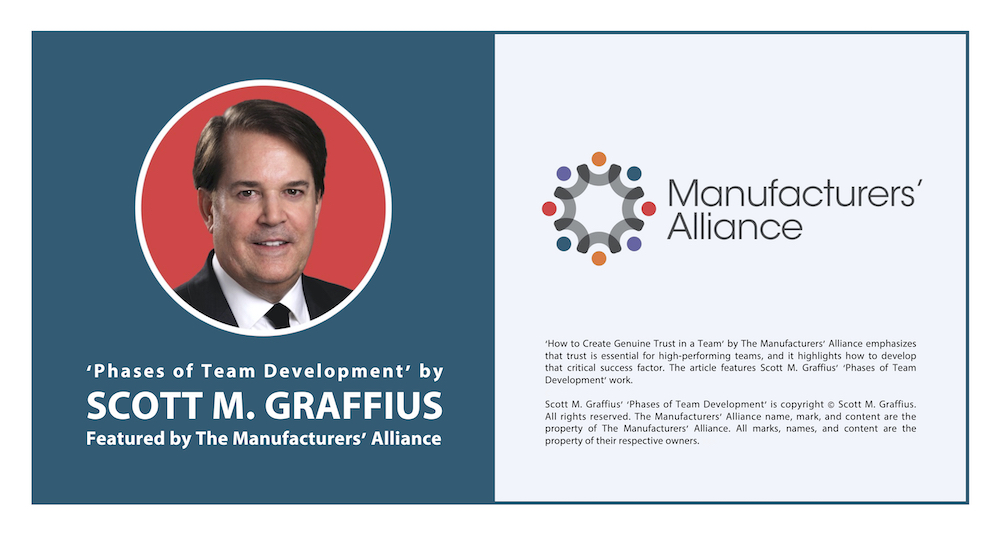
‘How to Create Genuine Trust in a Team’ by The Manufacturers’ Alliance emphasizes that trust is essential for high-performing teams, and it highlights how to develop that critical success factor. The article features Scott M. Graffius' ‘Phases of Team Development’ work.
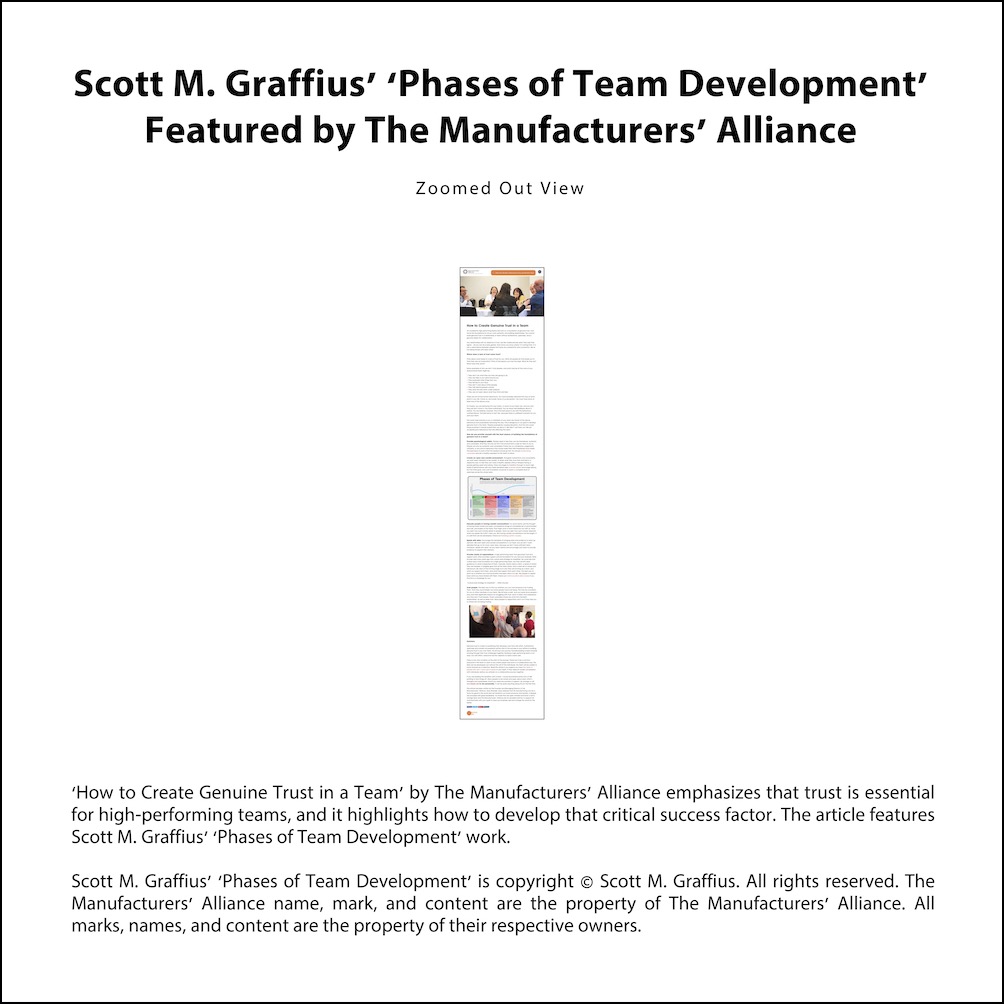
A zoomed out image is shown above.
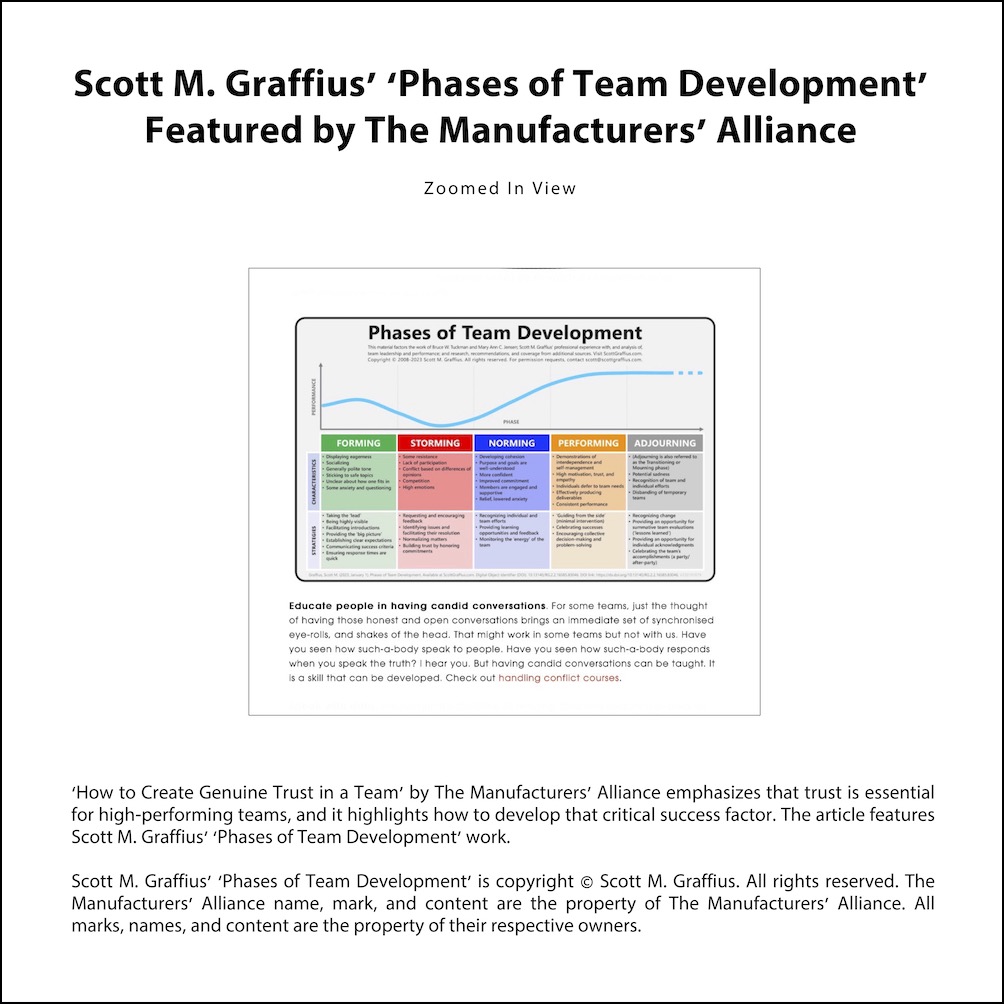
And a zoomed in visual is above.
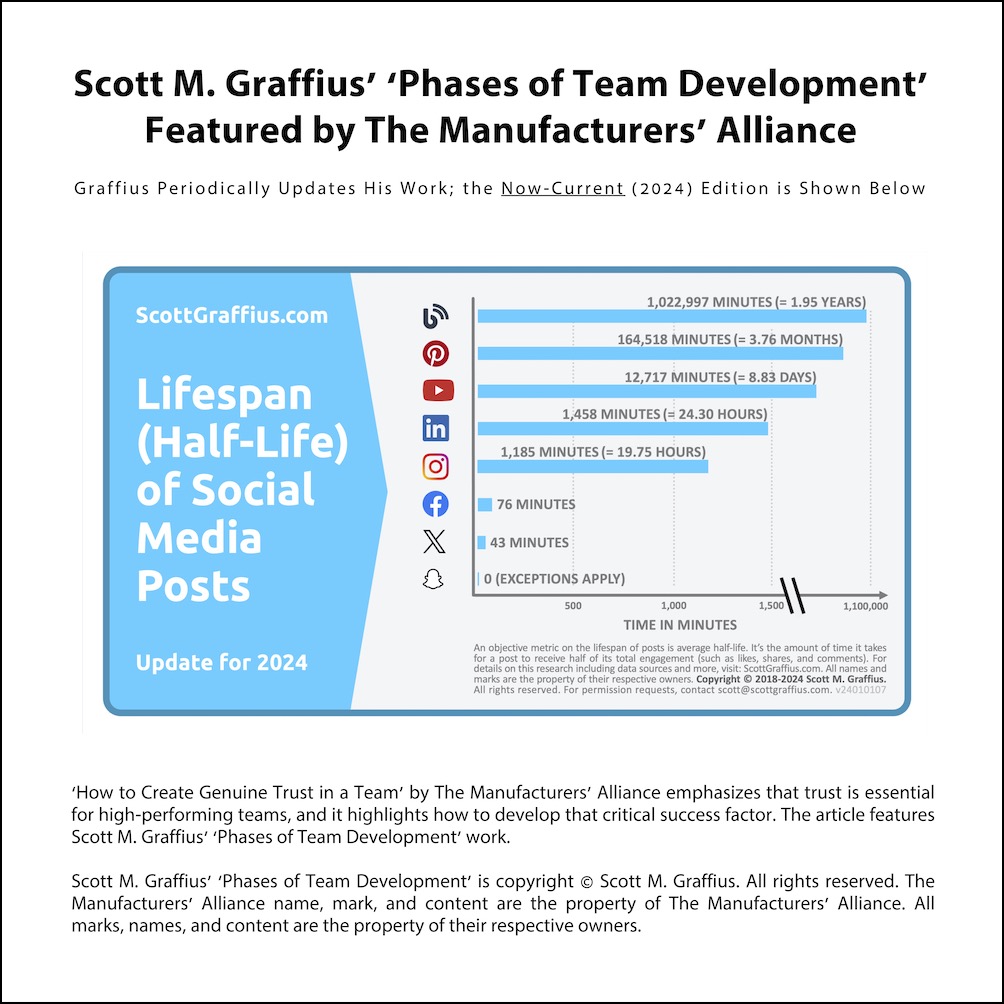
Graffius periodically updates his work. The most current (2024) edition of his 'Phases of Team Development' visual is shown above. Select here for details.
About The Manufacturers’ Alliance
The Manufacturers’ Alliance is a purpose and values-led organization that inspires manufacturing leaders to break through the boundaries of possibility. Its services are aligned with the following four distinct pillars.
Visit https://www.manufacturersalliance.co.uk to learn more.




About Scott M. Graffius

Scott M. Graffius, PMP, SA, CSP-SM, CSP-PO, CSM, CSPO, SFE, ITIL, LSSGB is an agile project management practitioner, consultant, thinker, creator, multi-award-winning author, and international public speaker. Founder and CEO of Exceptional PPM and PMO Solutions™ and subsidiary Exceptional Agility™, he has generated over $1.9 billion for Global Fortune 500 businesses and other organizations he has served. Graffius and content from his books, talks, workshops, and more have been featured and used by Microsoft, Oracle, Broadcom, Cisco, Gartner, Project Management Institute, IEEE, National Academy of Sciences, United States Department of Energy, Yale University, Tufts University, and others. He delights audiences with dynamic and engaging talks and workshops on agile project management, AI, Tech leadership, video game development, strategic alignment, the science of high performance teams, and more. To date, he's presented sessions at 89 conferences and other events across 25 countries.
His full bio is available here.
Connect with Scott on:
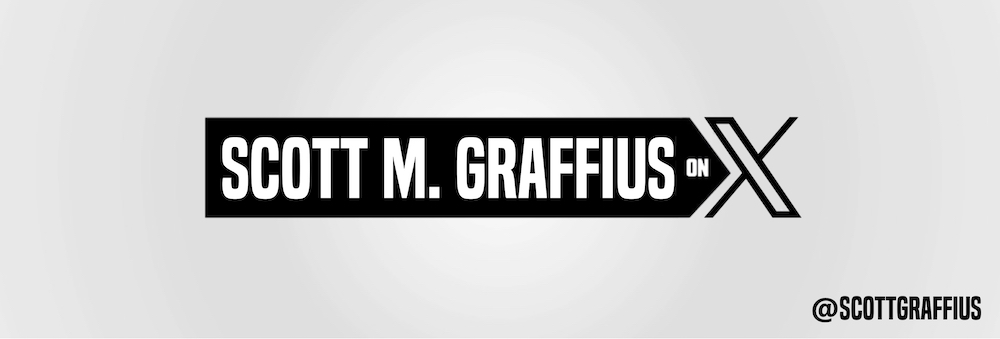


About Agile Scrum: Your Quick Start Guide with Step-by-Step Instructions

Shifting customer needs are common in today's marketplace. Businesses must be adaptive and responsive to change while delivering an exceptional customer experience to be competitive.
There are a variety of frameworks supporting the development of products and services, and most approaches fall into one of two broad categories: traditional or agile. Traditional practices such as waterfall engage sequential development, while agile involves iterative and incremental deliverables. Organizations are increasingly embracing agile to manage projects, and best meet their business needs of rapid response to change, fast delivery speed, and more.
With clear and easy to follow step-by-step instructions, Scott M. Graffius's award-winning Agile Scrum: Your Quick Start Guide with Step-by-Step Instructions helps the reader:
Hailed by Literary Titan as “the book highlights the versatility of Scrum beautifully.”
Winner of 17 first place awards.
Agile Scrum: Your Quick Start Guide with Step-by-Step Instructions is available in paperback and ebook/Kindle in the United States and around the world. Some links by country follow.

About Agile Transformation: A Brief Story of How an Entertainment Company Developed New Capabilities and Unlocked Business Agility to Thrive in an Era of Rapid Change

Thriving in today's marketplace frequently depends on making a transformation to become more agile. Those successful in the transition enjoy faster delivery speed and ROI, higher satisfaction, continuous improvement, and additional benefits.
Based on actual events, Agile Transformation: A Brief Story of How an Entertainment Company Developed New Capabilities and Unlocked Business Agility to Thrive in an Era of Rapid Change provides a quick (60-90 minute) read about a successful agile transformation at a multinational entertainment and media company, told from the author's perspective as an agile coach.
The award-winning book by Scott M. Graffius is available in paperback and ebook/Kindle in the United States and around the world. Some links by country follow.

The short link for this article is: https://bit.ly/trust-sg
© Copyright 2024 Scott M. Graffius. All rights reserved. This material may not be published, broadcast, rewritten or redistributed without the express written permission of Scott M. Graffius.


‘How to Create Genuine Trust in a Team’ by The Manufacturers’ Alliance emphasizes that trust is essential for high-performing teams, and it highlights how to develop that critical success factor. The article features Scott M. Graffius' ‘Phases of Team Development’ work.

A zoomed out image is shown above.

And a zoomed in visual is above.

Graffius periodically updates his work. The most current (2024) edition of his 'Phases of Team Development' visual is shown above. Select here for details.
About The Manufacturers’ Alliance
The Manufacturers’ Alliance is a purpose and values-led organization that inspires manufacturing leaders to break through the boundaries of possibility. Its services are aligned with the following four distinct pillars.
- Thought Leadership Events: Its online and in-person events help ambitious manufacturing owners and leaders understand what it takes to run a great business, providing inspiration with a constant stream of new ideas.
- Peer Groups: It fosters meeting and networking with peers from the manufacturing sector.
- The Academy: This resource supports the development of leadership and management skills needed for the future of manufacturing.
- Hands-on Support: It offers help from a team of experienced business leaders with wide-ranging skills gained from decades of experience in the manufacturing sector.
Visit https://www.manufacturersalliance.co.uk to learn more.




About Scott M. Graffius

Scott M. Graffius, PMP, SA, CSP-SM, CSP-PO, CSM, CSPO, SFE, ITIL, LSSGB is an agile project management practitioner, consultant, thinker, creator, multi-award-winning author, and international public speaker. Founder and CEO of Exceptional PPM and PMO Solutions™ and subsidiary Exceptional Agility™, he has generated over $1.9 billion for Global Fortune 500 businesses and other organizations he has served. Graffius and content from his books, talks, workshops, and more have been featured and used by Microsoft, Oracle, Broadcom, Cisco, Gartner, Project Management Institute, IEEE, National Academy of Sciences, United States Department of Energy, Yale University, Tufts University, and others. He delights audiences with dynamic and engaging talks and workshops on agile project management, AI, Tech leadership, video game development, strategic alignment, the science of high performance teams, and more. To date, he's presented sessions at 89 conferences and other events across 25 countries.
His full bio is available here.
Connect with Scott on:



About Agile Scrum: Your Quick Start Guide with Step-by-Step Instructions

Shifting customer needs are common in today's marketplace. Businesses must be adaptive and responsive to change while delivering an exceptional customer experience to be competitive.
There are a variety of frameworks supporting the development of products and services, and most approaches fall into one of two broad categories: traditional or agile. Traditional practices such as waterfall engage sequential development, while agile involves iterative and incremental deliverables. Organizations are increasingly embracing agile to manage projects, and best meet their business needs of rapid response to change, fast delivery speed, and more.
With clear and easy to follow step-by-step instructions, Scott M. Graffius's award-winning Agile Scrum: Your Quick Start Guide with Step-by-Step Instructions helps the reader:
- Implement and use the most popular agile framework―Scrum;
- Deliver products in short cycles with rapid adaptation to change, fast time-to-market, and continuous improvement; and
- Support innovation and drive competitive advantage.
Hailed by Literary Titan as “the book highlights the versatility of Scrum beautifully.”
Winner of 17 first place awards.
Agile Scrum: Your Quick Start Guide with Step-by-Step Instructions is available in paperback and ebook/Kindle in the United States and around the world. Some links by country follow.
- 🇧🇷 Brazil
- 🇨🇦 Canada
- 🇨🇿 Czech Republic
- 🇩🇰 Denmark
- 🇫🇮 Finland
- 🇫🇷 France
- 🇩🇪 Germany
- 🇬🇷 Greece
- 🇭🇺 Hungary
- 🇮🇳 India
- 🇮🇪 Ireland
- 🇮🇱 Israel
- 🇮🇹 Italy
- 🇯🇵 Japan
- 🇱🇺 Luxembourg
- 🇲🇽 Mexico
- 🇳🇱 Netherlands
- 🇳🇿 New Zealand
- 🇳🇴 Norway
- 🇪🇸 Spain
- 🇸🇪 Sweden
- 🇨🇭 Switzerland
- 🇦🇪 UAE
- 🇬🇧 United Kingdom
- 🇺🇸 United States

About Agile Transformation: A Brief Story of How an Entertainment Company Developed New Capabilities and Unlocked Business Agility to Thrive in an Era of Rapid Change

Thriving in today's marketplace frequently depends on making a transformation to become more agile. Those successful in the transition enjoy faster delivery speed and ROI, higher satisfaction, continuous improvement, and additional benefits.
Based on actual events, Agile Transformation: A Brief Story of How an Entertainment Company Developed New Capabilities and Unlocked Business Agility to Thrive in an Era of Rapid Change provides a quick (60-90 minute) read about a successful agile transformation at a multinational entertainment and media company, told from the author's perspective as an agile coach.
The award-winning book by Scott M. Graffius is available in paperback and ebook/Kindle in the United States and around the world. Some links by country follow.
- 🇦🇺 Australia
- 🇦🇹 Austria
- 🇧🇷 Brazil
- 🇨🇦 Canada
- 🇨🇿 Czech Republic
- 🇩🇰 Denmark
- 🇫🇮 Finland
- 🇫🇷 France
- 🇩🇪 Germany
- 🇬🇷 Greece
- 🇮🇳 India
- 🇮🇪 Ireland
- 🇯🇵 Japan
- 🇱🇺 Luxembourg
- 🇲🇽 Mexico
- 🇳🇱 Netherlands
- 🇳🇿 New Zealand
- 🇪🇸 Spain
- 🇸🇪 Sweden
- 🇨🇭 Switzerland
- 🇦🇪 United Arab Emirates
- 🇬🇧 United Kingdom
- 🇺🇸 United States

The short link for this article is: https://bit.ly/trust-sg
© Copyright 2024 Scott M. Graffius. All rights reserved. This material may not be published, broadcast, rewritten or redistributed without the express written permission of Scott M. Graffius.

The Five Most Popular Talks and Workshops
15 February 2024
BY SCOTT M. GRAFFIUS | ScottGraffius.com
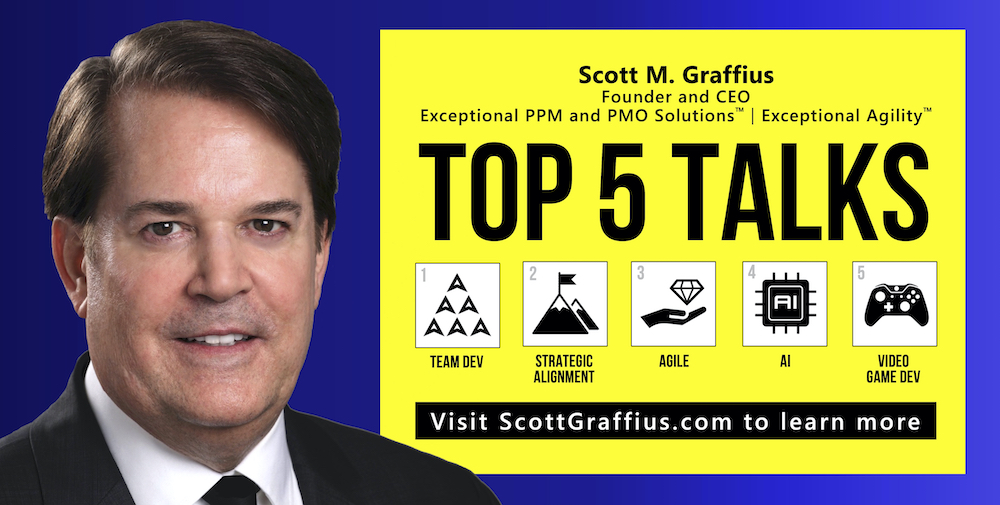
Scott M. Graffius is an Agile project management practitioner, consultant, thinker, creator, award-winning author, and international public speaker. Content from his books, talks, and more have been featured and used by Microsoft, Oracle, Cisco, Project Management Institute, IEEE, National Academy of Sciences, Yale University, Adobe, Torrens University Australia, UK Sports Institute, Amsterdam Public Health Research Institute, Boston University, Bayer, Hasso Plattner Institute, University of Galway Ireland, United States National Park Service, and others.
Conference organizers, businesses, professional associations, government agencies, and universities invite him to speak on topics at the intersection of Agile Project Management, Business, and Technology. To date, Graffius has presented talks and workshops at 89 conferences and other events across 25 countries. He uses everyday language and vibrant custom content to make complex topics clear and understandable, and he provides audiences with practical information they can use. His sessions are highly rated by attendees and organizers alike.
The top five talks and workshop topics are highlighted next.

High Performance Teams
High Performance Teams is first on the list. Scott customizes each session to the audience and other factors, so each one is unique. The following provides a general overview.

Strategic Alignment
Strategic Alignment is second on the list of the top five topics. Scott customizes each session to the audience and other factors, so each one is unique. A general overview follows.

Agile
Agile is third on the list of the top five topics. Scott customizes each session to the audience and other factors, so each one is unique. A general overview follows.

AI Development
Successful AI Development is fourth on the list of the top five topics. Scott customizes each session to the audience and other factors, so each one is unique. A general overview follows.

Video Game Development
Successful Video Game Development is fifth on the list of the top five topics. Scott customizes each session to the audience and other factors, so each one is unique. A general overview follows.
Those are the top five topics for talks and workshops.

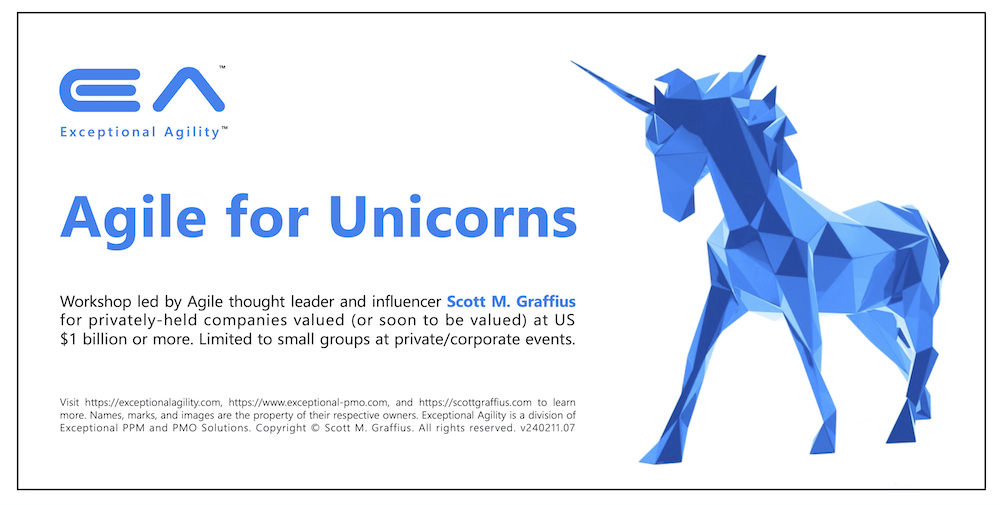
Before concluding this article, we’ll also point out a new topic which is becoming increasingly popular. It’s “Agile for Unicorns.” This session is for privately-held companies valued (or soon to be valued) at US $1 billion or more, and it’s limited to small groups at private/corporate events. To learn more, check out the information sheet: https://scottgraffius.com/resources/Scott-M-Graffius---Public-Speaker---Example-Session---Agile-for-Unicorns---v24012907.pdf.
Visit Scott’s Public Speaker page for a detailed listing of events, testimonials, and more.
Scott speaks around the world. To book him for your conference or other event, complete a speaker engagement request form or email him.




About Scott M. Graffius

Scott M. Graffius, PMP, SA, CSP-SM, CSP-PO, CSM, CSPO, SFE, ITIL, LSSGB is an agile project management practitioner, consultant, thinker, creator, multi-award-winning author, and international public speaker. Founder and CEO of Exceptional PPM and PMO Solutions™ and subsidiary Exceptional Agility™, he has generated over $1.9 billion for Global Fortune 500 businesses and other organizations he has served. Graffius and content from his books, talks, workshops, and more have been featured and used by Microsoft, Oracle, Broadcom, Cisco, Gartner, Project Management Institute, IEEE, National Academy of Sciences, United States Department of Energy, Yale University, Tufts University, and others. He delights audiences with dynamic and engaging talks and workshops on agile project management, AI, Tech leadership, video game development, strategic alignment, the science of high performance teams, and more. To date, he's presented sessions at 89 conferences and other events across 25 countries.
His full bio is available here.
Connect with Scott on:



About Agile Scrum: Your Quick Start Guide with Step-by-Step Instructions

Shifting customer needs are common in today's marketplace. Businesses must be adaptive and responsive to change while delivering an exceptional customer experience to be competitive.
There are a variety of frameworks supporting the development of products and services, and most approaches fall into one of two broad categories: traditional or agile. Traditional practices such as waterfall engage sequential development, while agile involves iterative and incremental deliverables. Organizations are increasingly embracing agile to manage projects, and best meet their business needs of rapid response to change, fast delivery speed, and more.
With clear and easy to follow step-by-step instructions, Scott M. Graffius's award-winning Agile Scrum: Your Quick Start Guide with Step-by-Step Instructions helps the reader:
Hailed by Literary Titan as “the book highlights the versatility of Scrum beautifully.”
Winner of 17 first place awards.
Agile Scrum: Your Quick Start Guide with Step-by-Step Instructions is available in paperback and ebook/Kindle in the United States and around the world. Some links by country follow.

About Agile Transformation: A Brief Story of How an Entertainment Company Developed New Capabilities and Unlocked Business Agility to Thrive in an Era of Rapid Change

Thriving in today's marketplace frequently depends on making a transformation to become more agile. Those successful in the transition enjoy faster delivery speed and ROI, higher satisfaction, continuous improvement, and additional benefits.
Based on actual events, Agile Transformation: A Brief Story of How an Entertainment Company Developed New Capabilities and Unlocked Business Agility to Thrive in an Era of Rapid Change provides a quick (60-90 minute) read about a successful agile transformation at a multinational entertainment and media company, told from the author's perspective as an agile coach.
The award-winning book by Scott M. Graffius is available in paperback and ebook/Kindle in the United States and around the world. Some links by country follow.

© Copyright 2024 Scott M. Graffius. All rights reserved. This material may not be published, broadcast, rewritten or redistributed without the express written permission of Scott M. Graffius.


Scott M. Graffius is an Agile project management practitioner, consultant, thinker, creator, award-winning author, and international public speaker. Content from his books, talks, and more have been featured and used by Microsoft, Oracle, Cisco, Project Management Institute, IEEE, National Academy of Sciences, Yale University, Adobe, Torrens University Australia, UK Sports Institute, Amsterdam Public Health Research Institute, Boston University, Bayer, Hasso Plattner Institute, University of Galway Ireland, United States National Park Service, and others.
Conference organizers, businesses, professional associations, government agencies, and universities invite him to speak on topics at the intersection of Agile Project Management, Business, and Technology. To date, Graffius has presented talks and workshops at 89 conferences and other events across 25 countries. He uses everyday language and vibrant custom content to make complex topics clear and understandable, and he provides audiences with practical information they can use. His sessions are highly rated by attendees and organizers alike.
The top five talks and workshop topics are highlighted next.

High Performance Teams
High Performance Teams is first on the list. Scott customizes each session to the audience and other factors, so each one is unique. The following provides a general overview.
- Title: Talks or workshops on High Performance Teams may be called “Navigate the Phases of Team Development with Speed and Agility” or “Want Happier and More Productive Teams?” or another title.
- Description: Help your teams go farther, faster! Perhaps you’re heard about the phases of team development: Forming, Storming, Norming, Performing, and Adjourning. But are you aware of the unique behaviors specific to each phase? What exactly should you do during each phase to help the team (Agile or otherwise) tackle challenges, make progress, and become successful? If you are a leader (or aspire to be one), a member of a team (or may be in one in the future), or are just looking to develop your skills, this talk (with a fresh angle: 0% theory, 100% real-world-based) will give you a practical framework with actionable tips for working in and leading teams successfully. You'll learn about the five phases—Forming, Storming, Norming, Performing, and Adjourning—including detailed descriptions of each along with proven strategies for addressing challenges or issues which may occur along the way. You'll understand how to use the model to your advantage by effectively navigating all of the phases with speed and agility, from team set-up to the after-party! The presentation draws on the speaker’s first-hand, real-world experience, with his guidance supported by additional research, recommendations, and coverage from the Project Management Institute, IEEE, Google, NASA, and others.
- Key learning benefits: This talk will help you develop and enhance the contributions you make to your organization by being able to: (1) Understand the five stages of team development: Forming, Storming, Norming, Performing, and Adjourning. (2) Learn the characteristics of each phase. (3) Apply proven strategies to help handle challenges or issues experienced by the team. By doing so, you'll advance the team's happiness, productivity, and success.
- Information sheet: https://scottgraffius.com/resources/Scott-M-Graffius---Public-Speaker---Example-Session---Team-Development---v24012907.pdf.

Strategic Alignment
Strategic Alignment is second on the list of the top five topics. Scott customizes each session to the audience and other factors, so each one is unique. A general overview follows.
- Title: Talks or workshops on Strategic Alignment may be called “10 Ways to Score and Prioritize Project Proposals Based on Multiple Factors, Including Strategic Alignment” or “10 Ways to Achieve and Sustain Strategic Alignment” or another title.
- Description: How does your organization assess proposals for new projects? Is there a well-defined scoring and prioritization process—based on alignment with the business’ strategic objectives and other key factors—to quickly and easily identify the objective value of each proposal (including how important it is relative to other initiatives)? If the answer is “no,” keep reading. If the answer is “yes,” you are likely to find practical information and examples in this talk to adapt and adopt to improve the process at your organization.
- Key learning benefits: This talk will help you develop and enhance the contributions you make to your organization by being able to: (1) Understand the benefits of scoring and prioritizing project proposals based on strategic alignment and other key factors. (2) Identify selection and prioritization criteria appropriate for your unique organization, leveraging the flexible framework and some or all of the 10 factors presented during the talk. (3) Put the practical, actionable information presented to use. During the session, we will run an example project proposal through the process, step-by-step. And you will receive a summary "cheat sheet" digital download that you can reference as a guide to help implement or improve this process at your organization.
- Information sheet: https://scottgraffius.com/resources/Scott-M-Graffius---Public-Speaker---Example-Session---10-Ways-Strategic-Alignment---v24012907.pdf.

Agile
Agile is third on the list of the top five topics. Scott customizes each session to the audience and other factors, so each one is unique. A general overview follows.
- Title: Talks or workshops on Agile may be called “Are You Realizing All the Benefits from Agile?” or “Agile Scrum Helps Innovators, Disruptors, and Entrepreneurs Develop and Deliver Products at Astounding Speed Which Drives Competitive Advantage” or another title.
- Description: Organizations are increasingly embracing Agile to best meet their shifting business needs and successfully manage projects. Potential business benefits from Agile include faster delivery and ROI, rapid response to change, higher satisfaction, and continuous improvement. All of which supports innovation and helps drive competitive advantage. Are you realizing all of the benefits? This session will cover the full lifecycle of the most popular Agile approach, Scrum. You will be presented with practical information including top factors from successful implementations—based on the speaker's first-hand experience and 116 sources, including the PMI, IEEE, Google, Agile Alliance, and others—you can use to gain more benefits from Agile.
- Key learning benefits: How you will benefit: (1) Gain a high-level understanding of the Scrum framework-from vision through release. (2) Learn the roles, responsibilities, tools, and techniques unique to Scrum. (3) All of which are inclusive of top factors from successful implementations, which you can put to use to help you get more benefits from Agile.
- Information sheet: https://scottgraffius.com/resources/Scott-M-Graffius---Public-Speaker---Example-Session---Agile-Benefits---v24012907.pdf.

AI Development
Successful AI Development is fourth on the list of the top five topics. Scott customizes each session to the audience and other factors, so each one is unique. A general overview follows.
- Title: Talks or workshops on Successful AI Development may be called “What Successful AI Development Teams Have in Common” or “Fueling the Development of Innovative and Life-Changing AI Solutions” or another title.
- Description: Artificial Intelligence has emerged as a transformative force across a growing number of industries, revolutionizing how we live, work, and interact. From improved medical diagnoses to self-driving cars, and more, AI systems have become integral to our daily lives. Behind these cutting-edge, life-changing solutions are AI teams with a combination of skills. This session reveals exactly how the fusion of technical skills and soft skills within AI teams fuels the successful development of innovative and effective solutions. Informed by “In the AI era, soft skills are the new hard skills” (from Artificial Intelligence and Its Impact on Business), “Soft skills are becoming a key focus” (from Computerworld), “Don’t underestimate the power of a team dynamic – your product becomes the result of it” (from Microsoft), and “Competencies like teamwork are crucial” (from MIT), this talk also delivers a deep-dive on essential team development skills based on the science of high-performing teams. Scott’s talk draws from his work with AI development teams as well as research and coverage from the Association for the Advancement of Artificial Intelligence, Google, IBM, IEEE, Microsoft, Software Engineering Institute, and many others. The usable information can provide you, your teams, and your organization with a competitive advantage.
- Key learning benefits: How you will benefit: (1) Understand technical skills and soft skills leveraged by successful AI teams to develop innovative and effective solutions. (2) Understand the essential team development skills based on the science of high-performing teams. (3) Understand specific techniques including how to apply them to advance the happiness, productivity, and success of teams.
- Information sheet: https://scottgraffius.com/resources/Scott-M-Graffius---Public-Speaker---Example-Session---AI---v24012907.pdf.

Video Game Development
Successful Video Game Development is fifth on the list of the top five topics. Scott customizes each session to the audience and other factors, so each one is unique. A general overview follows.
- Title: Talks or workshops on Successful Video Game Development may be called “The Science of High-Performance Video Game Development Teams” or “Level-Up Your Team: Science-Backed Strategies for High-Performance Video Game Development” or another title.
- Description: Behind every great video game is a team of creative and technical wizards. Creators, storytellers, designers, artists, developers, testers, and others collaborate and leverage a diverse range of hard skills (also known as technical skills) and soft skills (also known as interpersonal skills) to craft an exceptional end-product. Of the many skills, one — a soft skill — is paramount. Activision Blizzard and other premiere developers and publishers of entertainment experiences identify teamwork as critical for the successful development of video games. Informed by Scott’s first-hand work with video game development teams as well as research and coverage from Activision Blizzard, Gameloft, International Game Developers Association, Microsoft, Rockstar Games, Sony Interactive Entertainment, Ubisoft, and others, this talk delivers a deep-dive on the essential teamwork skill based on the science of high- performing teams. The information can provide you, your teams, and your organization with a competitive advantage!
- Key learning benefits: How you will benefit: (1) Understand that a confluence of both hard skills and soft skills (notably, teamwork) are crucial. (2) Learn the five phases of team development and recognize the identifiable characteristics of each phase. (3) Learn how to apply strategies to improve teams' efficacy, happiness, and success.
- Information sheet: https://scottgraffius.com/resources/Scott-M-Graffius---Public-Speaker---Example-Session---Video-Game-Development---v24012907.pdf.
Those are the top five topics for talks and workshops.


Before concluding this article, we’ll also point out a new topic which is becoming increasingly popular. It’s “Agile for Unicorns.” This session is for privately-held companies valued (or soon to be valued) at US $1 billion or more, and it’s limited to small groups at private/corporate events. To learn more, check out the information sheet: https://scottgraffius.com/resources/Scott-M-Graffius---Public-Speaker---Example-Session---Agile-for-Unicorns---v24012907.pdf.
Visit Scott’s Public Speaker page for a detailed listing of events, testimonials, and more.
Scott speaks around the world. To book him for your conference or other event, complete a speaker engagement request form or email him.




About Scott M. Graffius

Scott M. Graffius, PMP, SA, CSP-SM, CSP-PO, CSM, CSPO, SFE, ITIL, LSSGB is an agile project management practitioner, consultant, thinker, creator, multi-award-winning author, and international public speaker. Founder and CEO of Exceptional PPM and PMO Solutions™ and subsidiary Exceptional Agility™, he has generated over $1.9 billion for Global Fortune 500 businesses and other organizations he has served. Graffius and content from his books, talks, workshops, and more have been featured and used by Microsoft, Oracle, Broadcom, Cisco, Gartner, Project Management Institute, IEEE, National Academy of Sciences, United States Department of Energy, Yale University, Tufts University, and others. He delights audiences with dynamic and engaging talks and workshops on agile project management, AI, Tech leadership, video game development, strategic alignment, the science of high performance teams, and more. To date, he's presented sessions at 89 conferences and other events across 25 countries.
His full bio is available here.
Connect with Scott on:



About Agile Scrum: Your Quick Start Guide with Step-by-Step Instructions

Shifting customer needs are common in today's marketplace. Businesses must be adaptive and responsive to change while delivering an exceptional customer experience to be competitive.
There are a variety of frameworks supporting the development of products and services, and most approaches fall into one of two broad categories: traditional or agile. Traditional practices such as waterfall engage sequential development, while agile involves iterative and incremental deliverables. Organizations are increasingly embracing agile to manage projects, and best meet their business needs of rapid response to change, fast delivery speed, and more.
With clear and easy to follow step-by-step instructions, Scott M. Graffius's award-winning Agile Scrum: Your Quick Start Guide with Step-by-Step Instructions helps the reader:
- Implement and use the most popular agile framework―Scrum;
- Deliver products in short cycles with rapid adaptation to change, fast time-to-market, and continuous improvement; and
- Support innovation and drive competitive advantage.
Hailed by Literary Titan as “the book highlights the versatility of Scrum beautifully.”
Winner of 17 first place awards.
Agile Scrum: Your Quick Start Guide with Step-by-Step Instructions is available in paperback and ebook/Kindle in the United States and around the world. Some links by country follow.
- 🇧🇷 Brazil
- 🇨🇦 Canada
- 🇨🇿 Czech Republic
- 🇩🇰 Denmark
- 🇫🇮 Finland
- 🇫🇷 France
- 🇩🇪 Germany
- 🇬🇷 Greece
- 🇭🇺 Hungary
- 🇮🇳 India
- 🇮🇪 Ireland
- 🇮🇱 Israel
- 🇮🇹 Italy
- 🇯🇵 Japan
- 🇱🇺 Luxembourg
- 🇲🇽 Mexico
- 🇳🇱 Netherlands
- 🇳🇿 New Zealand
- 🇳🇴 Norway
- 🇪🇸 Spain
- 🇸🇪 Sweden
- 🇨🇭 Switzerland
- 🇦🇪 UAE
- 🇬🇧 United Kingdom
- 🇺🇸 United States

About Agile Transformation: A Brief Story of How an Entertainment Company Developed New Capabilities and Unlocked Business Agility to Thrive in an Era of Rapid Change

Thriving in today's marketplace frequently depends on making a transformation to become more agile. Those successful in the transition enjoy faster delivery speed and ROI, higher satisfaction, continuous improvement, and additional benefits.
Based on actual events, Agile Transformation: A Brief Story of How an Entertainment Company Developed New Capabilities and Unlocked Business Agility to Thrive in an Era of Rapid Change provides a quick (60-90 minute) read about a successful agile transformation at a multinational entertainment and media company, told from the author's perspective as an agile coach.
The award-winning book by Scott M. Graffius is available in paperback and ebook/Kindle in the United States and around the world. Some links by country follow.
- 🇦🇺 Australia
- 🇦🇹 Austria
- 🇧🇷 Brazil
- 🇨🇦 Canada
- 🇨🇿 Czech Republic
- 🇩🇰 Denmark
- 🇫🇮 Finland
- 🇫🇷 France
- 🇩🇪 Germany
- 🇬🇷 Greece
- 🇮🇳 India
- 🇮🇪 Ireland
- 🇯🇵 Japan
- 🇱🇺 Luxembourg
- 🇲🇽 Mexico
- 🇳🇱 Netherlands
- 🇳🇿 New Zealand
- 🇪🇸 Spain
- 🇸🇪 Sweden
- 🇨🇭 Switzerland
- 🇦🇪 United Arab Emirates
- 🇬🇧 United Kingdom
- 🇺🇸 United States

© Copyright 2024 Scott M. Graffius. All rights reserved. This material may not be published, broadcast, rewritten or redistributed without the express written permission of Scott M. Graffius.

University of California, San Diego Features Scott M. Graffius’ ‘Phases of Team Development’ Work
05 March 2024
BY SCOTT M. GRAFFIUS | ScottGraffius.com

The University of California, San Diego (UCSD) Rady School of Management features Scott M. Graffius’ ‘Phases of Team Development’ work in MGT 173 Project Management.
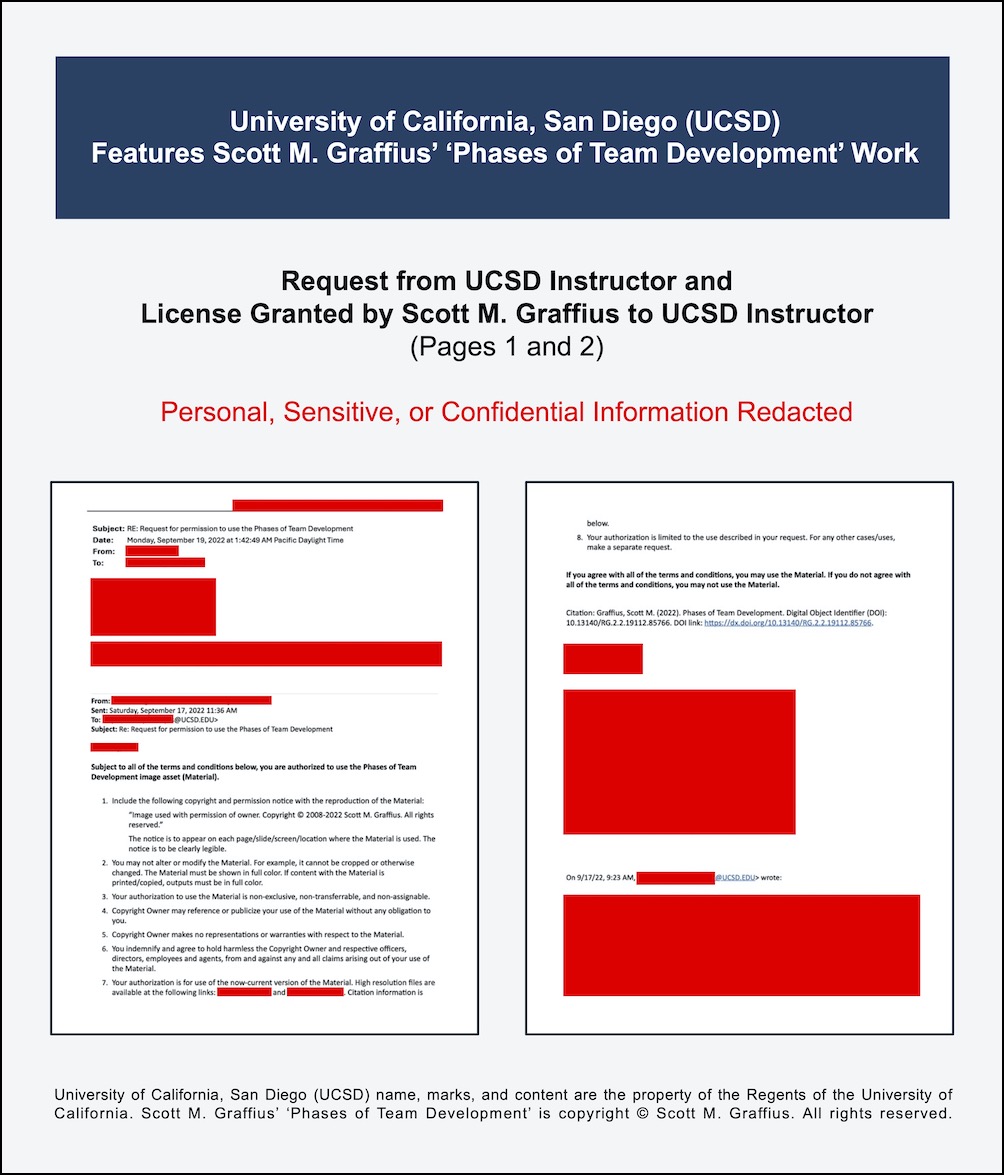
The request for, and the granting of, a license for Graffius’ copyrighted ‘Phases of Team Development’ is shown above.
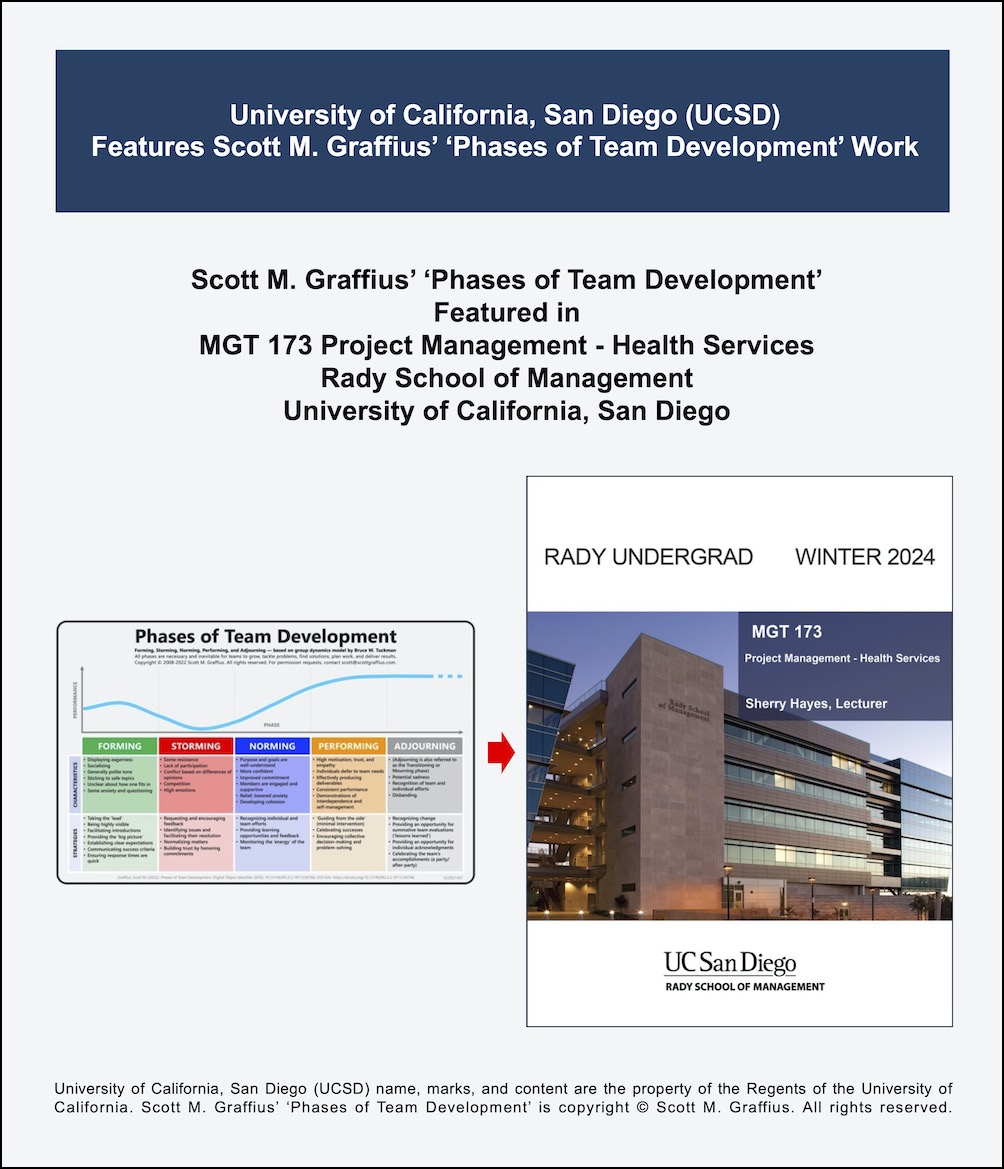
Graffius’ ‘Phases of Team Development’ work and the respective UCSD course are shown above.
About Graffius’ ‘Phases of Team Development’
Informed by the research of Bruce W. Tuckman and Mary Ann C. Jensen, over 100 subsequent studies, and Scott M. Graffius’ first-hand professional experience with, and analysis of, team leadership and performance, Graffius created his ‘Phases of Team Development’ as a unique perspective and visual conveying the five phases of team development — Forming, Storming, Norming, Performing, and Adjourning — inclusive of a graph showing how performance varies by phase, as well as the characteristics and strategies for each phase.
Project Managers, Scrum Masters, Agile Coaches, DevOps Leads, and other leaders can apply the information to help handle challenges or issues experienced by teams. By doing so, they’ll advance the teams’ (and their own) happiness, productivity, and success.
With permission/a license from Graffius, his ‘Phases of Team Development’ work is used by businesses, professional associations, government agencies, and universities around the world. Examples include Yale University, IEEE, Torrens University Australia, UK Sports Institute, Adobe, Amsterdam Public Health Research Institute, Academic Cooperation Association, Boston University, U.S. National Park Service, Bayer, Hasso Plattner Institute, New Zealand Government, University of Galway Ireland, and many more.
Graffius initially developed his unique material in 2008, and he periodically refreshes it. The most current (2024) edition of his work is here.
Graffius has presented talks and workshops at 89 conferences and other events across 25 countries. While each session is unique, the top topic is high performance teams. In those sessions, he leverages and expands upon on his ‘Phases of Team Development’ work. Sessions are dynamic, engaging, and packed with fresh insights and usable information. They’re highly rated by attendees and organizers alike. To book him for your conference or other event, complete a speaker engagement request form or email him.

About UCSD Rady School of Management Course - MGT 173 Project Management
UCSD describes MGT 173 Project Management at https://catalog.ucsd.edu/courses/MGT.html as: "This course covers efficient techniques for managing health services projects, including both the technical aspects of project management as well as the human-capital management issues associated with blending administrative and technical staff with health-care professionals. Topics include scheduling methods, milestone setting, governmental regulations, resource allocation, interpersonal skills, and performing research and development projects—all with a health services focus."

About UCSD
Recognized as one of the top 20 research universities worldwide, the University of California, San Diego (UCSD) culture of collaboration sparks discoveries that advance society and drive economic impact. UCSD is considered a Public Ivy—a public university perceived to provide a collegiate experience on the level of Ivy League universities. Its faculty, researchers, and alumni have won 27 Nobel Prizes as well as 3 Fields Medals, 8 National Medals of Science, 8 MacArthur Fellowships, and 3 Pulitzer Prizes. Additionally, of the current faculty, 29 have been elected to the National Academy of Engineering, 70 to the National Academy of Sciences, 45 to the Institute of Medicine, and 110 to the American Academy of Arts and Sciences. Visit https://ucsd.edu to learn more.




About Scott M. Graffius

Scott M. Graffius, PMP, SA, CSP-SM, CSP-PO, CSM, CSPO, ITIL, LSSGB is an agile project management practitioner, consultant, thinker, creator, multi-award-winning author, and international public speaker. Founder and CEO of Exceptional PPM and PMO Solutions™ and subsidiary Exceptional Agility™, he has generated over $1.9 billion for Global Fortune 500 businesses and other organizations he has served. Graffius and content from his books, talks, workshops, and more have been featured and used by Microsoft, Oracle, Broadcom, Cisco, Gartner, Project Management Institute, IEEE, National Academy of Sciences, United States Department of Energy, Yale University, Tufts University, and others. He delights audiences with dynamic and engaging talks and workshops on agile project management, AI, Tech leadership, video game development, strategic alignment, the science of high performance teams, and more. To date, he's presented sessions at 89 conferences and other events across 25 countries.
His full bio is available here.
Connect with Scott on:



About Agile Scrum: Your Quick Start Guide with Step-by-Step Instructions

Shifting customer needs are common in today's marketplace. Businesses must be adaptive and responsive to change while delivering an exceptional customer experience to be competitive.
There are a variety of frameworks supporting the development of products and services, and most approaches fall into one of two broad categories: traditional or agile. Traditional practices such as waterfall engage sequential development, while agile involves iterative and incremental deliverables. Organizations are increasingly embracing agile to manage projects, and best meet their business needs of rapid response to change, fast delivery speed, and more.
With clear and easy to follow step-by-step instructions, Scott M. Graffius's award-winning Agile Scrum: Your Quick Start Guide with Step-by-Step Instructions helps the reader:
Hailed by Literary Titan as “the book highlights the versatility of Scrum beautifully.”
Winner of 17 first place awards.
Agile Scrum: Your Quick Start Guide with Step-by-Step Instructions is available in paperback and ebook/Kindle in the United States and around the world. Some links by country follow.

About Agile Transformation: A Brief Story of How an Entertainment Company Developed New Capabilities and Unlocked Business Agility to Thrive in an Era of Rapid Change

Thriving in today's marketplace frequently depends on making a transformation to become more agile. Those successful in the transition enjoy faster delivery speed and ROI, higher satisfaction, continuous improvement, and additional benefits.
Based on actual events, Agile Transformation: A Brief Story of How an Entertainment Company Developed New Capabilities and Unlocked Business Agility to Thrive in an Era of Rapid Change provides a quick (60-90 minute) read about a successful agile transformation at a multinational entertainment and media company, told from the author's perspective as an agile coach.
The award-winning book by Scott M. Graffius is available in paperback and ebook/Kindle in the United States and around the world. Some links by country follow.

The short link for this article is: https://bit.ly/ucsd-173
© Copyright 2024 Scott M. Graffius. All rights reserved. This material may not be published, broadcast, rewritten or redistributed without the express written permission of Scott M. Graffius.


The University of California, San Diego (UCSD) Rady School of Management features Scott M. Graffius’ ‘Phases of Team Development’ work in MGT 173 Project Management.

The request for, and the granting of, a license for Graffius’ copyrighted ‘Phases of Team Development’ is shown above.

Graffius’ ‘Phases of Team Development’ work and the respective UCSD course are shown above.
About Graffius’ ‘Phases of Team Development’
Informed by the research of Bruce W. Tuckman and Mary Ann C. Jensen, over 100 subsequent studies, and Scott M. Graffius’ first-hand professional experience with, and analysis of, team leadership and performance, Graffius created his ‘Phases of Team Development’ as a unique perspective and visual conveying the five phases of team development — Forming, Storming, Norming, Performing, and Adjourning — inclusive of a graph showing how performance varies by phase, as well as the characteristics and strategies for each phase.
Project Managers, Scrum Masters, Agile Coaches, DevOps Leads, and other leaders can apply the information to help handle challenges or issues experienced by teams. By doing so, they’ll advance the teams’ (and their own) happiness, productivity, and success.
With permission/a license from Graffius, his ‘Phases of Team Development’ work is used by businesses, professional associations, government agencies, and universities around the world. Examples include Yale University, IEEE, Torrens University Australia, UK Sports Institute, Adobe, Amsterdam Public Health Research Institute, Academic Cooperation Association, Boston University, U.S. National Park Service, Bayer, Hasso Plattner Institute, New Zealand Government, University of Galway Ireland, and many more.
Graffius initially developed his unique material in 2008, and he periodically refreshes it. The most current (2024) edition of his work is here.
Graffius has presented talks and workshops at 89 conferences and other events across 25 countries. While each session is unique, the top topic is high performance teams. In those sessions, he leverages and expands upon on his ‘Phases of Team Development’ work. Sessions are dynamic, engaging, and packed with fresh insights and usable information. They’re highly rated by attendees and organizers alike. To book him for your conference or other event, complete a speaker engagement request form or email him.

About UCSD Rady School of Management Course - MGT 173 Project Management
UCSD describes MGT 173 Project Management at https://catalog.ucsd.edu/courses/MGT.html as: "This course covers efficient techniques for managing health services projects, including both the technical aspects of project management as well as the human-capital management issues associated with blending administrative and technical staff with health-care professionals. Topics include scheduling methods, milestone setting, governmental regulations, resource allocation, interpersonal skills, and performing research and development projects—all with a health services focus."

About UCSD
Recognized as one of the top 20 research universities worldwide, the University of California, San Diego (UCSD) culture of collaboration sparks discoveries that advance society and drive economic impact. UCSD is considered a Public Ivy—a public university perceived to provide a collegiate experience on the level of Ivy League universities. Its faculty, researchers, and alumni have won 27 Nobel Prizes as well as 3 Fields Medals, 8 National Medals of Science, 8 MacArthur Fellowships, and 3 Pulitzer Prizes. Additionally, of the current faculty, 29 have been elected to the National Academy of Engineering, 70 to the National Academy of Sciences, 45 to the Institute of Medicine, and 110 to the American Academy of Arts and Sciences. Visit https://ucsd.edu to learn more.




About Scott M. Graffius

Scott M. Graffius, PMP, SA, CSP-SM, CSP-PO, CSM, CSPO, ITIL, LSSGB is an agile project management practitioner, consultant, thinker, creator, multi-award-winning author, and international public speaker. Founder and CEO of Exceptional PPM and PMO Solutions™ and subsidiary Exceptional Agility™, he has generated over $1.9 billion for Global Fortune 500 businesses and other organizations he has served. Graffius and content from his books, talks, workshops, and more have been featured and used by Microsoft, Oracle, Broadcom, Cisco, Gartner, Project Management Institute, IEEE, National Academy of Sciences, United States Department of Energy, Yale University, Tufts University, and others. He delights audiences with dynamic and engaging talks and workshops on agile project management, AI, Tech leadership, video game development, strategic alignment, the science of high performance teams, and more. To date, he's presented sessions at 89 conferences and other events across 25 countries.
His full bio is available here.
Connect with Scott on:



About Agile Scrum: Your Quick Start Guide with Step-by-Step Instructions

Shifting customer needs are common in today's marketplace. Businesses must be adaptive and responsive to change while delivering an exceptional customer experience to be competitive.
There are a variety of frameworks supporting the development of products and services, and most approaches fall into one of two broad categories: traditional or agile. Traditional practices such as waterfall engage sequential development, while agile involves iterative and incremental deliverables. Organizations are increasingly embracing agile to manage projects, and best meet their business needs of rapid response to change, fast delivery speed, and more.
With clear and easy to follow step-by-step instructions, Scott M. Graffius's award-winning Agile Scrum: Your Quick Start Guide with Step-by-Step Instructions helps the reader:
- Implement and use the most popular agile framework―Scrum;
- Deliver products in short cycles with rapid adaptation to change, fast time-to-market, and continuous improvement; and
- Support innovation and drive competitive advantage.
Hailed by Literary Titan as “the book highlights the versatility of Scrum beautifully.”
Winner of 17 first place awards.
Agile Scrum: Your Quick Start Guide with Step-by-Step Instructions is available in paperback and ebook/Kindle in the United States and around the world. Some links by country follow.
- 🇧🇷 Brazil
- 🇨🇦 Canada
- 🇨🇿 Czech Republic
- 🇩🇰 Denmark
- 🇫🇮 Finland
- 🇫🇷 France
- 🇩🇪 Germany
- 🇬🇷 Greece
- 🇭🇺 Hungary
- 🇮🇳 India
- 🇮🇪 Ireland
- 🇮🇱 Israel
- 🇮🇹 Italy
- 🇯🇵 Japan
- 🇱🇺 Luxembourg
- 🇲🇽 Mexico
- 🇳🇱 Netherlands
- 🇳🇿 New Zealand
- 🇳🇴 Norway
- 🇪🇸 Spain
- 🇸🇪 Sweden
- 🇨🇭 Switzerland
- 🇦🇪 UAE
- 🇬🇧 United Kingdom
- 🇺🇸 United States

About Agile Transformation: A Brief Story of How an Entertainment Company Developed New Capabilities and Unlocked Business Agility to Thrive in an Era of Rapid Change

Thriving in today's marketplace frequently depends on making a transformation to become more agile. Those successful in the transition enjoy faster delivery speed and ROI, higher satisfaction, continuous improvement, and additional benefits.
Based on actual events, Agile Transformation: A Brief Story of How an Entertainment Company Developed New Capabilities and Unlocked Business Agility to Thrive in an Era of Rapid Change provides a quick (60-90 minute) read about a successful agile transformation at a multinational entertainment and media company, told from the author's perspective as an agile coach.
The award-winning book by Scott M. Graffius is available in paperback and ebook/Kindle in the United States and around the world. Some links by country follow.
- 🇦🇺 Australia
- 🇦🇹 Austria
- 🇧🇷 Brazil
- 🇨🇦 Canada
- 🇨🇿 Czech Republic
- 🇩🇰 Denmark
- 🇫🇮 Finland
- 🇫🇷 France
- 🇩🇪 Germany
- 🇬🇷 Greece
- 🇮🇳 India
- 🇮🇪 Ireland
- 🇯🇵 Japan
- 🇱🇺 Luxembourg
- 🇲🇽 Mexico
- 🇳🇱 Netherlands
- 🇳🇿 New Zealand
- 🇪🇸 Spain
- 🇸🇪 Sweden
- 🇨🇭 Switzerland
- 🇦🇪 United Arab Emirates
- 🇬🇧 United Kingdom
- 🇺🇸 United States

The short link for this article is: https://bit.ly/ucsd-173
© Copyright 2024 Scott M. Graffius. All rights reserved. This material may not be published, broadcast, rewritten or redistributed without the express written permission of Scott M. Graffius.

Ford Features Scott M. Graffius' 'Phases of Team Development' Work
28 March 2024
BY SCOTT M. GRAFFIUS | ScottGraffius.com
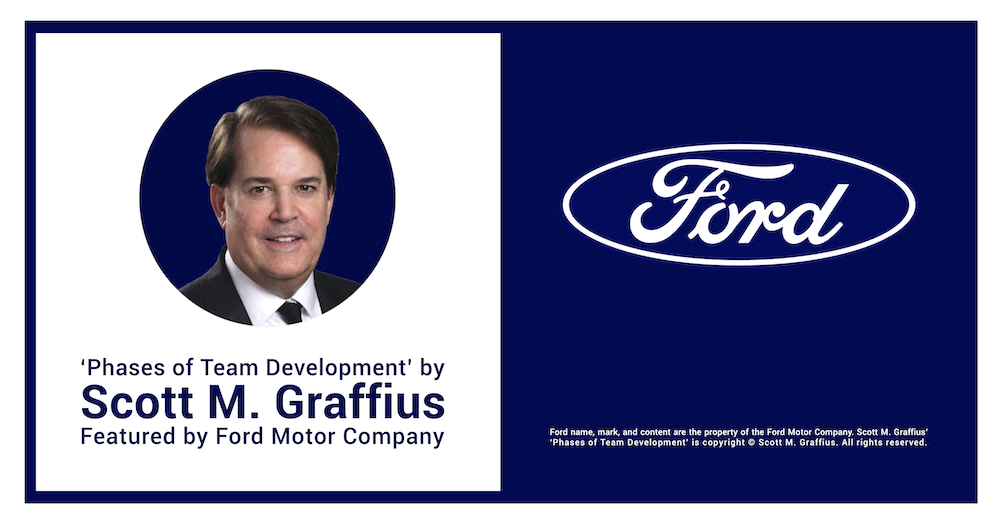

With a license from Scott M. Graffius, his copyrighted ‘Phases of Team Development’ work is featured and used by businesses, professional associations, government agencies, and universities around the world. Examples include Yale University, IEEE, Constructor Institute (Switzerland), Adobe, Boston University, Amsterdam Public Health Research Institute, United States National Park Service, Bayer, University of Galway (Ireland), Hasso Plattner Institute (Germany), American Management Association, UC San Diego, and many more.
Ford was added to the list.
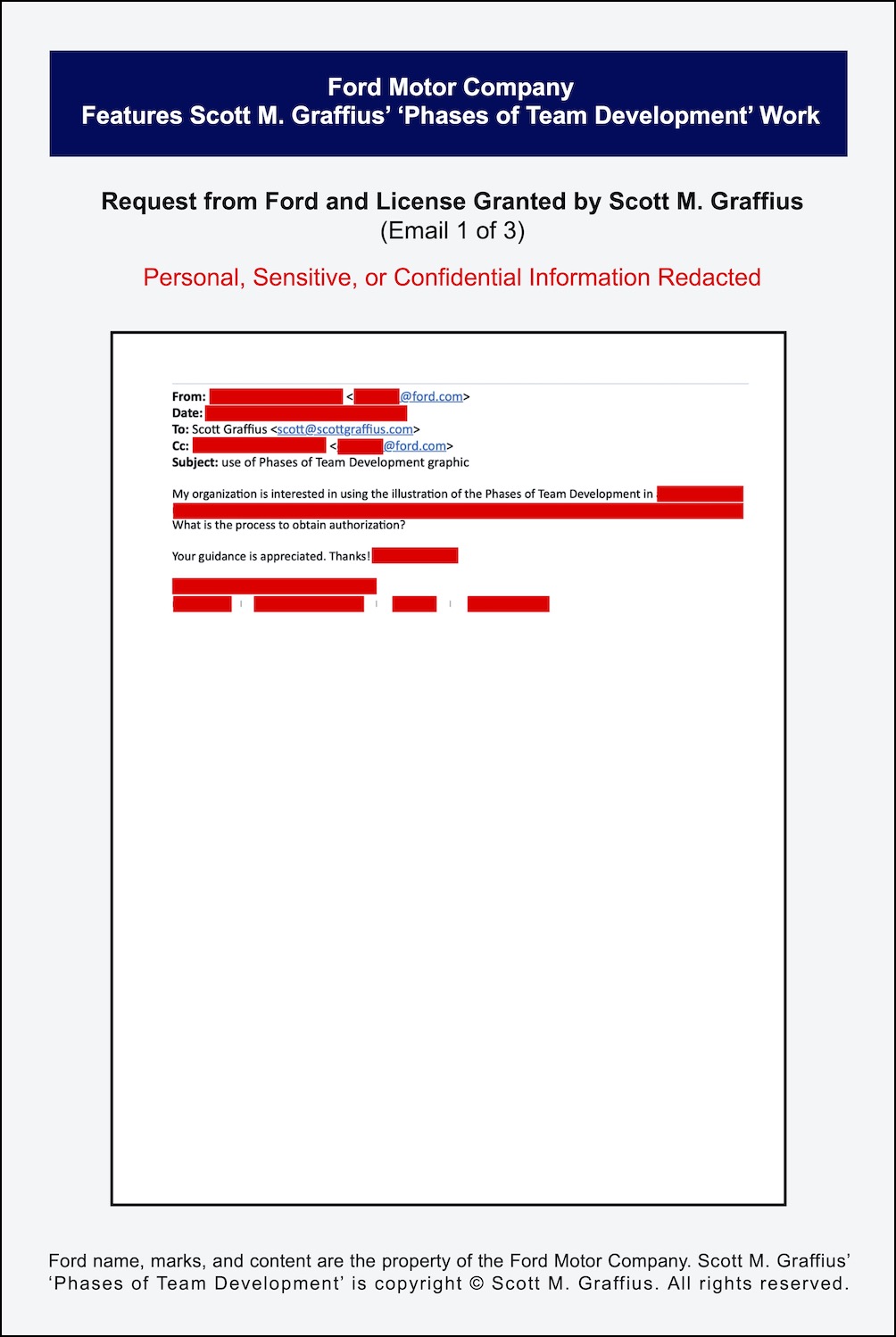
Email 1 of 3 is shown above.
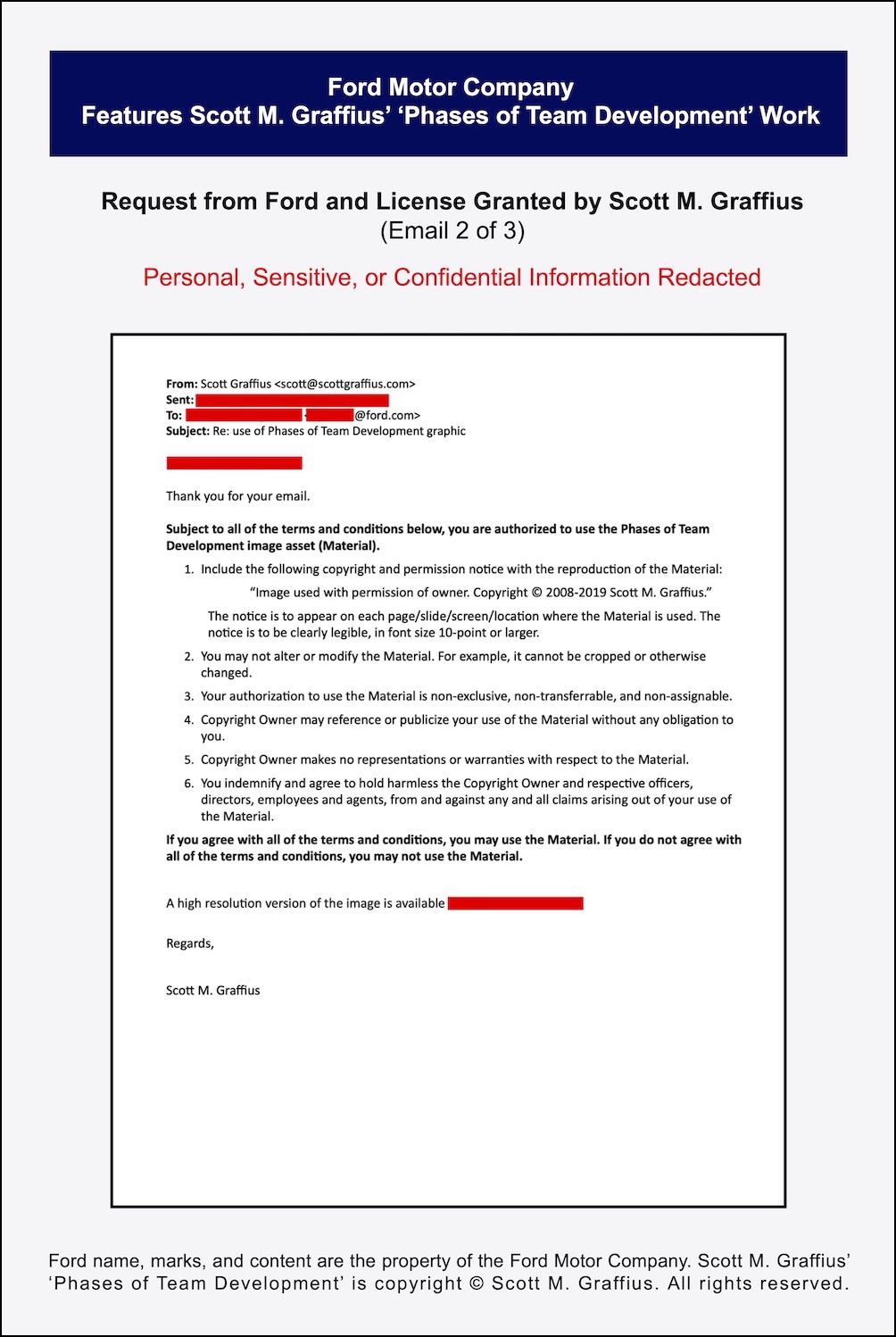
Email 2 of 3 is shown above.
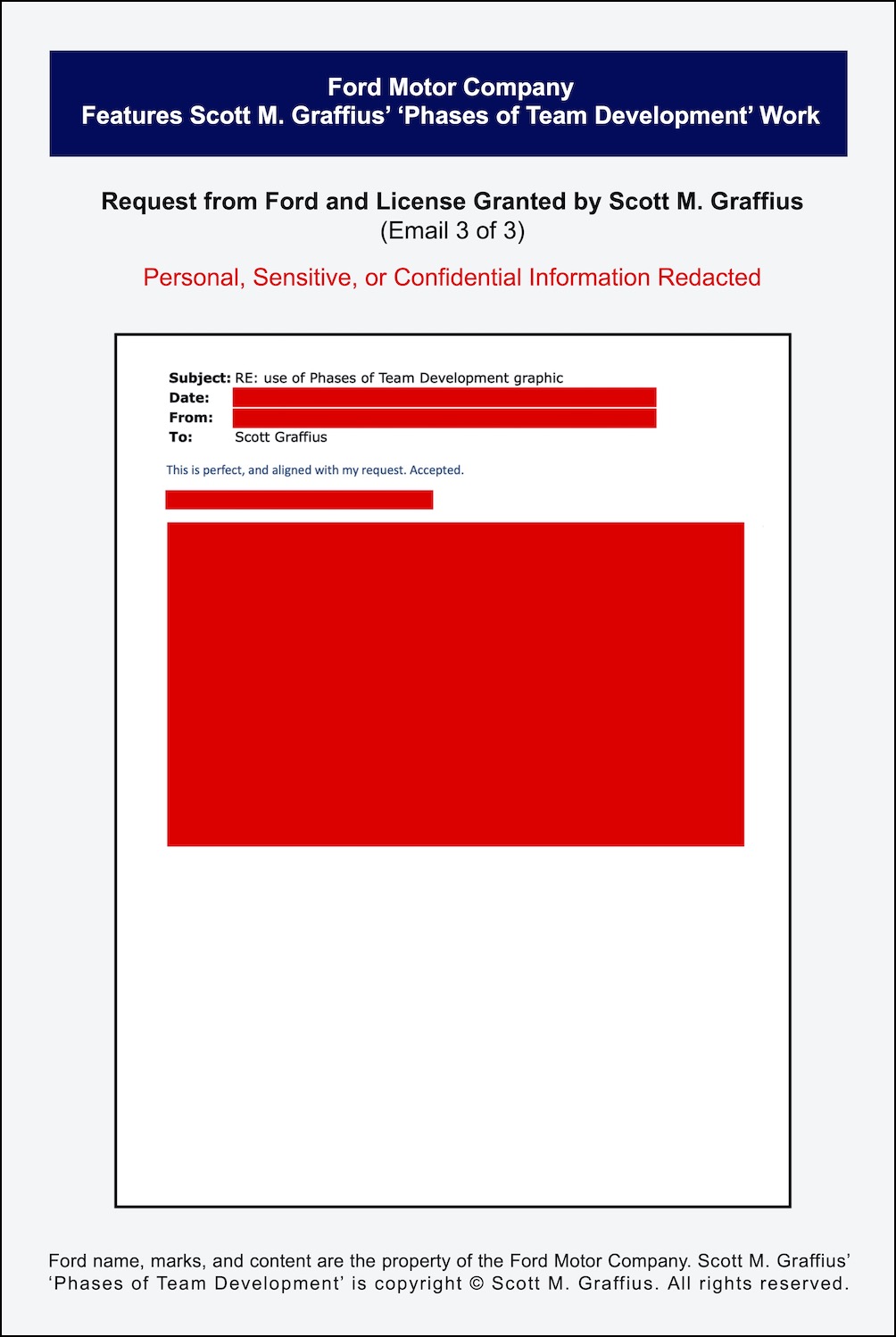
Email 3 of 3 is shown above.
More Information on Graffius' 'Phases of Team Development'
Informed by the research of Bruce W. Tuckman and Mary Ann C. Jensen, over 100 subsequent studies, and Scott M. Graffius' first-hand professional experience with, and analysis of, team leadership and performance, Graffius created his ‘Phases of Team Development.’ It’s a unique perspective and visual conveying the five phases of team development — Forming, Storming, Norming, Performing, and Adjourning. It’s also inclusive of a graph showing how performance varies by phase, as well as the characteristics and strategies for each phase.
Leaders of teams — Project Managers, Scrum Masters, Agile Coaches, DevOps Leads, and others — can apply the information to help handle challenges or issues experienced by teams. By doing so, they’ll advance the teams’ (and their own) happiness, productivity, and success.
Graffius initially developed the material in 2008, and he periodically refreshes it. For details on the current (2024) edition including permission request information, high resolution files, and more, visit here.
Graffius has presented talks and workshops at 89 conferences and other events across 25 countries. While each session is unique, the top topic is high performance teams. In those sessions, he expands upon on his ‘Phases of Team Development’ work. Sessions are dynamic, engaging, and packed with fresh insights and usable information. They’re highly rated by attendees and organizers alike. Visit here to learn more.
About Ford
Ford Motor Company is a multinational automobile manufacturer headquartered in Dearborn, Michigan, United States. It was founded by Henry Ford and incorporated on June 16, 1903. Ford develops and delivers Ford trucks, sport utility vehicles, commercial vans and cars, and Lincoln luxury vehicles. The company does that through three customer-centered business segments: Ford Blue, engineering gas-powered and hybrid vehicles; Ford Model e, developing electric vehicles (EVs); and Ford Pro, helping commercial customers transform and expand their businesses with vehicles and services tailored to their needs. Additionally, Ford provides financial services through Ford Motor Credit Company. Ford employs about 177,000 people worldwide. More information about the company and its products and services is available at https://corporate.ford.com.




About Scott M. Graffius

Scott M. Graffius, PMP, SA, CSP-SM, CSP-PO, CSM, CSPO, ITIL, LSSGB is an agile project management practitioner, consultant, thinker, creator, multi-award-winning author, and international public speaker. Founder and CEO of Exceptional PPM and PMO Solutions™ and subsidiary Exceptional Agility™, he has generated over $1.9 billion for Global Fortune 500 businesses and other organizations he has served. Graffius and content from his books, talks, workshops, and more have been featured and used by Microsoft, Oracle, Broadcom, Cisco, Gartner, Project Management Institute, IEEE, National Academy of Sciences, United States Department of Energy, Yale University, Tufts University, and others. He delights audiences with dynamic and engaging talks and workshops on agile project management, AI, Tech leadership, video game development, strategic alignment, the science of high performance teams, and more. To date, he's presented sessions at 89 conferences and other events across 25 countries.
His full bio is available here.
Connect with Scott on:



About Agile Scrum: Your Quick Start Guide with Step-by-Step Instructions

Shifting customer needs are common in today's marketplace. Businesses must be adaptive and responsive to change while delivering an exceptional customer experience to be competitive.
There are a variety of frameworks supporting the development of products and services, and most approaches fall into one of two broad categories: traditional or agile. Traditional practices such as waterfall engage sequential development, while agile involves iterative and incremental deliverables. Organizations are increasingly embracing agile to manage projects, and best meet their business needs of rapid response to change, fast delivery speed, and more.
With clear and easy to follow step-by-step instructions, Scott M. Graffius's award-winning Agile Scrum: Your Quick Start Guide with Step-by-Step Instructions helps the reader:
Hailed by Literary Titan as “the book highlights the versatility of Scrum beautifully.”
Winner of 17 first place awards.
Agile Scrum: Your Quick Start Guide with Step-by-Step Instructions is available in paperback and ebook/Kindle in the United States and around the world. Some links by country follow.

About Agile Transformation: A Brief Story of How an Entertainment Company Developed New Capabilities and Unlocked Business Agility to Thrive in an Era of Rapid Change

Thriving in today's marketplace frequently depends on making a transformation to become more agile. Those successful in the transition enjoy faster delivery speed and ROI, higher satisfaction, continuous improvement, and additional benefits.
Based on actual events, Agile Transformation: A Brief Story of How an Entertainment Company Developed New Capabilities and Unlocked Business Agility to Thrive in an Era of Rapid Change provides a quick (60-90 minute) read about a successful agile transformation at a multinational entertainment and media company, told from the author's perspective as an agile coach.
The award-winning book by Scott M. Graffius is available in paperback and ebook/Kindle in the United States and around the world. Some links by country follow.

Short link for this article is: https://bit.ly/ford-2024
© Copyright 2024 Scott M. Graffius. All rights reserved. This material may not be published, broadcast, rewritten or redistributed without the express written permission of Scott M. Graffius.



With a license from Scott M. Graffius, his copyrighted ‘Phases of Team Development’ work is featured and used by businesses, professional associations, government agencies, and universities around the world. Examples include Yale University, IEEE, Constructor Institute (Switzerland), Adobe, Boston University, Amsterdam Public Health Research Institute, United States National Park Service, Bayer, University of Galway (Ireland), Hasso Plattner Institute (Germany), American Management Association, UC San Diego, and many more.
Ford was added to the list.

Email 1 of 3 is shown above.

Email 2 of 3 is shown above.

Email 3 of 3 is shown above.
More Information on Graffius' 'Phases of Team Development'
Informed by the research of Bruce W. Tuckman and Mary Ann C. Jensen, over 100 subsequent studies, and Scott M. Graffius' first-hand professional experience with, and analysis of, team leadership and performance, Graffius created his ‘Phases of Team Development.’ It’s a unique perspective and visual conveying the five phases of team development — Forming, Storming, Norming, Performing, and Adjourning. It’s also inclusive of a graph showing how performance varies by phase, as well as the characteristics and strategies for each phase.
Leaders of teams — Project Managers, Scrum Masters, Agile Coaches, DevOps Leads, and others — can apply the information to help handle challenges or issues experienced by teams. By doing so, they’ll advance the teams’ (and their own) happiness, productivity, and success.
Graffius initially developed the material in 2008, and he periodically refreshes it. For details on the current (2024) edition including permission request information, high resolution files, and more, visit here.
Graffius has presented talks and workshops at 89 conferences and other events across 25 countries. While each session is unique, the top topic is high performance teams. In those sessions, he expands upon on his ‘Phases of Team Development’ work. Sessions are dynamic, engaging, and packed with fresh insights and usable information. They’re highly rated by attendees and organizers alike. Visit here to learn more.
About Ford
Ford Motor Company is a multinational automobile manufacturer headquartered in Dearborn, Michigan, United States. It was founded by Henry Ford and incorporated on June 16, 1903. Ford develops and delivers Ford trucks, sport utility vehicles, commercial vans and cars, and Lincoln luxury vehicles. The company does that through three customer-centered business segments: Ford Blue, engineering gas-powered and hybrid vehicles; Ford Model e, developing electric vehicles (EVs); and Ford Pro, helping commercial customers transform and expand their businesses with vehicles and services tailored to their needs. Additionally, Ford provides financial services through Ford Motor Credit Company. Ford employs about 177,000 people worldwide. More information about the company and its products and services is available at https://corporate.ford.com.




About Scott M. Graffius

Scott M. Graffius, PMP, SA, CSP-SM, CSP-PO, CSM, CSPO, ITIL, LSSGB is an agile project management practitioner, consultant, thinker, creator, multi-award-winning author, and international public speaker. Founder and CEO of Exceptional PPM and PMO Solutions™ and subsidiary Exceptional Agility™, he has generated over $1.9 billion for Global Fortune 500 businesses and other organizations he has served. Graffius and content from his books, talks, workshops, and more have been featured and used by Microsoft, Oracle, Broadcom, Cisco, Gartner, Project Management Institute, IEEE, National Academy of Sciences, United States Department of Energy, Yale University, Tufts University, and others. He delights audiences with dynamic and engaging talks and workshops on agile project management, AI, Tech leadership, video game development, strategic alignment, the science of high performance teams, and more. To date, he's presented sessions at 89 conferences and other events across 25 countries.
His full bio is available here.
Connect with Scott on:



About Agile Scrum: Your Quick Start Guide with Step-by-Step Instructions

Shifting customer needs are common in today's marketplace. Businesses must be adaptive and responsive to change while delivering an exceptional customer experience to be competitive.
There are a variety of frameworks supporting the development of products and services, and most approaches fall into one of two broad categories: traditional or agile. Traditional practices such as waterfall engage sequential development, while agile involves iterative and incremental deliverables. Organizations are increasingly embracing agile to manage projects, and best meet their business needs of rapid response to change, fast delivery speed, and more.
With clear and easy to follow step-by-step instructions, Scott M. Graffius's award-winning Agile Scrum: Your Quick Start Guide with Step-by-Step Instructions helps the reader:
- Implement and use the most popular agile framework―Scrum;
- Deliver products in short cycles with rapid adaptation to change, fast time-to-market, and continuous improvement; and
- Support innovation and drive competitive advantage.
Hailed by Literary Titan as “the book highlights the versatility of Scrum beautifully.”
Winner of 17 first place awards.
Agile Scrum: Your Quick Start Guide with Step-by-Step Instructions is available in paperback and ebook/Kindle in the United States and around the world. Some links by country follow.
- 🇧🇷 Brazil
- 🇨🇦 Canada
- 🇨🇿 Czech Republic
- 🇩🇰 Denmark
- 🇫🇮 Finland
- 🇫🇷 France
- 🇩🇪 Germany
- 🇬🇷 Greece
- 🇭🇺 Hungary
- 🇮🇳 India
- 🇮🇪 Ireland
- 🇮🇱 Israel
- 🇮🇹 Italy
- 🇯🇵 Japan
- 🇱🇺 Luxembourg
- 🇲🇽 Mexico
- 🇳🇱 Netherlands
- 🇳🇿 New Zealand
- 🇳🇴 Norway
- 🇪🇸 Spain
- 🇸🇪 Sweden
- 🇨🇭 Switzerland
- 🇦🇪 UAE
- 🇬🇧 United Kingdom
- 🇺🇸 United States

About Agile Transformation: A Brief Story of How an Entertainment Company Developed New Capabilities and Unlocked Business Agility to Thrive in an Era of Rapid Change

Thriving in today's marketplace frequently depends on making a transformation to become more agile. Those successful in the transition enjoy faster delivery speed and ROI, higher satisfaction, continuous improvement, and additional benefits.
Based on actual events, Agile Transformation: A Brief Story of How an Entertainment Company Developed New Capabilities and Unlocked Business Agility to Thrive in an Era of Rapid Change provides a quick (60-90 minute) read about a successful agile transformation at a multinational entertainment and media company, told from the author's perspective as an agile coach.
The award-winning book by Scott M. Graffius is available in paperback and ebook/Kindle in the United States and around the world. Some links by country follow.
- 🇦🇺 Australia
- 🇦🇹 Austria
- 🇧🇷 Brazil
- 🇨🇦 Canada
- 🇨🇿 Czech Republic
- 🇩🇰 Denmark
- 🇫🇮 Finland
- 🇫🇷 France
- 🇩🇪 Germany
- 🇬🇷 Greece
- 🇮🇳 India
- 🇮🇪 Ireland
- 🇯🇵 Japan
- 🇱🇺 Luxembourg
- 🇲🇽 Mexico
- 🇳🇱 Netherlands
- 🇳🇿 New Zealand
- 🇪🇸 Spain
- 🇸🇪 Sweden
- 🇨🇭 Switzerland
- 🇦🇪 United Arab Emirates
- 🇬🇧 United Kingdom
- 🇺🇸 United States

Short link for this article is: https://bit.ly/ford-2024
© Copyright 2024 Scott M. Graffius. All rights reserved. This material may not be published, broadcast, rewritten or redistributed without the express written permission of Scott M. Graffius.

Division of the EU’s European Commission Used Material Developed by Scott M. Graffius
01 April 2024
BY SCOTT M. GRAFFIUS | ScottGraffius.com
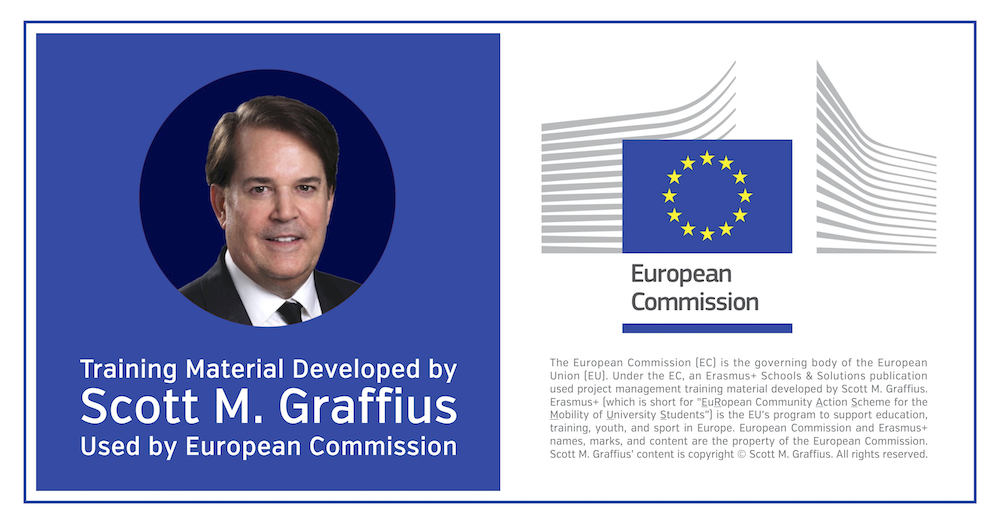

Strategic objectives play a crucial role in guiding organizations towards achieving their vision and mission. They’re fulfilled by projects, endeavors undertaken to create a unique product, service, or result.
The art and science of project management (Agile or otherwise) — the application of knowledge, skills, tools, and techniques to projects — is indispensable for the management and completion of projects. And tools can make a significant contribution to successful outcomes.
In 2007, Scott M. Graffius developed a fresh take on RACI charts, a simple project management tool. His unique material provides audiences with practical information they can use to leverage RACI charts to help manage complexities and achieve success. Graffius periodically refreshes his work. In 2020, he published an updated version on ResearchGate, a European platform for researchers and scientists.
Graffius' respective work is here and citation information follows:
Graffius, Scott M. (2020). How the RACI Tool Can Help You: Use RACI to Establish Roles and Responsibilities—and Improve Outcomes—for Projects and Other Work. Los Angeles, California: Exceptional PPM and PMO Solutions. DOI: 10.13140/RG.2.2.14713.62561/4.
A division of the EU’s European Commission, Erasmus+, used Graffius' material in one of their publications. Their work is here and select visuals follow.
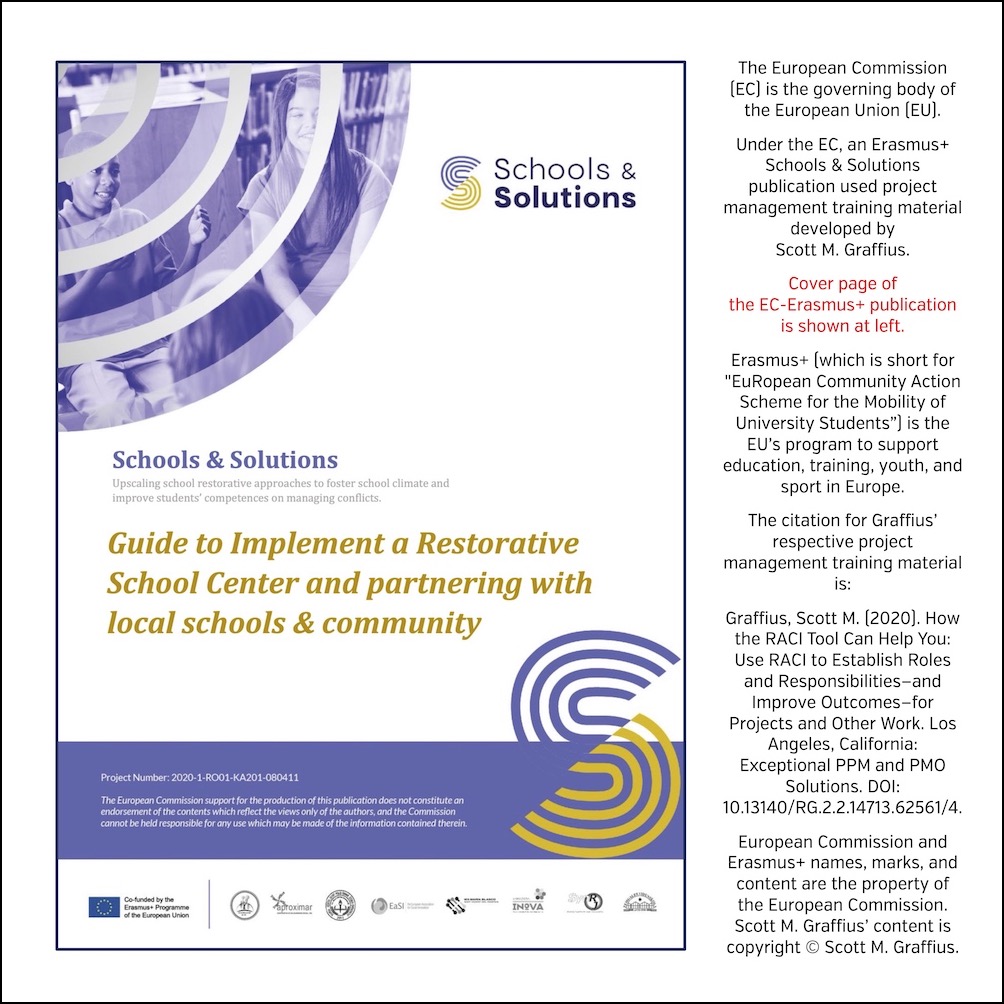
The cover page is shown above.
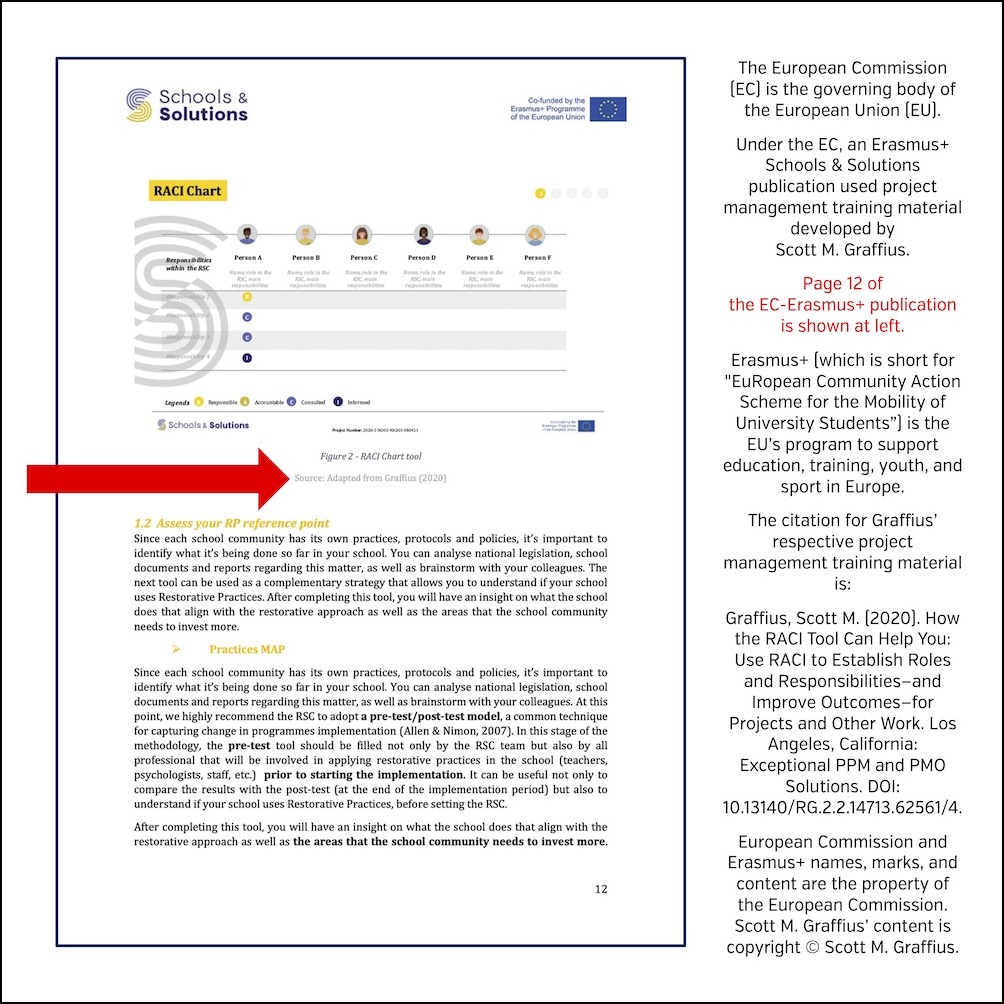
Page 13 is shown above.
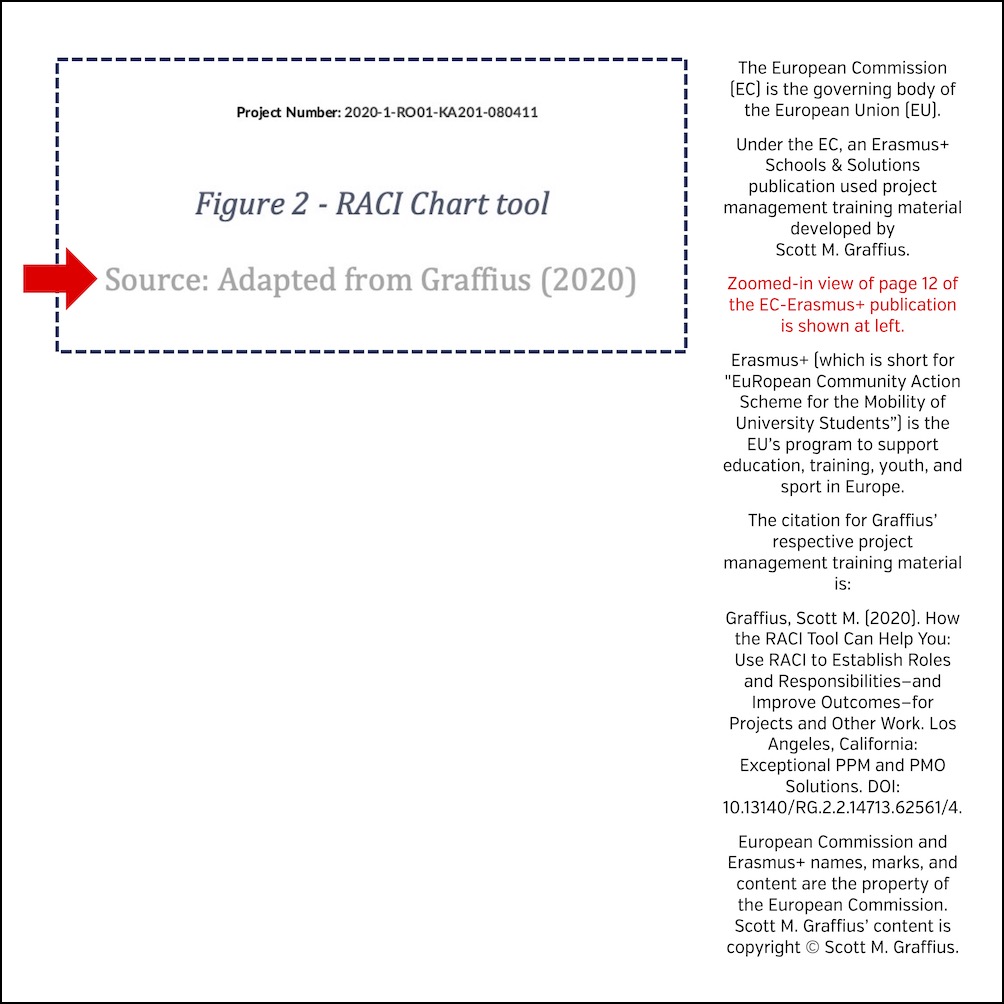
A zoomed-in version visual of page 13 is shown above.
About the European Commission
The European Commission (EC) is the governing body of the European Union (EU). It represents and upholds the interests of the EU as a whole and it is independent of national governments. The EC prepares legislation for adoption by the Council (representing the member countries) and the Parliament (representing the citizens). It administers the budget and the policy programs in cooperation with authorities in the member countries. The EC has an administrative body of about 32,000 European civil servants. Visit https://commission.europa.eu to learn more.
About Erasmus+
Erasmus+ (which is short for "EuRopean Community Action Scheme for the Mobility of University Students") is the European Union’s program to support education, training, youth, and sport in Europe. To learn more, visit https://erasmus-plus.ec.europa.eu.
About ResearchGate
Started in 2008, ResearchGate is a platform for researchers and scientists to connect, collaborate, and share their work. It reports, "Our mission is to connect the world of science and make research open to all." Visit https://www.researchgate.net to learn more.
How to Cite This Article
Graffius, Scott M. (2024, April 1). Division of the EU’s European Commission Used Material Developed by Scott M. Graffius. Available at: https://scottgraffius.com/blog/files/eu-2024.html. DOI: 10.13140/RG.2.2.23115.40488.




About Scott M. Graffius

Scott M. Graffius, PMP, SA, CSP-SM, CSP-PO, CSM, CSPO, ITIL, LSSGB is an agile project management practitioner, consultant, thinker, creator, multi-award-winning author, and international public speaker. Founder and CEO of Exceptional PPM and PMO Solutions™ and subsidiary Exceptional Agility™, he has generated over $1.9 billion for Global Fortune 500 businesses and other organizations he has served. Graffius and content from his books, talks, workshops, and more have been featured and used by Microsoft, Oracle, Broadcom, Cisco, Gartner, Project Management Institute, IEEE, National Academy of Sciences, United States Department of Energy, Yale University, Tufts University, and others. He delights audiences with dynamic and engaging talks and workshops on agile project management, AI, Tech leadership, video game development, strategic alignment, the science of high performance teams, and more. To date, he's presented sessions at 89 conferences and other events across 25 countries.
His full bio is available here.
Connect with Scott on:



About Agile Scrum: Your Quick Start Guide with Step-by-Step Instructions

Shifting customer needs are common in today's marketplace. Businesses must be adaptive and responsive to change while delivering an exceptional customer experience to be competitive.
There are a variety of frameworks supporting the development of products and services, and most approaches fall into one of two broad categories: traditional or agile. Traditional practices such as waterfall engage sequential development, while agile involves iterative and incremental deliverables. Organizations are increasingly embracing agile to manage projects, and best meet their business needs of rapid response to change, fast delivery speed, and more.
With clear and easy to follow step-by-step instructions, Scott M. Graffius's award-winning Agile Scrum: Your Quick Start Guide with Step-by-Step Instructions helps the reader:
Hailed by Literary Titan as “the book highlights the versatility of Scrum beautifully.”
Winner of 17 first place awards.
Agile Scrum: Your Quick Start Guide with Step-by-Step Instructions is available in paperback and ebook/Kindle in the United States and around the world. Some links by country follow.

About Agile Transformation: A Brief Story of How an Entertainment Company Developed New Capabilities and Unlocked Business Agility to Thrive in an Era of Rapid Change

Thriving in today's marketplace frequently depends on making a transformation to become more agile. Those successful in the transition enjoy faster delivery speed and ROI, higher satisfaction, continuous improvement, and additional benefits.
Based on actual events, Agile Transformation: A Brief Story of How an Entertainment Company Developed New Capabilities and Unlocked Business Agility to Thrive in an Era of Rapid Change provides a quick (60-90 minute) read about a successful agile transformation at a multinational entertainment and media company, told from the author's perspective as an agile coach.
The award-winning book by Scott M. Graffius is available in paperback and ebook/Kindle in the United States and around the world. Some links by country follow.

The short link for this article is: https://bit.ly/eu-2024
© Copyright 2024 Scott M. Graffius. All rights reserved. This material may not be published, broadcast, rewritten or redistributed without the express written permission of Scott M. Graffius.



Strategic objectives play a crucial role in guiding organizations towards achieving their vision and mission. They’re fulfilled by projects, endeavors undertaken to create a unique product, service, or result.
The art and science of project management (Agile or otherwise) — the application of knowledge, skills, tools, and techniques to projects — is indispensable for the management and completion of projects. And tools can make a significant contribution to successful outcomes.
In 2007, Scott M. Graffius developed a fresh take on RACI charts, a simple project management tool. His unique material provides audiences with practical information they can use to leverage RACI charts to help manage complexities and achieve success. Graffius periodically refreshes his work. In 2020, he published an updated version on ResearchGate, a European platform for researchers and scientists.
Graffius' respective work is here and citation information follows:
Graffius, Scott M. (2020). How the RACI Tool Can Help You: Use RACI to Establish Roles and Responsibilities—and Improve Outcomes—for Projects and Other Work. Los Angeles, California: Exceptional PPM and PMO Solutions. DOI: 10.13140/RG.2.2.14713.62561/4.
A division of the EU’s European Commission, Erasmus+, used Graffius' material in one of their publications. Their work is here and select visuals follow.

The cover page is shown above.

Page 13 is shown above.

A zoomed-in version visual of page 13 is shown above.
About the European Commission
The European Commission (EC) is the governing body of the European Union (EU). It represents and upholds the interests of the EU as a whole and it is independent of national governments. The EC prepares legislation for adoption by the Council (representing the member countries) and the Parliament (representing the citizens). It administers the budget and the policy programs in cooperation with authorities in the member countries. The EC has an administrative body of about 32,000 European civil servants. Visit https://commission.europa.eu to learn more.
About Erasmus+
Erasmus+ (which is short for "EuRopean Community Action Scheme for the Mobility of University Students") is the European Union’s program to support education, training, youth, and sport in Europe. To learn more, visit https://erasmus-plus.ec.europa.eu.
About ResearchGate
Started in 2008, ResearchGate is a platform for researchers and scientists to connect, collaborate, and share their work. It reports, "Our mission is to connect the world of science and make research open to all." Visit https://www.researchgate.net to learn more.
How to Cite This Article
Graffius, Scott M. (2024, April 1). Division of the EU’s European Commission Used Material Developed by Scott M. Graffius. Available at: https://scottgraffius.com/blog/files/eu-2024.html. DOI: 10.13140/RG.2.2.23115.40488.




About Scott M. Graffius

Scott M. Graffius, PMP, SA, CSP-SM, CSP-PO, CSM, CSPO, ITIL, LSSGB is an agile project management practitioner, consultant, thinker, creator, multi-award-winning author, and international public speaker. Founder and CEO of Exceptional PPM and PMO Solutions™ and subsidiary Exceptional Agility™, he has generated over $1.9 billion for Global Fortune 500 businesses and other organizations he has served. Graffius and content from his books, talks, workshops, and more have been featured and used by Microsoft, Oracle, Broadcom, Cisco, Gartner, Project Management Institute, IEEE, National Academy of Sciences, United States Department of Energy, Yale University, Tufts University, and others. He delights audiences with dynamic and engaging talks and workshops on agile project management, AI, Tech leadership, video game development, strategic alignment, the science of high performance teams, and more. To date, he's presented sessions at 89 conferences and other events across 25 countries.
His full bio is available here.
Connect with Scott on:



About Agile Scrum: Your Quick Start Guide with Step-by-Step Instructions

Shifting customer needs are common in today's marketplace. Businesses must be adaptive and responsive to change while delivering an exceptional customer experience to be competitive.
There are a variety of frameworks supporting the development of products and services, and most approaches fall into one of two broad categories: traditional or agile. Traditional practices such as waterfall engage sequential development, while agile involves iterative and incremental deliverables. Organizations are increasingly embracing agile to manage projects, and best meet their business needs of rapid response to change, fast delivery speed, and more.
With clear and easy to follow step-by-step instructions, Scott M. Graffius's award-winning Agile Scrum: Your Quick Start Guide with Step-by-Step Instructions helps the reader:
- Implement and use the most popular agile framework―Scrum;
- Deliver products in short cycles with rapid adaptation to change, fast time-to-market, and continuous improvement; and
- Support innovation and drive competitive advantage.
Hailed by Literary Titan as “the book highlights the versatility of Scrum beautifully.”
Winner of 17 first place awards.
Agile Scrum: Your Quick Start Guide with Step-by-Step Instructions is available in paperback and ebook/Kindle in the United States and around the world. Some links by country follow.
- 🇧🇷 Brazil
- 🇨🇦 Canada
- 🇨🇿 Czech Republic
- 🇩🇰 Denmark
- 🇫🇮 Finland
- 🇫🇷 France
- 🇩🇪 Germany
- 🇬🇷 Greece
- 🇭🇺 Hungary
- 🇮🇳 India
- 🇮🇪 Ireland
- 🇮🇱 Israel
- 🇮🇹 Italy
- 🇯🇵 Japan
- 🇱🇺 Luxembourg
- 🇲🇽 Mexico
- 🇳🇱 Netherlands
- 🇳🇿 New Zealand
- 🇳🇴 Norway
- 🇪🇸 Spain
- 🇸🇪 Sweden
- 🇨🇭 Switzerland
- 🇦🇪 UAE
- 🇬🇧 United Kingdom
- 🇺🇸 United States

About Agile Transformation: A Brief Story of How an Entertainment Company Developed New Capabilities and Unlocked Business Agility to Thrive in an Era of Rapid Change

Thriving in today's marketplace frequently depends on making a transformation to become more agile. Those successful in the transition enjoy faster delivery speed and ROI, higher satisfaction, continuous improvement, and additional benefits.
Based on actual events, Agile Transformation: A Brief Story of How an Entertainment Company Developed New Capabilities and Unlocked Business Agility to Thrive in an Era of Rapid Change provides a quick (60-90 minute) read about a successful agile transformation at a multinational entertainment and media company, told from the author's perspective as an agile coach.
The award-winning book by Scott M. Graffius is available in paperback and ebook/Kindle in the United States and around the world. Some links by country follow.
- 🇦🇺 Australia
- 🇦🇹 Austria
- 🇧🇷 Brazil
- 🇨🇦 Canada
- 🇨🇿 Czech Republic
- 🇩🇰 Denmark
- 🇫🇮 Finland
- 🇫🇷 France
- 🇩🇪 Germany
- 🇬🇷 Greece
- 🇮🇳 India
- 🇮🇪 Ireland
- 🇯🇵 Japan
- 🇱🇺 Luxembourg
- 🇲🇽 Mexico
- 🇳🇱 Netherlands
- 🇳🇿 New Zealand
- 🇪🇸 Spain
- 🇸🇪 Sweden
- 🇨🇭 Switzerland
- 🇦🇪 United Arab Emirates
- 🇬🇧 United Kingdom
- 🇺🇸 United States

The short link for this article is: https://bit.ly/eu-2024
© Copyright 2024 Scott M. Graffius. All rights reserved. This material may not be published, broadcast, rewritten or redistributed without the express written permission of Scott M. Graffius.

"How Teams Work" Book Referenced Scott M. Graffius' 'Phases of Team Development'
02 April 2024
BY SCOTT M. GRAFFIUS | ScottGraffius.com
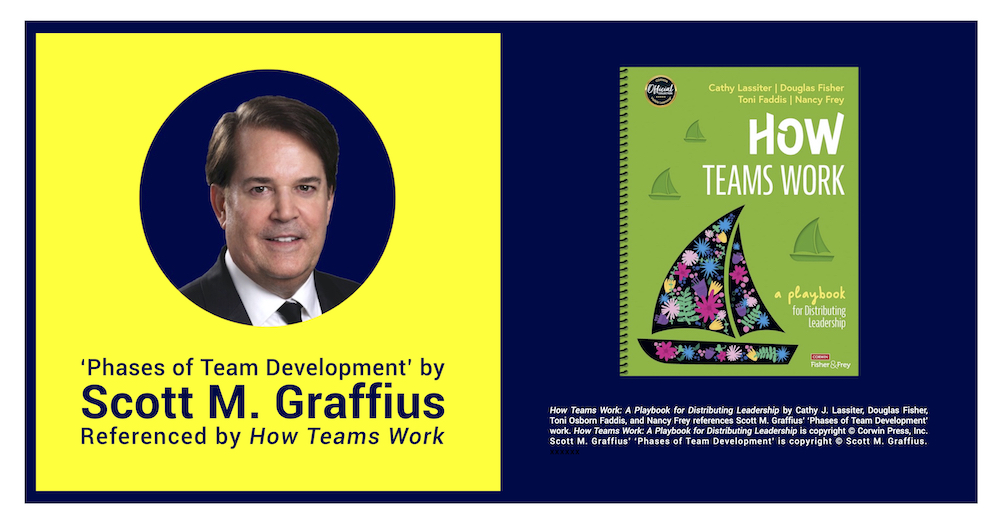

Informed by the research of Bruce W. Tuckman and Mary Ann C. Jensen, over 100 subsequent studies, and Scott M. Graffius’ first-hand professional experience with, and analysis of, team leadership and performance, Graffius created his ‘Phases of Team Development’ as a unique perspective and visual conveying the five phases of team development — Forming, Storming, Norming, Performing, and Adjourning — inclusive of a graph showing how performance varies by phase, as well as the characteristics and strategies for each phase.
Leaders of teams — Project Managers, Scrum Masters, Agile Coaches, DevOps Leads, and others — can apply the information to help handle challenges or issues experienced by teams. By doing so, they’ll advance the teams’ (and their own) happiness, productivity, and success.
Graffius initially developed the material in 2008, and he periodically refreshes it. For details on the current (2024) edition including permission request information, high resolution files, and more, visit here.
Graffius’ ‘Phases of Team Development’ work is used by businesses, professional associations, government agencies, and universities around the world. Examples include Yale University, IEEE, Constructor Institute (Switzerland), Adobe, Boston University, Amsterdam Public Health Research Institute, United States National Park Service, Bayer, University of Galway (Ireland), Hasso Plattner Institute (Germany), American Management Association, UC San Diego, and many more.
How Teams Work: A Playbook for Distributing Leadership was added to the list.
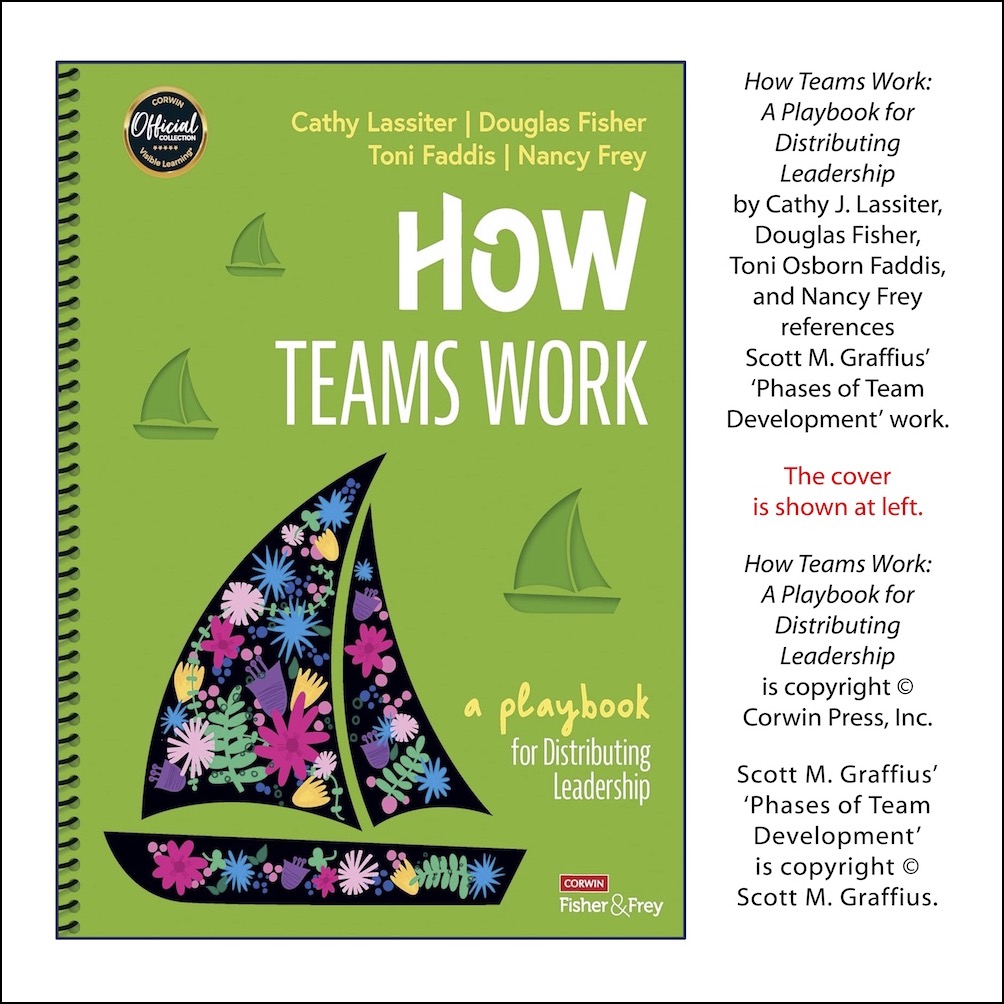
The cover image of the book is shown above.
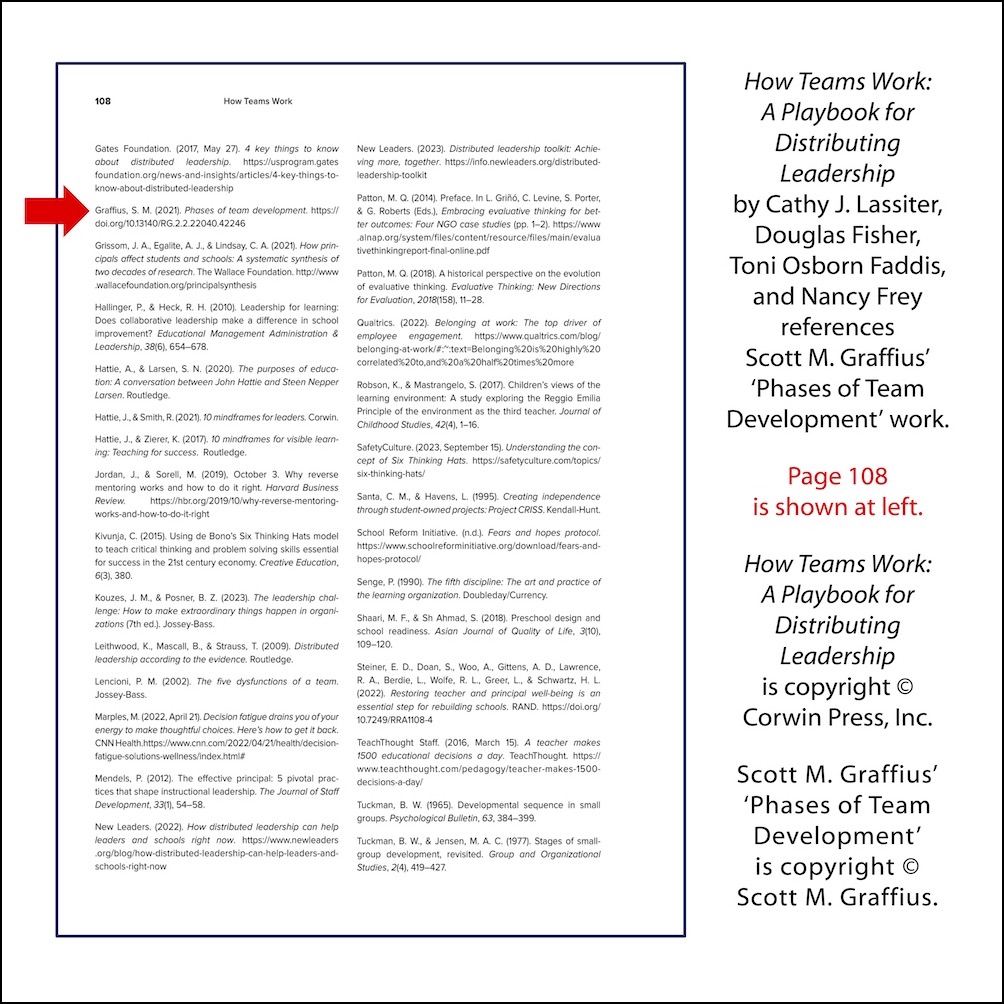
Page 108 from the book is shown above.
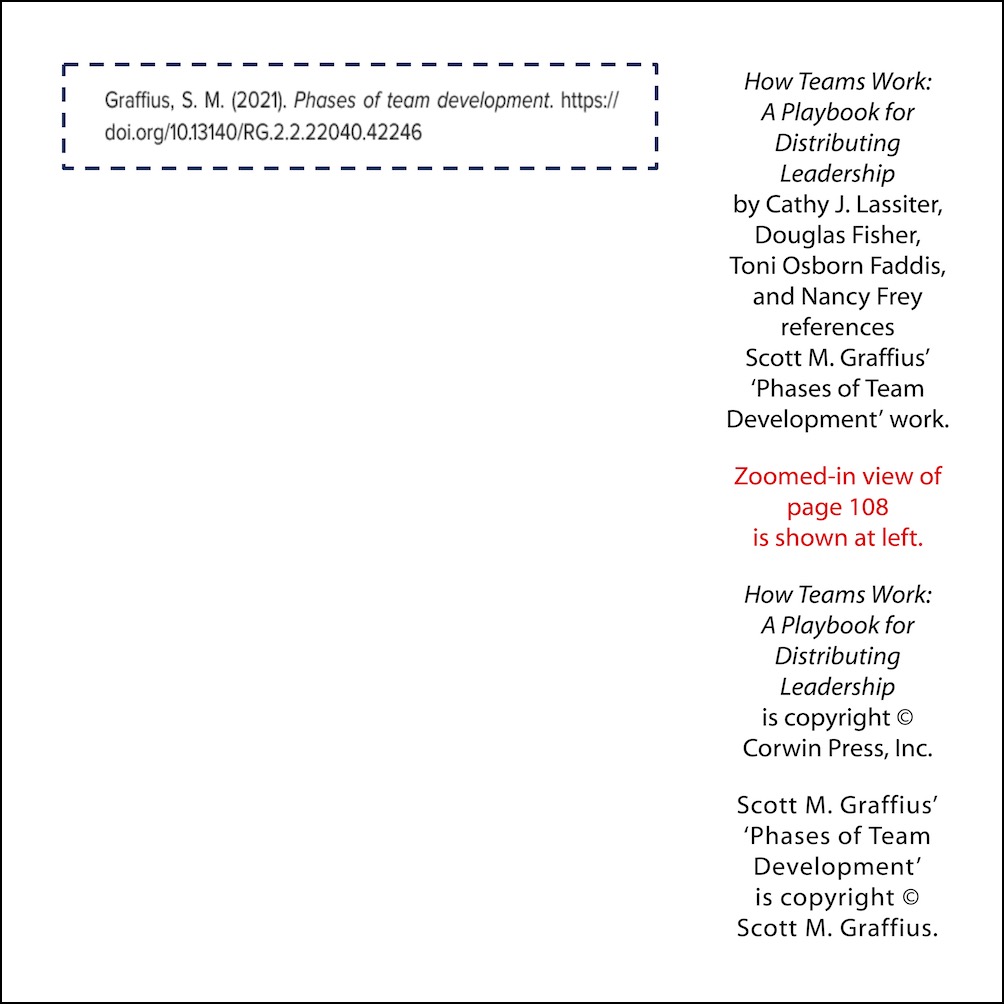
A zoomed-in view of page 108 from the book is shown above.
About How Teams Work: A Playbook for Distributing Leadership
From the product description: “Creating strong, cohesive teams is an art, and How Teams Work: A Playbook for Distributing Leadership is the essential guide for school leaders looking to master this craft. This interactive playbook doesn't just advise but actively equips leaders with the tools they need to foster trust, accountability, and engagement in their teams.”
How Teams Work: A Playbook for Distributing Leadership is available at Amazon and other sellers.
Google highlights the book here.
About the Authors
How Teams Work: A Playbook for Distributing Leadership was written by Cathy J. Lassiter, Douglas Fisher, Toni Osborn Faddis, and Nancy Frey.
Cathy Lassiter, Ed.D., is an international consultant with over 35 years of combined experience as a public school teacher, principal, central office administrator, and consultant. She is on X (stylized as 𝕏) at @cathy_lassiter. Visit here to learn more.
Douglas Fisher, Ph.D., is professor and chair of educational leadership at San Diego State University and a leader at Health Sciences High and Middle College. He is on X (stylized as 𝕏) at @DFISHERSDSU. Visit here to learn more.
Toni Faddis, EdD, is a Corwin author and full-time professional learning consultant. Additional information is available here. She is on X (stylized as 𝕏) at @ToniFaddis. Visit here to learn more.
Nancy Frey, Ph.D., is a professor in Educational Leadership at San Diego State University and a member of the International Literacy Association’s Literacy Research Panel. She is on X (stylized as 𝕏) at @ToniFaddis. Visit here to learn more.
Graffius Presents Unique and Compelling Talks and Workshops on High Performance Teams
Graffius has presented talks and workshops at 89 conferences and other events across 25 countries. While each session is unique, the top topic is high performance teams. In those sessions, he expands upon on his 'Phases of Team Development' work. Sessions are dynamic, engaging, and packed with fresh insights and usable information. They’re highly rated by attendees and organizers alike. Visit here to learn more.
How to Cite This Article
Graffius, Scott M. (2024, April 2). "How Teams Work" Book Referenced Scott M. Graffius' 'Phases of Team Development.' Available at: https://scottgraffius.com/blog/files/htw.html. DOI: 10.13140/RG.2.2.23495.51368.




About Scott M. Graffius

Scott M. Graffius, PMP, SA, CSP-SM, CSP-PO, CSM, CSPO, ITIL, LSSGB is an agile project management practitioner, consultant, thinker, creator, multi-award-winning author, and international public speaker. Founder and CEO of Exceptional PPM and PMO Solutions™ and subsidiary Exceptional Agility™, he has generated over $1.9 billion for Global Fortune 500 businesses and other organizations he has served. Graffius and content from his books, talks, workshops, and more have been featured and used by Microsoft, Oracle, Broadcom, Cisco, Gartner, Project Management Institute, IEEE, National Academy of Sciences, United States Department of Energy, Yale University, Tufts University, and others. He delights audiences with dynamic and engaging talks and workshops on agile project management, AI, Tech leadership, video game development, strategic alignment, the science of high performance teams, and more. To date, he's presented sessions at 89 conferences and other events across 25 countries.
His full bio is available here.
Connect with Scott on:



About Agile Scrum: Your Quick Start Guide with Step-by-Step Instructions

Shifting customer needs are common in today's marketplace. Businesses must be adaptive and responsive to change while delivering an exceptional customer experience to be competitive.
There are a variety of frameworks supporting the development of products and services, and most approaches fall into one of two broad categories: traditional or agile. Traditional practices such as waterfall engage sequential development, while agile involves iterative and incremental deliverables. Organizations are increasingly embracing agile to manage projects, and best meet their business needs of rapid response to change, fast delivery speed, and more.
With clear and easy to follow step-by-step instructions, Scott M. Graffius's award-winning Agile Scrum: Your Quick Start Guide with Step-by-Step Instructions helps the reader:
Hailed by Literary Titan as “the book highlights the versatility of Scrum beautifully.”
Winner of 17 first place awards.
Agile Scrum: Your Quick Start Guide with Step-by-Step Instructions is available in paperback and ebook/Kindle in the United States and around the world. Some links by country follow.

About Agile Transformation: A Brief Story of How an Entertainment Company Developed New Capabilities and Unlocked Business Agility to Thrive in an Era of Rapid Change

Thriving in today's marketplace frequently depends on making a transformation to become more agile. Those successful in the transition enjoy faster delivery speed and ROI, higher satisfaction, continuous improvement, and additional benefits.
Based on actual events, Agile Transformation: A Brief Story of How an Entertainment Company Developed New Capabilities and Unlocked Business Agility to Thrive in an Era of Rapid Change provides a quick (60-90 minute) read about a successful agile transformation at a multinational entertainment and media company, told from the author's perspective as an agile coach.
The award-winning book by Scott M. Graffius is available in paperback and ebook/Kindle in the United States and around the world. Some links by country follow.

The short link for this article is: https://bit.ly/htw-2024 .
© Copyright 2024 Scott M. Graffius. All rights reserved. This material may not be published, broadcast, rewritten or redistributed without the express written permission of Scott M. Graffius.



Informed by the research of Bruce W. Tuckman and Mary Ann C. Jensen, over 100 subsequent studies, and Scott M. Graffius’ first-hand professional experience with, and analysis of, team leadership and performance, Graffius created his ‘Phases of Team Development’ as a unique perspective and visual conveying the five phases of team development — Forming, Storming, Norming, Performing, and Adjourning — inclusive of a graph showing how performance varies by phase, as well as the characteristics and strategies for each phase.
Leaders of teams — Project Managers, Scrum Masters, Agile Coaches, DevOps Leads, and others — can apply the information to help handle challenges or issues experienced by teams. By doing so, they’ll advance the teams’ (and their own) happiness, productivity, and success.
Graffius initially developed the material in 2008, and he periodically refreshes it. For details on the current (2024) edition including permission request information, high resolution files, and more, visit here.
Graffius’ ‘Phases of Team Development’ work is used by businesses, professional associations, government agencies, and universities around the world. Examples include Yale University, IEEE, Constructor Institute (Switzerland), Adobe, Boston University, Amsterdam Public Health Research Institute, United States National Park Service, Bayer, University of Galway (Ireland), Hasso Plattner Institute (Germany), American Management Association, UC San Diego, and many more.
How Teams Work: A Playbook for Distributing Leadership was added to the list.

The cover image of the book is shown above.

Page 108 from the book is shown above.

A zoomed-in view of page 108 from the book is shown above.
About How Teams Work: A Playbook for Distributing Leadership
From the product description: “Creating strong, cohesive teams is an art, and How Teams Work: A Playbook for Distributing Leadership is the essential guide for school leaders looking to master this craft. This interactive playbook doesn't just advise but actively equips leaders with the tools they need to foster trust, accountability, and engagement in their teams.”
How Teams Work: A Playbook for Distributing Leadership is available at Amazon and other sellers.
Google highlights the book here.
About the Authors
How Teams Work: A Playbook for Distributing Leadership was written by Cathy J. Lassiter, Douglas Fisher, Toni Osborn Faddis, and Nancy Frey.
Cathy Lassiter, Ed.D., is an international consultant with over 35 years of combined experience as a public school teacher, principal, central office administrator, and consultant. She is on X (stylized as 𝕏) at @cathy_lassiter. Visit here to learn more.
Douglas Fisher, Ph.D., is professor and chair of educational leadership at San Diego State University and a leader at Health Sciences High and Middle College. He is on X (stylized as 𝕏) at @DFISHERSDSU. Visit here to learn more.
Toni Faddis, EdD, is a Corwin author and full-time professional learning consultant. Additional information is available here. She is on X (stylized as 𝕏) at @ToniFaddis. Visit here to learn more.
Nancy Frey, Ph.D., is a professor in Educational Leadership at San Diego State University and a member of the International Literacy Association’s Literacy Research Panel. She is on X (stylized as 𝕏) at @ToniFaddis. Visit here to learn more.
Graffius Presents Unique and Compelling Talks and Workshops on High Performance Teams
Graffius has presented talks and workshops at 89 conferences and other events across 25 countries. While each session is unique, the top topic is high performance teams. In those sessions, he expands upon on his 'Phases of Team Development' work. Sessions are dynamic, engaging, and packed with fresh insights and usable information. They’re highly rated by attendees and organizers alike. Visit here to learn more.
How to Cite This Article
Graffius, Scott M. (2024, April 2). "How Teams Work" Book Referenced Scott M. Graffius' 'Phases of Team Development.' Available at: https://scottgraffius.com/blog/files/htw.html. DOI: 10.13140/RG.2.2.23495.51368.




About Scott M. Graffius

Scott M. Graffius, PMP, SA, CSP-SM, CSP-PO, CSM, CSPO, ITIL, LSSGB is an agile project management practitioner, consultant, thinker, creator, multi-award-winning author, and international public speaker. Founder and CEO of Exceptional PPM and PMO Solutions™ and subsidiary Exceptional Agility™, he has generated over $1.9 billion for Global Fortune 500 businesses and other organizations he has served. Graffius and content from his books, talks, workshops, and more have been featured and used by Microsoft, Oracle, Broadcom, Cisco, Gartner, Project Management Institute, IEEE, National Academy of Sciences, United States Department of Energy, Yale University, Tufts University, and others. He delights audiences with dynamic and engaging talks and workshops on agile project management, AI, Tech leadership, video game development, strategic alignment, the science of high performance teams, and more. To date, he's presented sessions at 89 conferences and other events across 25 countries.
His full bio is available here.
Connect with Scott on:



About Agile Scrum: Your Quick Start Guide with Step-by-Step Instructions

Shifting customer needs are common in today's marketplace. Businesses must be adaptive and responsive to change while delivering an exceptional customer experience to be competitive.
There are a variety of frameworks supporting the development of products and services, and most approaches fall into one of two broad categories: traditional or agile. Traditional practices such as waterfall engage sequential development, while agile involves iterative and incremental deliverables. Organizations are increasingly embracing agile to manage projects, and best meet their business needs of rapid response to change, fast delivery speed, and more.
With clear and easy to follow step-by-step instructions, Scott M. Graffius's award-winning Agile Scrum: Your Quick Start Guide with Step-by-Step Instructions helps the reader:
- Implement and use the most popular agile framework―Scrum;
- Deliver products in short cycles with rapid adaptation to change, fast time-to-market, and continuous improvement; and
- Support innovation and drive competitive advantage.
Hailed by Literary Titan as “the book highlights the versatility of Scrum beautifully.”
Winner of 17 first place awards.
Agile Scrum: Your Quick Start Guide with Step-by-Step Instructions is available in paperback and ebook/Kindle in the United States and around the world. Some links by country follow.
- 🇧🇷 Brazil
- 🇨🇦 Canada
- 🇨🇿 Czech Republic
- 🇩🇰 Denmark
- 🇫🇮 Finland
- 🇫🇷 France
- 🇩🇪 Germany
- 🇬🇷 Greece
- 🇭🇺 Hungary
- 🇮🇳 India
- 🇮🇪 Ireland
- 🇮🇱 Israel
- 🇮🇹 Italy
- 🇯🇵 Japan
- 🇱🇺 Luxembourg
- 🇲🇽 Mexico
- 🇳🇱 Netherlands
- 🇳🇿 New Zealand
- 🇳🇴 Norway
- 🇪🇸 Spain
- 🇸🇪 Sweden
- 🇨🇭 Switzerland
- 🇦🇪 UAE
- 🇬🇧 United Kingdom
- 🇺🇸 United States

About Agile Transformation: A Brief Story of How an Entertainment Company Developed New Capabilities and Unlocked Business Agility to Thrive in an Era of Rapid Change

Thriving in today's marketplace frequently depends on making a transformation to become more agile. Those successful in the transition enjoy faster delivery speed and ROI, higher satisfaction, continuous improvement, and additional benefits.
Based on actual events, Agile Transformation: A Brief Story of How an Entertainment Company Developed New Capabilities and Unlocked Business Agility to Thrive in an Era of Rapid Change provides a quick (60-90 minute) read about a successful agile transformation at a multinational entertainment and media company, told from the author's perspective as an agile coach.
The award-winning book by Scott M. Graffius is available in paperback and ebook/Kindle in the United States and around the world. Some links by country follow.
- 🇦🇺 Australia
- 🇦🇹 Austria
- 🇧🇷 Brazil
- 🇨🇦 Canada
- 🇨🇿 Czech Republic
- 🇩🇰 Denmark
- 🇫🇮 Finland
- 🇫🇷 France
- 🇩🇪 Germany
- 🇬🇷 Greece
- 🇮🇳 India
- 🇮🇪 Ireland
- 🇯🇵 Japan
- 🇱🇺 Luxembourg
- 🇲🇽 Mexico
- 🇳🇱 Netherlands
- 🇳🇿 New Zealand
- 🇪🇸 Spain
- 🇸🇪 Sweden
- 🇨🇭 Switzerland
- 🇦🇪 United Arab Emirates
- 🇬🇧 United Kingdom
- 🇺🇸 United States

The short link for this article is: https://bit.ly/htw-2024 .
© Copyright 2024 Scott M. Graffius. All rights reserved. This material may not be published, broadcast, rewritten or redistributed without the express written permission of Scott M. Graffius.

Cisco Features Scott M. Graffius' 'Phases of Team Development' Work
05 April 2024
BY SCOTT M. GRAFFIUS | ScottGraffius.com
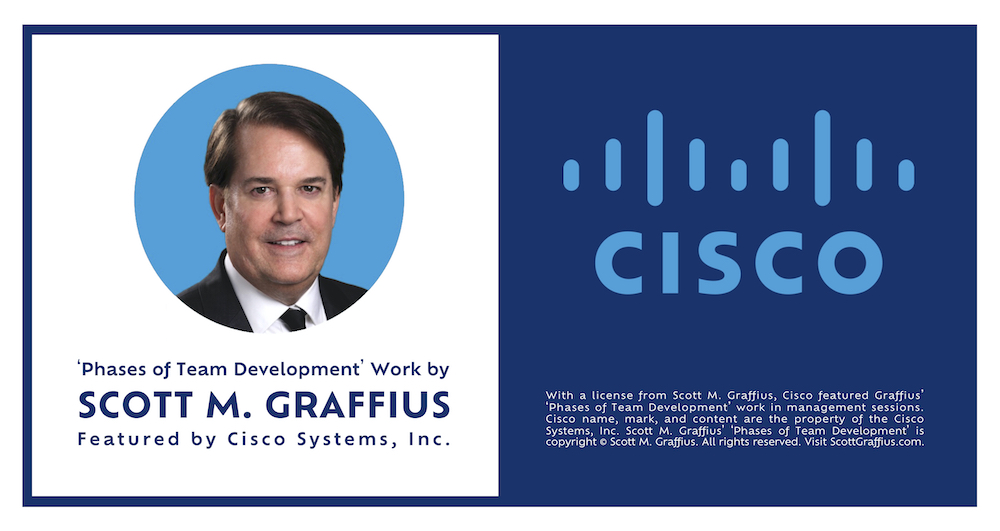

Informed by the research of Bruce W. Tuckman and Mary Ann C. Jensen, over 100 subsequent studies, and Scott M. Graffius' first-hand professional experience with, and analysis of, team leadership and performance, Graffius created his 'Phases of Team Development' as a unique perspective and visual conveying the five phases of team development — Forming, Storming, Norming, Performing, and Adjourning — inclusive of a graph showing how performance varies by phase, as well as the characteristics and strategies for each phase.
Leaders of teams — Project Managers, Scrum Masters, Agile Coaches, DevOps Leads, and others — can apply the information to help handle challenges or issues experienced by teams. By doing so, they’ll advance the teams’ (and their own) happiness, productivity, and success.
Graffius initially developed the material in 2008, and he periodically refreshes it. For details on the current (2024) edition including permission request information, high resolution files, and more, visit here.
Graffius’ ‘Phases of Team Development’ work is used by businesses, professional associations, government agencies, and universities around the world. Examples include Yale University, IEEE, Constructor Institute (Switzerland), Adobe, Boston University, Amsterdam Public Health Research Institute, United States National Park Service, Bayer, Ford, University of Galway (Ireland), Hasso Plattner Institute (Germany), American Management Association, UC San Diego, and many more.
Cisco was added to the list.
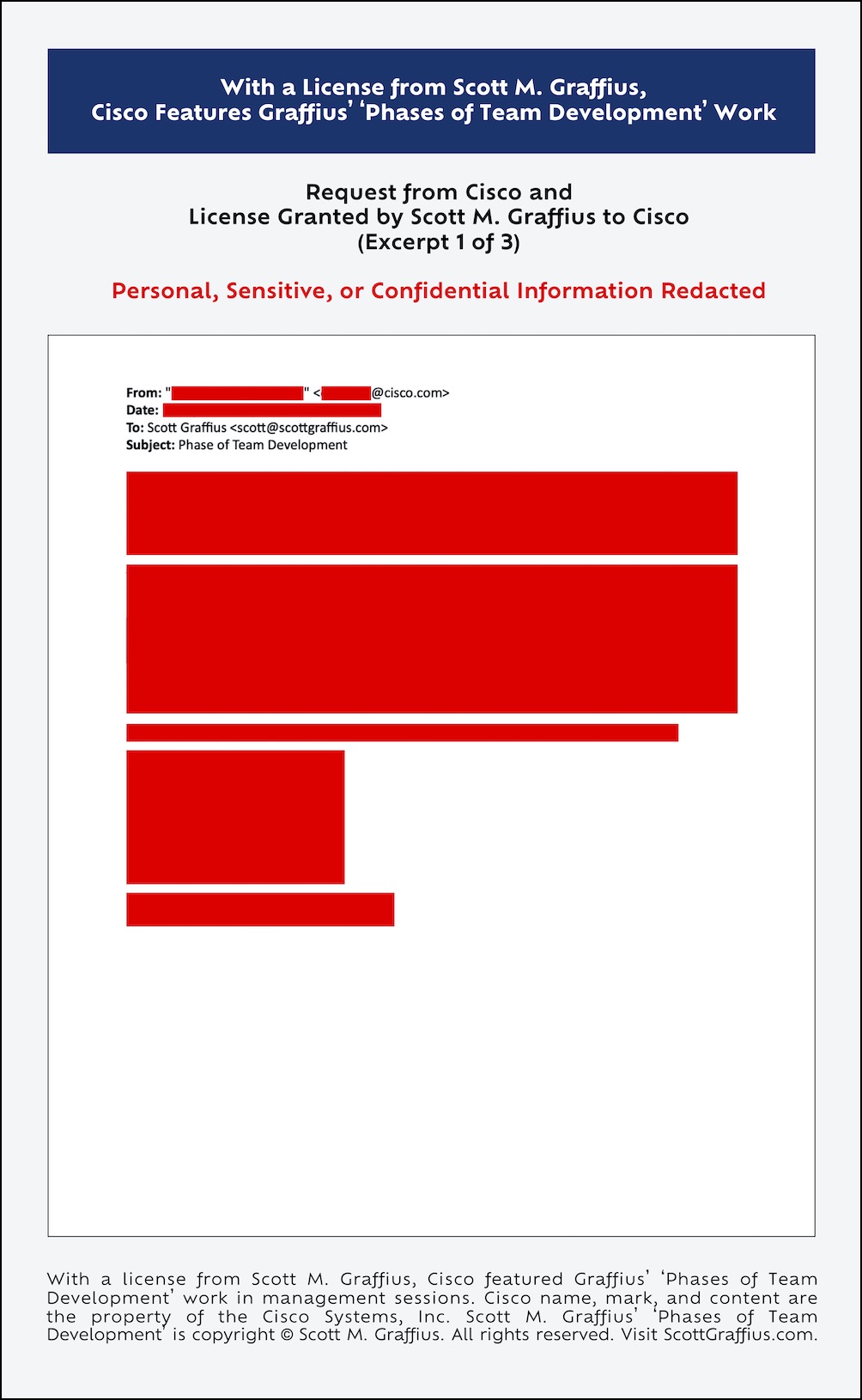
Excerpt 1 of the request from Cisco and the license granted by Scott M. Graffius to Cisco is above.
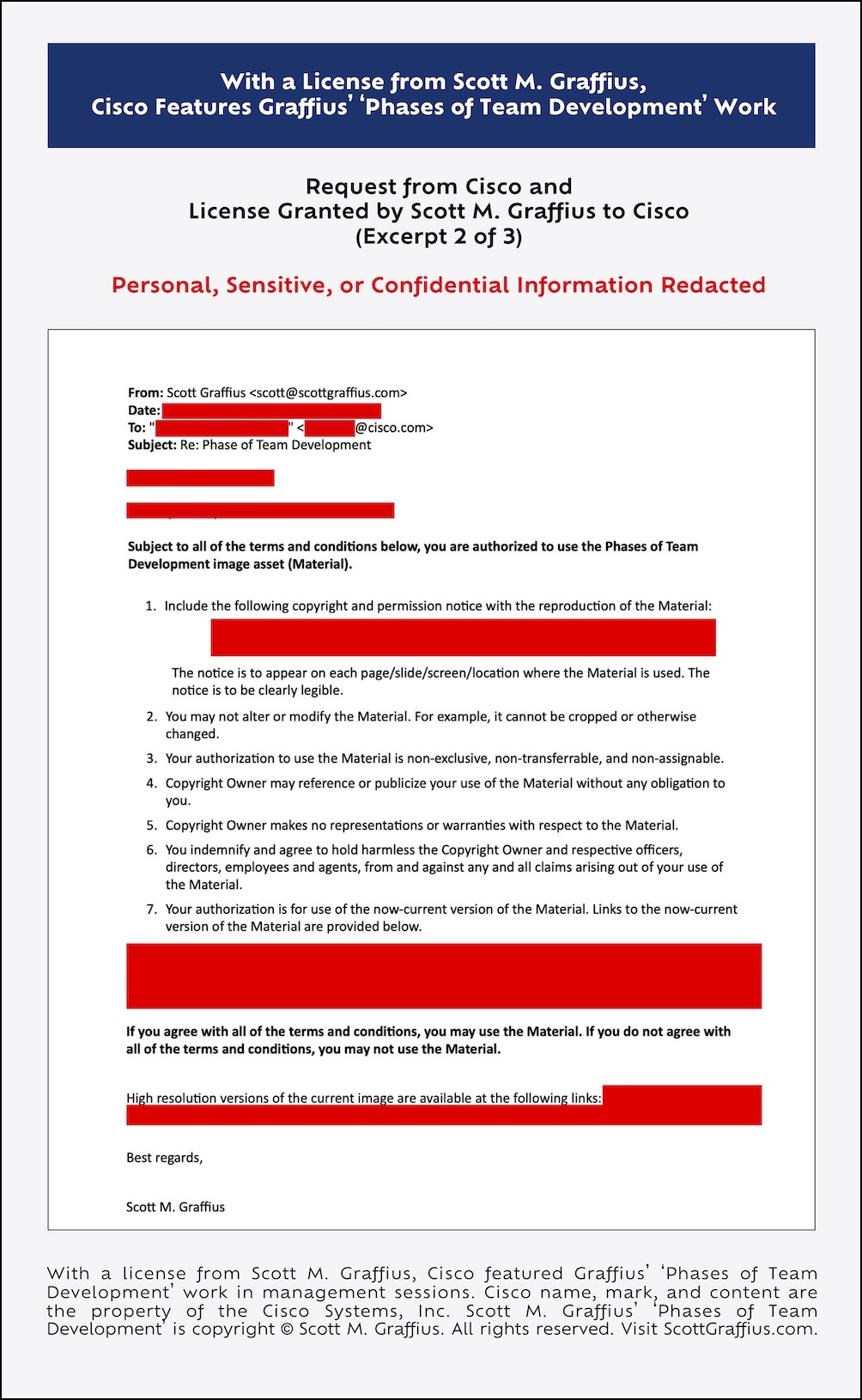
Excerpt 2 of the request from Cisco and the license granted by Scott M. Graffius to Cisco is above.
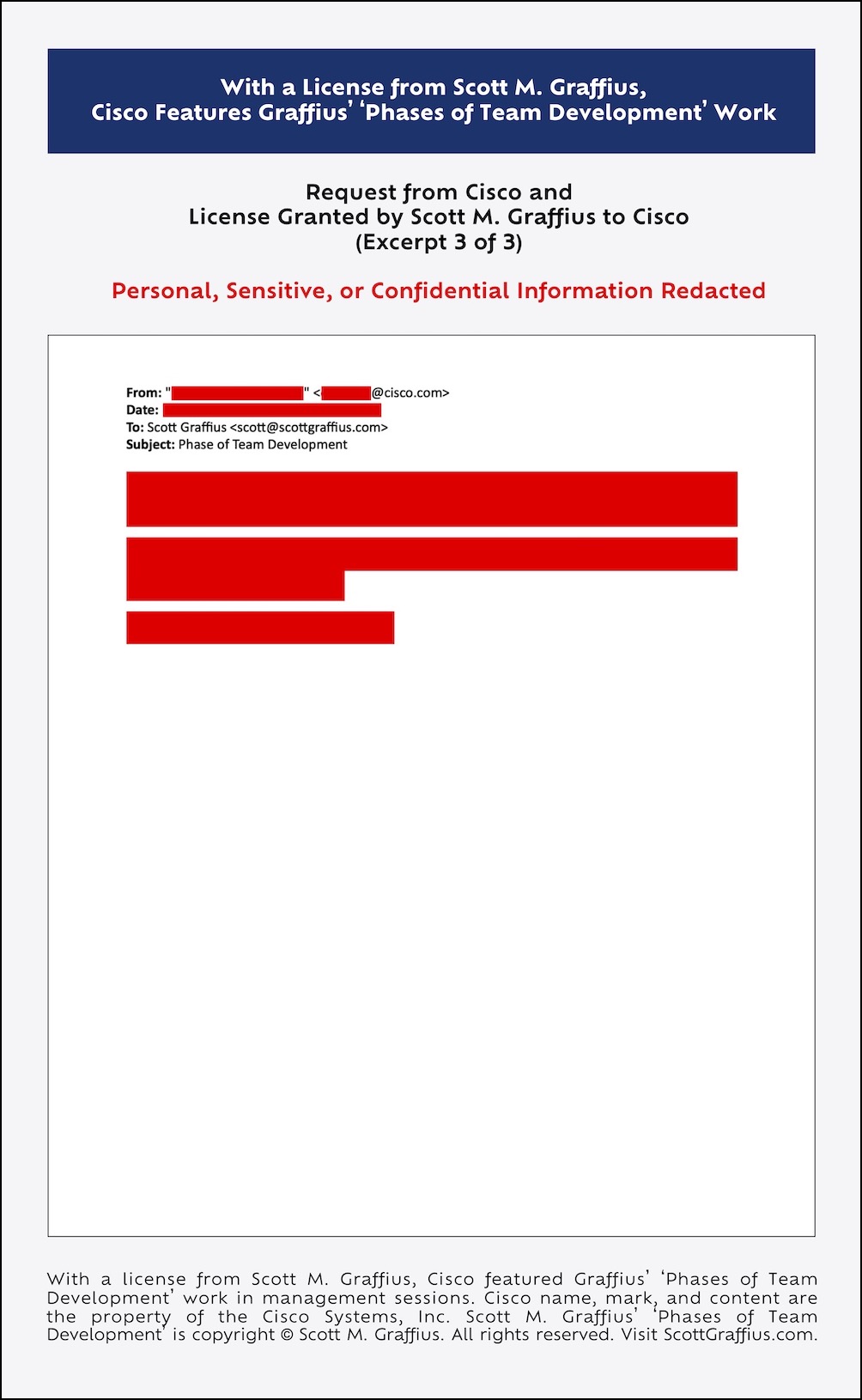
Excerpt 3 of the request from Cisco and the license granted by Scott M. Graffius to Cisco is above.
About Cisco
Cisco is an American multinational digital communications technology conglomerate corporation headquartered in San Jose, California. It develops, manufactures, and sells networking hardware, software, telecommunications equipment, and other high-technology services and products. Visit https://www.cisco.com to learn more.
How to Cite This Article
Graffius, Scott M. (2024, April 5). Cisco Features Scott M. Graffius' 'Phases of Team Development' Work' Available at: https://scottgraffius.com/blog/files/cisco-2024.html. DOI: 10.13140/RG.2.2.16689.60000.




About Scott M. Graffius

Scott M. Graffius, PMP, SA, CSP-SM, CSP-PO, CSM, CSPO, ITIL, LSSGB is an agile project management practitioner, consultant, thinker, creator, multi-award-winning author, and international public speaker. Founder and CEO of Exceptional PPM and PMO Solutions™ and subsidiary Exceptional Agility™, he has generated over $1.9 billion for Global Fortune 500 businesses and other organizations he has served. Graffius and content from his books, talks, workshops, and more have been featured and used by Microsoft, Oracle, Broadcom, Cisco, Gartner, Project Management Institute, IEEE, National Academy of Sciences, United States Department of Energy, Yale University, Tufts University, and others. He delights audiences with dynamic and engaging talks and workshops on agile project management, AI, Tech leadership, video game development, strategic alignment, the science of high performance teams, and more. To date, he's presented sessions at 89 conferences and other events across 25 countries.
His full bio is available here.
Connect with Scott on:



About Agile Scrum: Your Quick Start Guide with Step-by-Step Instructions

Shifting customer needs are common in today's marketplace. Businesses must be adaptive and responsive to change while delivering an exceptional customer experience to be competitive.
There are a variety of frameworks supporting the development of products and services, and most approaches fall into one of two broad categories: traditional or agile. Traditional practices such as waterfall engage sequential development, while agile involves iterative and incremental deliverables. Organizations are increasingly embracing agile to manage projects, and best meet their business needs of rapid response to change, fast delivery speed, and more.
With clear and easy to follow step-by-step instructions, Scott M. Graffius's award-winning Agile Scrum: Your Quick Start Guide with Step-by-Step Instructions helps the reader:
Hailed by Literary Titan as “the book highlights the versatility of Scrum beautifully.”
Winner of 17 first place awards.
Agile Scrum: Your Quick Start Guide with Step-by-Step Instructions is available in paperback and ebook/Kindle in the United States and around the world. Some links by country follow.

About Agile Transformation: A Brief Story of How an Entertainment Company Developed New Capabilities and Unlocked Business Agility to Thrive in an Era of Rapid Change

Thriving in today's marketplace frequently depends on making a transformation to become more agile. Those successful in the transition enjoy faster delivery speed and ROI, higher satisfaction, continuous improvement, and additional benefits.
Based on actual events, Agile Transformation: A Brief Story of How an Entertainment Company Developed New Capabilities and Unlocked Business Agility to Thrive in an Era of Rapid Change provides a quick (60-90 minute) read about a successful agile transformation at a multinational entertainment and media company, told from the author's perspective as an agile coach.
The award-winning book by Scott M. Graffius is available in paperback and ebook/Kindle in the United States and around the world. Some links by country follow.

© Copyright 2024 Scott M. Graffius. All rights reserved. This material may not be published, broadcast, rewritten or redistributed without the express written permission of Scott M. Graffius.



Informed by the research of Bruce W. Tuckman and Mary Ann C. Jensen, over 100 subsequent studies, and Scott M. Graffius' first-hand professional experience with, and analysis of, team leadership and performance, Graffius created his 'Phases of Team Development' as a unique perspective and visual conveying the five phases of team development — Forming, Storming, Norming, Performing, and Adjourning — inclusive of a graph showing how performance varies by phase, as well as the characteristics and strategies for each phase.
Leaders of teams — Project Managers, Scrum Masters, Agile Coaches, DevOps Leads, and others — can apply the information to help handle challenges or issues experienced by teams. By doing so, they’ll advance the teams’ (and their own) happiness, productivity, and success.
Graffius initially developed the material in 2008, and he periodically refreshes it. For details on the current (2024) edition including permission request information, high resolution files, and more, visit here.
Graffius’ ‘Phases of Team Development’ work is used by businesses, professional associations, government agencies, and universities around the world. Examples include Yale University, IEEE, Constructor Institute (Switzerland), Adobe, Boston University, Amsterdam Public Health Research Institute, United States National Park Service, Bayer, Ford, University of Galway (Ireland), Hasso Plattner Institute (Germany), American Management Association, UC San Diego, and many more.
Cisco was added to the list.

Excerpt 1 of the request from Cisco and the license granted by Scott M. Graffius to Cisco is above.

Excerpt 2 of the request from Cisco and the license granted by Scott M. Graffius to Cisco is above.

Excerpt 3 of the request from Cisco and the license granted by Scott M. Graffius to Cisco is above.
About Cisco
Cisco is an American multinational digital communications technology conglomerate corporation headquartered in San Jose, California. It develops, manufactures, and sells networking hardware, software, telecommunications equipment, and other high-technology services and products. Visit https://www.cisco.com to learn more.
How to Cite This Article
Graffius, Scott M. (2024, April 5). Cisco Features Scott M. Graffius' 'Phases of Team Development' Work' Available at: https://scottgraffius.com/blog/files/cisco-2024.html. DOI: 10.13140/RG.2.2.16689.60000.




About Scott M. Graffius

Scott M. Graffius, PMP, SA, CSP-SM, CSP-PO, CSM, CSPO, ITIL, LSSGB is an agile project management practitioner, consultant, thinker, creator, multi-award-winning author, and international public speaker. Founder and CEO of Exceptional PPM and PMO Solutions™ and subsidiary Exceptional Agility™, he has generated over $1.9 billion for Global Fortune 500 businesses and other organizations he has served. Graffius and content from his books, talks, workshops, and more have been featured and used by Microsoft, Oracle, Broadcom, Cisco, Gartner, Project Management Institute, IEEE, National Academy of Sciences, United States Department of Energy, Yale University, Tufts University, and others. He delights audiences with dynamic and engaging talks and workshops on agile project management, AI, Tech leadership, video game development, strategic alignment, the science of high performance teams, and more. To date, he's presented sessions at 89 conferences and other events across 25 countries.
His full bio is available here.
Connect with Scott on:



About Agile Scrum: Your Quick Start Guide with Step-by-Step Instructions

Shifting customer needs are common in today's marketplace. Businesses must be adaptive and responsive to change while delivering an exceptional customer experience to be competitive.
There are a variety of frameworks supporting the development of products and services, and most approaches fall into one of two broad categories: traditional or agile. Traditional practices such as waterfall engage sequential development, while agile involves iterative and incremental deliverables. Organizations are increasingly embracing agile to manage projects, and best meet their business needs of rapid response to change, fast delivery speed, and more.
With clear and easy to follow step-by-step instructions, Scott M. Graffius's award-winning Agile Scrum: Your Quick Start Guide with Step-by-Step Instructions helps the reader:
- Implement and use the most popular agile framework―Scrum;
- Deliver products in short cycles with rapid adaptation to change, fast time-to-market, and continuous improvement; and
- Support innovation and drive competitive advantage.
Hailed by Literary Titan as “the book highlights the versatility of Scrum beautifully.”
Winner of 17 first place awards.
Agile Scrum: Your Quick Start Guide with Step-by-Step Instructions is available in paperback and ebook/Kindle in the United States and around the world. Some links by country follow.
- 🇧🇷 Brazil
- 🇨🇦 Canada
- 🇨🇿 Czech Republic
- 🇩🇰 Denmark
- 🇫🇮 Finland
- 🇫🇷 France
- 🇩🇪 Germany
- 🇬🇷 Greece
- 🇭🇺 Hungary
- 🇮🇳 India
- 🇮🇪 Ireland
- 🇮🇱 Israel
- 🇮🇹 Italy
- 🇯🇵 Japan
- 🇱🇺 Luxembourg
- 🇲🇽 Mexico
- 🇳🇱 Netherlands
- 🇳🇿 New Zealand
- 🇳🇴 Norway
- 🇪🇸 Spain
- 🇸🇪 Sweden
- 🇨🇭 Switzerland
- 🇦🇪 UAE
- 🇬🇧 United Kingdom
- 🇺🇸 United States

About Agile Transformation: A Brief Story of How an Entertainment Company Developed New Capabilities and Unlocked Business Agility to Thrive in an Era of Rapid Change

Thriving in today's marketplace frequently depends on making a transformation to become more agile. Those successful in the transition enjoy faster delivery speed and ROI, higher satisfaction, continuous improvement, and additional benefits.
Based on actual events, Agile Transformation: A Brief Story of How an Entertainment Company Developed New Capabilities and Unlocked Business Agility to Thrive in an Era of Rapid Change provides a quick (60-90 minute) read about a successful agile transformation at a multinational entertainment and media company, told from the author's perspective as an agile coach.
The award-winning book by Scott M. Graffius is available in paperback and ebook/Kindle in the United States and around the world. Some links by country follow.
- 🇦🇺 Australia
- 🇦🇹 Austria
- 🇧🇷 Brazil
- 🇨🇦 Canada
- 🇨🇿 Czech Republic
- 🇩🇰 Denmark
- 🇫🇮 Finland
- 🇫🇷 France
- 🇩🇪 Germany
- 🇬🇷 Greece
- 🇮🇳 India
- 🇮🇪 Ireland
- 🇯🇵 Japan
- 🇱🇺 Luxembourg
- 🇲🇽 Mexico
- 🇳🇱 Netherlands
- 🇳🇿 New Zealand
- 🇪🇸 Spain
- 🇸🇪 Sweden
- 🇨🇭 Switzerland
- 🇦🇪 United Arab Emirates
- 🇬🇧 United Kingdom
- 🇺🇸 United States

© Copyright 2024 Scott M. Graffius. All rights reserved. This material may not be published, broadcast, rewritten or redistributed without the express written permission of Scott M. Graffius.

Graffius' 'Phases of Team Development' Featured by TAG at TBS24 Conference in Zermatt Switzerland
25 April 2024
BY SCOTT M. GRAFFIUS | ScottGraffius.com
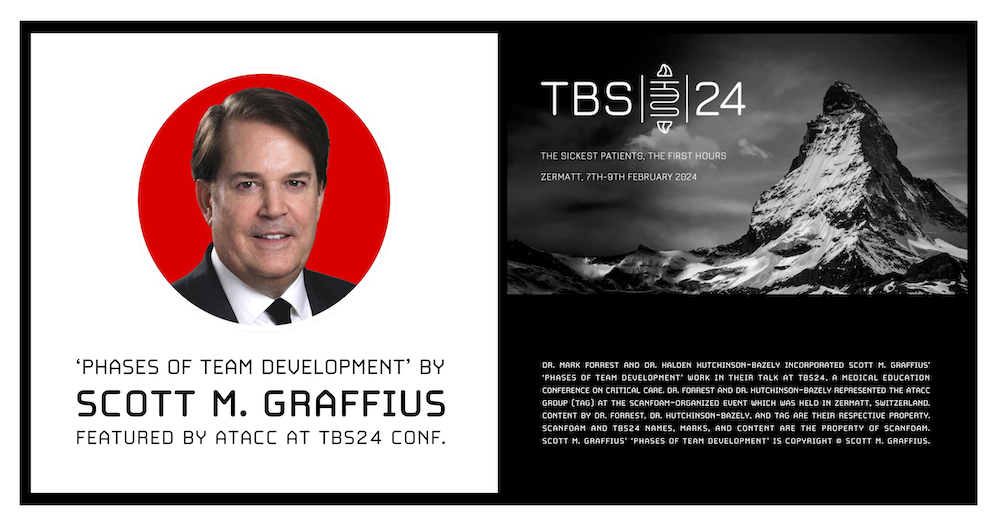

Informed by the research of Bruce W. Tuckman and Mary Ann C. Jensen, over 100 subsequent studies, and Scott M. Graffius' first-hand professional experience with, and analysis of, team leadership and performance, Graffius created his 'Phases of Team Development' as a unique perspective and visual conveying the five phases of team development — Forming, Storming, Norming, Performing, and Adjourning — inclusive of a graph showing how performance varies by phase, as well as the characteristics and strategies for each phase.
Leaders of teams can apply the information to help handle challenges or issues experienced by teams. By doing so, they’ll advance the teams' (and their own) happiness, productivity, and success.
Graffius initially developed the material in 2008, and he periodically refreshes it. For details on the current (2024) edition including permission request information, high resolution files, and more, visit here.
Graffius' 'Phases of Team Development' work is used by businesses, professional associations, government agencies, and universities around the world. Examples include Yale University, IEEE, Constructor Institute (Switzerland), Adobe, Boston University, Amsterdam Public Health Research Institute, United States National Park Service, Cisco, Bayer, Ford, University of Galway (Ireland), Hasso Plattner Institute (Germany), American Management Association, UC San Diego, and many more.
The ATACC Group (TAG) was added to the list. Dr. Mark Forrest and Dr. Halden Hutchinson-Bazely from TAG incorporated Graffius' 'Phases of Team Development' in their talk at TBS24 in Zermatt, Switzerland.
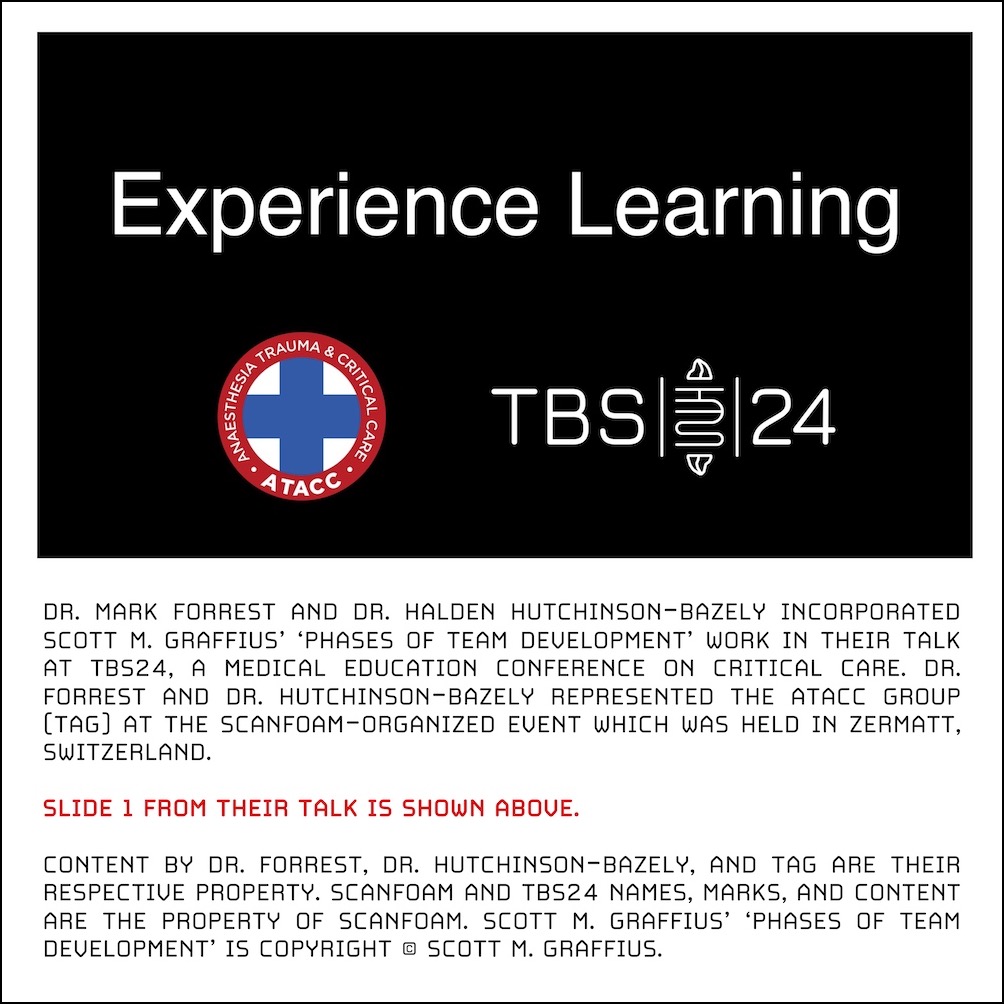
Slide 1 from their talk is shown above.
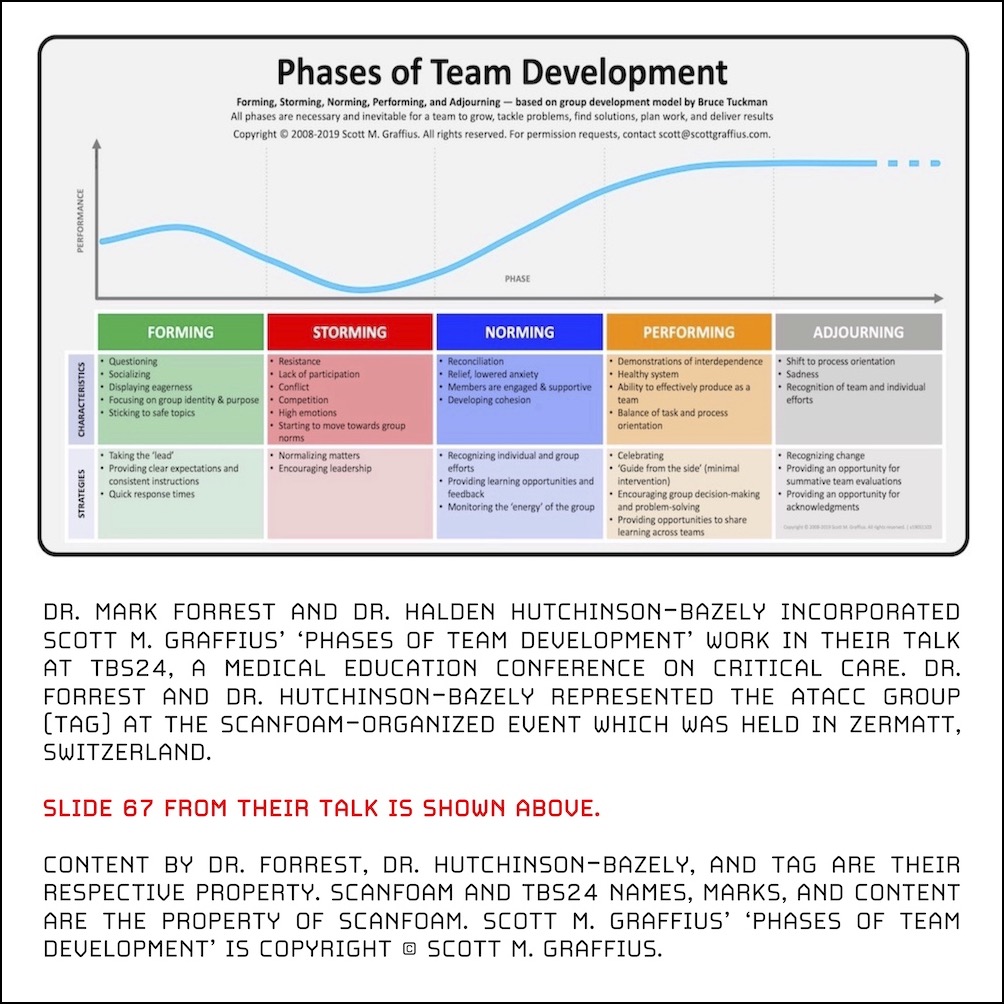
Slide 67 from their talk — which featured the 2019 edition of Graffius' 'Phases of Team Development' — is shown above. (For details on the current [2024] edition of Graffius' work including permission request information, high resolution files, and more, visit here.)
A recording of their session is on YouTube.
About Dr. Mark Forrest
The following includes content from https://scanfoam.org/tbs24.
Dr. Mark Forrest is a consultant in anaesthetics, critical care, prehospital care from the North West of England and Associate Medical Director in his NHS Trust. He has over 35 years of experience in these fields and has additional experience in aeromedical retrieval (including Paeds and ECMO), diving/hyperbaric medicine, and tactical medicine. Dr. Forrest flies as a consultant on HeliMed 29 and responds on a day-to-day basis as a 'Fire & Rescue Doctor.' He is passionate about trauma and critical care, especially in the prehospital arena and has a specialist interest in vehicle extrication as a Road Traffic Collision Extrication Instructor and Clinical Advisor to the National Fire Service College.
Dr. Forrest was the first appointed Medical Director for Fire & Rescue in the UK, over 17 years ago and now directs 9 UK Police Forces and 3 Fire and Rescue Services, through the ATACC Group.
Dr. Forrest is the Founder and Medical Director of the internationally renowned ATACC (Anesthesia Trauma and Critical Care) course and he is the First President of the Faculty of Trauma & Critical Care. He is an advocate for immersive simulation, unique training and innovation and has written over 20 varied courses for The ATACC Group as a Royal College Surgeons (London) Education Centre.
About Dr. Halden Hutchinson-Bazely
The following includes content from https://scanfoam.org/tbs24.
Dr. Halden Hutchinson-Bazely is an intensive care medicine doctor and pre hospital emergency medicine doctor in the UK. He works in a large, major trauma centre ICU, and he is a Helicopter Emergency Medical System (HEMS) doctor at East Anglian Air Ambulance (EAAA).
Dr. Hutchinson-Bazely is committed to delivering contemporary and compassionate critical care, and supporting others to do the same, so much of his non-clinical work is education. He is a faculty member at EAAA, where he specializes in endovascular resuscitation techniques. Dr. Hutchinson-Bazely is also part of the faculty for the international Endovascular Trauma Management (EVTM) society. His main commitment to education is as a deputy medical director for ATACC, where he co-directs the ATACC course.
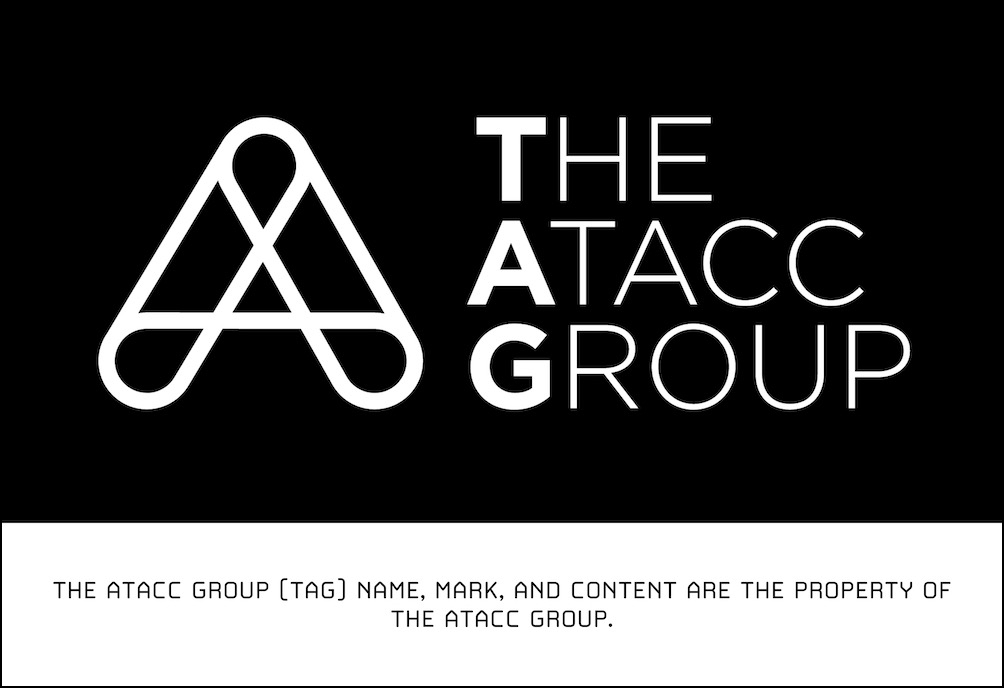
About The ATACC Group
The ATACC Group (TAG) is known for providing high quality first aid, clinical and medical education and training to every level of provider involved in patient care. It offers a suite of regulated qualifications in collaboration with Qualification Network UK (QNUK) who are an Ofqual, CCEA, and Qualification Wales recognized Awarding Organization. TAG is also a Royal College of Surgeons, London approved Educational Centre. ATACC is an acronym for Anesthesia, Trauma, and Critical Care. Visit https://www.ataccgroup.com to learn more.
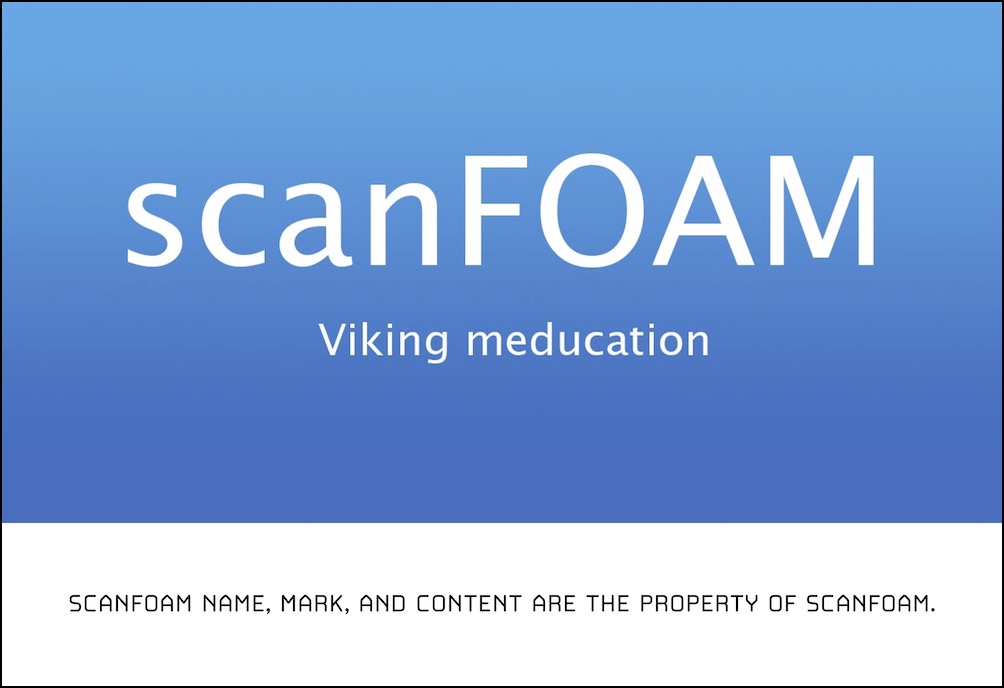
About scanFOAM
Scandinavia-based not-for-profit scanFOAM provides resources, conferences (such as TBS24), and more aimed at improving medicine. ScanFOAM is short for Scandinavia Free Open Access Meducation (or medical education). Visit https://scanfoam.org/ to learn more.
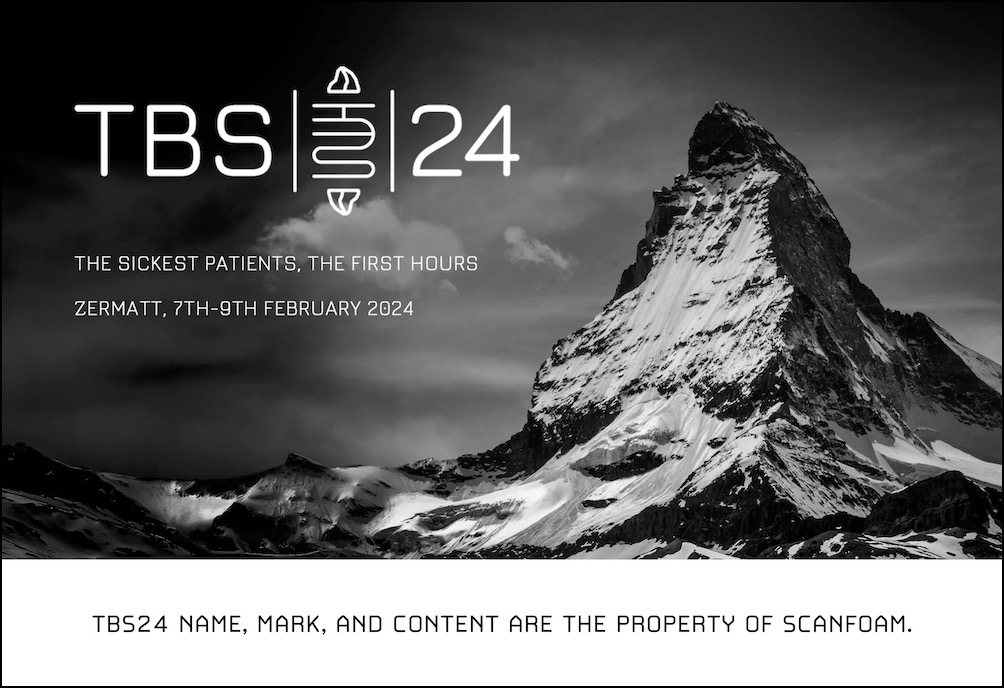
About the TBS24 Conference
TBS24 – the 6th iteration of cutting-edge talks on critical care, organized by scanFOAM – was held in beautiful Zermatt, Switzerland, on 7-9 February 2024. Visit https://scanfoam.org/tbs24/ to learn more.
How to Cite This Article
Graffius, Scott M. (2024, April 25). Graffius' 'Phases of Team Development' Featured by TAG at TBS24 Conference in Zermatt Switzerland. Available at: https://scottgraffius.com/blog/files/tbs24.html. DOI: 10.13140/RG.2.2.36021.90087.




About Scott M. Graffius

Scott M. Graffius, PMP, SA, CSP-SM, CSP-PO, CSM, CSPO, ITIL, LSSGB is an agile project management practitioner, consultant, thinker, creator, multi-award-winning author, and international public speaker. Founder and CEO of Exceptional PPM and PMO Solutions™ and subsidiary Exceptional Agility™, he has generated over $1.9 billion for Global Fortune 500 businesses and other organizations he has served. Graffius and content from his books, talks, workshops, and more have been featured and used by Microsoft, Oracle, Broadcom, Cisco, Gartner, Project Management Institute, IEEE, National Academy of Sciences, United States Department of Energy, Yale University, Tufts University, and others. He delights audiences with dynamic and engaging talks and workshops on agile project management, AI, Tech leadership, video game development, strategic alignment, the science of high performance teams, and more. To date, he's presented sessions at 89 conferences and other events across 25 countries.
His full bio is available here.
Connect with Scott on:



About Agile Scrum: Your Quick Start Guide with Step-by-Step Instructions

Shifting customer needs are common in today's marketplace. Businesses must be adaptive and responsive to change while delivering an exceptional customer experience to be competitive.
There are a variety of frameworks supporting the development of products and services, and most approaches fall into one of two broad categories: traditional or agile. Traditional practices such as waterfall engage sequential development, while agile involves iterative and incremental deliverables. Organizations are increasingly embracing agile to manage projects, and best meet their business needs of rapid response to change, fast delivery speed, and more.
With clear and easy to follow step-by-step instructions, Scott M. Graffius's award-winning Agile Scrum: Your Quick Start Guide with Step-by-Step Instructions helps the reader:
Hailed by Literary Titan as “the book highlights the versatility of Scrum beautifully.”
Winner of 17 first place awards.
Agile Scrum: Your Quick Start Guide with Step-by-Step Instructions is available in paperback and ebook/Kindle in the United States and around the world. Some links by country follow.

About Agile Transformation: A Brief Story of How an Entertainment Company Developed New Capabilities and Unlocked Business Agility to Thrive in an Era of Rapid Change

Thriving in today's marketplace frequently depends on making a transformation to become more agile. Those successful in the transition enjoy faster delivery speed and ROI, higher satisfaction, continuous improvement, and additional benefits.
Based on actual events, Agile Transformation: A Brief Story of How an Entertainment Company Developed New Capabilities and Unlocked Business Agility to Thrive in an Era of Rapid Change provides a quick (60-90 minute) read about a successful agile transformation at a multinational entertainment and media company, told from the author's perspective as an agile coach.
The award-winning book by Scott M. Graffius is available in paperback and ebook/Kindle in the United States and around the world. Some links by country follow.

An abridged version of this article is on LinkedIn.
The short link for this article is https://bit.ly/tbs-24
© Copyright 2024 Scott M. Graffius. All rights reserved. This material may not be published, broadcast, rewritten or redistributed without the express written permission of Scott M. Graffius.



Informed by the research of Bruce W. Tuckman and Mary Ann C. Jensen, over 100 subsequent studies, and Scott M. Graffius' first-hand professional experience with, and analysis of, team leadership and performance, Graffius created his 'Phases of Team Development' as a unique perspective and visual conveying the five phases of team development — Forming, Storming, Norming, Performing, and Adjourning — inclusive of a graph showing how performance varies by phase, as well as the characteristics and strategies for each phase.
Leaders of teams can apply the information to help handle challenges or issues experienced by teams. By doing so, they’ll advance the teams' (and their own) happiness, productivity, and success.
Graffius initially developed the material in 2008, and he periodically refreshes it. For details on the current (2024) edition including permission request information, high resolution files, and more, visit here.
Graffius' 'Phases of Team Development' work is used by businesses, professional associations, government agencies, and universities around the world. Examples include Yale University, IEEE, Constructor Institute (Switzerland), Adobe, Boston University, Amsterdam Public Health Research Institute, United States National Park Service, Cisco, Bayer, Ford, University of Galway (Ireland), Hasso Plattner Institute (Germany), American Management Association, UC San Diego, and many more.
The ATACC Group (TAG) was added to the list. Dr. Mark Forrest and Dr. Halden Hutchinson-Bazely from TAG incorporated Graffius' 'Phases of Team Development' in their talk at TBS24 in Zermatt, Switzerland.

Slide 1 from their talk is shown above.

Slide 67 from their talk — which featured the 2019 edition of Graffius' 'Phases of Team Development' — is shown above. (For details on the current [2024] edition of Graffius' work including permission request information, high resolution files, and more, visit here.)
A recording of their session is on YouTube.
About Dr. Mark Forrest
The following includes content from https://scanfoam.org/tbs24.
Dr. Mark Forrest is a consultant in anaesthetics, critical care, prehospital care from the North West of England and Associate Medical Director in his NHS Trust. He has over 35 years of experience in these fields and has additional experience in aeromedical retrieval (including Paeds and ECMO), diving/hyperbaric medicine, and tactical medicine. Dr. Forrest flies as a consultant on HeliMed 29 and responds on a day-to-day basis as a 'Fire & Rescue Doctor.' He is passionate about trauma and critical care, especially in the prehospital arena and has a specialist interest in vehicle extrication as a Road Traffic Collision Extrication Instructor and Clinical Advisor to the National Fire Service College.
Dr. Forrest was the first appointed Medical Director for Fire & Rescue in the UK, over 17 years ago and now directs 9 UK Police Forces and 3 Fire and Rescue Services, through the ATACC Group.
Dr. Forrest is the Founder and Medical Director of the internationally renowned ATACC (Anesthesia Trauma and Critical Care) course and he is the First President of the Faculty of Trauma & Critical Care. He is an advocate for immersive simulation, unique training and innovation and has written over 20 varied courses for The ATACC Group as a Royal College Surgeons (London) Education Centre.
About Dr. Halden Hutchinson-Bazely
The following includes content from https://scanfoam.org/tbs24.
Dr. Halden Hutchinson-Bazely is an intensive care medicine doctor and pre hospital emergency medicine doctor in the UK. He works in a large, major trauma centre ICU, and he is a Helicopter Emergency Medical System (HEMS) doctor at East Anglian Air Ambulance (EAAA).
Dr. Hutchinson-Bazely is committed to delivering contemporary and compassionate critical care, and supporting others to do the same, so much of his non-clinical work is education. He is a faculty member at EAAA, where he specializes in endovascular resuscitation techniques. Dr. Hutchinson-Bazely is also part of the faculty for the international Endovascular Trauma Management (EVTM) society. His main commitment to education is as a deputy medical director for ATACC, where he co-directs the ATACC course.

About The ATACC Group
The ATACC Group (TAG) is known for providing high quality first aid, clinical and medical education and training to every level of provider involved in patient care. It offers a suite of regulated qualifications in collaboration with Qualification Network UK (QNUK) who are an Ofqual, CCEA, and Qualification Wales recognized Awarding Organization. TAG is also a Royal College of Surgeons, London approved Educational Centre. ATACC is an acronym for Anesthesia, Trauma, and Critical Care. Visit https://www.ataccgroup.com to learn more.

About scanFOAM
Scandinavia-based not-for-profit scanFOAM provides resources, conferences (such as TBS24), and more aimed at improving medicine. ScanFOAM is short for Scandinavia Free Open Access Meducation (or medical education). Visit https://scanfoam.org/ to learn more.

About the TBS24 Conference
TBS24 – the 6th iteration of cutting-edge talks on critical care, organized by scanFOAM – was held in beautiful Zermatt, Switzerland, on 7-9 February 2024. Visit https://scanfoam.org/tbs24/ to learn more.
How to Cite This Article
Graffius, Scott M. (2024, April 25). Graffius' 'Phases of Team Development' Featured by TAG at TBS24 Conference in Zermatt Switzerland. Available at: https://scottgraffius.com/blog/files/tbs24.html. DOI: 10.13140/RG.2.2.36021.90087.




About Scott M. Graffius

Scott M. Graffius, PMP, SA, CSP-SM, CSP-PO, CSM, CSPO, ITIL, LSSGB is an agile project management practitioner, consultant, thinker, creator, multi-award-winning author, and international public speaker. Founder and CEO of Exceptional PPM and PMO Solutions™ and subsidiary Exceptional Agility™, he has generated over $1.9 billion for Global Fortune 500 businesses and other organizations he has served. Graffius and content from his books, talks, workshops, and more have been featured and used by Microsoft, Oracle, Broadcom, Cisco, Gartner, Project Management Institute, IEEE, National Academy of Sciences, United States Department of Energy, Yale University, Tufts University, and others. He delights audiences with dynamic and engaging talks and workshops on agile project management, AI, Tech leadership, video game development, strategic alignment, the science of high performance teams, and more. To date, he's presented sessions at 89 conferences and other events across 25 countries.
His full bio is available here.
Connect with Scott on:



About Agile Scrum: Your Quick Start Guide with Step-by-Step Instructions

Shifting customer needs are common in today's marketplace. Businesses must be adaptive and responsive to change while delivering an exceptional customer experience to be competitive.
There are a variety of frameworks supporting the development of products and services, and most approaches fall into one of two broad categories: traditional or agile. Traditional practices such as waterfall engage sequential development, while agile involves iterative and incremental deliverables. Organizations are increasingly embracing agile to manage projects, and best meet their business needs of rapid response to change, fast delivery speed, and more.
With clear and easy to follow step-by-step instructions, Scott M. Graffius's award-winning Agile Scrum: Your Quick Start Guide with Step-by-Step Instructions helps the reader:
- Implement and use the most popular agile framework―Scrum;
- Deliver products in short cycles with rapid adaptation to change, fast time-to-market, and continuous improvement; and
- Support innovation and drive competitive advantage.
Hailed by Literary Titan as “the book highlights the versatility of Scrum beautifully.”
Winner of 17 first place awards.
Agile Scrum: Your Quick Start Guide with Step-by-Step Instructions is available in paperback and ebook/Kindle in the United States and around the world. Some links by country follow.
- 🇧🇷 Brazil
- 🇨🇦 Canada
- 🇨🇿 Czech Republic
- 🇩🇰 Denmark
- 🇫🇮 Finland
- 🇫🇷 France
- 🇩🇪 Germany
- 🇬🇷 Greece
- 🇭🇺 Hungary
- 🇮🇳 India
- 🇮🇪 Ireland
- 🇮🇱 Israel
- 🇮🇹 Italy
- 🇯🇵 Japan
- 🇱🇺 Luxembourg
- 🇲🇽 Mexico
- 🇳🇱 Netherlands
- 🇳🇿 New Zealand
- 🇳🇴 Norway
- 🇪🇸 Spain
- 🇸🇪 Sweden
- 🇨🇭 Switzerland
- 🇦🇪 UAE
- 🇬🇧 United Kingdom
- 🇺🇸 United States

About Agile Transformation: A Brief Story of How an Entertainment Company Developed New Capabilities and Unlocked Business Agility to Thrive in an Era of Rapid Change

Thriving in today's marketplace frequently depends on making a transformation to become more agile. Those successful in the transition enjoy faster delivery speed and ROI, higher satisfaction, continuous improvement, and additional benefits.
Based on actual events, Agile Transformation: A Brief Story of How an Entertainment Company Developed New Capabilities and Unlocked Business Agility to Thrive in an Era of Rapid Change provides a quick (60-90 minute) read about a successful agile transformation at a multinational entertainment and media company, told from the author's perspective as an agile coach.
The award-winning book by Scott M. Graffius is available in paperback and ebook/Kindle in the United States and around the world. Some links by country follow.
- 🇦🇺 Australia
- 🇦🇹 Austria
- 🇧🇷 Brazil
- 🇨🇦 Canada
- 🇨🇿 Czech Republic
- 🇩🇰 Denmark
- 🇫🇮 Finland
- 🇫🇷 France
- 🇩🇪 Germany
- 🇬🇷 Greece
- 🇮🇳 India
- 🇮🇪 Ireland
- 🇯🇵 Japan
- 🇱🇺 Luxembourg
- 🇲🇽 Mexico
- 🇳🇱 Netherlands
- 🇳🇿 New Zealand
- 🇪🇸 Spain
- 🇸🇪 Sweden
- 🇨🇭 Switzerland
- 🇦🇪 United Arab Emirates
- 🇬🇧 United Kingdom
- 🇺🇸 United States

An abridged version of this article is on LinkedIn.
The short link for this article is https://bit.ly/tbs-24
© Copyright 2024 Scott M. Graffius. All rights reserved. This material may not be published, broadcast, rewritten or redistributed without the express written permission of Scott M. Graffius.

